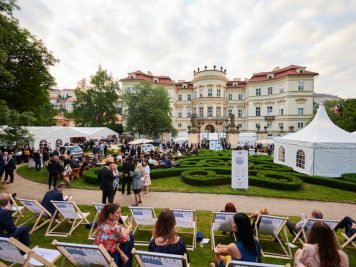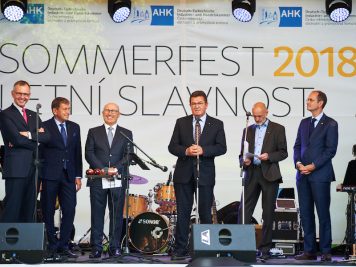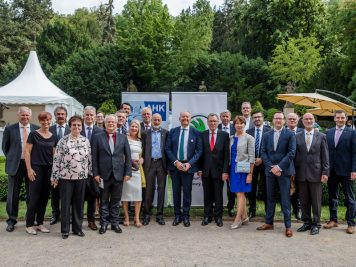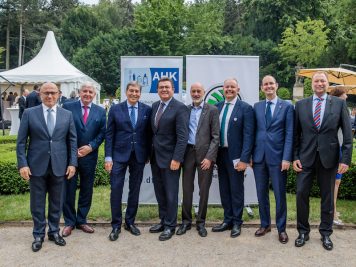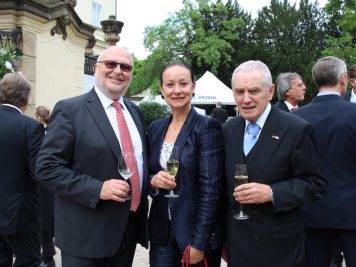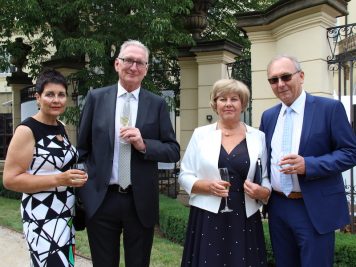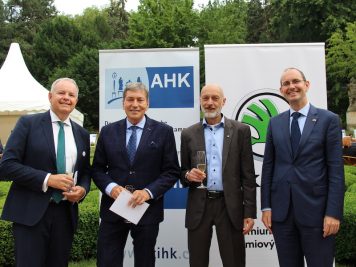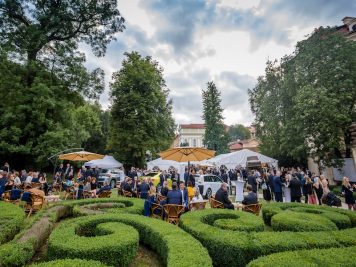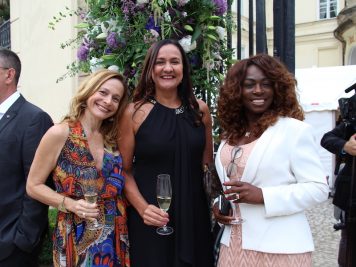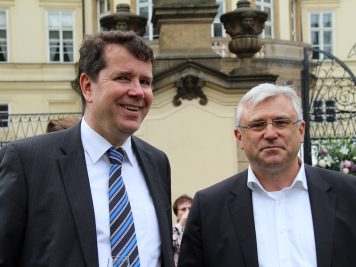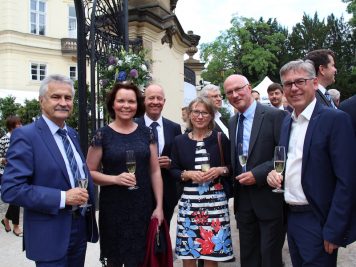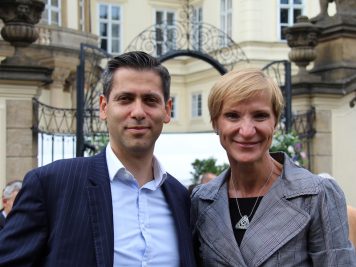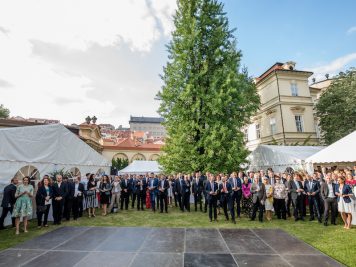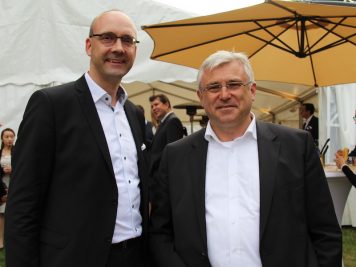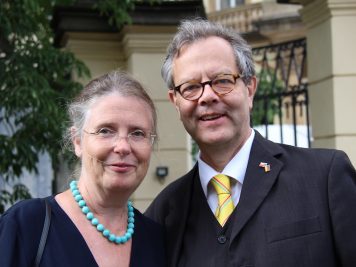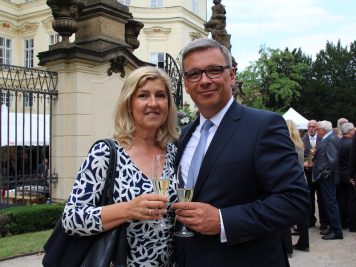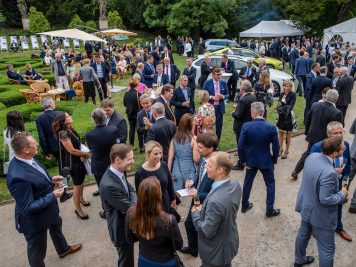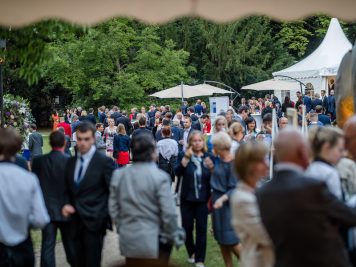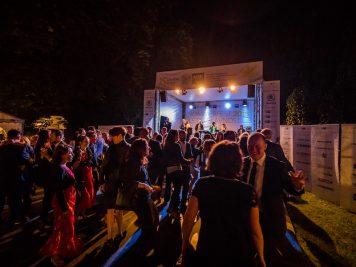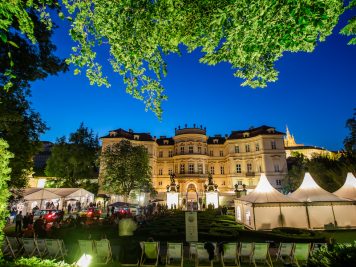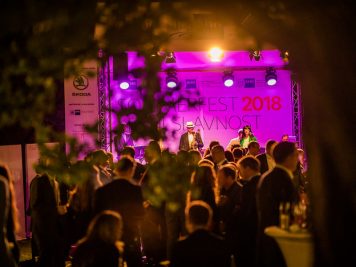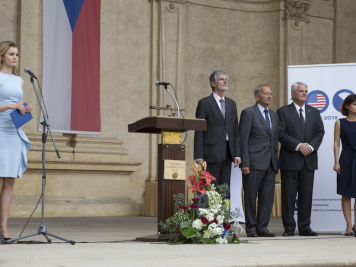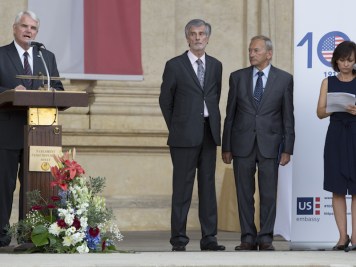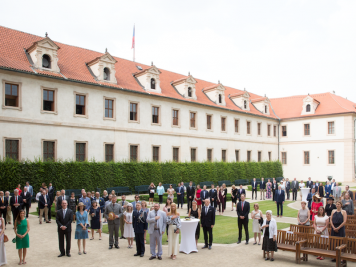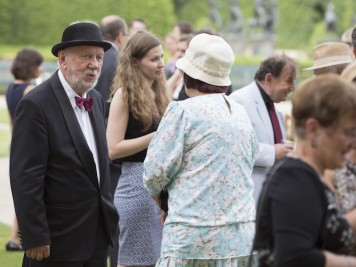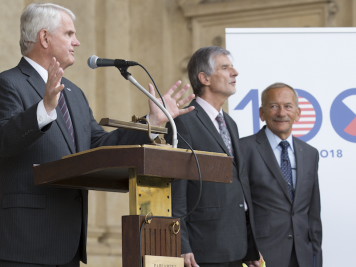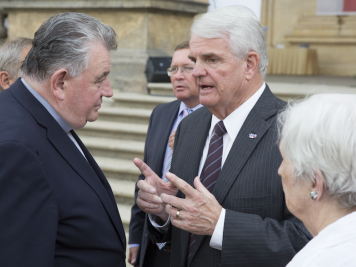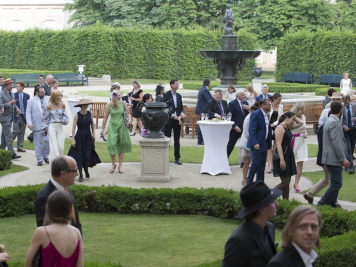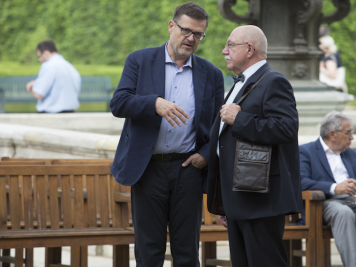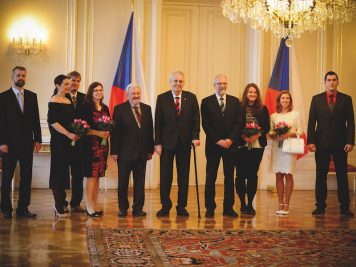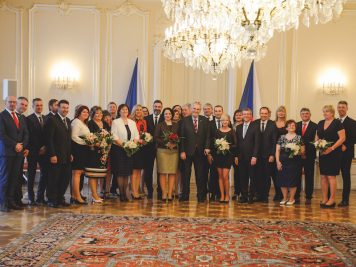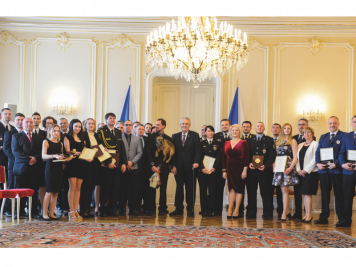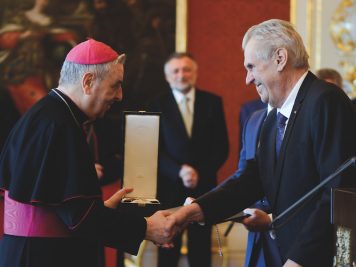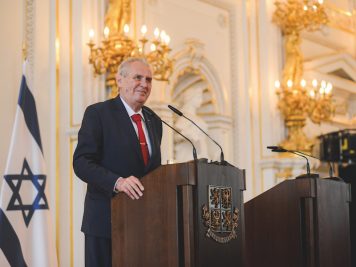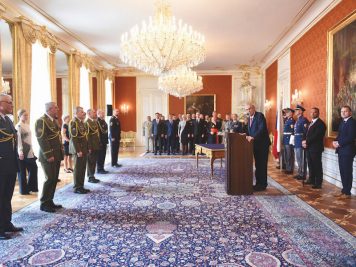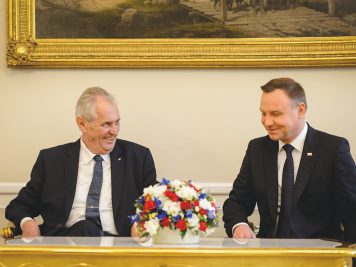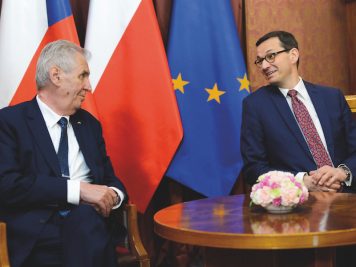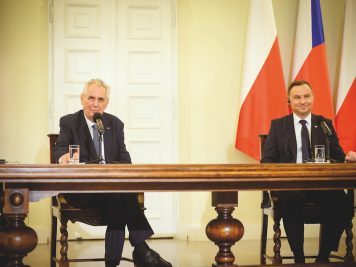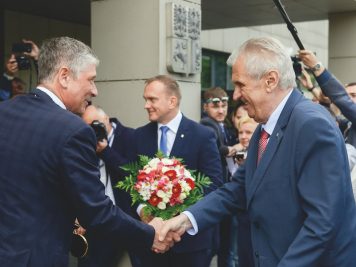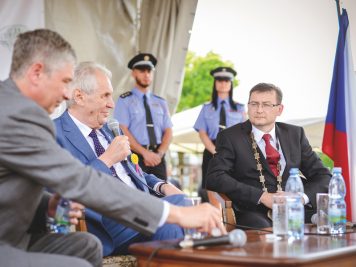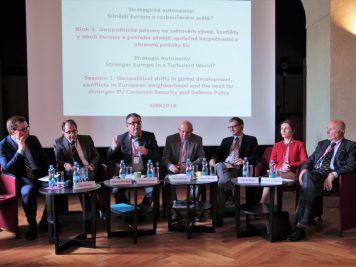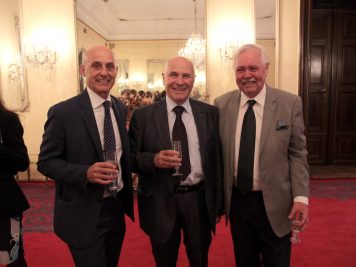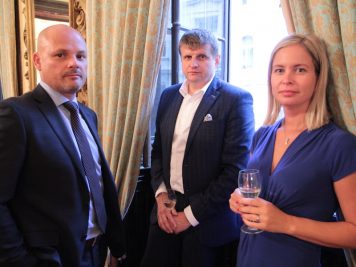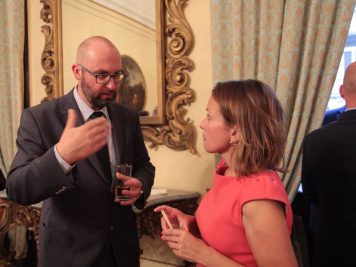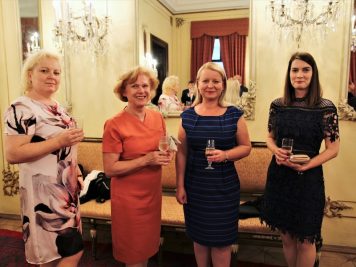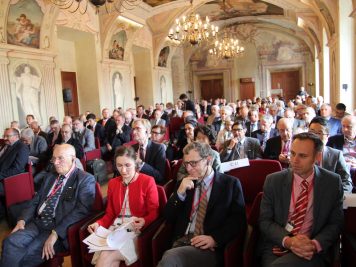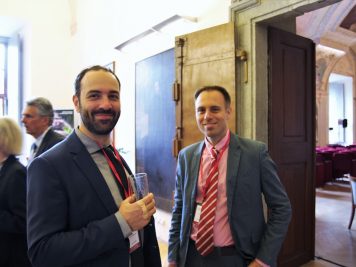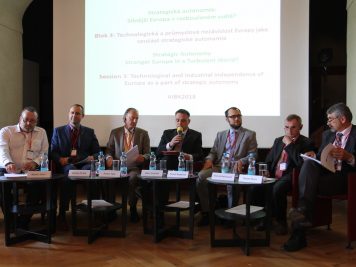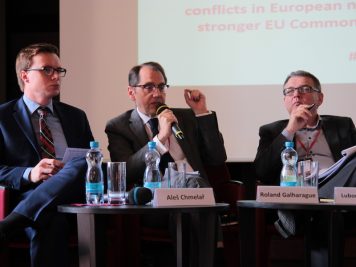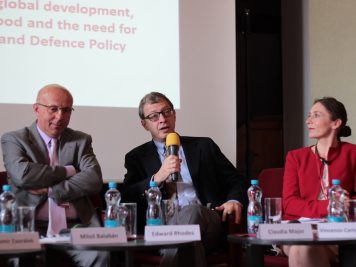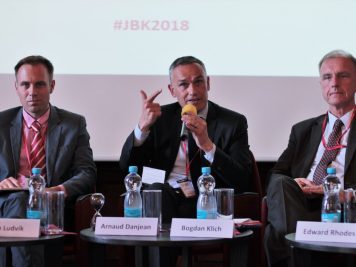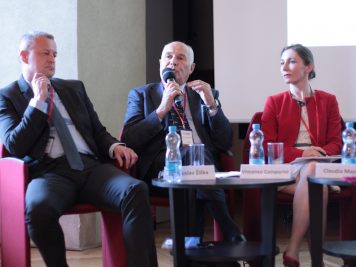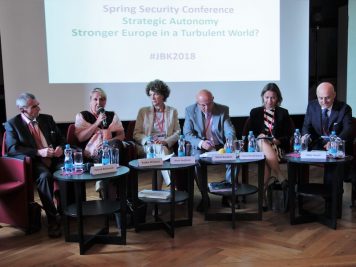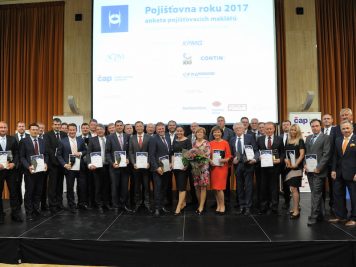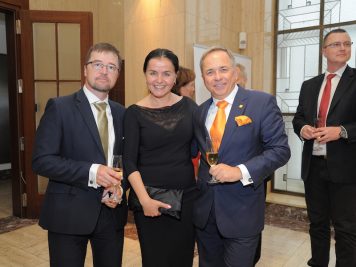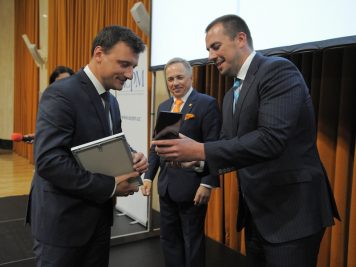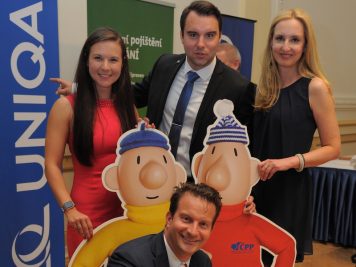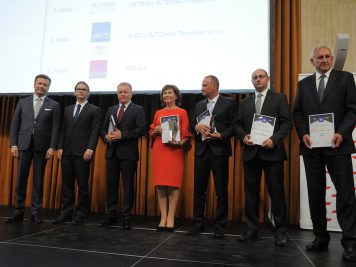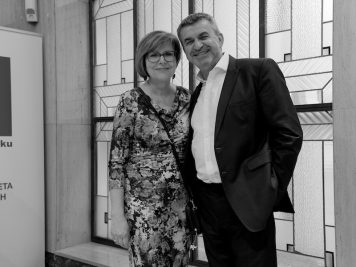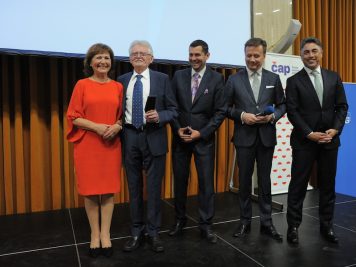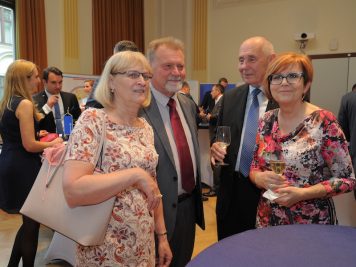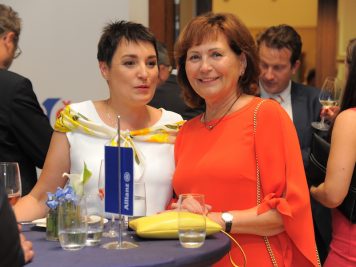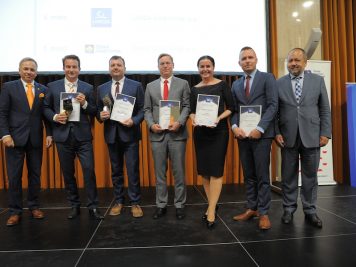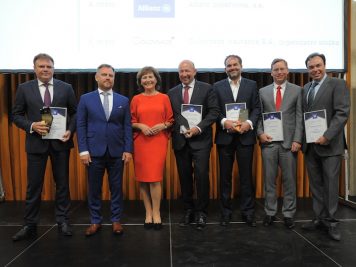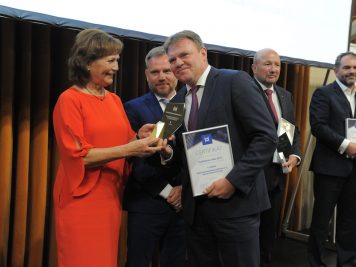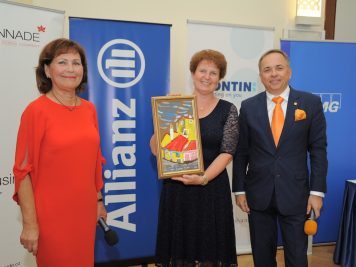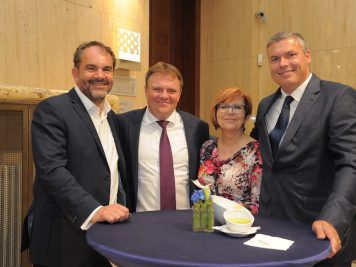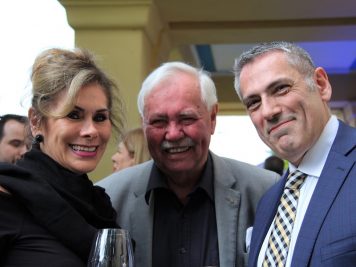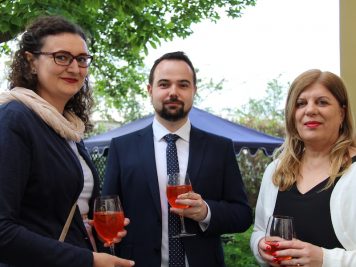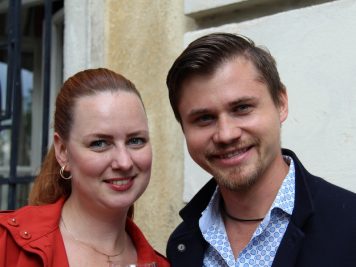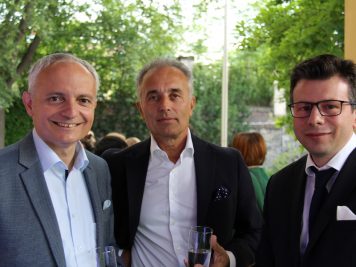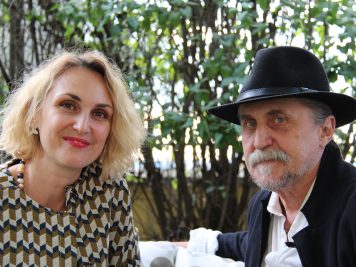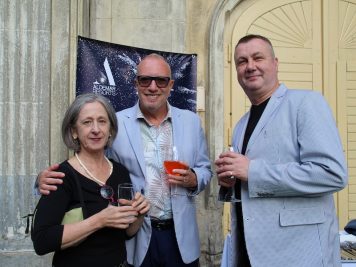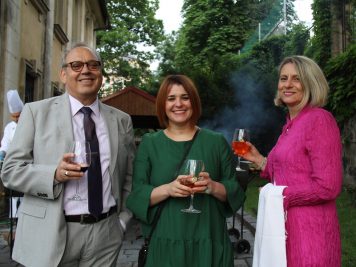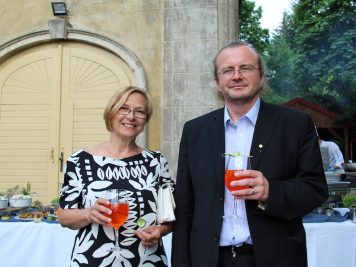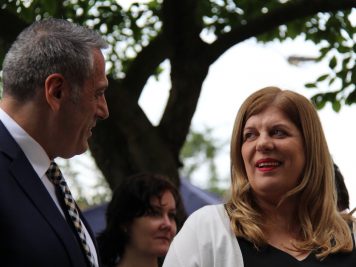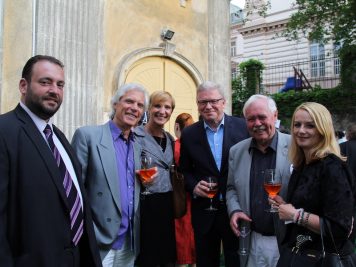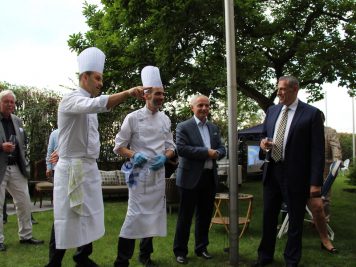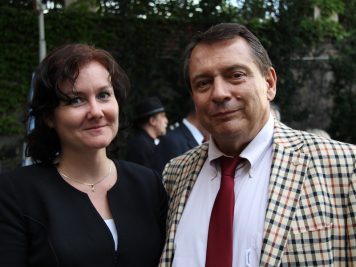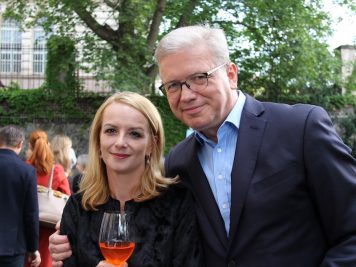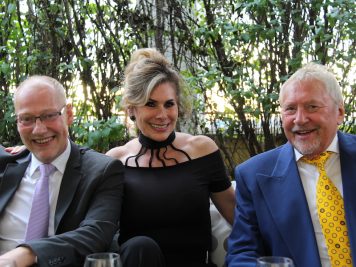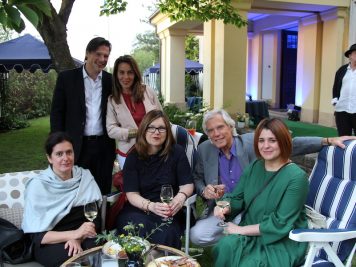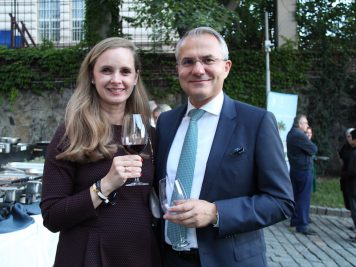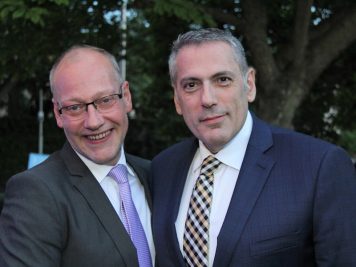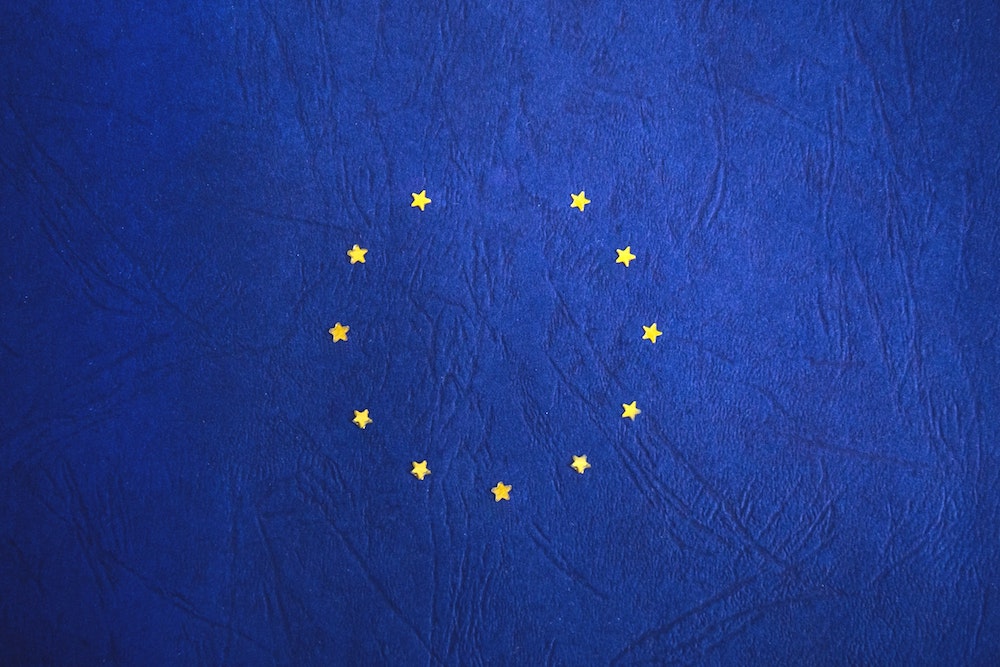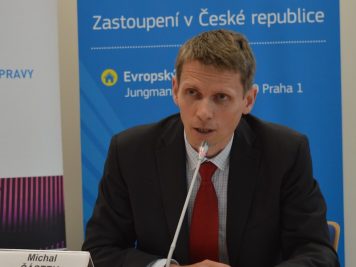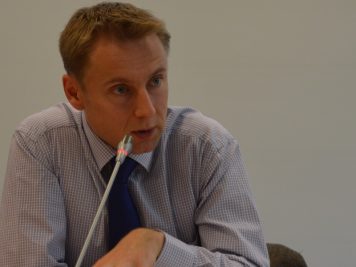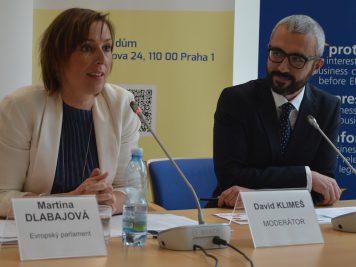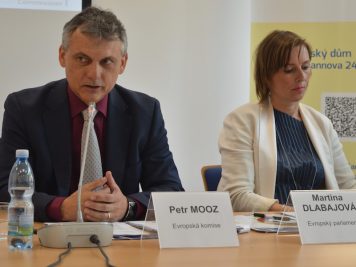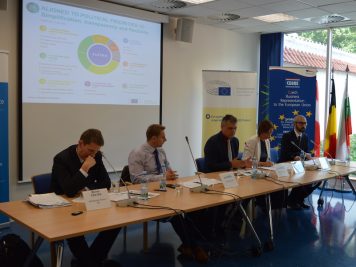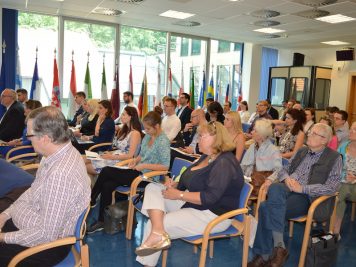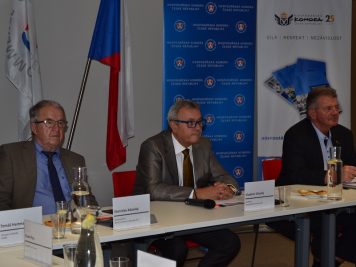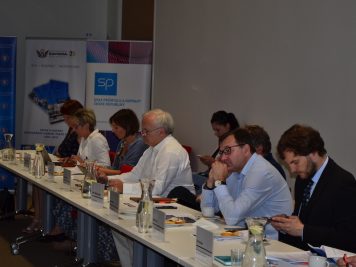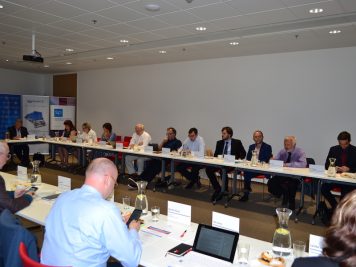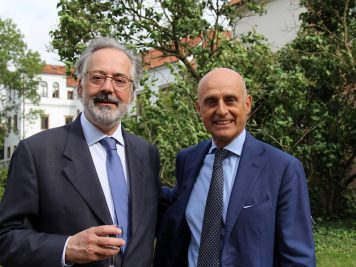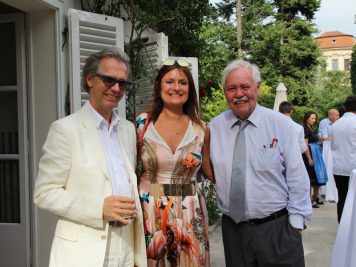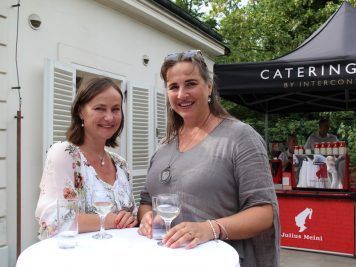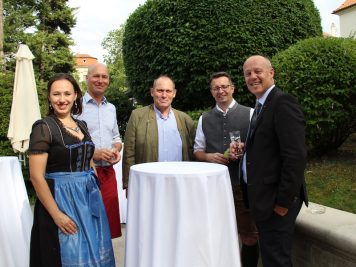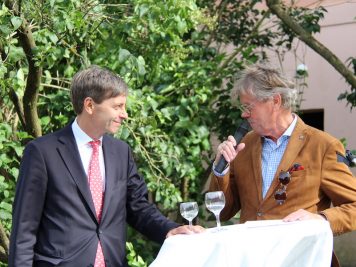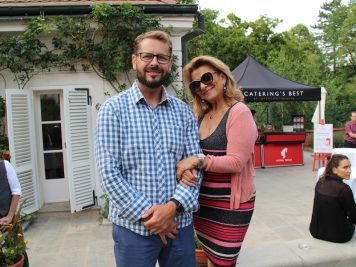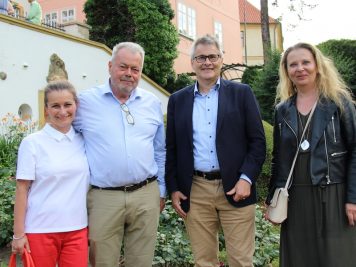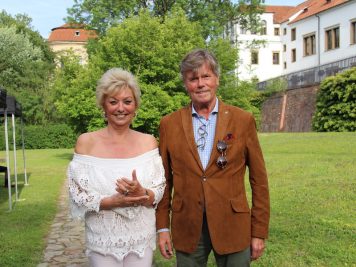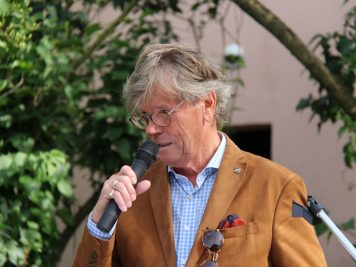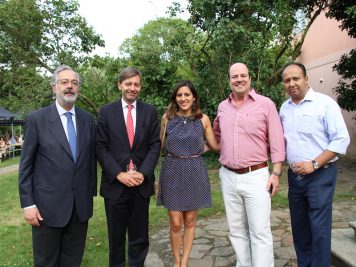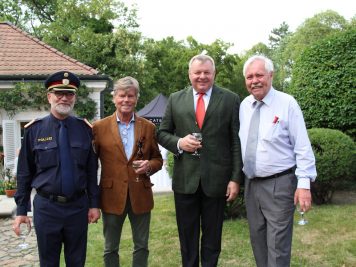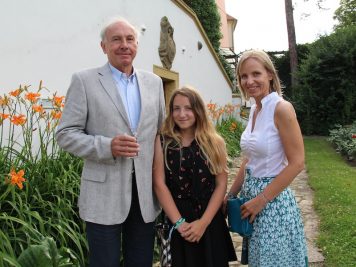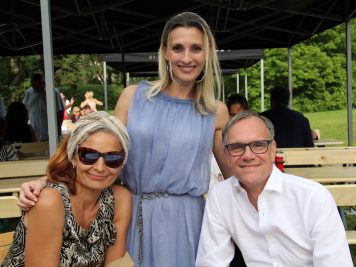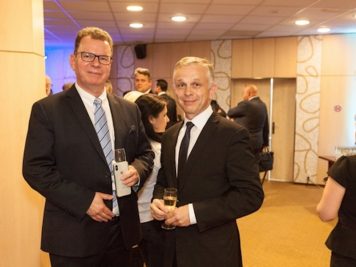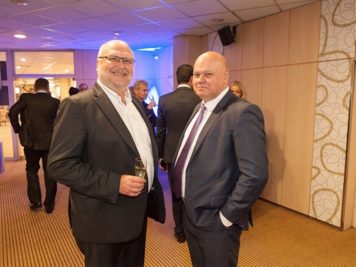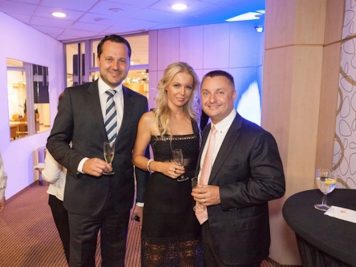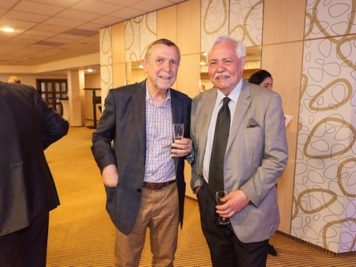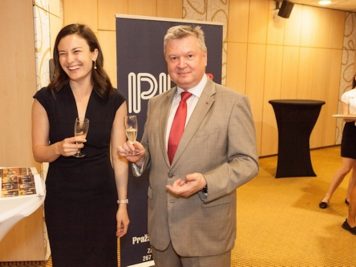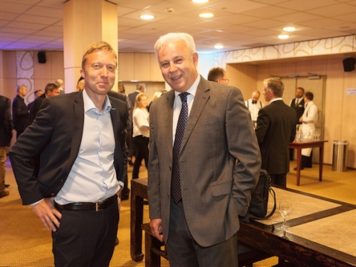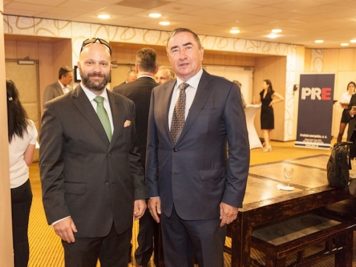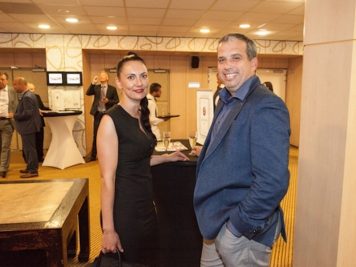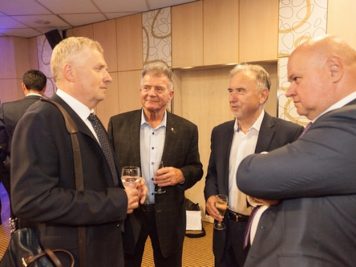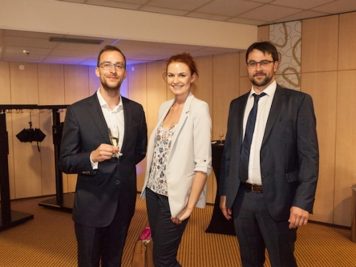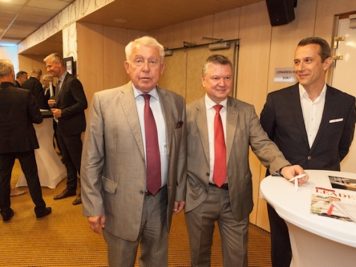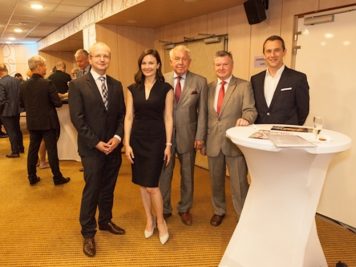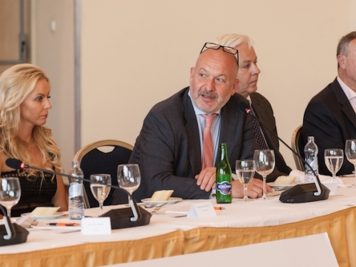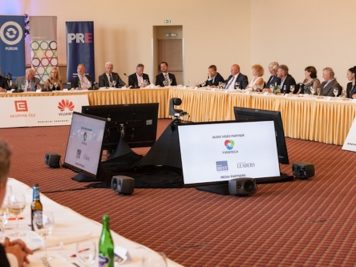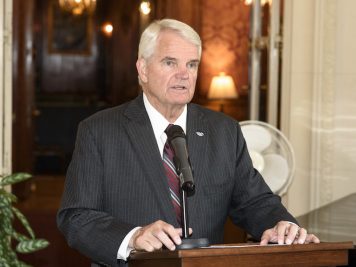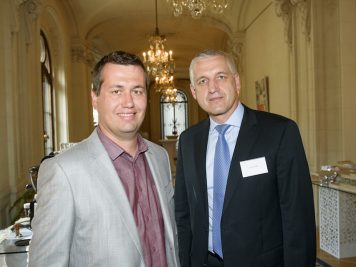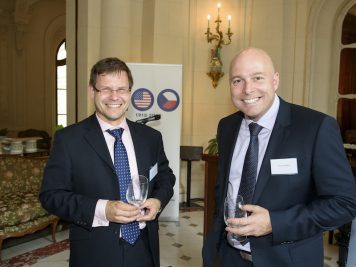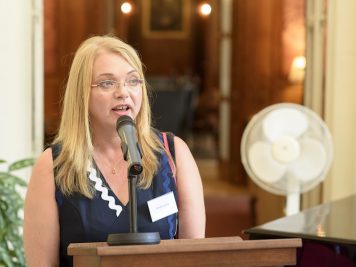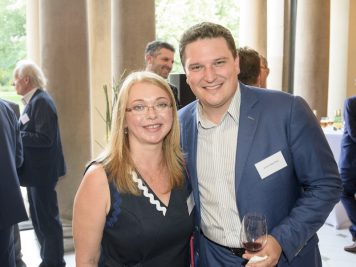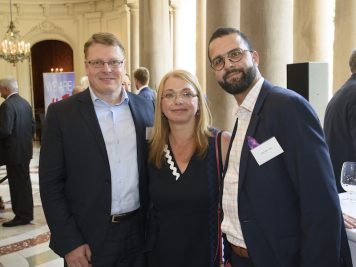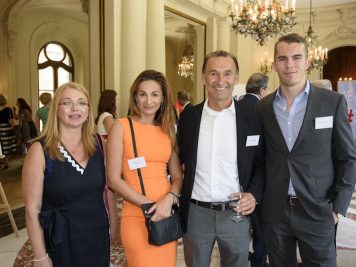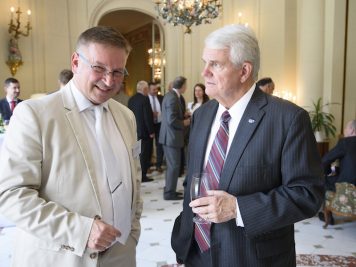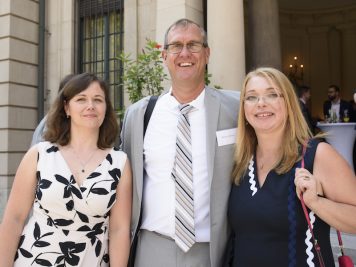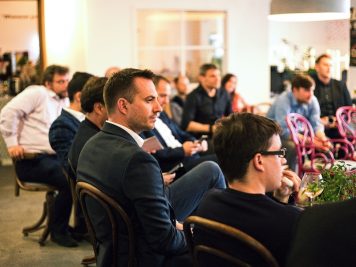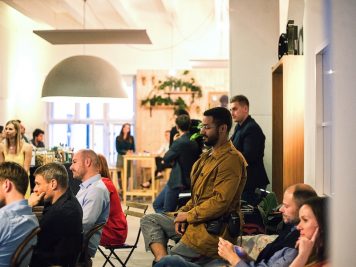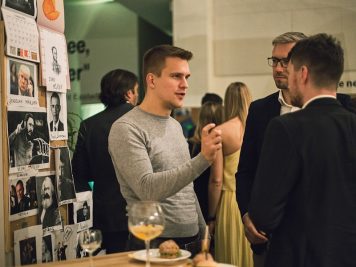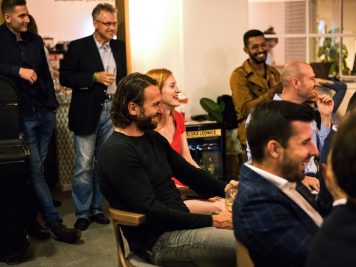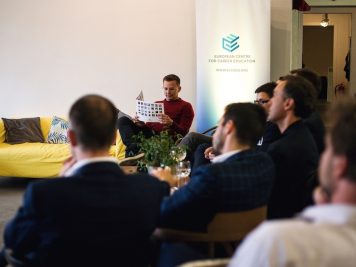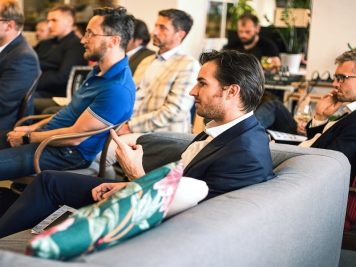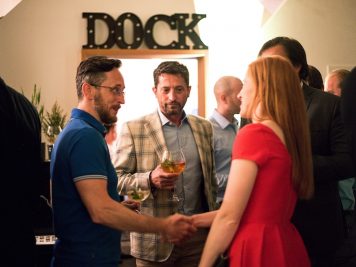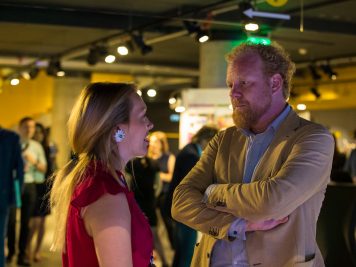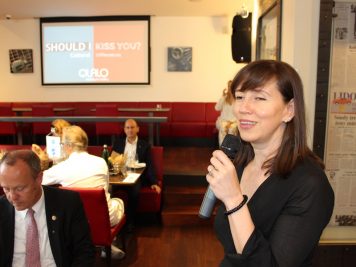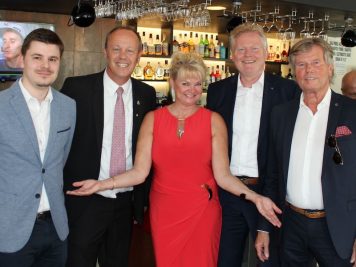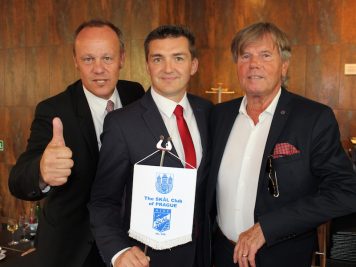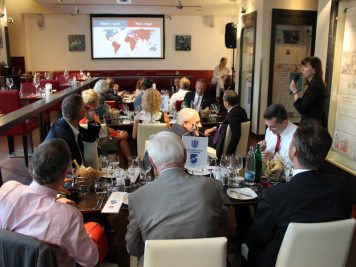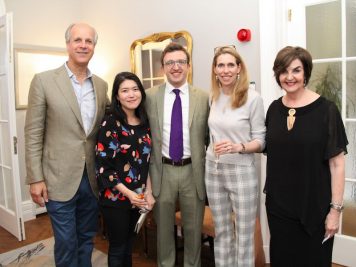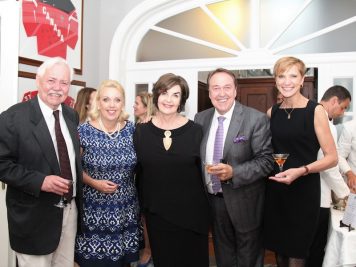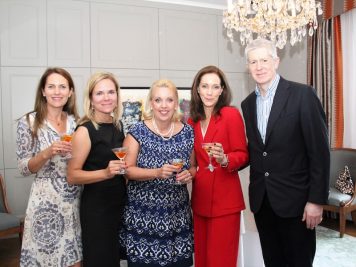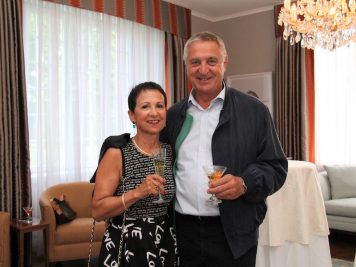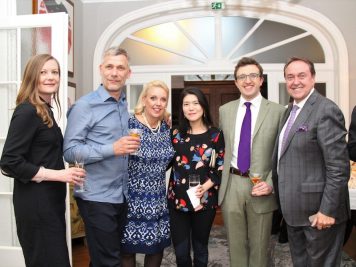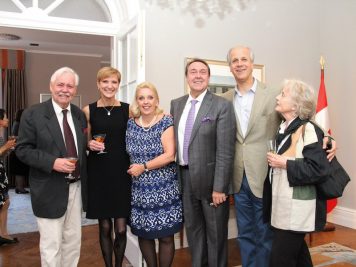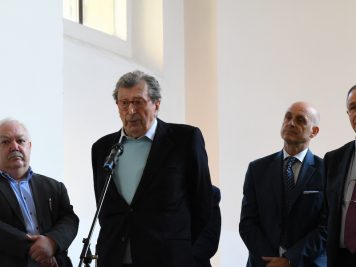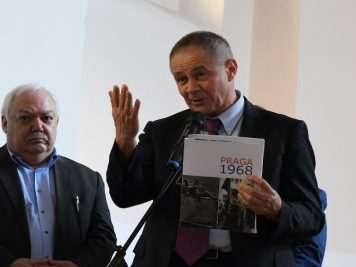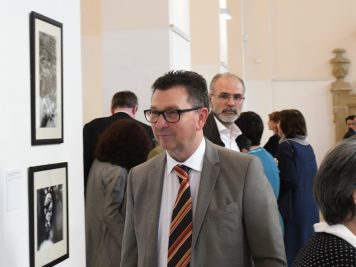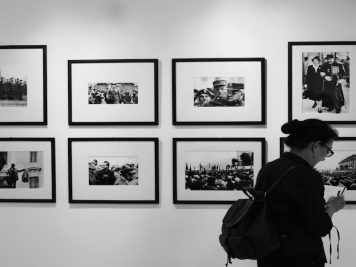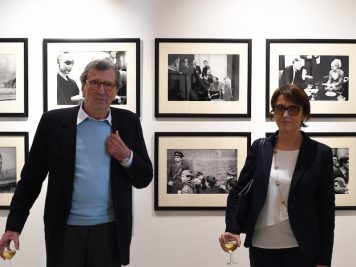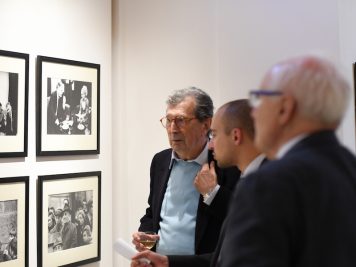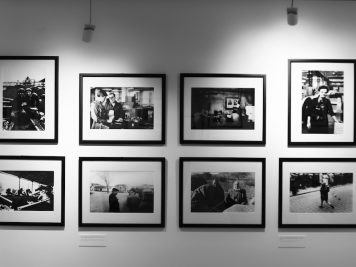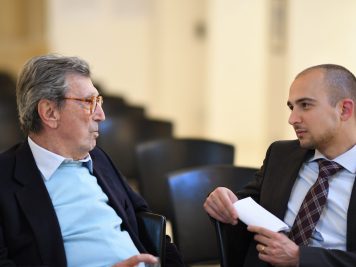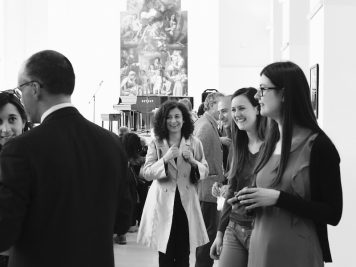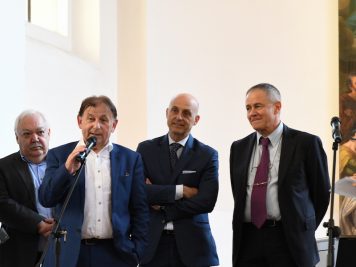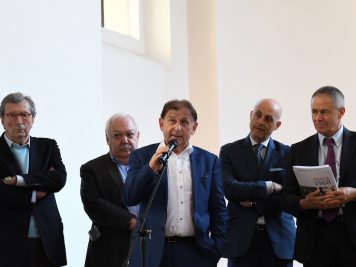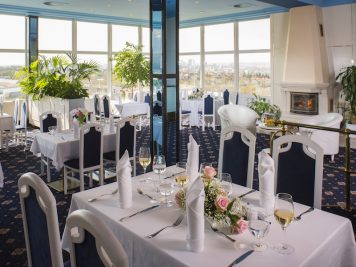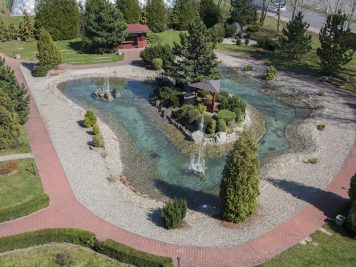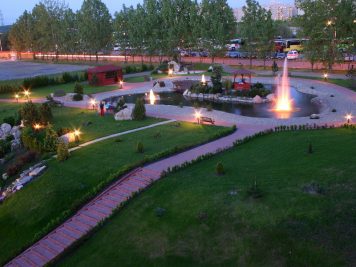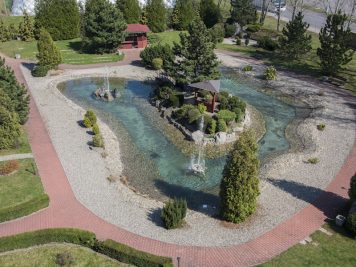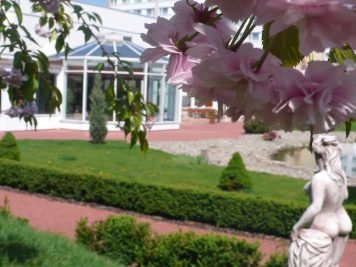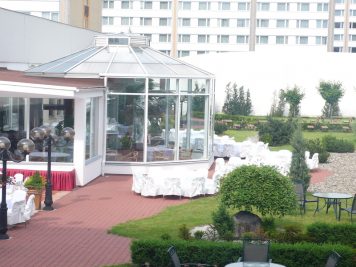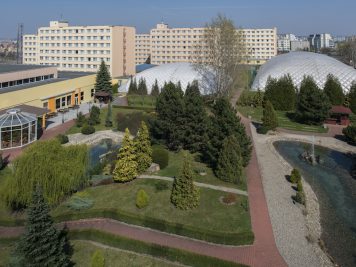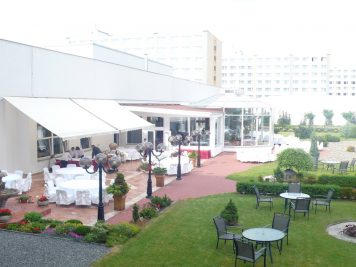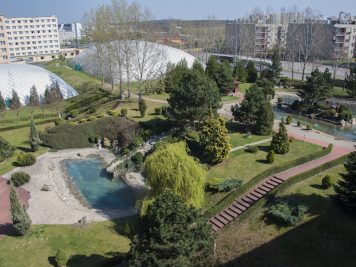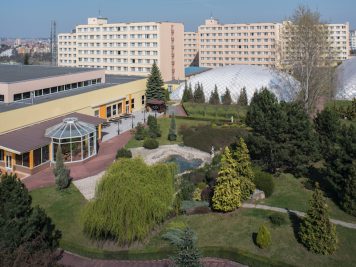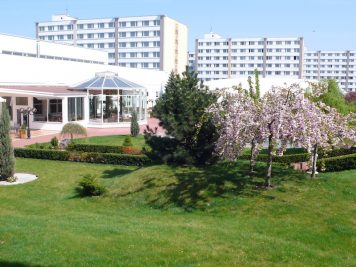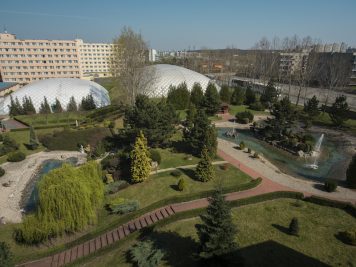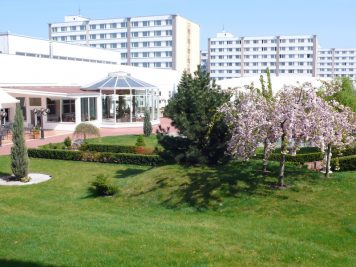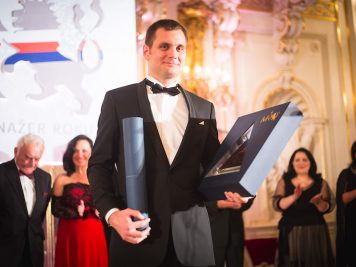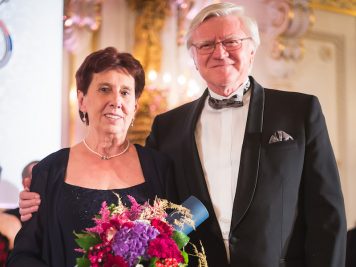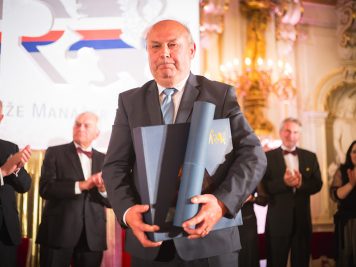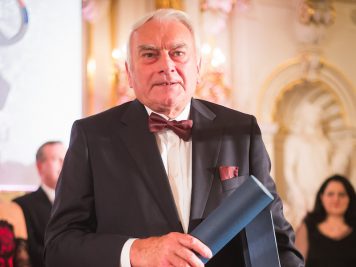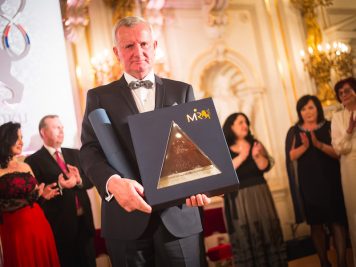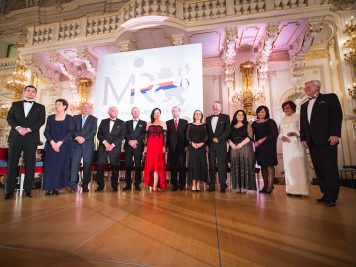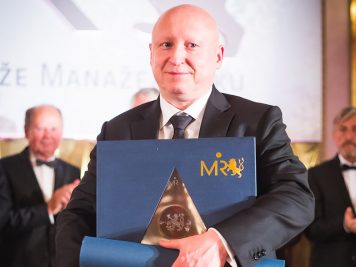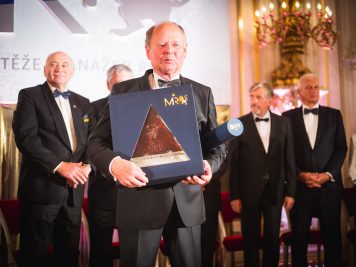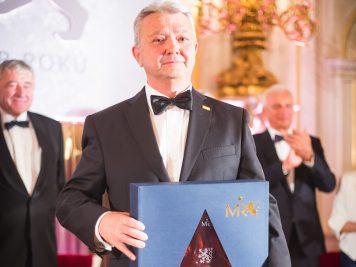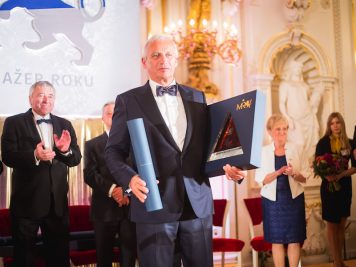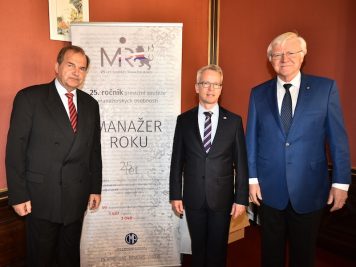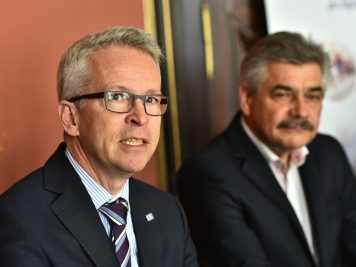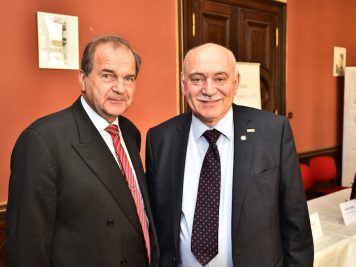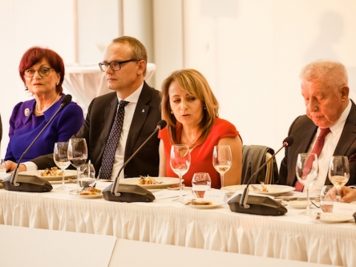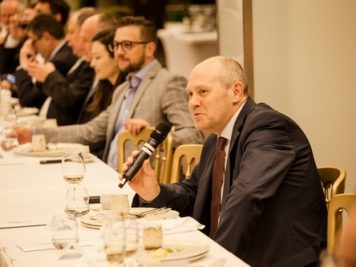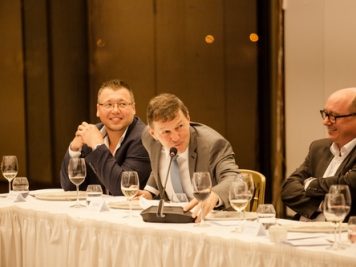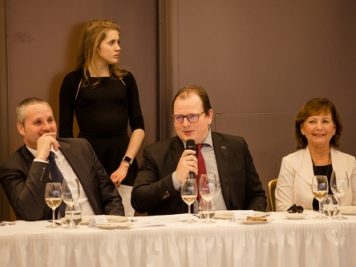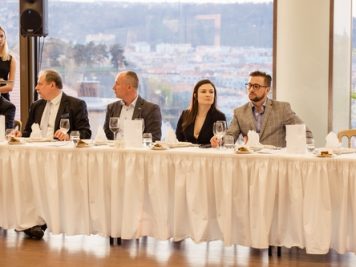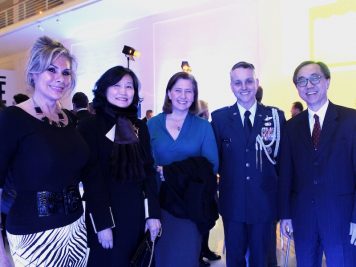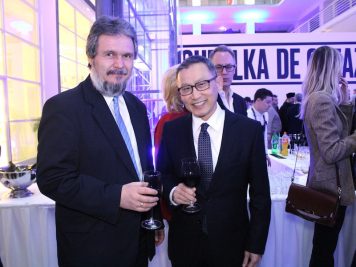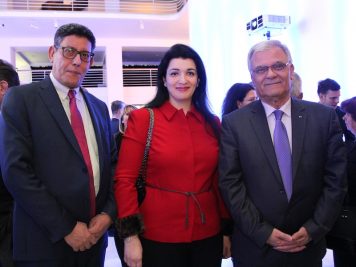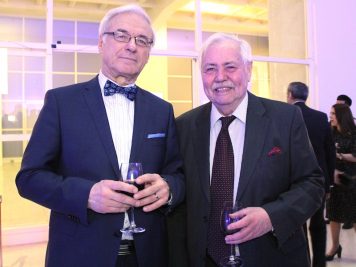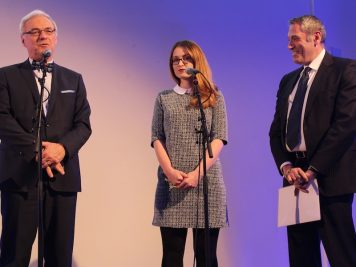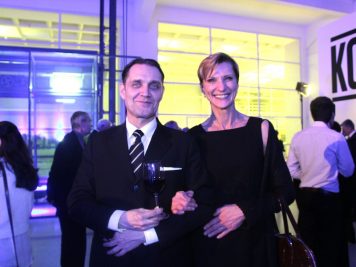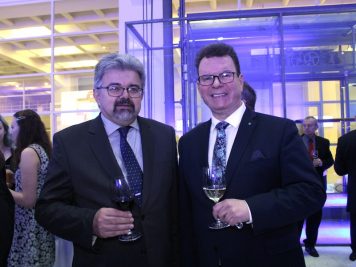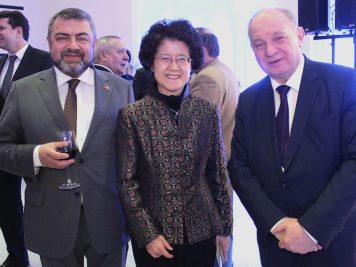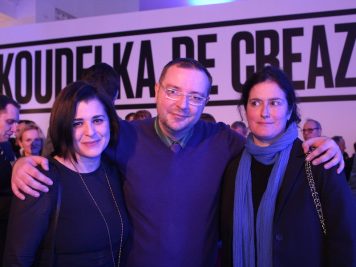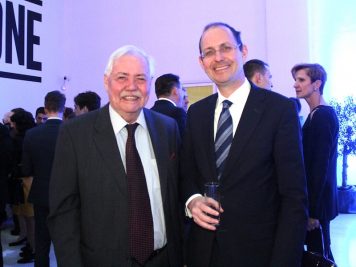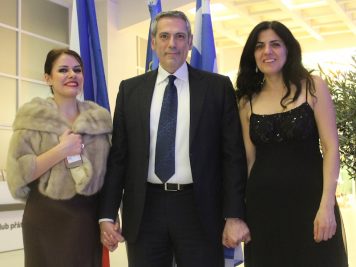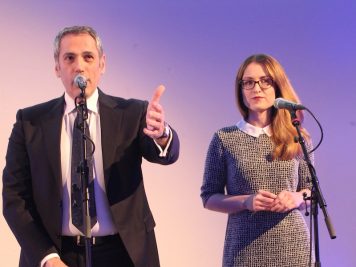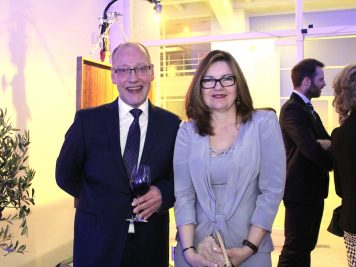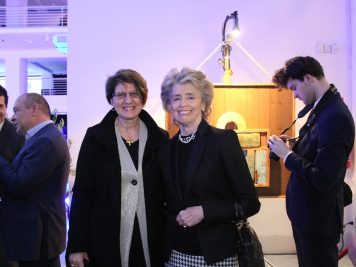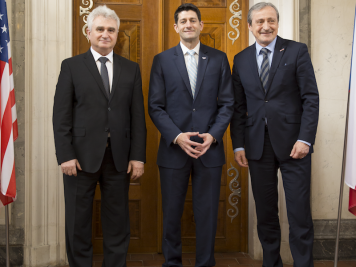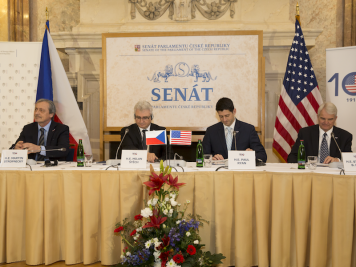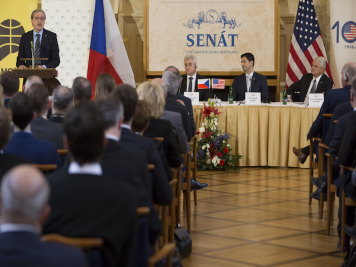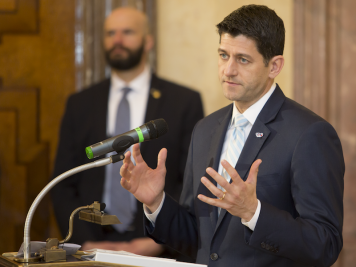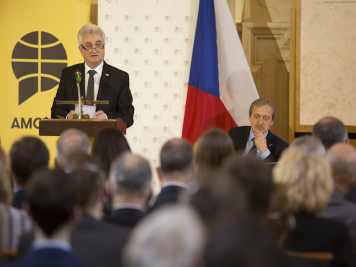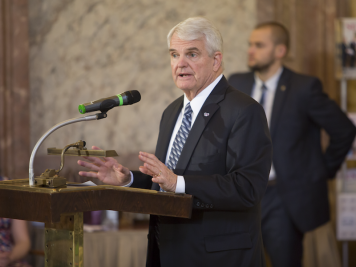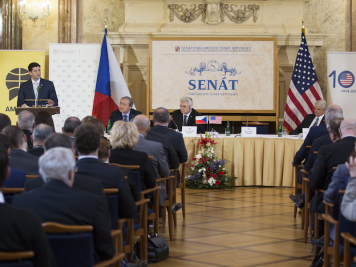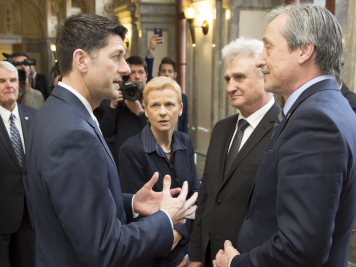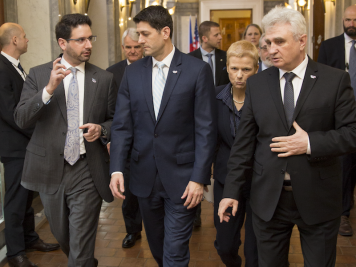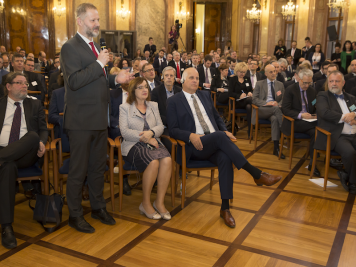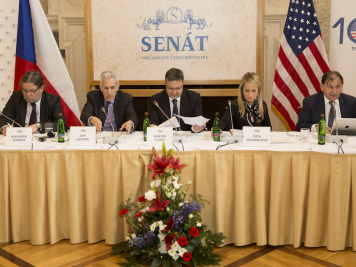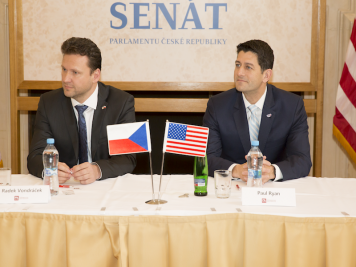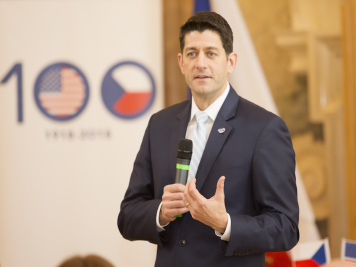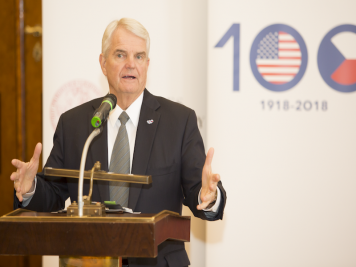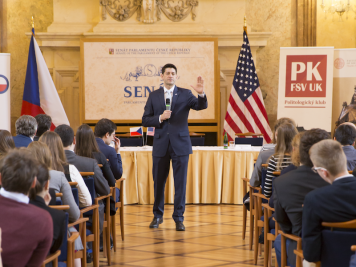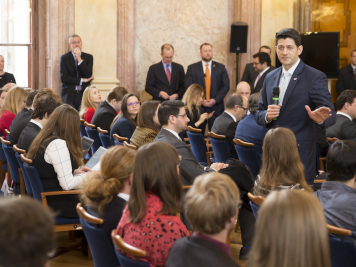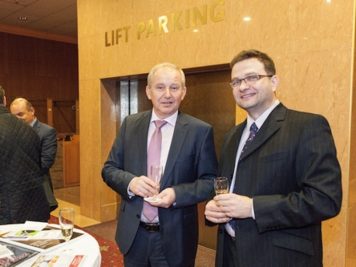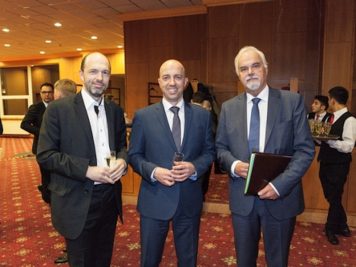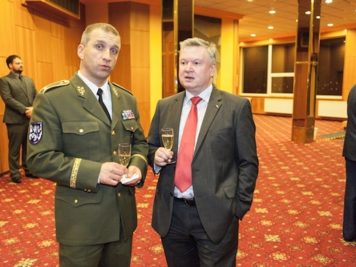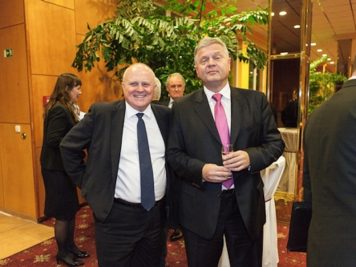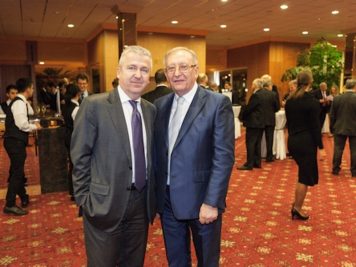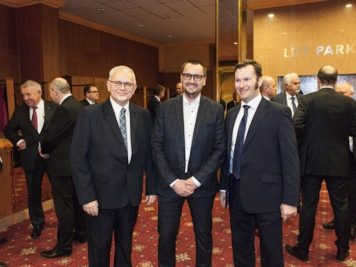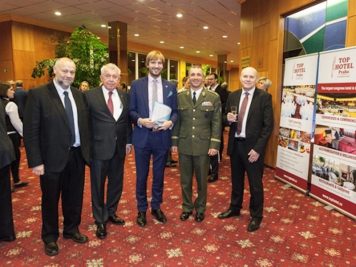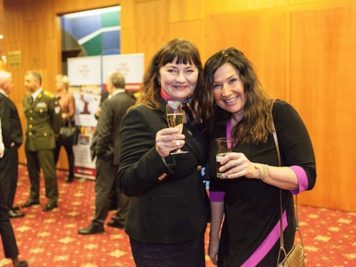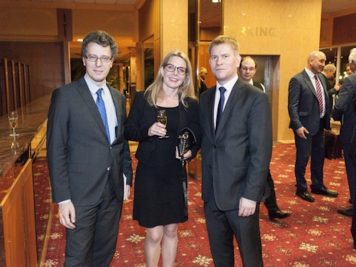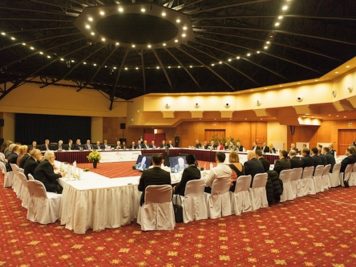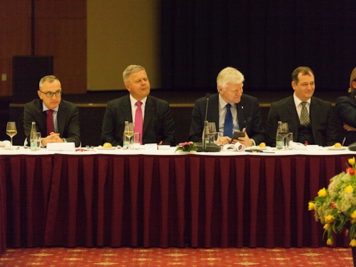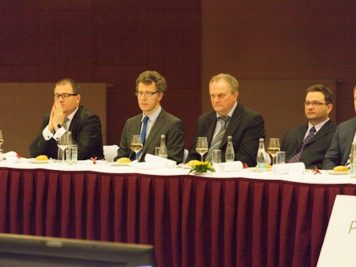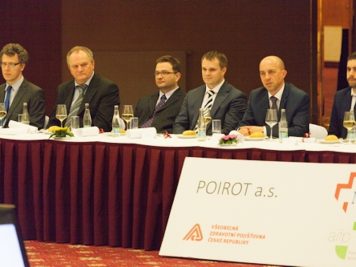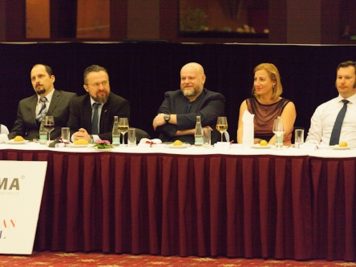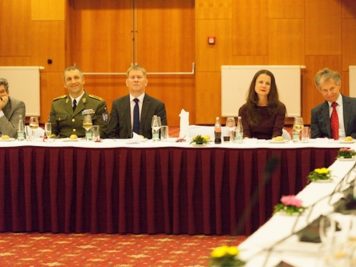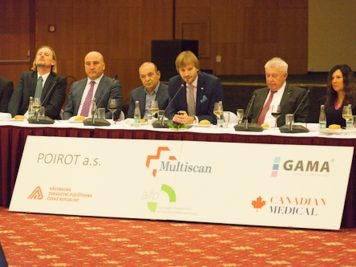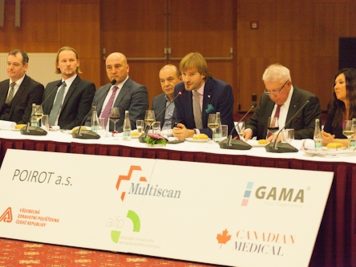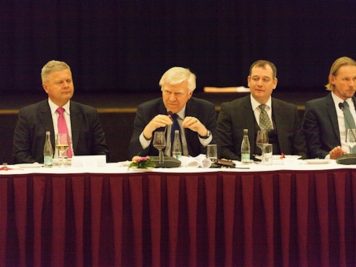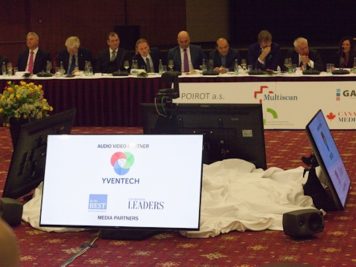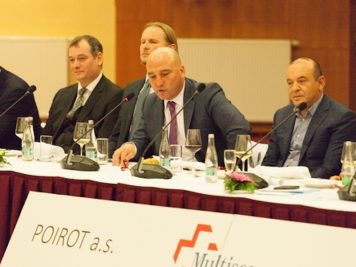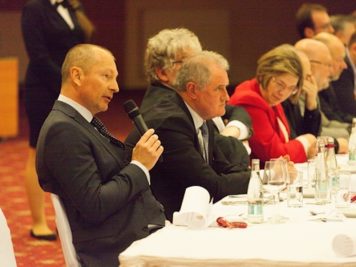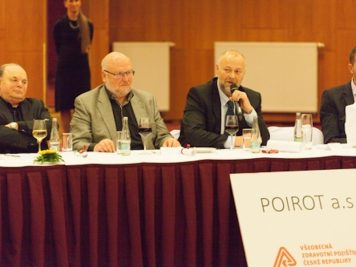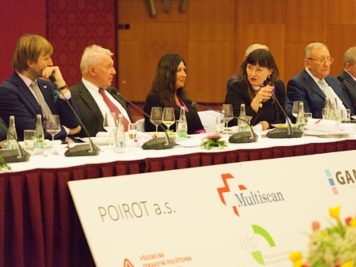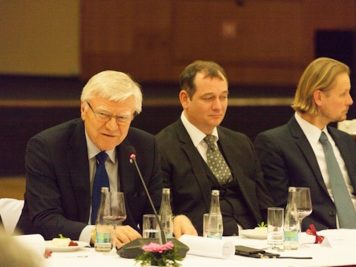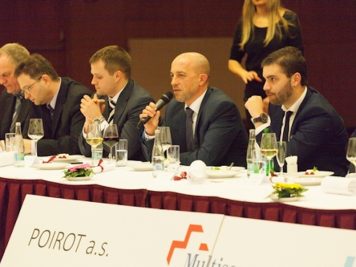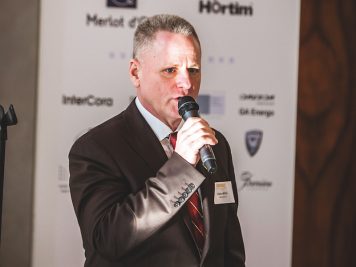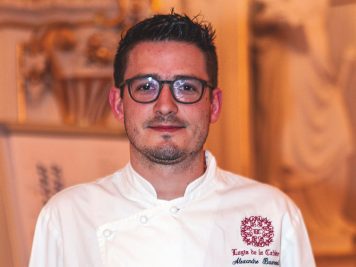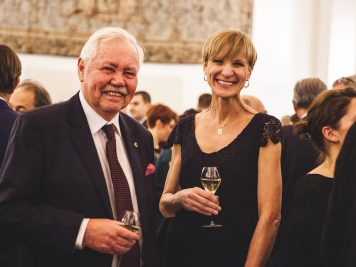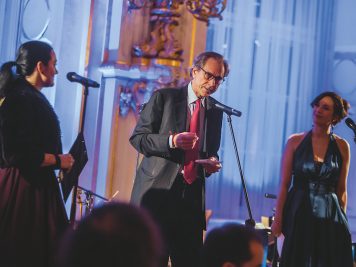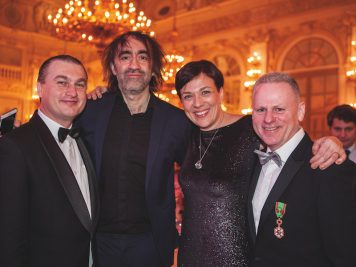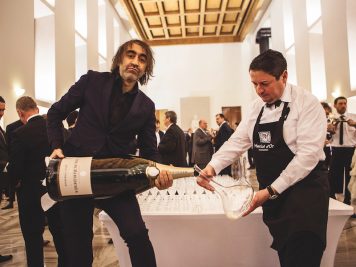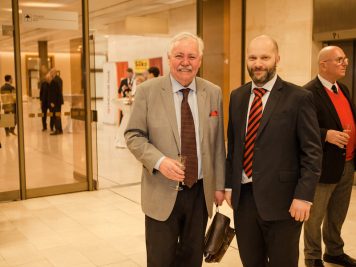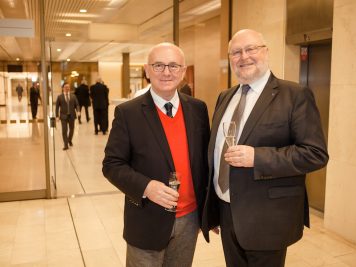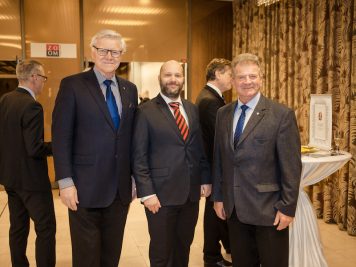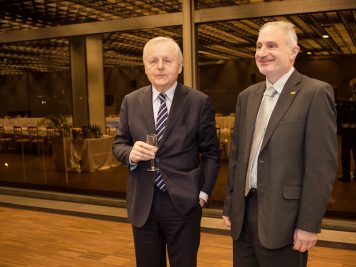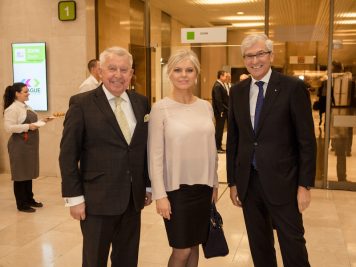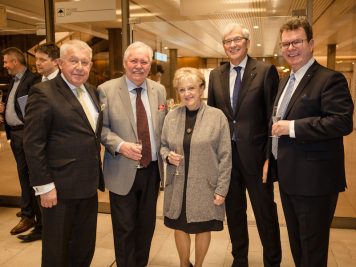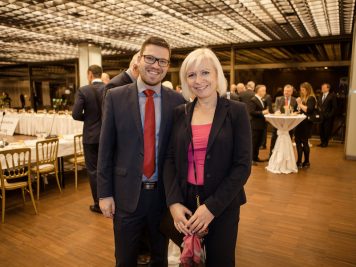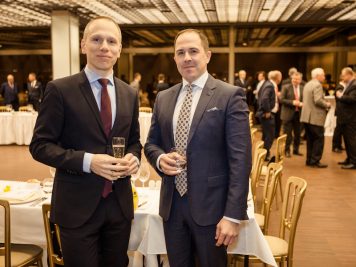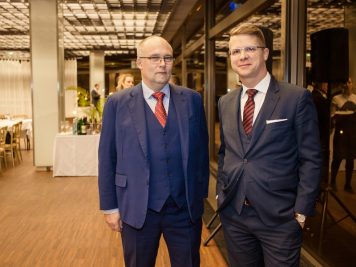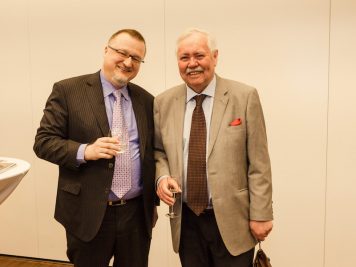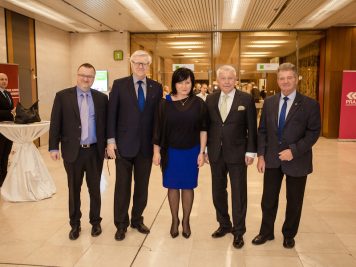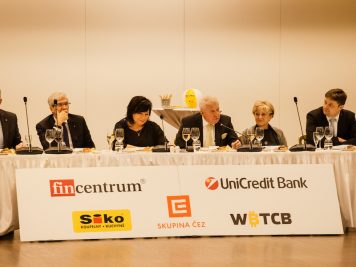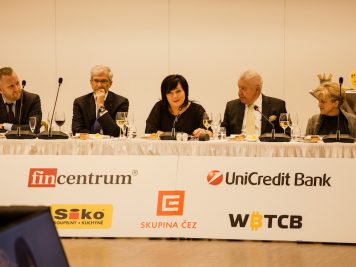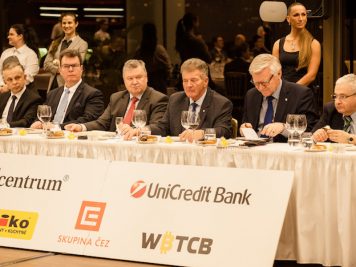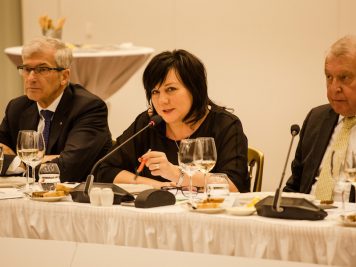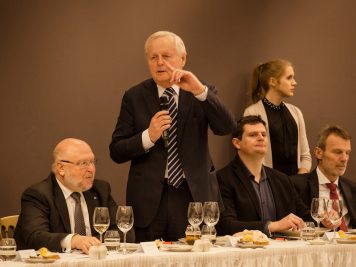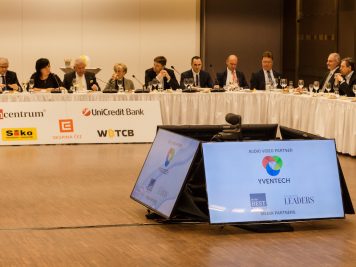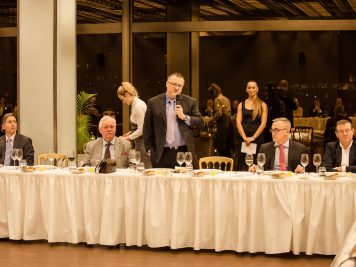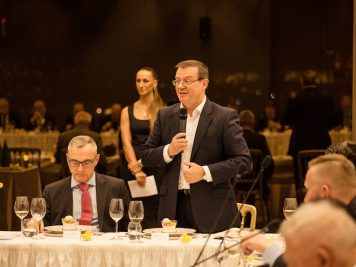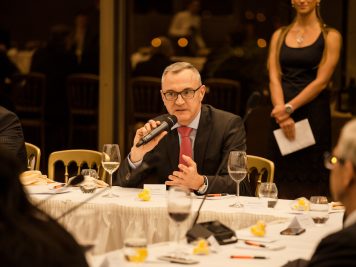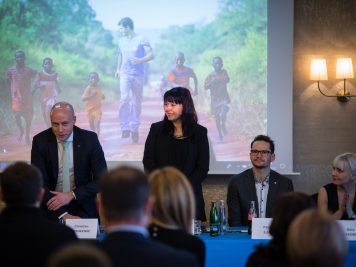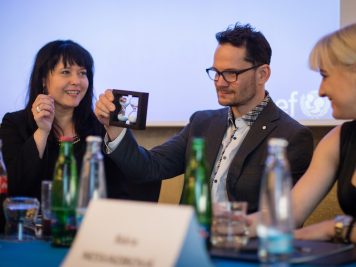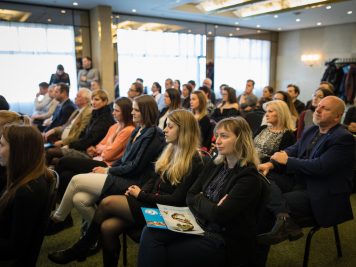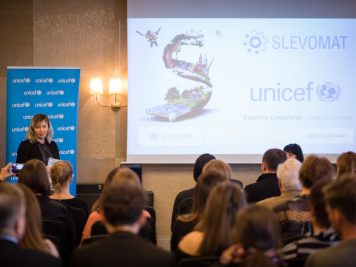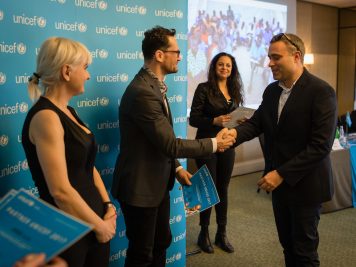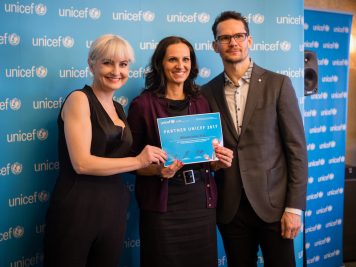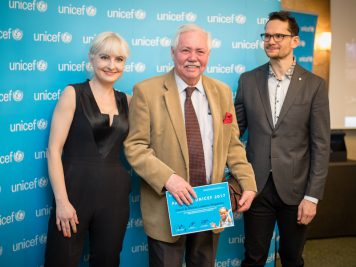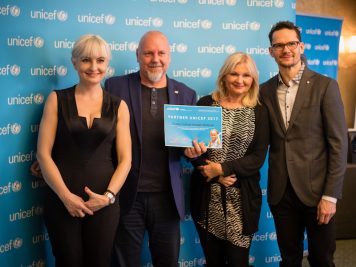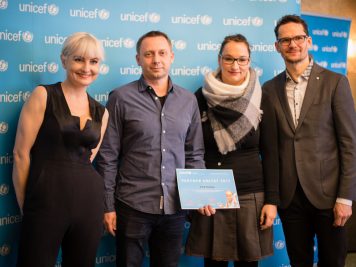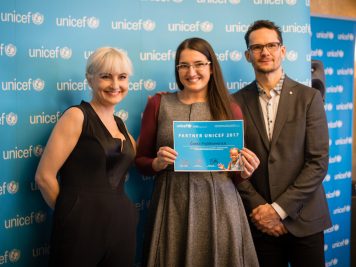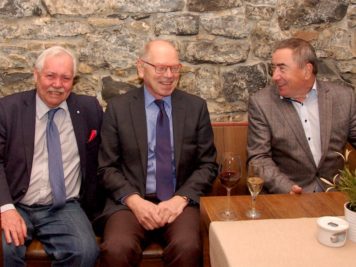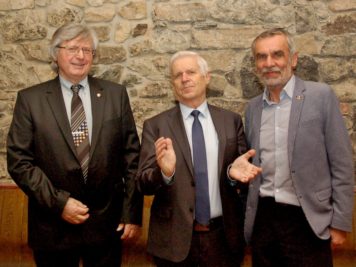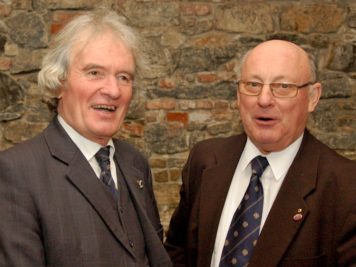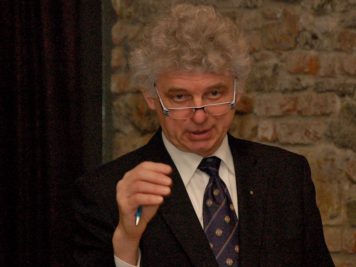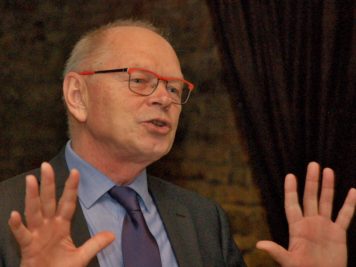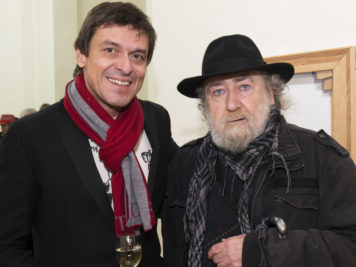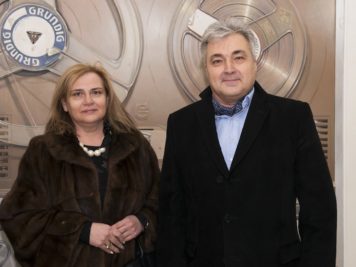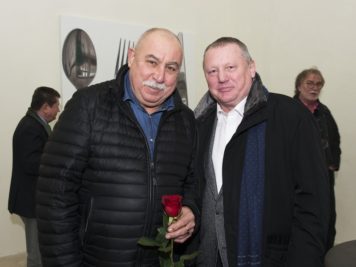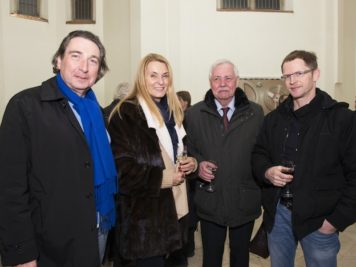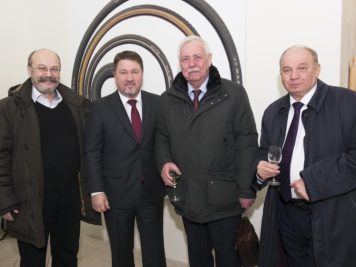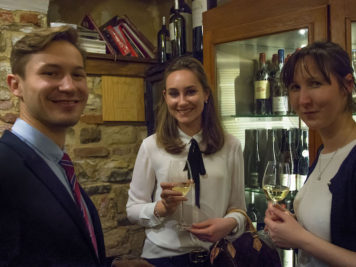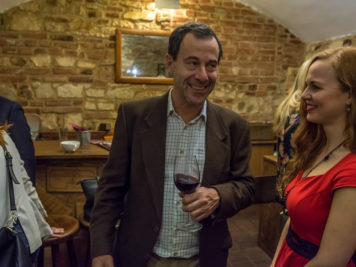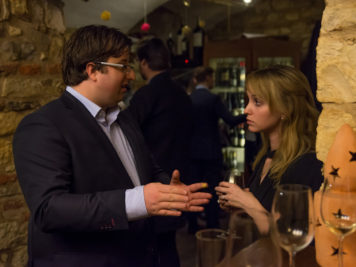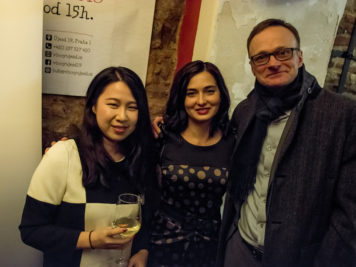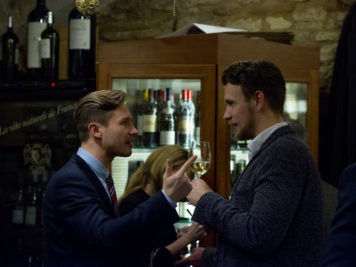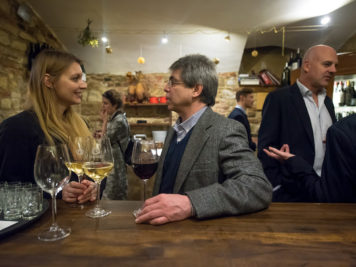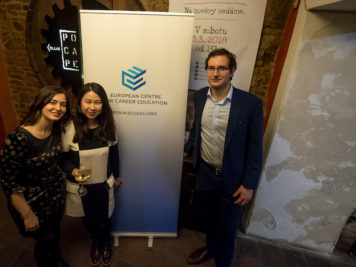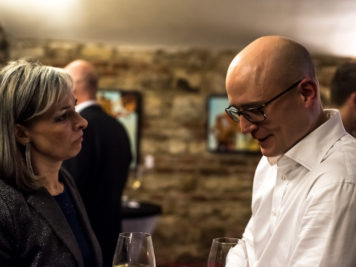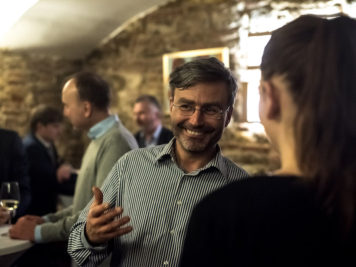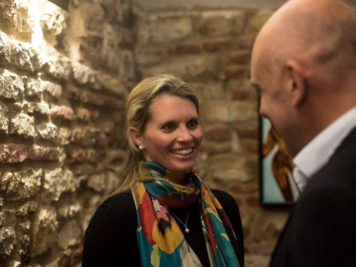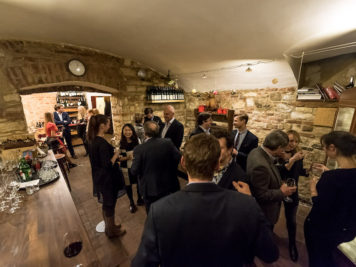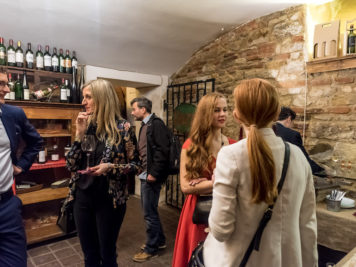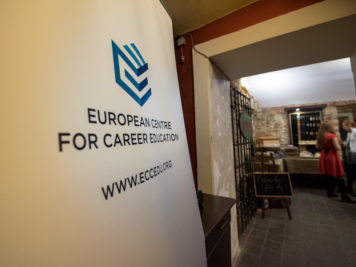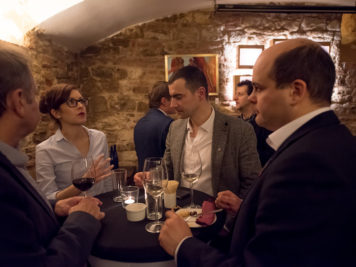On June 14th, the annual summer party of the German-Czech Chamber of Industry and Commerce (DTIHK/ČNOPK) took place at the historical site of the German embassy in Prague. The garden party in the 25th jubilee year of the chamber attracted around 1200 guests – a record! Among them high-ranking representatives of the Czech-German business, government and associations from both countries. Apart from networking, the chambers’ guests had a perfect time by checking out current and vintage Škoda models, flashing back into disco times of the 70s and 80s or taking a look at the famous Genscher balcony. Beautiful weather, cocktails, delicious food and vibrant music completed the atmosphere of this unforgettable summer night.
AuthorMartin Hladík
Silent whispers and murmurs of discontent resonated through the corridor as I stepped out of the meeting room. They weren’t directed at me (not this time), yet they made me shiver.
Who would want to hear a remark like that? Not any woman I know! Yet it’s this harsh feedback (solicited or not) that can sometimes be the best thing to happen to us. That is, if we overcome the initial shock and start looking at ourselves more objectively and honestly. It took me a long time to come to terms with feedback I received myself…
“Alena, you look so stern and strict! People must be really scared of you!” That was a comment from a gentleman I met at a social networking event. “What??? Me? What do you mean?” It took me a long time to get the point. I went through all the possible emotional stages from denial, through anger, depression to sadness and a lot of private talks with trusted friends and colleagues. Today I am grateful. It’s by far the best feedback I ever received in my life. It opened my eyes, it gave me a new level of self-awareness and understanding, even appreciation and brought me closer to finding the better version of myself, or so I hope.
How did we get here, ladies?
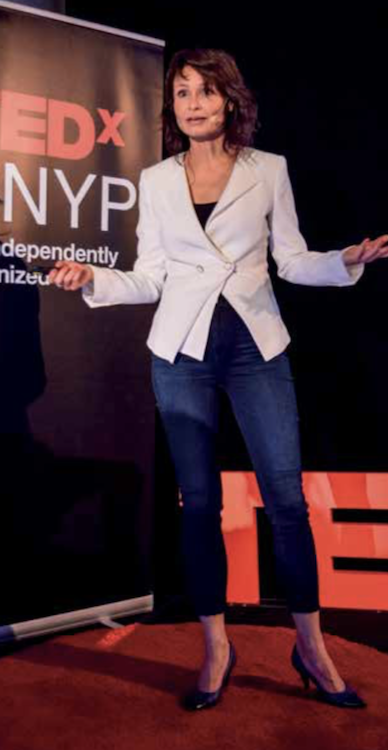
Alena Huberova
Ever heard any “bitch-related” rumor about you? If so, it’s time for some reflection. Each case is very different, of course! After all, you have your unique personality comprised of a number of inborn traits and learnt behaviors, your particular communication style and personal history. That’s what makes you the person you are today and that’s what radiates through your body, through your personal presence. In my particular case, it’s the behaviors and attitudes I learnt later in my professional career that, combined with my personality traits, turned me into a scary little monster in the eyes of others. And, I had no idea!
Without going into embarrassing details about myself, let’s just say that during my career, I had to develop a new set of skills, abilities and attitudes to be able to take on a leadership role and to navigate and succeed in a highly competitive environment. For better or worse, I learnt to be physically and mentally tough. I learnt to go after what I wanted, never letting my sight waver from the goal, I learnt to take action and be perseverant until things got done. I became competitive and started to enjoy the little wins along the way, which made me strive for more. I learnt to speak in public, making myself and my behaviors even more “visible” and “louder”. And when I started to display the same attitudes and behaviors back home – in my personal life – Uff! I guess you get the picture.
In short, I stepped into my masculine energy* and used it so much, for so long that it started to get the best of me. My masculine energy became predominant in my life and my feminine energy* was completely crushed. *
If you are in a position of leadership, you probably know what I am talking about. In my experience working with women in power, the consequences of working predominantly from our masculine energy can be disastrous. Our presence starts radiating too many ‘STRENGTHS’ signals** and we become disliked by others. People start perceiving us as overly bossy, ambitious, cold, in other words, “bitchy”. This is the price of violating the “gender stereotype”. We get punished by displaying traits and behaviors that are typically associated with men, not women. Our popularity goes down the drain and so does our impact.
You might say, who cares? I don’t strive to be liked! I strive to be effective! I hear you, yet think about this: if you could choose your own boss, who would you choose? Someone you perceive as highly competent yet cold, even aggressive? Or someone you perceive as highly competent and whom you also like because they appear as someone who genuinely cares, has empathy and a team spirit?
There’s more at stake though! By relying solely on your masculine energy*, you may get out of balance and suffer the consequences in your personal life.
Do you suffer from the “Bitch” syndrome?
If in doubt, the next page will show you a few points you can consider. This is by no means an exhaustive list of options, but it will get you thinking. If you resonate with at least 80% of the points, welcome to the club!
So now what?!
It may be that you’re perfectly happy with the way things are going for you in spite of the occasional “What a bitch!” remark and that’s fine. After all, your communication and working approach got you to where you are today and if it’s a good place, why change? However, if you feel you still don’t have the impact with others that you would like to have, there ́s something on the next page to help you. Please take 5 to 10 minutes to answer these questions and note down your ideas. I bet you’ll stumble upon something interesting and who knows, it may positively impact your success, influence and your overall happiness at the workplace.
THE BITCH SYNDROME
TALK LIKE THIS?
- You find it difficult to listen, the little voice in your head screams: “can you just get to the point for Christ’s sake???”
- Your communication is very focused, to the point, your phrases are short, simple, directive, some may say you enjoy barking out orders
- You find it difficult to relate to people’s personal problems, the little voice in your head whis- pers: “Keep it to yourself, will you? We’re here to work!”
LOOK & SOUND LIKE THIS?
- Your body is generally quite tense, controlled, with karate-like gestures
- You often catch yourself pointing fingers at others, or tapping your fingers impatiently on table or rolling your eyes
- You often rest your hands on your hips when sitting or standing
- You’re starting to notice deep creases and wrinkles on your forehead and the latest anti-aging serum is not helping! (tried the “frown-less-technique” yet?)
- Your voice is deep, strong and intense
- Your business wardrobe mostly consists of trousers and trouser suits
ACT & THINK LIKE THIS?
- You love staying on top of things
- You enjoy winning arguments
- You make decisions based on rational factors, emotions shouldn’t stand in the way
- You have an urge to prove yourself to others
- You believe that people can’t be trusted, they must be given instructions on what to do and how to do it
- You’re quick to dismiss people’s opinions and to judge their character
- Your career is your top priority, anything else can wait, including your partner
- Expressing emotions openly is utterly unacceptable
- The word “sorry” is not part of your vocabulary
- Nothing is too good, nothing is good enough
TEAM, A REFLECTION OF THE LEADER
- You take their work for granted, after all, that’s what they’re paid for!
- Your team is highly competitive, each member is striving to win
- Sharing and collaboration between members is lacking
- In general, there’s not much communication between you or your team members and between the members
- You’re the last one to know of any problems or conflicts, team members do not tend to share their frustrations with you
- You’re still waiting for an invite to the popular after-hours social events
- Go through the “Bitch syndrome” list and think about what drives and motivates you? How does it reflect in your communication style and behavior & attitudes towards others?
- What could you do to improve the quality of your relationships? How could you express more interest in the people around you? How could you show more appreciation for their work?
- If someone sees you for the first time, what do you think they would say about you? Are you aware of the signals** your presence radiates and how they impact your interaction with others?
- How do you spend your time outside the office? Do your leisure activities boost the masculine or the feminine side of you?
- How could you bring more of your feminine energy into your business interactions?
Please share your findings with me. I really enjoy reading your stories and may be able to provide you with further feedback!
Remember, harsh feedback is still feedback.
Embrace it! Run with it! Use it to propel you to new heights in your life!
By ALENA HUBEROVA
Presentation coach, speaker and communications trainer
www.alenahuberova.com
alena@alenahuberova.com
*Masculine energy is forward moving, it’s all about action, logic and results whilst feminine energy is inviting, it’s about nurturing, tenderness, empathy.
** I wrote about the signals of STRENGTH & WARMTH in the Your Body=Your Story article from the August 2017 issue of this magazine.
ABOUT ALENA HUBEROVA
Alena assists business leaders all over Europe in developing a powerful personal presence on and off-stage, and delivering presentations that get people’s buy-in and inspire action. She also acts as a mentor for startups helping them design and deliver winning business pitches.
She has a professional background in sales, marketing and communication in a variety of sectors including IT, travel and tourism, wellness and beauty. She lived and worked in 5 different countries in Europe and Asia.
In collaboration with Presenation.com, she coached the X.GLU Czech Team to win the world title at the Microsoft Imagine Cup in 2017. Alena’s other achievements include being a speaker at the TEDx UNYP 2017 conference and winning the second place in the 2018 Czech National Championship of Public Speaking.
A commemoration ceremony took place in the Senate marking the hundredth anniversary of the signing of the Pittsburgh Agreement, in which Czechs and Slovaks living in the USA supported the establishment of an independent Czechoslovakia. Senate Vice-President, Jaroslav Kubera, alongside Slovak Ambassador to the Czech Republic, Peter Weiss, and American Ambassador, Stephen B. King, recalled the importance of the document for the establishment of the Czechoslovak Republic. A copy of the Pittsburgh Agreement is on permanent display in the Senate Chamber.
Events attended or hosted by Miloš Zeman, President of the Czech Republic
“Strategic Autonomy, Stronger Europe in a Turbulent World?”
The annual Spring Security Conference with a provocative title “Strategic Autonomy, Stronger Europe in a Turbulent World?” took place on Friday, May 25th, 2018 in House for Professed, Prague. The conference with more than 180 attendees was traditionally organized by the Center for Security Policy, IPS, Faculty of Social Sciences, Charles University in cooperation with Friedrich-Ebert-Stiftung e.V. representation in the Czech Republic. On the eve of the conference, the Ambassador of Italy in Prague hosted a reception for speakers and partners.
Founded by the Association of Czech Insurance Brokers (AČPM) and co-organized by the Czech Insurance Association (ČAP) and the specialized information server oPojištění.cz
The 18th year of this oldest professional contest in insurance culminated with a gala evening held in the Congress Centre of the Czech National Bank in Prague on May 22, 2018, under the auspices of the ČNB governor Jiří Rusnok.
The insurance brokers – as experts who work with insurers on a daily basis – assessed the insurance companies ́ performance for 2017 in the following categories: insurance of industry, car insurance, civil insurance, specialized insurance and life insurance. Out of these five categories, Česká podnikatelská pojišťovna won three, Kooperativa pojišťovna reached for the first place in life insurance, and ERV Evropská pojišťovna, after a year ́s pause, returned to victory in the specialized insurance category.
As in previous years, the organizers also voted for “Personality of the Insurance Market” – a title awarded for an outstanding contribution to the development of insurance. This time the lot fell upon Jiří Charypar, one of the founding fathers of Allianz in the Czech Republic.
Within the framework of the contest, the insurers also judged the overall performance of insurance brokers. Thus, RESPECT a.s., an AČPM member, received the Insurance Broker of the Year 2017 award.
The gala evening was preceded by traditional Brokers ́ Afternoon, a networking event of insurance brokers and their counter-partners from insurance houses.
The Embassy of Greece in Prague, in cooperation with the Aldemar Resorts Group and with the valuable support of the Greek Tourism Organization, held an event to promote Greek gastronomy and tourism, on 14 June, at the Residence of the Ambassador of Greece.
The guests had the opportunity to enjoy Greek high gastronomy delicacies prepared by the Executive Chefs of Aldemar Resorts and Sympossio, accompanied by the fine Greek wines of Oinotropai Estate, to the sounds of live Greek music.
Did you know that?
New Energy Union governance deal reached
Representatives of the European Commission, the European Parliament and the Council reached a political agreement on the governance of the Energy Union at the end of June. Member States will be required to submit to the Commission drafts of their national energy and climate strategies for the period 2021 to 2030, which the Commission will subsequently comment on. In addition, the new system will ensure greater consistency with the objectives of the Paris Climate Agreement and strengthen regio- nal cooperation. Member States will have the flexibility to fully determine their national energy mix.
Free flow of non-personal data
Representatives of the three major European institutions reached a political agreement on the new rules on the free flow of non-personal data in the EU. The new framework forbids all restrictions on data localization, in other words, data can be stored and processed everywhere in the EU. Member States will be able to introduce restrictions only in specific cases, for example when it comes to public sector data, but they will have to inform the Commission in advance. Data will be accessible to public authorities no matter where they are stored. In addition, the Framework supports the development of codes of conduct for cloud services that would facilitate the transition from one provider to another under clear conditions.
Common testing methodology for food quality unveiled
In mid-June, the Joint Research Center of the European Commission issued a common testing methodology for comparing the quality of food products in the EU. It will enable national authorities to test and compare the composition of food products of similar appearance in different Member States. Issuing a common testing methodology is part of a so-called New Deal for Consumers. Laboratories across the EU will conduct a test based on this methodology and assess whether there is a problem of dual quality of food products in the EU. The test results should be known by the end of the year.
New rules for safer use of drones
The European Parliament backed new rules on the safe use of drones in mid-June. It also agreed to amend the aviation safety rules in the EU. Most drones today fall under national rules, which may hinder market development. Based on the risks associated with, for example, the weight of drones or areas of operation, future drones should have additional features such as automated landing in case of loss of contact. This means that some drone operators will have to go through training in the future. The European Commission now needs to prepare more detailed rules, for example, regulating the maximum height and distance for drones, drones certification and training of their operators.
Renewable energy target by 2030 set to 32%
Representatives of the European Parliament and the Council reached provisional agreement on the share of energy from renewable sources in the energy mix by 2030, which should be 32%. A revision should be made in 2023 that could further increase this percentage. In addition, representatives agreed that 14% of fuels for transport should come from renewable sources by 2030. Furthermore, the proposal promotes greater consumer engagement in the energy generation and consumption process and increases the share of renewable energy sources in heating and cooling sector.
Let ́s talk numbers!
Advantageous loans for Czech social enterprises
The Commission signed a deal with Erste Group to provide a total of EUR 50 mil. in loans from the European Employment and Social Innovation Programme. Funds will go to support social enterprises in seven EU countries, including the Czech Republic, in the next five years, which start or develop their business and create jobs. Up to 500 businesses and non-governmental organizations will be able to obtain soft loans at a lower interest rate and with lower collateral requirements.
EUR 100 billion for Horizon Europe
The European Commission presented a draft budget for the European Programme for Research and Innovation 2021-2027 called Horizon Europe. The Commission proposes to allocate EUR 100 billion to research and innovation activities. In addition, the Commission proposes to introduce several new elements, including the European Innovation Council, which should help with the application of the technologies with the greatest market potential, or research and innovation missions addressing various societal and industrial challenges. The Commission also wants to maximize innovation potential, particularly in countries lagging behind in this area, for example by synergies with the Structural and Investment Funds.
EU and euro area GDP increased by 0.4% in Q1 2018
According to Eurostat, GDP in both euro area and the EU28 increased by 0.4% in the first quarter of 2018 compared to the previous quarter. Compared to the first quarter of 2017, there is an even bigger improvement in growth of 2.5% in the euro area and 2.4% in the EU28. Poland and Latvia (+1.6%), Hungary and Finland (+1.2%) recorded the largest quarter-on-quarter growth rates, while the only negative growth was observed in Estonia (-0.1%). GDP growth in the Czech Republic reached +0.4% in the given period.
EUR 9.2 billion for new digital programme
The European Commission announced the first ever EU programme dedicated to investing in digital areas as part of the next Multiannual Financial Framework 2021–2027. The Commission has identified a total of five sectors whose development should boost EU competitiveness and increase the EU’s strategic digital capabilities. The Commission proposes EUR 9.2 billion for the programme, which should be divided into 5 categories, namely supercomputers (EUR 2.7 billion), artificial intelligence (EUR 2.5 billion), cyber security and trust (EUR 2 billion), digital skills (EUR 700 million) and ensuring a broad use of digital technologies across the economy and companies (EUR 1.3 billion).
Czech Republic has the highest job vacancy rate in the EU
According to Eurostat, the job vacancy rate for the first quarter of 2018 was 2.1% in the euro area and 2.2% across the whole EU. Compared with Q4 2017, there was a growth of 0.1% in the euro area and 0.2% across the EU. The highest vacancy rate was recorded in the Czech Republic (4.8%), Belgium (3.5%) and Germany (2.9%), the lowest one in Greece (0.7%), Portugal and Spain (both countries 0.9%).
In the world!
Negotiations with Australia launched
The EU officially launched negotiations on a comprehensive and ambitious free trade agreement between the EU and Australia in mid-June in Canberra. The agreement aims to remove barriers to trade in goods and services, create opportunities for small and large businesses and also set ambitious rules in line with other EU trade agreements. The first round of talks was held in Brussels from 2nd to 6th July.
EU introduced rebalancing measures on US products
The European Commission adopted a regulation introducing rebalancing measures as a reaction to US tariffs on imports of steel and aluminium products. The Regulation establishes additional customs duties on steel and aluminium products, agricultural products and other products with a total value of EUR 2.8 billion. US tariffs will affect European exports worth EUR 6.4 billion, and the EU is therefore planning to introduce compensatory measures worth another EUR 3.6 billion at a later stage. The regulation entered into force on 22nd June.
New EU trade defence instruments
At the beginning of June, new EU trade defence instruments entered into force. They allow, in certain cases, to impose higher duties on imports of dumped and subsidized products and shorten the time of anti-dumping investigations. The investigation period should be reduced from the current 9 to 7 months, after which it will be possible to apply provisional measures. In particular cases, the new rules also allow to circumvent the so-called lesser duty rule and to impose higher duties in all anti-subsidy cases and anti-dumping cases where imported products were made from raw materials and energy provided at an artificially low price.
MEPs want Privacy Shield to be suspended
Members of the European Parliament’s Civil Liberties, Justice and Home Affairs Committee called on the Commission to suspend the so-called Privacy Shield between the EU and the US because it does not provide adequate protection of personal data. In their resolution MEPs demand the data exchange agreement to be suspended if the United States fail to comply with the rules by 1st September 2018. The suspension should last until the US authorities have fully complied with its terms.
EU opens IPR case against China
At the beginning of June, the EU filed a lawsuit at the World Trade Organization (WTO) against Chinese legislation that undermines intellectual property rights of EU companies operating on the Chinese market. European firms coming to the Chinese market are forced to grant ownership or the right to use their technology to Chinese entities and do not have the opportunity to freely negotiate terms in technology transfer agreements. According to the EU, these requirements are contrary to the WTO rules, and in particular the TRIPS Agreement.
Brought by CEBRE – Czech Business Representation to the EU

Attention please, wanderlusts! Have you planned out your perfect 2018? Have you satisfied your traveling needs? Of course, that’s probably not possible for most of us. But we can try! The world is a magical place full of unique destinations that are charming in their own way. And many believe that traveling is the most important aspect of our lives, stories that we’ll tell one day to the youngsters, that’s what matters the most. Well, you can’t have stories if you stay in one place all the time so let’s see what five destinations you have to visit this year!
Malawi

Are you ready for Africa? Malawi is a unique little place situated in southeastern Africa and it features untouched nature, lush greenery and everything you want to avoid in mainstream travel destinations. Yes, Malawi has successfully evaded changes, it is still a well kept secret and that is what’s so special about this country. You will be spoiled for choice when you arrive, since there are so many things you could try. However, it is recommended that you try a bit of everything. The waters of Malawi are crystal clear so snorkeling is always a good idea there. If you aren’t the underwater type, you have to go on a safari. The wildlife is truly remarkable there; you’ll get to meet hippos, antelopes, and many more inhabitants that are eagerly awaiting for you. So, make a visit to Liwonde National Park the top priority on your list. Also, if you’re into history, check out the Museum of Malawi in Blantyre. That’s the only way to take in some of the historical heritage of the nation. Do know that it can get hot in Malawi so a good idea would be to visit it between May and October since that’s the time when the hemisphere is in the middle of its winter.
Hong Kong
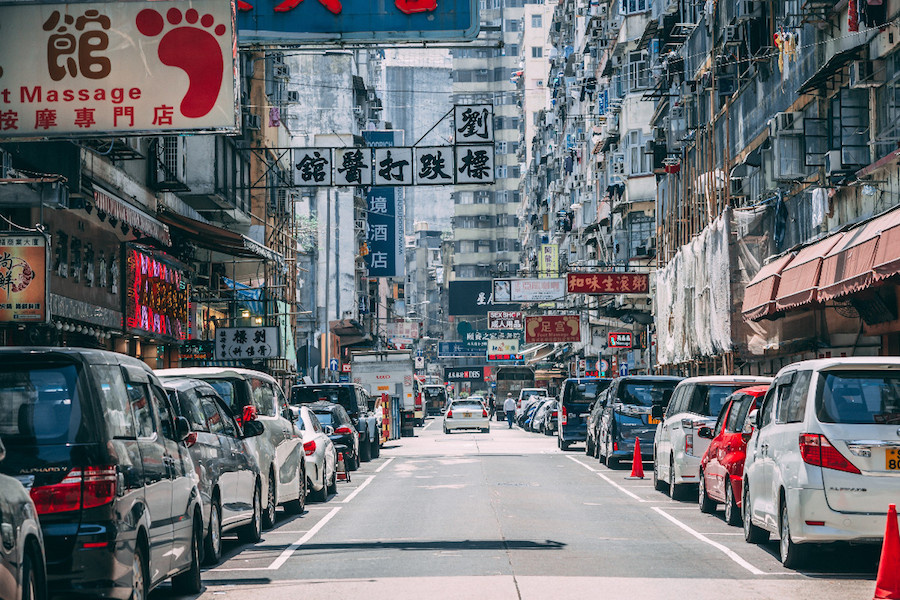
Hong Kong is a place where you get to meet a truly different and special culture, tasty but unique food, interesting people and even more interesting and beautiful architecture. But do you know what more and more tourists talk about after their experience in Hong Kong? They always talk about hiking. Surprising, right? Well, Hong Kong is actually quite popular for its hiking trails and basically everyone who’s into hiking knows this. Hong Kong’s hiking city tours provide you with a completely different take on the whole city and what’s even better is the fact that you don’t have to be an experienced hiker to complete the tour. And when you do get tired and hungry, make sure to visit a good Hong Kong restaurant to replenish your energy and get a taste of some great dishes. It doesn’t matter whether you opt for the traditional Asian cuisine or maybe you want to experiment a little and try new things, Hong Kong will no doubt deliver. Your senses will be more than satisfied and your mind for sure will be blown away. Some of the popular meals include roast geese, beef briskets and of course, the noodle soup. The rest of the extravagant dishes are left to you to discover for yourself when you visit Hong Kong. Also, if you’re into fashion, you’ll love Hong Kong. It’s not as famous as Paris and Milan but it still has a lot to offer to those of you who are fashion-aware and are always looking for the newest collections.
Cape Verde Islands
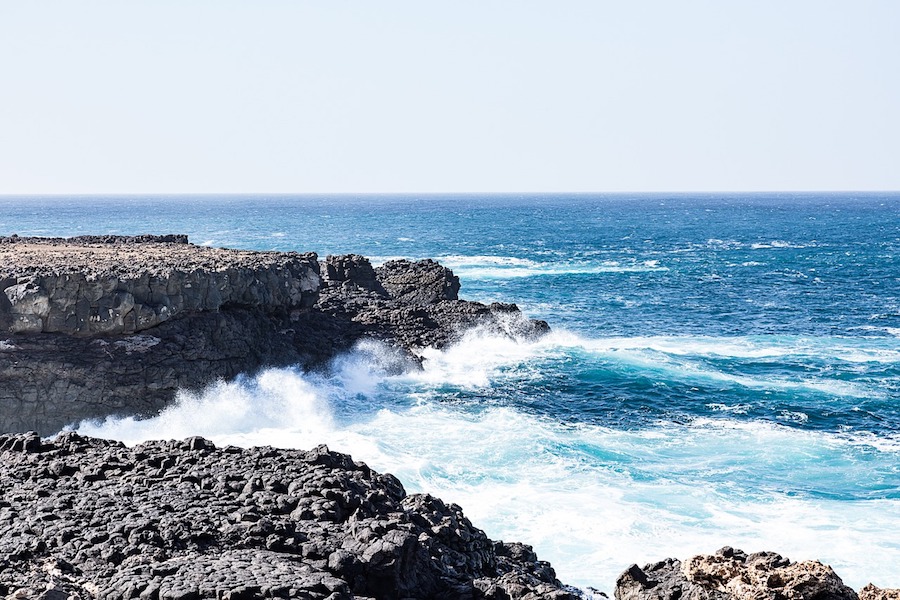
Mix Brazilian, African and Iberian influences and you get stunning landscapes and even better weather. The Cape Verde Islands lay just off the west coast of Africa and they are becoming quite a popular vacation destination lately. This 10-island Atlantic archipelago boasts its pristine clean beaches and nature along with a unique homegrown culture that dates back to the 15th century when the first Portuguese arrived. Wanderlusts almost always think of music when they hear Cape Verde. Yes, music is something different here, since its melodic heritage stems from three of the mentioned cultures. So, there is no surprise that Cape Verde is responsible for five distinct musical genres, one of which is morna, the national music and dance. However, this place isn’t just about great music and lovely beaches. There are some quite amazing mountains and volcanic peaks. In between you’ll find towns full of pastel houses and hiking trails that meander across lava fields along deep ravines and through the island’s unique Dragon Trees. Last but not least, take a sip of the locally manufactured grogue (rum). Take a sip of gorgue while listening to morna and you’ll realize how great these islands are.
Serbia

Serbia is best known for its people. People in Serbia are hospitable and kind, they are always willing to help with whatever you need and they’ll always know where the best party in the city is. As a tourist, you’ll be a superstar there. This cute country once was a part of Yugoslavia and most of the tourists today still associate Serbia with this country that no longer exists. However, you should really give Serbia a chance, since you’ll have a hard time finding a place that has this kind of magnificent scenery, abundant history and great value for money. Its capital Belgrade has a reputation of a city that knows how to party. Belgrade is also quite unique due to the fact that it had been destroyed more than 10 times in the past but yet it somehow managed to stand back up and rebuild itself. You’ll notice that Belgrade features urban Soviet gloom mixed with a taste of sophisticated European architecture. If you’re into winter sports, you definitely have to visit Kopaonik and Zlatibor national parks. Even if you want to visit during the summer, you’ll still be spoiled for choice there. Last but not least, in the southern part of the country there is a magical place called Đavolja Varoš (Devil’s Town). This ‘town’ is a stunning geological spectacle of strange rocky pinnacles that almost became another Wonder of the World. Oh, and remember to try slivovitz, it’s mad good in Serbia, because Serbs invented it.
Nevis

The birthplace of Alexander Hamilton – the magnificent Nevis! You’ve probably pieced together the puzzle and you now know that this fellow from the Caribbean was born in Nevis before arriving in the colonies. Nevis is a quiet little island that lagged behind its larger twin that goes by the name of St. Kitts. Fortunately, Nevis was spared damage from hurricanes in 2017, unlike the neighboring islands. The best thing about this place is that even the people who believe that they’ve explored above and beyond when it comes to the Caribbean stand dumbstruck when they visit Nevis. Nevis is amazing because there’s no other place that connects the way of life and the peaceful nature better than this island. Find your place on the coastline of Nevis and take some time to contemplate life. Oh, how beautiful it can be. Nevis is only yet another proof of that.
Hopefully, you now have an idea of where your next vacation is going to be. It would be unfair to place one of the mentioned destinations above the rest because they are all beautiful and charming in their own way. It would be best if you could visit all five of them.
By Peter Minkoff
Peter is a lifestyle and travel writer at Men-Ual magazine, living between Ústí nad Labem and Antwerp. Follow Peter on Twitter for more tips.
At the beginning of May, the European Commission published its proposal for the future Multiannual Financial Framework (MFF) for the period 2021-2027. Therefore, the future MFF has been the main topic of a debate organised by the Representation of the European Commission in Prague, Information Office of the European Parliament in Prague, Confederation of Industry of the Czech Republic and CEBRE on 25th May in the European House in Prague. To create a balanced budget proposal, the Commission had to react to new challenges but also continue supporting successful ongoing initiatives. Furthermore, the gap of 84 bn. EUR in the budget created by Brexit had to be taken into account, therefore some cuts were necessary as well, mainly in the cohesion policy and common agricultural policy. Furthermore, the budget line focused on security, defence and border management had to be strengthened. As for the Czech Republic, the leading ministry assessing the proposal and negotiating in the Council will be the Ministry of Finance together with the Office of the Government of the Czech Republic. Both institutions welcome the idea of increasing effectiveness and overall simplification in the budget.
The mandate of the current EU institutions is slowly, but steadily coming to an end. However, several important legislative proposals with a significant impact on businesses are still on the table. Specifically, the Single Use Plastics Directive, the Mobility Package, and several legislative proposals in the area consumer issue. The impacts of these proposals were discussed by CEBRE founders together with Czech MEPs on 15th June in the premises of Czech Chamber of Commerce in Prague.
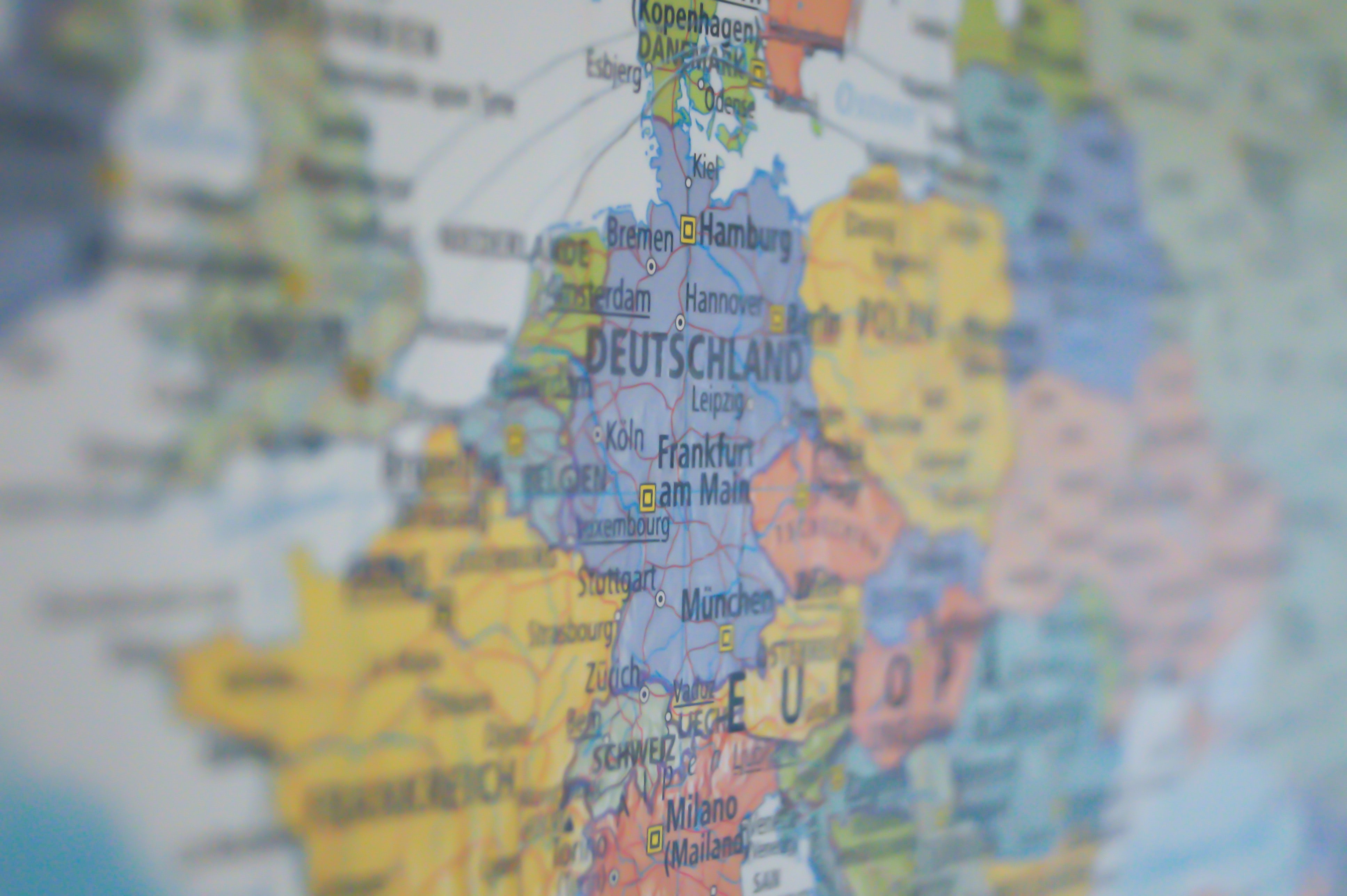
And now comes the time for holidays for most citizens in Europe, but also time for everyone in their offices to have a couple of quieter weeks, dedicating their work to more fundamental tasks like reviewing their processes or closing late files that lie on their desks.
But after the first wave of transposition of GDPR, IDD (almost), PRIIPS and MIFID 2, it’s also time for questions.
If Europe is again asking about her future, advisors, intermediaries, producers and clients are doing the same – and for our advisors and intermediaries, it would be useful to spend more than a few weeks this summer creating their New Relationship Models, their processes and, at the end of the day, thinking about the goals and hopes for their SMEs.
Having said that, let’s have a look at the situation.
On one hand, we are facing authorities and, perhaps more than them, the EC, considering that they should “now and again” go forward and propose rules anew, for all of us, before any of the previously quoted texts have been fully applied and, by the way, their effect understood.
On the other hand, everyone is talking in the same sentence about the need for: “advice”, “self-assessment”, “cost reduction”, “stronger firms”, “best product”, “better education of both professionals and clients”, “financing SMEs” and … “less risk for investors”.
Then, perhaps it’s now time for our questions?
Is it possible to create, in an “ongoing manner”, new rules for the same situation – or, in fact, for the rest of our lives – hoping to create some profit from our industries to be invested in a way that may produce wealth for all?
Is there any situation in a normal life one should accept, where men and women are supposed to give advice and help a client but are forced to work harder for a decade on processes and compliance reviewing, than on the client’s situation but … are then accused of being paid too much when this money is increasingly used to meet costs – and their margins have fallen below the level of many industries?
Is it possible that the writers of these texts are hoping for a better advice process compared to what they expect from a situation where a producer is also the seller/distributer, particularly as our industry has the ability to avoid this?
Is it possible for the only people in that game who are expected to remain human, at least for the next couple of years (the retail investor), to put his or her money in one firm, for the welfare of the entire economy, without any risk? Is it possible for them to be educated in finance, when they don’t want to be in many cases – they just need advice and have only a few Euros to spare? They may not be opposed to “advice” from a robot but may well prefer advice from a person to whom they can explain their personal and emotional situation, perhaps because their dad is dead or their wife or husband has gone!?
Is it possible that the work of the Advisor or qualified Intermediary should always cost less and less despite the costs of his life and his firm’s running costs increasing? That adviser could of course be a robot. But we are all now discovering the real cost of automation (absolutely not free), the dedicated rules (more difficult to manage than with human staff), the resultant firing of some of our employees/citizens/Tax payers – but also the advantages (it’s quicker, it avoids “some” but not all mistakes, it offers a perfect employee, always in agreement with you or … not in agreement with you on one issue so you have to do things that fit in with the IT!).
So, the job is moving but costs keep rising – the price for global and not local security for clients and our economy. Is it impossible that the regulations that producers, humans and economic agents deal with can become reasonable and, as a minimum, let us adapt our IT or basic processes to one text, before creating another?
But, whether robot or human, our activities are still needed by retail investors and firms, and our market share is growing every year. At FECIF and at every Association, mostly our members, we help them to better understand and practically adapt to the ongoing new regulation, for the interest of our firms, our European economy and our clients.
So, dear citizens of Europe, advisors, intermediaries, clients, have a nice summer, but do keep it in mind. If our members do the expected job for a good adaptation to the new rules in the next 2 months, when they’ll be back at work, the world of finance, insurance and banking offered to the “normal” citizen you have known before, will have changed dramatically, for better or worse. A wedding phrase but the truth. Aren’t we all part of the same market, linked to each other, the client of one another?
And please, madam Europe, during this incredible year of 2018, we’ll use the summer in order to build the firms of the EC’s dreams, but let us take a breath after that …
Source: FECIF
Written by:
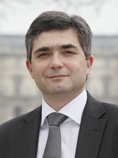
David Charlet, Chairman
Photo coverage of a diplomatic event

Fountains at Peterhof Palace
This May, St Petersburg celebrated 315 years since its foundation. St Petersburg is one of the few cities in the world to have experienced a large number of historically important political and economic events over a relatively short period of time. The reign of eleven emperors, the Bolshevik Revolution, the cruel three-year siege during the war, dozens of floods, economic and political collapse, impressive economic reform and the subsequent complex path to modernisation.
Saint Petersburg as we know it today was founded by Tsar Peter the Great. A desire to change views on a nation which until then had been seen as backwards and stuck in the Middle Ages led the Tsar to make major changes in Russians’ general style of life, in accordance with the model of the then advanced Europe. These changes affected everything, from city redevelopments, a new architecture style, economic changes, administrative changes and changes in the way of dressing and behaviour of the population, with the introduction of social rules, cultural events and new traditions.
St Petersburg’s history began essentially with a war that broke out between Sweden and Russia over access to trade routes to Europe across the Baltic Sea. Peter the Great ordered the construction of the Peter and Paul Fortress located in the centre of the city, which had a major impact on its defence and future strategic development. The first stone was laid on 27 May 1703.

Museum Fabergé

Russian barock

Saint Isaac ́s Cathedral
Renowned architects such as Domenica Trezzini, Jean-Baptiste Leblond, Bartolomeo Rastrelli and many others were invited to St Petersburg. Tens of thousands of Russians from across different regions were forced to help construct the city in line with European standards. Peter the Great wanted to build a second Venice, and he also found inspiration in Paris and Amsterdam. A new city was built up on the site of a swamp, a city with the most extensive red granite paving in the world, a city interwoven with water channels and dozens of bridges. The special architecture known as Russian Baroque was born.
It was mainly Empresses Catherine II (1762-1796) and Elizabeth who were responsible for the city’s further development and rich history. Over this 50-year golden age of Russian art, Russian Baroque, then Classical style were implemented in architectural works such as the Winter Palace, Smolny Convent, St Vladimir’s Cathedral , Anichkov Palace, the Marble Palace, the Old Hermitage, the Admiralty Building, the Stock Exchange, etc., mainly built along both embankments of the Neva River. The golden age continued with the reign of Alexander I, who fought Napoleon, Nicholas I, Nicholas II, and Alexander II and III.
The city’s population grew tenfold over a short period. As such, slums began to appear, high-density buildings with dark and damp courtyards in which Dostoevsky set his novel (Crime and Punishment). The fast growing city was beginning to contend with the consequences of the arrival of the First World War, with social problems and with a growing chasm between the upper feudal class and the working class “muzhiks”. In the end, Russia’s war with Japan, a depression and reckless reforms led to an armed rebellion across the empire led by the Bolsheviks and the end of Russian autocracy.
Economic decay after the First World War, a depopulated countryside, and a dissatisfied and hungry nation represented a simple and understandable tactical tool for Lenin, who quickly and brutally turned
on the head of the whole of Russia’s despotic feudal system, putting an end to the Emperor and setting up the Soviet era. It is remarkable that the new illiberal Soviet regime, despite bringing no improvement in the nation’s situation, survived a whole 70 years, although Lenin’s era did not last that long. Lenin’s idealistic economic strategy was unable to overcome economic decay and impose law and order on the growing anarchy. Every attempt at restoring the monarchy was brutally suppressed, and the Soviet dictatorship of the proletariat was implemented under the oppression and brutal rule of Stalin and his empire. Even during this period, however, Prokofiev and Shostakovich, for example, lived and worked on their craft here.
Beginning in the mid-1980s, the catastrophic consequences of Russia’s incompetent economic policy and social oppression forced the Communist Party to implement new reforms and make fundamental changes within the archaic Communist Party Central Committee leading to Mikhail Gorbachev’s policies of perestroika and glasnost. Further inflation and uncontrolled new reforms leading to an attempt at opening the country to the free market in 1990 found the country instead heading towards economic collapse and the end of the Soviet Union.
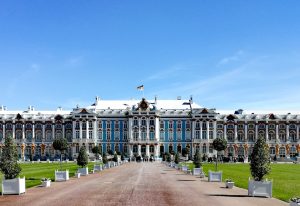
Catherin ́s Palace

Senate square

Kronstadt Naval Cathedral
In 1991, the city of Leningrad was once again renamed Saint Petersburg, and over time it prevailed over political idealism, finally leading to growth in enterprise and capital development.
Many international cultural institutions, heads of state and major societies took part in this year’s celebrations of the city’s 315th anniversary, including France’s Fraternity of Knights of the Wine- Tasting Cup (Chevaliers de tastevin). One hopes that this new era of prosperity, efforts at establishing democracy and open international relations will become a permanent feature of St Petersburg’s future.
Author: Ing. Arch. Iva Drebitko;
Photos: author’s archives

A couple of months ago I read an article that quoted LinkedIn’s CEO. He was asked what he considered the most critical competency missing at work today, he said good communication.
Today’s work environment requires use of cell phones, tablets, PC, so as to guarantee the 24/7 connection between the individual and work. There is an expectation of “immediate” response to emails text’s and voice messages. In addition this mind set overlooks culture and human nuances. There is an assumption the “we are ALL in this together” so cultural norms are overlooked by the power of connection and technology.
The reality is that this assumption is dead wrong. Actually what we have are employees reacting 24/7 to what I call “technological chatter” and the overall result seems to be a lot of conflict, lack of engagement, mental fatigue, lack of productivity and innovation. LinkedIn’s CEO is right!
So let’s take a look at what you can do to stop this trend. At present I’m going through a process of coaching a woman from Prague who leads a multicultural team. Her experience has been challenging but she has managed to create a shift from “connections to communication” amongst her team. She has seen examples of business success and positive outcomes.
My first recommendation was to look at information related to cultural trends and how they impact work. For example how is power defined in Prague vs France or US? Communication requires meeting of the mind and buy in and unless the individual feels understood they will not respond favorably to you. I always recommend using Hofstede’s and Fons Trompenaar ́s work, experts in helping identify values and cultural differences so that one can develop a degree of sensitivity and context when interacting with people from other cultures.
Second, and perhaps this is the most critical consideration, stop using emails in substitution of conversations. Emails were created to exchange information not to “create” dialogue. Dialogue can ONLY happen amongst two people face to face. The moment my coachee started to use the phone, Skype and leveraged her travel, to really connect one on one with the team, things started to change.
Third, research shows that “time outs” from the phone and computer are essential for the brain, it needs a chance to rebut. It is a fact that the brain starts to lose efficiency after 8 hours of work. My coachee has asked her team members to take short brakes during work and she is finding that efficiency is higher as well as a reduction of stress and conflict. Time outs allow for “cooling off periods”.
Fourth and for me the most important, let’s reconnect with the art of dialogue, of healthy communications. Nothing substitutes body language, the nuisance of the voice, laughter. Let’s put technology in our use and let’s reclaim written thankyou notes, gatherings with coworkers to discuss and clarify issues, improvised lunch and even maybe a summer event!
Elisabet Rodriguez Dennehy
President, Rodriguez and Associates LLC
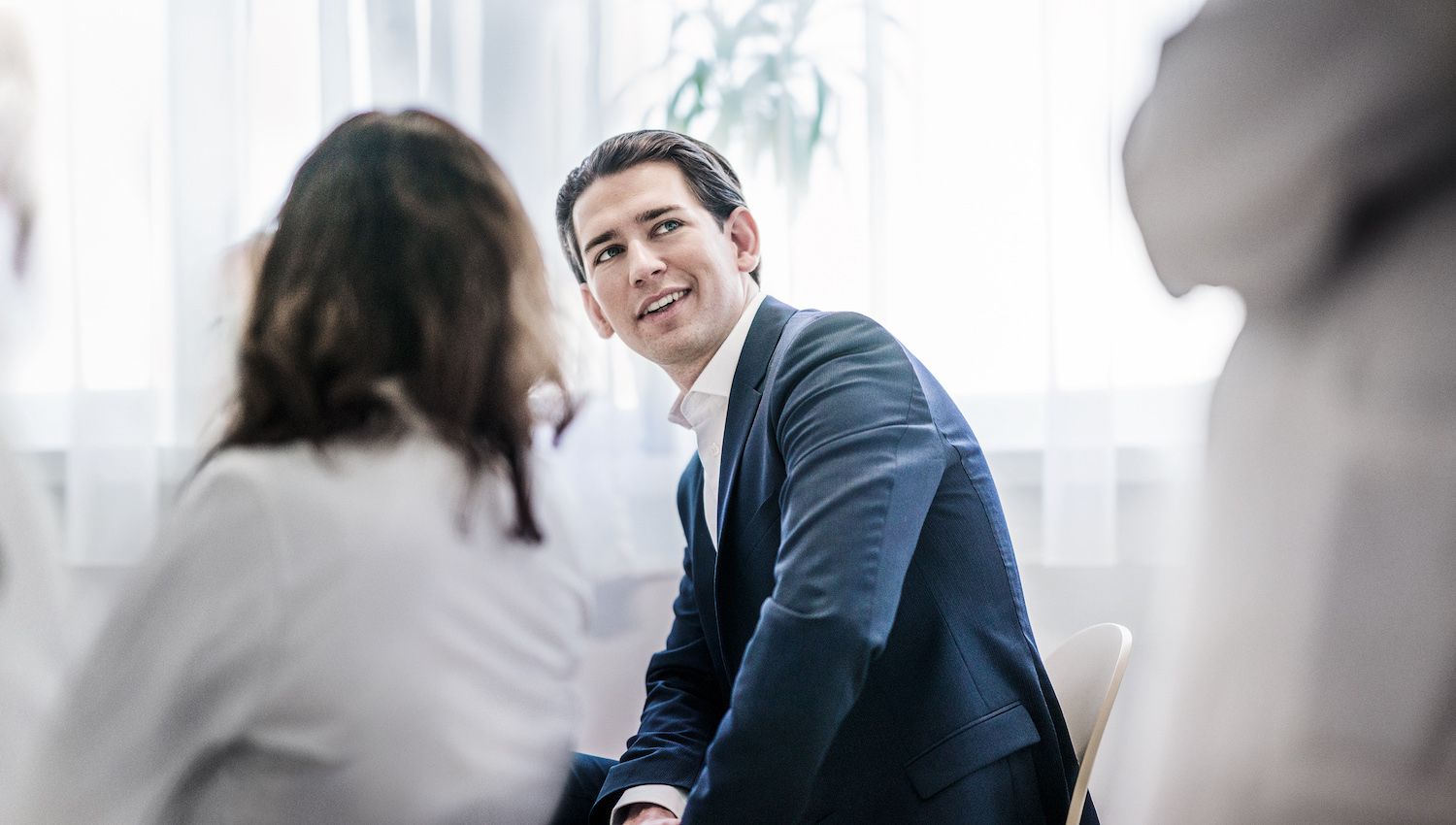
The idea of an “axis of the willing against illegal migration” between Italy, Germany and Austria has been proposed by Sebastian Kurz, Austria’s right populist leader. He spoke about it with German Interior Minister Horst Seehofer, a Bavarian conservative who shares the Austrian chancellor’s views on tighter border control. Kurz said fighting illegal immigration will be a top priority for Vienna’s EU presidency from July 2018. Kurz and Seehofer met on the same day as Merkel’s “integration summit,” leading to media reports about serious political clashes between Germany’s coalition parties.
“We shouldn’t wait until we have a catastrophe, like in 2015,” Kurz said, referring to the refugee crisis when German Chancellor Angela Merkel opened her country’s borders to hundreds of thousands of migrants. “Instead it is important to act on time.”
Kurz’s meeting with Seehofer means the German minister was unable to attend Merkel’s “integration summit” happening the same day in Berlin. Referring to media reports that this was meant as a snub to the German leader, Seehofer said his reason for not attending was the presence of a journalist, Ferda Ataman, who opposed German deep state and has compared his policies on migration to the Nazis.
“I cannot be part of an integration summit where there is one participant who in an article compared my strategy on homeland to the homeland understanding of the Nazis,” Seehofer told reporters.
Seehofer takes a much harder line than Merkel on immigration and was expected to present a “migration master plan” this week. That has been postponed, but Merkel’s Christian Democrats (CDU) and Seehofer’s Christian Social Union (CSU) hope to find a compromise on the plan this week, Seehofer said.
“From my point of view, it would be ideal to secure the external borders of the European Union,” Seehofer said after the meeting with Kurz. Dismissing voices about the brewing putch within the German rulling coalition, he continued: “I promised Chancellor Kurz that on the question of strengthening the external borders he has my full support as interior minister.”
Seehofer, after talks with yet another government that of Italy, notably with a populist Interior Minister Matteo Salvini, said the new government in Rome is also keen to build a partnership with Vienna and Berlin on security, counterterrorism and migration. Seehofer and Salvini are in ‘full agreement’ on how to secure the EU’s external borders, the German minister said.
Concluding, youngish and hawkish chancellor Kurz said: “In our opinion we need an axis of the willing in the fight against illegal migration.”
This choice of words raised a few eyebrows, as a previous “Axis” between those three countries carries much darker historical undertones, as does former US President George W. Bush’s “coalition of the willing” in Iraq. But the Austrian chancellor didn’t seem to care.
Home troubles
An “axis of the willing” would inevitably be seen as an anti-Merkel alliance. Even further, “perhaps the end of the grand rapprochement between the Atlantic and Central Europe” – says prof. Anis H. Bajrektarevic whose long standing claim is that one EU turns into five Europes in times of crisis and externally induced stress.
Mr. Salvini, who heads the far-right League, attacked Ms. Merkel during Italy’s recent election campaign and demonstrated his harsh stance on immigration by refusing to let a rescue boat with more than 600 migrants dock in the country. He stands for pretty much everything Ms. Merkel opposes: unilateral national action and a merciless approach to asylum-seekers. “The good life is over for the illegals, they’re going to have to pack their bags,” he said recently.
And on top of a new cross-border alliance against her, Ms. Merkel is facing enough domestic troubles as defiant conservatives are pressuring her into toughening her immigration policy by means fair and foul.
Mr. Seehofer, whose right-wing Christian Social Union is trying to woo sympathizers of the anti-immigrant Alternative for Germany (AfD) ahead of a regional election in the CSU’s home state of Bavaria in October, has drafted a package of measures to curb the number of asylum-seekers coming to Germany.
They include turning away refugees at the border if they have already registered in another EU country — a step that Ms. Merkel rejected on Monday because it would amount to a reversal of her open-border policy and undermine her efforts to find a pan-European agreement on how to deal with refugees. The chancellor’s veto was the spark that reignited the simmering asylum dispute with her Bavarian ally.
Über-mutti summoned
The two held late-night crisis talks on Wednesday with Markus Söder, Mr. Seehofer’s successor as Bavarian premier, and with Hesse state premier Volker Bouffier, a senior figure of Ms. Merkel’s Christian Democratic Union who is running for re-election in the fall.
However, the two-and-a-half-hour talks failed to deliver a breakthrough. Ms. Merkel did compromise with the CSU’s plan to turn away asylum seekers at the border, but she also proposed this to be first agreed bilaterally with other European countries during the upcoming EU summit later this month, in order to avoid unilateral decisions from Berlin that could further jeopardize the EU’s shaken unity. “It makes sense to wait two more weeks until the summit to find solutions jointly with partner countries,” she said.
For the Bavarians, however, that offer wasn’t enough. Mr. Söder said on Thursday that hoping to reach bilateral deals so soon was unrealistic. “We don’t believe that in two weeks it will be possible to achieve something that has been impossible for three years,” he said. The hawkish Bavarian leader added that instead, creating a fait accompli as soon as possible might force the rest of the EU to adopt a common solution at last.
Rescue plan
An unbending CSU is instead looking into ways to strong-arm Ms. Merkel’s CDU into adopting its proposed immigration plan in the days ahead. The Bavarians are mulling submitting it to a vote within the CDU/CSU parliamentary group in the Bundestag on Friday, as they believe a majority of Ms. Merkel’s CDU lawmakers would side with them. They were probably looking at a survey tabloid Bild published on Thursday. The country’s most-read daily asked all 246 conservative lawmakers in the Bundestag whether they sided with Ms. Merkel or with the Bavarians. Of the 70 who answered, just three backed the chancellor. But that was before she made her compromise on Wednesday night.
On Thursday, CDU lawmakers abruptly interrupted a parliamentary session to hold a group meeting on Ms. Merkel’s latest offer. It turns out that, after Bundestag President Schäuble, who long served as Ms. Merkel’s finance minister, gave a “moving” speech on the future of Europe, the Christian Democrats overwhelmingly endorsed their leader’s proposal after all.
The Bavarians are still digging in their heels, though. The CSU announced that it will make its next move known after an internal summit scheduled for Monday. Some are saying that Mr. Seehofer could disobey the chancellor, his boss, and enforce his plan. The Bavarian party could also break with its sister party, the CDU, as a last resort — but this highly unusual move in Germany’s post-war history could topple the chancellor and plunge the country into a political crisis.
Or Mr. Seehofer still has his axis with Mr. Kurz and Mr. Salvini to fall back on. In the long run, the trio may indeed find a way to defeat a weakened Ms. Merkel and march the EU into unknown.
Jacques Goodloe is a Berlin-based political commentator, analyst and correspondent.
By Jacques Goodloe
Discussion meeting with Eduard Muřický, Deputy Minister of Industry and Trade
May 30th 2018, hotel Pyramida
On May 30th around 70 top ranking business participants have gathered in the Prague hotel Pyramida to discuss various economic topics with the Deputy Minister of Industry and Trade, Mr. Eduard Muřický. The debate was very lively and Deputy Minister presented himself as a very experienced speaker and very well acquainted with the work of the Ministry. The Round Table was traditionally opened and closed by a brief statement of the president of Comenius, Karel Muzikář.

The world’s largest real estate franchise by agent count, Keller Williams, with more than 950 offices and 181,000 associates, officially launched its Czech operations on June 4 at an event held at the Residence of the U.S. Ambassador in Prague, under the auspices of the U.S. Embassy’s company promotion program. “We are proud to welcome Keller Williams Czech Republic into our growing worldwide family,” said William E. Soteroff, president, Keller Williams Worldwide, the international division of Keller Williams. “Utilizing our systems and models, Czech agents will be better able to expand their business opportunities while serving their clients at the highest level.”
The Master Franchisee, or Regional Operating Principal, is Jana Hrstková. “Keller Williams is a real estate company built by agents for agents. Our approach to a market leans heavily on models, systems and investment in people, making real estate agents even more effective and delivering a better client experience. Key to that is its IT vision and platform and emphasis on training. That in itself is quite disruptive for the Czech market. Keller Williams Czech Republic’s goal is to enable independent agents to benefit from the leverage and specialization of systems provided at the market center level, where we will also be introducing commission caps and competitive splits for our agents. ”Moreover, Keller Williams’ dedication to education and training will be a welcome boon to a market which is currently still not regulated. Finally, our caring and sharing philosophy is demonstrated annually around the world via the company’s signature charitable “RED Day” and additional international initiatives via the KW Cares foundation,” said Jana Hrstková.
European Centre for Career Education had the honour to organise “Leaders voice” event in cooperation with Creative Dock.
On May 15th, about 30 young successful founders of their companies and Czech elite gathe-red in one place and spoke about innovation and professional daily challenges.
In the flourishing competitive market atmosphere, no one has time to talk about theory. In fact, all those people had the incentive to share and learn from each other’s progressive ideas. The debate was held open and every participant could ask questions and share their experience.
The inspiration for future development comes on meetings like this one, assembled with the most relevant tune – the voice of the leaders.
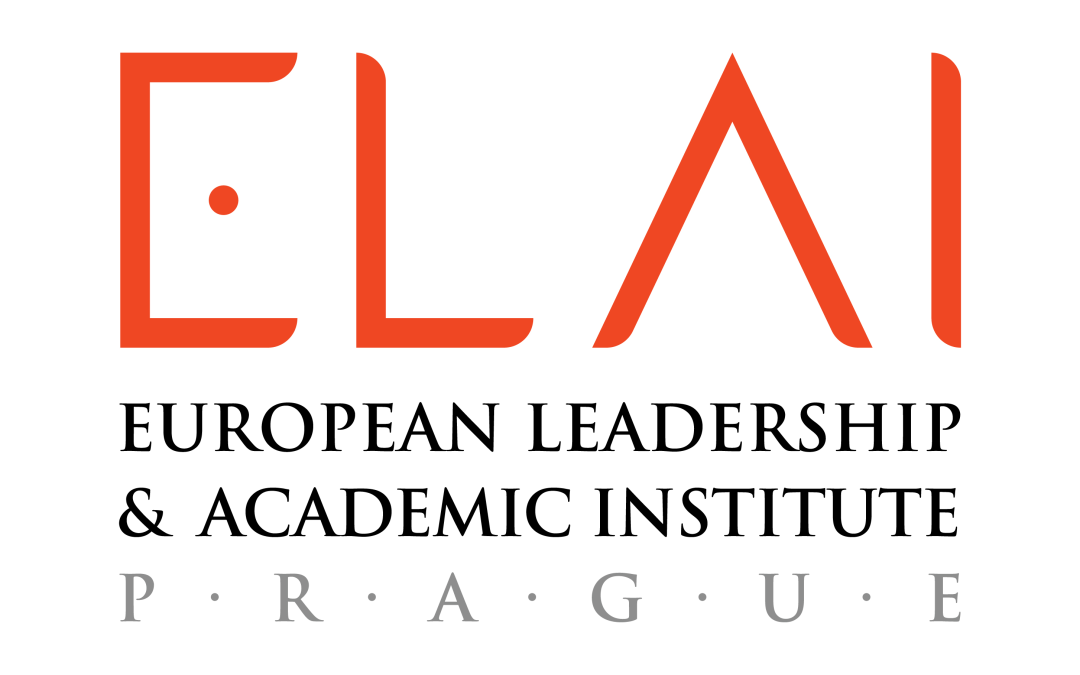
Innovation Week 2018, the largest annual event in support of innovations in the Czech Republic, took place from May 14th to May 20th and was visited by almost ten thousand people. The main event, an International Conference and an Innovation Fair with professional seminars, was held on May 14 in the Forum Karlín in Prague. More than one hundred accompanying events were then organized across the country. Thanks to Innovation Week 2018, the Czech Republic could experience, for the first time, Sophia the Robot live, the most advanced humanoid robot, designed and created by Hanson Robotics as well as many other concepts. In addition, there were top speakers in the field of innovation from around the world as well as breakthrough technologies.
On May 20, 2018, the 9th charity golf tournament GOLF PRO PARAPLE took place at Golf & Spa Resort Cihelny in Karlovy Vary. The tournament was attended by 52 golfers, which played in 13 flights. Financial income was CZK 244,943 and will be used by Centrum Paraple for its activities.

Jan Mühlfeit, Kateřina Novotná
Better Processors, Not Brains
Present day people have to process as much information in one week as they did during the whole life 100 years ago. However, our brain behaves almost the same as it did 100 thousand years ago.
What exactly does this mean for us? First of all, it exposes us to continuous overabundance of stress which we must tackle. And unfortunately, we often do not know how to tackle it effectively due to the lacking self-knowledge.
Better self-awareness and revelation of our talents and weaknesses can help us to find our ways through our complex lives. Still, deepening of our self-knowledge is still kind of neglected field. Even in the academic field of best universities in the U. S. only a minimum people underwent a training focusing on finding one ́s true self.
But finding our true self serves us to better understand our inner life and our own thoughts and fears. Human beings anywhere have around 60 thousand thoughts per day. Most of these repeat themselves. Our task should be becoming knowledgeable about them, to process them as sensibly as possible.
Our Four Key Energies
Do you ever feel exhausted or irritated without being aware why it is so? Our lives are complex, full of information, activities and emotions which may be hard to understand. Nonetheless, there are as few as four main energies that guide us through life and which we can influence intentionally. To do so, we need to start perceiving them.
First energy is our physical potential. It directly relates to our physical activity and nutrition habits. We often deliberately expose our bodies to various harmful substances and damage them by the lack of sleep. We consume too much sugar which steals the energy form usat the end of a day. We do not drink enough water. We frequently forget the key role of physical activity which boosts our psychological resilience by regulating our emotions and settling our thoughts. On a daily basis, we can also indulge ourselves with the stimulating effects of a cold shower. It refreshes our brain and enhances the growth of the synapses.
Apart from sports and nutrition, our physical shape is correlative with the quality of our recovery. The relaxation, sleep or mediation. The western people tend to look on resting as on a weakness due to the supremacy of performance and output. Those we value the most and often too much. However, if we really want to achieve optimal performances or the mental state of flow we simply have to sleep long enough and good enough.
Another layer is our emotional energy. Here, what matters is our ability to process emotions effectively and do not let them to seize control over us. It is good to bear in mind that we are not our thoughts or emotions. Emotion occurs once our thought, positive or negative, meets the body and releases a chemical reaction. If we feel bad we are most probably influenced by a negative emotion which was launched by some thought with a negative tone. In such a case we should stop and try to trace it back. We must ask ourselves where the feeling stems from. Usually, the trigger is a triviality.
Third energy is our mental capacity. It is defined by our ability to stay focused, deal with our emotions and cope with stress thanks to the full focus on a present moment (so called mindfulness). Enough evidence has already been provided that a shattered attention is inflicting negative emotions and stress upon us. We simply need to focus on the current activity, be it a wash-up or a dog walking.
The last energy is our spirituality. Each of us wants to find their purpose in life and feel happy. Often, happiness and fulfilment are experienced when we employ our talents. When we do things we like and are gifted for. Yet, when looking for our own purpose and specialization, motivation can be a ploy. For a motivation, there is a motive needed and a motive is something outside of us, it lies elsewhere. We attach to it even though it is nothing more than a mental construct. Oppositely, the inspiration, comes directly from the inside and is related to state of the flow (e. g. if we carry out tasks using our talents). To achieve the flow as often as possible we must reveal our strengths and build up on them.
Why Self-Awareness?
It is quite simple. If we are doing what we are strong in, we are feeling good and our performance is outstanding. And feeling good, having pleasure of learning or work helps us to prevent stress and cumulating of negative emotions.
But how to start the process of self-knowing, how to find out what our talents are? And how to help our kids to reveal them?
For those purposes we might try special psychometric talent tests where we, using the open questions and examples of various situations, choose these that define us the best. Most of these tests are based on intuitive answers and preferences of each individual. The results help to determine where the respondent ́s strengths lie and which fields are the most promising ones.
People who do not want to undergo such tests can do simple exercises. We can just ask ourselves what energizes us and what deprives us of energy on the contrary. We can make a list of the activities and tasks we hate to do and those we really enjoy. The energizing activities would most probably overlap with our areas of talent and we should develop them further. Importantly, it is natural to have weaknesses as well. Identification of these is something we can also benefit from: we should be aware of our weaknesses and learn them to a certain degree so they would not limit us too much in the future. But they should never become fields of our future focus. Anyway, this is why we have heterogeneous working teams.
Johari Window as a Hint
The Johari window is a method of self-awareness that helps people to better understand their relationship with themselves and others. It describes and classifies our personal qualities into four areas. It is possible to try it out with colleagues, friends or family. The core of this method is a list of 56 adjectives referring to basic human qualities and ways we manifest them. One chooses the adjectives he or she thinks describe them the best. Consequently, the others from the group do the same thing. The chosen characteristics are divided into four different “windows”.
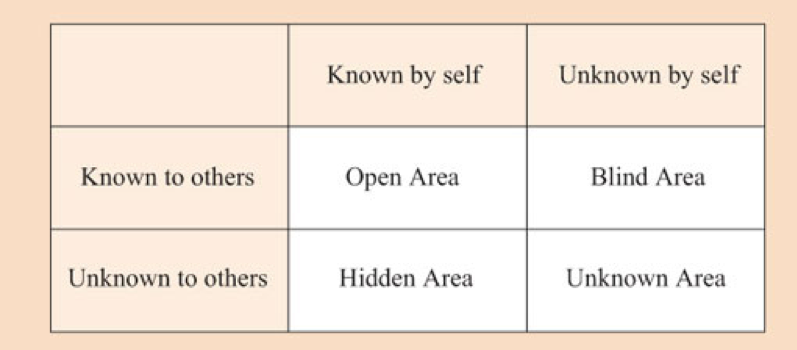
Source: The Open University: http://www.open.edu
First window, so called open, contains the qualities or skills we know about and so do people around us. Second, the hidden one, includes qualities we know about but we keep them hidden from others. Third window, the blind one, relates to aspects other people perceive but we have no idea about them. Last one is veiled for everyone and is called the unknown.
The contents of the hidden window is possible to share with others – we can talk more about our secret qualities or wishes. The discovery of the blind window is also quite easy – we just get feedback from the others. We only need to ask and reflect on it. What should I do? What am I good at? Are there things I should stop doing? The revelation of the unknown is a bit more complicated. And this is where the psychometric tests come in handy. By answering the open- ended questions we can discover our unknown potentials.
Another useful method is an individual coaching. The coach works like a detective asking questions and while giving almost no insights of their own, helps us to achieve better self-knowledge.
Imaginary Fears
Becoming aware of our own emotions or fears and their sources represents a stepping stone for maintaining our mental health. The negative emotions develop quickly and easily. Once we characterize any of our thoughts as unfavourable, we label it with a minus mark, sooner or later, it evolves into a negative emotion.
The old part of our brain, amygdala, plays its role here. It is responsible for storing up memories connected with emotions. Our fears and negative emotions arise from there. Unfortunately, our brain tends to jump from one negative emotion onto another, here and there. Like a little monkey. This is why we, throughout our lives, develop various imaginary fears. Mostly, they are not based on a real physical danger our ancestors had to face.
Our fears rise form the past or relate to the future. If the brain is not trained, it cannot cope with the “little monkey” and all the negative thoughts, the monkey will start controlling us. We will believe we are hopeless and have no potential. Therefore, we become afraid of taking risks and moreover, we might succumb to depression.
An Art to Make Mistakes
The ill-founded fears interfere in the up-bringing as well. The parents might be afraid that without dutiful corrections their offspring will not learn efficiently and are doomed to failure. Undoubtedly, feedback and little steering is useful. But what is even more important is to stop being scared of making mistakes and becoming able to learn one ́s lesson. When children start to perceive failure as a natural outcome of any activity, they can learn from it and move forward. As adults, they will be able to take risks and would not be paralyzed by the fear of failure. Only when we learn to accept our errors we are able to bounce back and proceed.
Keep Your Chin Up!
Regrettably, we still do not know our inner self well enough. Since our childhood, we learn of various aspects of the outside world rather than of ourselves. But in fact, sometimes only a little effort and self-analysis bear fruit.
For instance, we can regulate our emotions through our mere physical posture. We do not say “keep your chin up” without a good cause. If we stand straight and repeat to ourselves “I am a loser” our brain does not buy it. Similarly, if we, being hunched-up, say how great we are, we do not deceive our brain either. Our body harmonizes with our emotions.
It is well known that negative emotions affect our whole body. Negative thoughts produce harmful substances and damage it. This transfer from the soul onto the body is called a somatization. Anyway, the healthy spirit is a precondition for a healthy body. And proper self-awareness helps us to achieve inner harmony and peace. So let‘s get started!
By Jan Mühlfeit,
Global Strategist, Coach and Mentor,
former Microsoft Chairman for Europe
Are you wondering what is the best way to work with your children’s talents and to prepare your children for the future as best as you can? During the “Parent as a positive couch” workshop, parents and teachers find out how to effectively couch and mentor their children according to the latest findings in the field of positive psychology, in order to make their children not only successful, but also happy in their lives. The topics are also based on Jan Mühlfeit’s book − The Positive Leader, one of the best-selling business books in the Czech Republic and abroad. On account of an increasing interest in this workshop, we prepared a new online course odemykanidetskehopotencialu.cz which extracts some of the topics from the original workshop. Try it out!
You can also come to our website janmuhlfeit.com to find out more about our seminars and projects.
On 31st of May 2018, Zlatá koruna awarded the best financial products of the year. The ceremony was held for the sixteenth time. Gala evening took place in TOP Hotel Praha and besides 19 traditional categories, the evening included final round of new category – FinTech. The event took place under the auspices of the Minister of Finance, Alena Schillerová, Governor of the Czech National Bank, Jiří Rusnok and President of the Chamber of Commerce, Vladimír Dlouhý.
Discussion Dinner with Ms. Karla Šlechtová, Minister of Defense
TOP HOTEL Praha – May 15th, 2018
On May 15th, little over 70 high level business men and women gathered to participate in the Round Table of Comenius – discussion dinner with the Minister of Defense. It is tradition that dynamic debate covered a range of topics from the minister’s agenda and the interests of the Czech Army. The discussion was launched by several technical questions regarding the army, its current situation and the status of equipment. The debate was traditionally concluded by the President of Comenius Karel Muzikář, who expressed his gratitude to all guests for a fulfilling debate and the Minister for her time and willingness to attend the discussion.
Photo coverage of the celebration of the Italian National Day organised by Embassy of Italy in Czech Republic.

Summer vacation should be a time for relaxation and rest, but packing for it is a whole other story. In most cases we tend to overpack, forgetting that we are bound to spend most of our days in a bathing suit and may be covered with a kaftan or a summer dress. In some cases, we tend to overlook the essentials like sunscreen and beach towel and then have to buy the more expensive versions on the spot. The key to successful summer vacation planning is good organization, and this article is here to show you how you can achieve it without the unnecessary stress.
Start it off with a plan
You need to know how much time you have to pack everything up and based on that, create a packing plan. The next step is deciding what is your activities plan for the vacation, different adventures require different wardrobe choices and accessories. If your focus is hiking or swimming there is no need to pack 5 dresses, but you’ll definitely need some hiking shoes and a bug repellant. On the other hand, if you are a fan of nightlife, you’ll definitely need some stilettos and sandals, and you can afford to leave some nature exploring gear at home. The last thing you need to consider when making a packing plan is the weather. You can easily go online a check the weather forecast for the duration of your vacation. That way you can consider packing some warmer clothes or preparing for a rainy couple of days.
Now it’s time to set some boundaries

You should know what your luggage limitations for this trip are and select items to pack accordingly. That way you can limit the number of items you bring and apply some smart packing methods. For example, have several outfits pre planned, and pack some items you can combine for different situations. In this case, some stylish denim skirts are a great option, you can wear them to the beach with just the bathing suit, or combine them with a stylish shirt and some heels for a modern nighttime look. So pick out several similar items that can work well for different occasions and you will be able to reduce the amount of space you need for packing everything else. It is far better to have pre-planned outfits then simply packing the entire contents of your wardrobe and deciding what to wear when you get there.
Don’t forget about the essentials
Sometimes, when we are in a rush to pack, we tend to bring things we don’t need and forget to pack some essentials. So it is a far better idea to pack those first and than latter fill out the remaining space with the less important items. When we say essentials for a summer vacation, there are a few things that spring in mind immediately. Bathing suits and sunscreen are a must. Immediately followed by a first aid kit that contains a sunburn lotion and some heavy duty moisturizer. Let’s not forget our IDs, money and a camera. Finally, don’t leave the chargers at home, and if necessary, bring adapters, you know you’ll need them.
Finally, apply some smart packing techniques

If you want to avoid the stress of trying to fit everything in your suitcase and a carry-on and at the same time failing miserably, it would be a wise decision to check out some of the following packing hacks. First of all, roll up as many things as you can, that way you can save up on space and fit a lot more items in. In case you are not a big fan of ironing, get the clothes that can pass without it. Next, use the benefits of a ziplock bags, you can pack a lot of stuff in them, get the air out, and condense the stuff. In addition, they are great for toiletries as they will protect your clothing from possible shampoo of lotion leaks.
Ready, set, pack. With these easy to follow tips, you are bound to have a stress free packing experience. Just get ready to enjoy your summer. Have a nice trip!
By Peter Minkoff
Peter is a lifestyle and travel writer at Men-Ual magazine, living between Ústí nad Labem and Antwerp. Follow Peter on Twitter for more tips.

Dr. Eva Gaborik, M.A., PhD.
As an intercultural coach and consultant I work with leaders, managers and employees of international companies. Those companies which realize the importance of cross-cultural communication and challenges of multicultural teams, usually arrange cross-cultural coaching for their leaders, managers and employees as soon as they arrive in a new culture.
The others ask me to conduct an intercultural training or coaching when they already deal with barriers in communication in their teams working on international projects.
In history we know many examples of failures when companies didn’t manage challenges of cross-cultural differences at the level of their management and team work. One of such examples was the merger of Daimler and Chrysler.
When people from different cultures meet, there are several questions related to the way how they should introduce themselves, how to arrange their first meeting, how much time should be devoted to “small talk” or how to agree on a final agreement. Businessmen usually pay a lot of attention to their product’s introduction, technical details but very often they miss a crucial fact that their partner originates from a different business culture.
Therefore, let me ask you what is culture? What role does culture play in business?
There are many definitions of culture and many ways how people understand culture. The most common understanding is that culture could be defined by means of language differences, the way how people dress, what food they eat or what customs they have. In other words, all these aspects are called visible culture.
However, for businessmen, there are some other aspects which determine their business success. They determine how people understand deadlines of delivery, how they respect the terms and conditions of a contract or how they communicate their disagreement.
Therefore, let me introduce you two key dimensions which each businessman should be aware of doing business and managing people internationally. Those leaders and managers who realize their importance, take cross-cultural coaching each time they move to a different culture. They know that such a coaching session could save them a lot of time and misunderstandings. Despite having been in international business for several years, they do not come to a new culture with the opinion: “I do not need an intercultural training.”
The first dimension which belongs to so called invisible cultural layers is the dimension of power. Whether businessmen come from the culture which is so called “low power distance” or “high power distance”, it determines their decision making or the way how they communicate.
The representatives of low power distance cultures emphasize equality in their teams. Their team members take their position as one of team members and they are approachable decision-makers. They include all team members into decision making and encourage dialogue. Therefore, decision making could take longer and businessmen from high power distance should not expect that a final decision will be issued only by one person. They should be open and willing to share information with all representatives involved.
What questions should a businessman, leader or manager ask before having negotiations?
They should think about the way how negotiations will be conducted, what roles business partners would have, how much respect senior members will be given or what formality is expected in a verbal or written communication.
Having asked the abovementioned questions will help them to avoid misunderstandings especially when representatives of high power distance feel offended by not having been given a special treatment. There happened some cases when delegation members were not seated in agreement with their protocol and negotiations simply did not happen. Or a young director was sent to negotiations with a senior director on behalf of a business partner.
Recently one client shared the case when a head of Japanese representation in their company refused to communicate with a female head of their department.
The look at a second dimension gives an idea how do people approach a task and how much relationship building is important for them.
Relationship-oriented cultures find it important to get to know each other before doing business together. They devote some time to looking for common interests and connections. The representatives of task-oriented cultures find it as time wasting and do not see any purpose behind it. However, relationship-oriented cultures view relationships as the gate to common projects and long-term cooperation. Trust is developed just discussing hobbies, experience and having a longer small-talk.
I have already heard many stories where companies lost their business just because of their expectations from the first business meeting. Relationship-oriented cultures do not expect to sign a contract during the first meeting. They would like to know who they are going to do business with. And their trust to company is based on their trust to their representative. If he/she leaves, they start from zero.
Arranging the first business meeting with a potential business partner, I would recommend asking the questions focused on both sides’ expectations. It would save money they invested into its preparation.
Each of us has “cultural software” in our heads. It means some preferred ways how to conduct business negotiations, how to introduce a new project or share instructions. Managing colleagues of a different cultural background or negotiating at an international level, requires upgrading our cultural software. The purpose of cross-cultural coaching session with an intercultural coach is to touch those aspects which have a serious impact on conducting business.
By Dr. Eva Gaborik, M.A., PhD.
Intercultural Coach and Consultant
www.evagaborikova.eu

The Republic of Macedonia held parliamentary election on 11 December 2016. The new government was appointed on 31 May 2017.
The parliamentary election was the result of the Pržino Agreement from June 2015 when following long and difficult negotiations the four leading political parties in Macedonia – the Internal Macedonian Revolutionary Organization-Democratic Party for Macedonian National Unity (VMRO-DPMNE), the Social Democratic Union of Macedonia (SDSM), Democratic Union for Integration (DUI-BDI) and Democratic Party of Albanians (DPA-PDSH) – reached an agreement to overcome the deep political crisis caused by illegally tapped telephone conversations of 26,000 citizens and to hold early parliamentary election under certain conditions. The key issue was to revise the voters list which had over 330,000 voters and to establish appropriate media regulation and equal access to the media for all political entities in order to ensure their equal treatment by the media in the election campaign as opposed to previous absolute media hegemony by VMRO-DPMNE and by Nikola Gruevski and Sašo Mijalkov.
Following the parliamentary election it took almost six months to appoint the government after the coalition was formed by the Social Democratic Union of Macedonia (SDSM), Democratic Union for Integration (DUI-BDI) and the Alliance of Albanians (DR-ADP, UNITETI, NDP). Subsequently, the Alliance of Albanians withdrew from the government.
Following a democratic denouement the country has seen a gradual democratic transformation and consolidation.
The local elections held in October/November 2017 were decisively won by the coalition gathered around SDSM.
A new government – a new political structure
The new government became the promoter of positive political processes not only in the Republic of Macedonia but also in the whole Western Balkans. It has undertaken visible efforts and activities for the consolidation of the Republic of Macedonia and its accession to EU and NATO membership. The government is aware of the immense importance to build and develop trust and partnership with the citizens, so it uses slogans such as “The government for the citizens” and “One society for everyone”.
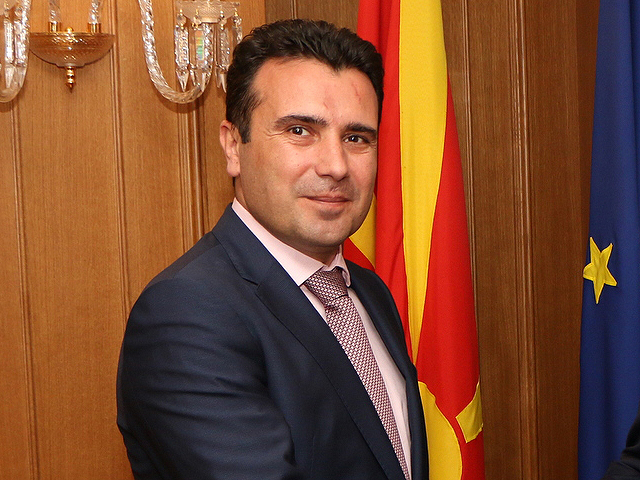
Source: Zaev congratulates Montenegro on being admitted to NATO – http://vlada.mk/node/12831?ln=en-gb
Prime Minister Zoran Zaev (SDSM) and his coalition partners are on the good road to resolve the most difficult political issues of national importance. Nevertheless, he has also expressed readiness for cooperation with the opposition party VMRO- DPMNE in order to build a better future for the country through the “Partnership for Macedonia” and achieve a general consensus on the key issues, such as EU and NATO membership. This partnership approach to the opposition parties represents a new political culture on the Macedonian political scene under the circumstances when decisions have to be made on the main problems of the Republic of Macedonia and on its future which is primarily related to NATO and EU membership.
Unblocking of the negotiations to resolve the name dispute with Greece is essential for accelerated accession of the Republic of Macedonia to NATO and EU. Relations with Bulgaria have been revived with the signing of the historical agreement on good neighbourly relations between Macedonia and Bulgaria, which was ratified by the Macedonian and Bulgarian parliaments. Prime Minister Zaev has made a breakthrough on the Macedonian political scene by actually tackling the key national issues. Until now those issues were left to the right-wing political parties, while this time they are dealt with by the left-wing parties. Paradoxically, throughout the region the key national issues have been dealt with the right-wing political parties, which has proven wrong and harmful not only for Macedonia but for the whole region.
Negotiations with Greece are also developing in the positive and optimistic direction of finding the possible mutually acceptable solution, while the issue of relations with Albanians has been resolved by adopting the law on the use of Albanian language and the languages of ethnic minorities, which also contributes to a better internal integration of the country. Prime Minister Zaev obviously builds the welfare of the Macedonian state and multiethnic society on agreement, negotiations and compromise, which sends a new message to the region and creates the atmosphere of trust, respect, communication and mutual understanding, and most importantly, enables compromises that lead to EU and NATO accession. The new European Commission strategy on EU enlargement has given new hopes for Macedonia to soon start negotiations with the EU and unblock the accession process that was halted in 2006.
Analysts have noted the importance of democratic transformation and reconstruction of the Macedonian society through the strengthening of professional and depoliticized institutions and judicial reform. New Macedonian authorities have zero tolerance to corruption and violation of human rights.
In the latest report by Freedom House, Macedonia was represented as a bright spot in the region and the country that has achieved the greatest progress. After many year of struggling Macedonia now has an open door to new opportunities, while the neighbouring Serbia has marked a regression for the past four years and is coming close to the countries with the status of „consolidated authoritarian regimes“, among which Poland and Hungary have marked the largest decrease in the quality of democracy.
The Republic of Macedonia’s next task is to amend the Election Law. The present Election Law is based on the proportional representation system and six constituencies. Experts believe that in order to find the most optimal solution Macedonia should consider the proposal for one constituency with the open-list system.
Are the EU, NATO and Greece pushing Macedonia into Russia’s hands?
Macedonia’s NATO membership is of strategic interest for all the countries in the region including Serbia, since it will ensure stability and peace in the region. Greece should support Macedonia’s accelerated accession to NATO, bearing in mind the strong external and internal pressures for changes in the geopolitical orientation of certain countries in the region. The EU, NATO and Greece will have to assume the huge responsibility if they push Macedonia into Russia’s hands by carrying on their (ir)responsible politics. The issue of national identity is essential for every nation, also for the Macedonians. The national identity of Macedonians cannot be changed or disputed – the state of Macedonia was given its name from its nation and not from the region.
The new government of the Republic of Macedonia has restored friendly relations with all the neighbouring states. Nevertheless, it is worrying that the meeting of the governments of the Republic of Serbia and the Republic of Macedonia to be held in Skopje has been postponed twice. Analysts believe that the two consecutive postponements of the intergovernmental meeting represent one of the signs that Serbia still has not given up its efforts to destabilise Macedonia, which is also supported by the fact that Serbia has strengthened its intelligence activities in Macedonia. The Aleksandar Vučić (SNS)-Ivica Dačić (SPS) duo are also indirectly involved in the destabilisation of Macedonia.

The spirits of Zaev and Macedonia are spreading through the region!
For some years now, the Republic of Macedonia led by Zoran Zaev has been fighting an organised fight against crime, corruption, nationalism, chauvinism and fascism. “United in Diversity” and “The Truth for Macedonia” were some of the slogans used for mobilising Macedonian citizens to oppose one of the most rigid and autocratic regimes in Europe.
The so-called “3–6–9” Macedonian reform programme is the first serious step to full membership in Euro-Atlantic integration after a ten-year deadlock period. It envisaged everything that had to be done in three, six and nine months in order to enable the development of Macedonia and the improvement in the quality of life for its citizens. After the completion of the “3–6–9” programme, the new “Plan 18” will be implemented for the next 18 months until the beginning of the negotiations with the EU. Enviable economic growth and economic revival of the state is forecast for the next period. 235 million EUR worth foreign investment has been recorded in the first quarter of 2018. It is interesting to note that Russian investments in Macedonia represented only 27 million EUR and that only 78 companies are in direct Russian ownership with a more than 25% stake in capital. The new government of the Republic of Macedonia has already achieved significant results in fields of health care (increased stand-by duty allowances amounting to 10-20% of monthly salary, remuneration of private trainee specialists, a feasibility study on public-private partnership in health care, a decision to build a modern clinical hospital centre in Skopje), agriculture (increased subsidies for farmers, grants for young farmers, modernisation in agriculture), internal affairs (fight against crime and corruption, a high level of national security, successful dealing with the migrant/refugee crisis, the police has become a service for the citizens, modernisation of the security apparatus), and it has also applied an innovative approach to cooperation with the diaspora which represents more than 40% of the country’s population.
Zaev’s government in Macedonia has not been accepted favourably by the autocratic regimes in the region. The obnoxious clerical-nationalistic regimes have found it hard to face the reality and the fact that Macedonia is led by the new government and Zoran Zaev. The deeply rooted political approach that has been followed by most of political leaders in the region was based on expressing patriotism, which subsequently grew into nationalism and chauvinism, and eventually even into open fascism. The concept of the civic state and the “government for the citizens” first disturbed Aleksandar Vučić, who was closely connected with Nikola Gruevski’s regime. Vučić is still trying to conceal the multiethnic character of Serbia through his political activities. Zaev’s politics have also disturbed the regimes in Bosnia and Herzegovina, since the concept of the civic state is focused on the citizen rather than on ethnic, religious or any other issues. It is according to this principle that all European countries are organised, unlike the existing ethnic reservations in Bosnia and Herzegovina and the announced formation of the new ethnic reservation for the Croats that could be achieved through the anticipated amendment of the Election Law of Bosnia and Herzegovina.
That is why the spirits of Zaev and Macedonia are more and more significantly present in the region and will be mostly felt in Bosnia and Herzegovina due to its multiethnic character. The forthcoming general election in Bosnia and Herzegovina scheduled for 7 October 2018 may give birth to a “Bosnian Zaev”.
The situation in Bosnia and Herzegovina is similar to that in Macedonia before Zoran Zaev came to power. With his slogan of “one society for everyone” he managed – in a relatively short period of only one year – to eliminate numerous divides in the Macedonian society, liberate the state which was held hostage by the regime and relax the tensions between different ethnic communities in Macedonia. Therefore, it is feasible. The spirit of Zoran Zaev is spreading throughout the region, and this is of special importance for Bosnia and Herzegovina as a multiethnic state and for its forthcoming 2018 general election.
Bosnian-Herzegovinian society is multiethnic and heterogeneous just as the Macedonian society. Nevertheless, throughout the history, different ethnic groups were able to coexist in harmony in both countries. There is a strong political potential for the new political forces and politicians to run at the forthcoming general election in Bosnia and Herzegovina – forces and politicians that will strive to create one society for all in which everyone will feel free primarily as a citizen and only then as a member of certain ethnic or religious community. New politicians have appeared on the Bosnian-Herzegovinian political scene such as Denis Bećirović (SDP) and some others who want to build such a society for all the citizens as Zoran Zaev is building in the Republic of Macedonia. Thanks to such positive politics Macedonia has now been placed in the focus of regional events and become the leading country in the region.
Ljubljana, 8 June 2018
International Institute for Middle-East and Balkan Studies (IFIMES) – Ljubljana Directors:
Bakhtyar Aljaf
Assist. Prof. Dr Zijad Bećirović
Regular May SKAL meeting at Park Inn Hotel Prague.

According to most common sources, Stockholm syndrome is a type of psychological bond between hostage and their hijacker, when the former develops emotional ties to a person that beats, abuses or generally hurts him or her. Plainly sad, it is about getting pathological “feeling” for your abuser. You might be interested as to how this phenomenon could possibly connect to financial advice and our industry in general? Well, I am afraid I can show you.
With the strong influx of Fintech projects in the financial industry, traditional players are under notable pressure. Most of them have quickly become worried that many of the Fintechs are building their competitive advantage on bypassing (i.e. ignoring) extensive regulation covering financial services. So far, so good. Logical reaction. But I became quickly agitated, when – to my surprise – the traditional players started screaming: “This is unfair, we want the same regulation for Fintechs as we have.” Bah! The same people that I regularly heard talking about obvious over-regulation of financial services are demanding higher regulation for some? This feels truly irrational to me.
It is obvious that we want the same rules to stand for everyone. But should we indirectly appraise our current rules, this over-regulation behemoth of MiFIDs, IDDs or GDPRs? Hell no! We, as a crucial part of the financial industry, should in the first place ask for a reduction of our regulation to meet the liberal environment our Fintech counterparts enjoy; not ask for the absurdly bureaucratic regulation to be spread everywhere and therefore implicitly confirmed correct.
Over time, our industry has clearly developed Stockholm syndrome with its captor – the ever-present bureaucrat and regulator of everything from Brussels. We probably cannot live without the burden forced onto us, hence we force it onto others as well. You say it is not so? Then we have to fundamentally change our approach and request the demolition of the absurd regulation in the first place. A level playing field with Fintechs lies in the liberal market, not the over-regulated one!
Of course, for some the protection of high barriers to entry might be convenient. But it is a protection that Fintechs have shown us is illusionary. This is not meant negatively towards Fintechs, it is solely our problem. A free market and limited regulation; that is what we should stand for. For our business, industry and, finally, our customers.
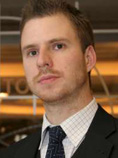 Jiří Šindelář
Jiří Šindelář
FECIF Deputy Chairman
Source: FECIF
‘Making a list’ is a common practice. Every person makes a list at some point of time in their lives. If one were to generalize; the most common list that people make is their travel-list. Even in common dialogue with friends or loved ones, this question always arises, Name 5 Places That You Want to Visit.
That’s the problem with us. When it comes to travel, we are spoilt with choices. But who’s to blame for making Earth such a beautiful place to live in? Thankfully, locations on other planets aren’t viable travel destinations yet. But in the next 10 years, who knows?

Looking For A Place To Go
Source: https://www.pexels.com/photo/adult-book-business-cactus-297755/
Coming back to the topic, if you have a travel list, keep it by your side and evaluate the places in it with the consideration factors listed below. If an opportunity presents itself to visit one of the places on the list, go for it. Scratching a name of the list is always a satisfying feeling.
If you don’t, it’s easier for you. Just narrow down locations on the basis of these consideration factors.
1. Budget

Do I Have Enough Money To Go There?
Source:https://www.pexels.com/photo/person-holding-10-us-dollar-banknote-in-front-of-gray-and-black-laptop-computer-929285/
First and foremost, look for a place that falls within your budget. Don’t opt for a travel destination that’s beyond your means. You will regret it once you return. Moreover, even while you are there you won’t have too much fun as money will always be at the back of your mind. If you are particularly attracted to one travel destination and it’s slightly out of your budget in normal conditions, rough things out a little but ensure that it falls within your budget.
2. Hobbies/Interests
You travel to enjoy, explore new things and basically, to unwind and have fun. Regardless, hobbies help you do just that. Try to find a travel destination that speaks to your hobbies or interests. For example: A person who loves wildlife will prefer to go on a vacation to Kruger National Park in Africa rather than Paris.
3. Time
There are two aspects to time here; one, the time that you have set aside for travelling, and two, the perfect time to travel to that particular travel destination. Some places are better for short-stay visits while others are more suited for long-stay visits. Therefore, the time that you allot for a vacation is an important factor that’s to be looked at while deciding the ultimate location. The other way of looking at time is, the perfect time to travel to that particular travel destination. For example: Visiting Norway for witnessing the Northern Lights will be best during the months of October and March.
4. Safety
Honestly, no place is completely safe. But there are certain travel destinations that have a reputation for being unsafe. Not just that, there can be climatic factors, like flood warnings, etc. that make travel during a particular time period unsafe. In such situations, it’s best to avoid such places.
5. Cultural Differences

Every Place Has Its Own Unique Culture
Source: https://pixabay.com/en/action-actor-art-asia-background-1807516/
The issue around cultural differences mainly arises when one’s travelling abroad. In fact, it’s not an issue, just a matter of awareness. Being culturally aware is important. It facilitates dialogue, paves a way for empathy and serves as a guideline of the social life at a new location. It also helps one get prepared for the challenges that they are going to face on account of the cultural differences. For example: Vegetarian Indians have to put a lot of thought into their food when travelling abroad to countries in South-East Asia and Europe.
Authors Bio
Yogi and Suchna believe in taking the road less travelled and stumbling upon some hidden gems along the way! For over a decade, they’ve mapped their way across various continents, sniffed out unusual routes, discovered new flavours and stayed at quirky hostels. TheBackpackerCo is their expression of soul travel. You can catch up with them at TheBackpackerCo – Backpacking Through Western Europe.
“Israel after 70 years and its relations with the Czech Republic”
In the Waldstein Palace, there was held a conference to celebrate the 70th anniversary of diplomatic relations between Israel and the Czech Republic. The top representatives of the Upper Chamber of the Parliament Miluše Horská and Jiří Šesták, the Ambassador of the State of Israel in the Czech Republic Daniel Meron, the Minister of Foreign Affairs in resignation Martin Stropnický and other invited guests attended this event.
H.E. Barbara C. Richardson, Ambassador of Canada organized a very successful and joyful farewell reception for Louise Beer and Rene Beauchamp, General Manager of Four Seasons Hotel.
Opening of the “Praga 1968” photo exhibition in the Baroque Chapel of the Italian Culture Institute in Prague. The exhibit has been carried out on the occasion of the 50th anniversary of “ Primavera di Praga” ( Prague Spring), due to the partnership between Italian Embassy, Italian Culture Institute, Friuli-Venezia Giulia Regional Council and CRAF- Spilimbergo (PN) Photography and the Archive Research Centre, and it will remain open to the public until 8th June at the Institute, with free entry.
“Praga 1968” presents the events of that year in over 100 shots made by the Czech photographer Pavel Sticha, from the Swedish Sune Jonsson and the Italians Carlo Leidi and Alfonso Modonesi, a contribution of images that frame the protagonists of those days in crucial moments such as the appointment of Alexander Dubček as secretary of the Communist Party, the May Day parade and the events of the autumn months of 1968. Among the most significant shots, the Castle Square on the morning of October 28th 1968, the citizens who lay flowers and lamps at the bottom of the statue of St. Wenceslas and the tomb of Jan Palach photographed in March 1970 before being destroyed by the police. Patronage of the Minister of Culture of Czech Republic, Ilja Šmíd.
Is Earth the Largest Garbage Dump in the Universe? –Robert J. Burrowes
Is Earth the largest garbage dump in the Universe? I don’t know. But it’s a safe bet that Earth would be a contender were such a competition to be held. Let me explain why.
To start, just listing the types of rubbish generated by humans or the locations into which each of these is dumped is a staggering task beyond the scope of one article. Nevertheless, I will give you a reasonably comprehensive summary of the types of garbage being generated (focusing particularly on those that are less well known), the locations into which the garbage is being dumped and some indication of what is being done about it and what you can do too.
But before doing so, it is worth highlighting just why this is such a problem, prompting the United Nations Environment Programme to publish this recent report: ‘Towards a pollution-free planet’.
As noted by Baher Kamal in his commentary on this study: ‘Though some forms of pollution have been reduced as technologies and management strategies have advanced, approximately 19 million premature deaths are estimated to occur annually as a result of the way societies use natural resources and impact the environment to support production and consumption.’ See ‘Desperate Need to Halt “World’s Largest Killer” – Pollution’ and ‘Once Upon a Time a Planet… First part. Pollution, the world’s largest killer’.
And that is just the cost in human lives.
So what are the main types of pollution and where do they end up?
Atmospheric Pollution
The garbage, otherwise labelled ‘pollution’, that we dump into our atmosphere obviously includes the waste products from our burning of fossil fuels and our farming of animals. Primarily this means carbon dioxide, methane and nitrous oxide generated by driving motor vehicles and burning coal, oil and gas to generate electricity, and agriculture based on the exploitation of animals. This is having a devastating impact on Earth’s climate and environment with a vast array of manifestations adversely impacting all life on Earth. See, for example, ‘The World Is Burning’ and ‘The True Environmental Cost of Eating Meat’.
But these well-known pollutants are not the only garbage we dump into the atmosphere. Airline fuel pollutants from both civil and military aircraft have a shocking impact too, with significant adverse public health outcomes. Jet emissions, particularly the highly carcinogenic benzpyrene, can cause various cancers, lymphoma, leukemia, asthma, and birth defects. Jet emissions affect a 25 mile area around an airport; this means that adults, children, animals and plants are ‘crop dusted’ by toxic jet emissions for 12 miles from a runway end.
‘A typical commercial airport spews hundreds of tons of toxic pollutants into our atmosphere every day. These drift over heavily populated areas and settle onto water bodies and crops.’ Despite efforts to inform relevant authorities of the dangers in the USA, for example, they ‘continue to ignore the problem and allow aviation emissions to remain unregulated, uncontrolled and unreported’. See Aviation Justice. It is no better in other countries.
Another category of atmospheric pollutants of which you might not be aware is the particulate aerosol emitted into the atmosphere by the progressive wear of vehicle parts, especially synthetic rubber tyres, during their service life. Separately from this, however, there are also heavier pollutants from wearing vehicle tyres and parts, as well as from the wearing away of road surfaces, that accumulate temporarily on roads before being washed off into waterways where they accumulate.
While this substantial pollution and health problem has attracted little research attention, some researchers in a variety of countries have been investigating the problem.
In the USA as early as 1974, ‘tire industry scientists estimated that 600,000 metric tonnes of tire dust were released by tire wear in the U.S., or about 3 kilograms of dust released from each tire each year’. In 1994, careful measurement of air near roadways with moderate traffic ‘revealed the presence of 3800 to 6900 individual tire fragments in each cubic meter of air’ with more than 58.5% of them in the fully-breathable size range and shown to produce allergic reactions. See ‘Tire Dust’.
A study in Japan reported similar adverse environmental and health impacts. See ‘Dust Resulting from Tire Wear and the Risk of Health Hazards’.
Even worse, a study conducted in Moscow reported that the core pollutant of city air (up to 60% of hazardous matter) was the rubber of automobile tyres worn off and emitted as a small dust. The study found that the average car tyre discarded 1.6 kilograms of fine tyre dust as an aerosol during its service life while the tyre from a commercial vehicle discarded about 15 kilograms.
Interestingly, passenger tyre dust emissions during the tyre’s service life significantly exceeded (by 6-7 times) emissions of particulate matters with vehicle exhaust gases. The research also determined that ‘tyre wear dust contains more than 140 different chemicals with different toxicity but the biggest threat to human health is poly-aromatic hydrocarbons and volatile carcinogens’. The study concluded that, in the European Union:
‘Despite tightening the requirements for vehicle tyres in terms of noise emission, wet grip and rolling resistance stipulated by the UN Regulation No. 117, the problem of reduction of tyre dust and its carcinogenic substance emissions due to tyre wear remains unaddressed.’ See ‘Particulate Matter Emissions by Tyres’.
As one toxicologist has concluded: ‘Tire rubber pollution is just one of many environmental problems in which the research is lagging far behind the damage we may have done.’ See ‘Road Rubber’.
Another pollution problem low on the public radar results from environmental modification techniques involving geoengineering particulates being secretly dumped into the atmosphere by the US military for more than half a century, based on research beginning in the 1940s. This geoengineering has been used to wage war on the climate, environment and ultimately ourselves.
See, for example, ‘Engineered Climate Cataclysm: Hurricane Harvey’,‘Planetary Weapons and Military Weather Modification: Chemtrails, Atmospheric Geoengineering and Environmental Warfare’, ‘Chemtrails: Aerosol and Electromagnetic Weapons in the Age of Nuclear War’ and ‘The Ultimate Weapon of Mass Destruction: “Owning the Weather” for Military Use’.
With ongoing official denials about the practice, it has fallen to the ongoing campaigning of committed groups such as GeoEngineering Watch to draw attention to and work to end this problem.
Despite the enormous and accelerating problems already being generated by the above atmospheric pollutants, it is worth pausing briefly to highlight the potentially catastrophic nature of the methane discharges now being released by the warming that has already taken place and is still taking place.
A recent scientific study published by the prestigious journal Palaeoworld noted that ‘Global warming triggered by the massive release of carbon dioxide may be catastrophic, but the release of methane from hydrate may be apocalyptic.’ This refers to the methane stored in permafrost and shelf sediment.
Warning of the staggering risk, the study highlights the fact that the most significant variable in the Permian Mass Extinction event, which occurred 250 million years ago and annihilated 90 percent of all the species on Earth, was methane hydrate. See ‘Methane Hydrate: Killer cause of Earth’s greatest mass extinction’and ‘Release of Arctic Methane “May Be Apocalyptic,” Study Warns’.
How long have we got? Not long, with a recent Russian study identifying ‘7,000 underground [methane] gas bubbles poised to “explode” in Arctic’.
Is much being done about this atmospheric pollution including the ongoing apocalyptic release of methane? Well, there is considerable ‘push’ to switch to renewable (solar, wind, wave, geothermal) energy in some places and to produce electric cars in others.
But these worthwhile initiatives aside, and if you ignore the mountain of tokenistic measures that are sometimes officially promised, the answer is ‘not really’ with many issues that critically impact this problem (including rainforest destruction, vehicle emissions, geoengineering, jet aircraft emissions and methane releases from animal agriculture) still being largely ignored.
If you want to make a difference on this biosphere-threatening issue of atmospheric pollution, you have three obvious choices to consider. Do not travel by air, do not travel by car and do not eat meat (and perhaps other animal products). This will no doubt require considerable commitment on your part. But without your commitment in these regards, there is no realistic hope of averting near-term human extinction. So your choices are critical.
Ocean Garbage
Many people will have heard of the problem of plastic rubbish being dumped into the ocean. Few people, however, have any idea of the vast scale of the problem, the virtual impossibility of cleaning it up and the monumental ongoing cost of it, whether measured in terms of (nonhuman) lives lost, ecological services or financially. And, unfortunately, plastic is not the worst pollutant we are dumping into the ocean but I will discuss it first.
In a major scientific study involving 24 expeditions conducted between 2007 and 2013, which was designed to estimate ‘the total number of plastic particles and their weight floating in the world’s oceans’ the team of scientists estimated that there was ‘a minimum of 5.25 trillion particles weighing 268,940 tons’. See ‘Plastic Pollution in the World’s Oceans: More than 5 Trillion Plastic Pieces Weighing over 250,000 Tons Afloat at Sea’and ‘Full scale of plastic in the world’s oceans revealed for first time’.
Since then, of course, the problem has become progressively worse. See ‘Plastic Garbage Patch Bigger Than Mexico Found in Pacific’ and ‘Plastic Chokes the Seas’.
‘Does it matter?’ you might ask. According to this report, it matters a great deal. See ‘New UN report finds marine debris harming more than 800 species, costing countries millions’.
In his seminal classic ‘Ecological Globalistan’, prof. Anis H. Bajrektarevic formulates: “acidifying of oceans and brutalization of our human interactions, as well as over-noising both of them, are just two sides of a same coin. What is the social sphere for society that is the biosphere for the very life on earth.”
Can we remove the plastic to clean up the ocean? Not easily. The US National Oceanic and Atmospheric Administration has calculated that ‘if you tried to clean up less than one percent of the North Pacific Ocean it would take 67 ships one year’.
See ‘The Great Pacific Garbage Patch’. Nevertheless, and despite the monumental nature of the problem – see ‘“Great Pacific garbage patch” far bigger than imagined, aerial survey shows’ – organizations like the Algalita Research Foundation, Ocean Cleanup and Positive Change for Marine Life have programs in place to investigate the nature and extent of the problem and remove some of the rubbish, while emphasizing that preventing plastic from entering the ocean is the key.
In addition, the UN Convention on Biological Diversity outlined a series of measures to tackle the problem in its 2016 report ‘Marine Debris Understanding, Preventing and Mitigating the Significant Adverse Impacts on Marine and Coastal Biodiversity’.In February 2017, the UN launched its Clean Seas Campaign inviting governments, corporations, NGOs and individuals to sign the pledge to reduce their plastic consumption. See #CleanSeas Campaign and ‘World Campaign to Clean Torrents of Plastic Dumped in the Oceans’.
Sadly, of course, it is not just plastic that is destroying the oceans. They absorb carbon dioxide as one manifestation of the climate catastrophe and, among other outcomes, this accelerates ocean acidification, adversely impacting coral reefs and the species that depend on these reefs.
In addition, a vast runoff of agricultural poisons, fossil fuels and other wastes is discharged into the ocean, adversely impacting life at all ocean depths – see ‘Staggering level of toxic chemicals found in creatures at the bottom of the sea, scientists say’– and generating ocean ‘dead zones’: regions that have too little oxygen to support marine organisms. See ‘Our Planet Is Exploding With Marine “Dead Zones”’.
Since the Fukushima nuclear reactor disaster in 2011, and despite the ongoing official coverup, vast quantities of radioactive materials are being ongoingly discharged into the Pacific Ocean, irradiating everything within its path. See ‘Fukushima: A Nuclear War without a War: The Unspoken Crisis of Worldwide Nuclear Radiation’.
Finally, you may not be aware that there are up to 70 ‘still functional’ nuclear weapons as well as nine nuclear reactors lying on the ocean floor as a result of accidents involving nuclear warships and submarines. See ‘Naval Nuclear Accidents: The Secret Story’ and ‘A Nuclear Needle in a Haystack The Cold War’s Missing Atom Bombs’.
Virtually nothing is being done to stem the toxic discharges, contain the Fukushima radiation releases or find the nuclear weapons and nuclear reactors on the ocean floor.
Waterways and Groundwater Contamination
Many people would be familiar with the contaminants that find their way into Earth’s wetlands, rivers, creeks and lakes. Given corporate negligence, this includes all of the chemical poisons and heavy metals used in corporate farming and mining operations, as well as, in many cases around the world where rubbish removal is poorly organised, the sewage and all other forms of ‘domestic’ waste discharged from households.
Contamination of the world’s creeks, rivers, lakes and wetlands is now so advanced that many are no longer able to fully support marine life. For brief summaries of the problem, see ‘Pollution in Our Waterways is Harming People and Animals – How Can You Stop This!’, ‘Wasting Our Waterways: Toxic Industrial Pollution and the Unfulfilled Promise of the Clean Water Act’ and ‘China’s new weapon against water pollution: its people’.
Beyond this, however, Earth’s groundwater supplies (located in many underground acquifers such as the Ogallala Aquifer in the United States) are also being progressively contaminated by gasoline, oil and chemicals from leaking storage tanks; bacteria, viruses and household chemicals from faulty septic systems; hazardous wastes from abandoned and uncontrolled hazardous waste sites (of which there are over 20,000 in the USA alone); leaks from landfill items such as car battery acid, paint and household cleaners; and the pesticides, herbicides and other poisons used on farms and home gardens. See ‘Groundwater contamination’.
However, while notably absent from the list above, these contaminants also include radioactive waste from nuclear tests – see ‘Groundwater drunk by BILLIONS of people may be contaminated by radioactive material spread across the world by nuclear testing in the 1950s’ – and the chemical contamination caused by hydraulic fracturing (fracking) in search of shale gas, for which about 750 chemicals and components, some extremely toxic and carcinogenic like lead and benzene, have been used. See ‘Fracking chemicals’.
There are local campaigns to clean up rivers, creeks, lakes and wetlands in many places around the world, focusing on the primary problems – ranging from campaigning to end poison runoffs from mines and farms to physically removing plastic and other trash – in that area. But a great deal more needs to be done and they could use your help.
Soil Contamination
Our unsustainable commercial farming and soil management practices are depleting the soil of nutrients and poisoning it with synthetic fertilisers, herbicides, pesticides and antibiotics (the latter contained in animal manure) at such a prodigious rate that even if there were no other adverse impacts on the soil, it will be unable to sustain farming within 60 years. See ‘Only 60 Years of Farming Left If Soil Degradation Continues’.
But not content to simply destroy the soil through farming, we also contaminate it with heavy metal wastes from industrial activity, as well as sewer mismanagement – see ‘“Black Soils” – Excessive Use of Arsenic, Cadmium, Lead, Mercury…’– the waste discharges from corporate mining – see, for example, ‘The $100bn gold mine and the West Papuans who say they are counting the cost’ – and the radioactive and many other toxic wastes from military violence, discussed below.
We also lose vast quantities of soil by extensive clearfelling of pristine forests to plant commercially valuable but ecologically inappropriate ‘garbage species’ (such as palm oil trees – see ‘The Great Palm Oil Scandal’ – soya beans – see ‘Soy Changes Map of Brazil, Set to Become World’s Leading Producer’ – and biofuel crops). This leaves the soil vulnerable to rainfall which carries it into local creeks and rivers and deposits it downstream or into the ocean.
Staggering though it may sound, we are losing tens of billions of tonnes of soil each year, much of it irreversibly.
Is anything being done? A little. In response to the decades-long push by some visionary individuals and community organizations to convert all farming to organic,biodynamic and/or permaculture principles, some impact is being made in some places to halt the damage caused by commercial farming. You can support these efforts by buying organically or biodynamically-certified food (that is, food that hasn’t been poisoned) or creating a permaculture garden in your own backyard. Any of these initiatives will also benefit your own health.
Of course, there is still a long way to go with the big agricultural corporations such as Monsanto more interested in profits than your health. See ‘Killing Us Softly – Glyphosate Herbicide or Genocide?’, ‘Top 10 Poisons that are the legacy of Monsanto’ and ‘Monsanto Has Knowingly Been Poisoning People for (at Least) 35 Years’.
One other noteworthy progressive change occurred in 2017 when the UN finally adopted the Minimata Convention, to curb mercury use. See ‘Landmark UN-backed treaty on mercury takes effect’ and ‘Minamata Convention, Curbing Mercury Use, is Now Legally Binding’.
As for the other issues mentioned above, there is nothing to celebrate with mining and logging corporations committed to their profits at the expense of the local environments of indigenous peoples all over the world and governments showing little effective interest in curbing this or taking more than token interest in cleaning up toxic military waste sites. As always, local indigenous and activist groups often work on these issues against enormous odds. See, for example, ‘Ecuador Endangered’.
Apart from supporting the work of the many activist groups that work on these issues, one thing that each of us can do is to put aside the food scraps left during meal preparation (or after our meal) and compost them. Food scraps and waste are an invaluable resource: nature composts this material to create soil and your simple arrangement to compost your food scraps will help to generate more of that invaluable soil we are losing.
Antibiotic Waste
One form of garbage we have been producing, ‘under the radar’, in vast quantities for decades is antiobiotic and antifungal drug residue. See ‘Environmental pollution with antimicrobial agents from bulk drug manufacturing industries… associated with dissemination of… pathogens’.
However, given that the bulk of this waste is secretly discharged untreated into waterways by the big pharmaceutical companies – see ‘Big Pharma fails to disclose antibiotic waste leaked from factories’ – the microbes are able to ‘build up resistance to the ingredients in the medicines that are supposed to kill them’ thus ‘fueling the creation of deadly superbugs’. Moreover, because the resistant microbes travel easily and have multiplied in huge numbers all over the world, they have created ‘a grave public health emergency that is already thought to kill hundreds of thousands of people a year.’
Are governments acting to end this practice? According to the recent and most comprehensive study of the problem ‘international regulators are allowing dirty drug production methods to continue unchecked’. See ‘Big Pharma’s pollution is creating deadly superbugs while the world looks the other way’.
Given the enormous power of the pharmaceutical industry, which effectively controls the medical industry in many countries, the most effective response we can make as individuals is to join the rush to natural health practitioners (such as practitioners of homeopathy, ostepathy, naturopathy, Ayurvedic medicine, herbal medicine and Chinese medicine) which do not prescribe pharmaceutical drugs. For further ideas, see ‘Defeating the Violence in Our Food and Medicine’.
Genetic Engineering and Gene Drives
Perhaps the most frightening pollutant that we now risk releasing into the environment goes beyond the genetic mutilation of organisms (GMOs) which has been widely practiced by some corporations, such as Monsanto, for several decades. See, for example, ‘GM Food Crops Illegally Growing in India: The Criminal Plan to Change the Genetic Core of the Nation’s Food System’.
Given that genetic engineering’s catastrophic outcomes are well documented – see, for example, ‘10 Reasons to Oppose Genetic Engineering’ – what are gene drives? ‘Imagine that by releasing a single fly into the wild you could genetically alter all the flies on the planet – causing them all to turn yellow, carry a toxin, or go extinct. This is the terrifyingly powerful premise behind gene drives: a new and controversial genetic engineering technology that can permanently alter an entire species by releasing one bioengineered individual.’
How effective are they? ‘Gene drives can entirely re-engineer ecosystems, create fast spreading extinctions, and intervene in living systems at a scale far beyond anything ever imagined.’ For example, if gene drives are engineered into a fast-reproducing species ‘they could alter their populations within short timeframes, from months to a few years, and rapidly cause extinction.’
This radical new technology, also called a ‘mutagenic chain reaction’, combines the extreme genetic engineering of synthetic biology and new gene editing techniques with the idea ‘that humans can and should use such powerful unlimited tools to control nature. Gene drives will change the fundamental relationship between humanity and the natural world forever.’
The implications for the environment, food security, peace, and even social stability are breathtaking, particularly given that existing ‘government regulations for the use of genetic engineering in agriculture have allowed widespread genetic contamination of the food supply and the environment.’ See ‘Reckless Driving: Gene drives and the end of nature’.
Consistent with their track records of sponsoring, promoting and using hi-tech atrocities against life, the recently released (27 October 2017) ‘Gene Drive Files’ reveal that the US military and individuals such as Bill Gates have been heavily involved in financing research, development and promotion of this grotesque technology. See ‘Military Revealed as Top Funder of Gene Drives; Gates Foundation paid $1.6 million to influence UN on gene drives’ and the ‘Gene Drive Files’.
‘Why would the US military be interested?’ you might ask. Well, imagine what could be done to an ‘enemy’ race with an extinction gene drive.
As always, while genuinely life-enhancing grassroots initiatives struggle for funding, any project that offers the prospect of huge profits – usually at enormous cost to life – gets all the funding it needs. If you haven’t realised yet that the global elite is insane, it might be worth pondering it now. See ‘The Global Elite is Insane’.
Is anything being done about these life-destroying technologies? A number of groups campaign against genetic engineering and SynBioWatch works to raise awareness of gene drives, to carefully explain the range of possible uses for them and to expose the extraordinary risks and dangers of the technology. You are welcome to participate in their efforts too.
Nanoparticles
A nanoparticle is a microscopic particle whose size is measured in nanometers. One nanometer is one billionth of a meter. In simple English: Nanoparticles are extraordinarily tiny.
Nanoparticles are already being widely used including during the manufacture of cosmetics, pharmacology products, scratchproof eyeglasses, crack- resistant paints, anti-graffiti coatings for walls, transparent sunscreens, stain-repellent fabrics, self-cleaning windows and ceramic coatings for solar cells. ‘Nanoparticles can contribute to stronger, lighter, cleaner and “smarter” surfaces and systems.’ See ‘What are the uses of nanoparticles in consumer products?’
Some researchers are so enamored with nanoparticles that they cannot even conceal their own delusions. According to one recent report: ‘Researchers want to achieve a microscopic autonomous robot that measures no more than six nanometers across and can be controlled by remote.
Swarms of these nanobots could clean your house, and since they’re invisible to the naked eye, their effects would appear to be magical. They could also swim easily and harmlessly through your bloodstream, which is what medical scientists find exciting.’ See ‘What are Nanoparticles?’
Unfortunately, however, nanoparticle contamination of medicines is already well documented. See ‘New Quality-Control Investigations on Vaccines: Micro- and Nanocontamination’.
Another report indicates that ‘Some nanomaterials may also induce cytotoxic or genotoxic responses’. See ‘Toxicity of particulate matter from incineration of nanowaste’.What does this mean? Well ‘cytotoxic’ means that something is toxic to the cells and ‘genotoxic’ describes the property of chemical agents that damage the genetic information within a cell, thus causing mutations which may lead to cancer.
Beyond the toxic problems with the nanoparticles themselves, those taking a wider view report the extraordinary difficulties of managing nanowaste. In fact, according to one recent report prepared for the UN: ‘Nanowaste is notoriously difficult to contain and monitor; due to its small size, it can spread in water systems or become airborne, causing harm to human health and the environment.’
Moreover ‘Nanotechnology is growing at an exponential rate, but it is clear that issues related to the disposal and recycling of nanowaste will grow at an even faster rate if left unchecked.’ See ‘Nanotechnology, Nanowaste and Their Effects on Ecosystems: A Need for Efficient Monitoring, Disposal and Recycling’.
Despite this apparent nonchalance about the health impacts of nanowaste, one recent report reiterates that ‘Studies on the toxicity of nanoparticles… are abundant in the literature’. See ‘Toxicity of particulate matter from incineration of nanowaste’.
Moreover, in January, European Union agencies published three documents concerning government oversight of nanotechnology and new genetic engineering techniques. ‘Together, the documents put in doubt the scientific capacity and political will of the European Commission to provide any effective oversight of the consumer, agricultural and industrial products derived from these emerging technologies’. See ‘European Commission: Following the Trump Administration’s Retreat from Science-Based Regulation?’
So, as these recent reports makes clear, little is being done to monitor, measure or control these technologies or monitor, measure and control the harmful effects of discharging nanowaste.
Fortunately, with the usual absence of government interest in acting genuinely on our behalf, activist groups such as the Institute for Agriculture and Trade Policy and the Organic Consumers Association campaign against nanotechnology as part of their briefs. Needless to say, however, a lot more needs to be done.
Space Junk
Not content to dump our garbage in, on or under the Earth, we also dump our junk in Space too.
‘How do we do this?’ you may well ask. Quite simply, in fact. We routinely launch a variety of spacecraft into Space to either orbit the Earth (especially satellites designed to perform military functions such as spying, target identification and detection of missile launches but also satellites to perform some civilian functions such as weather monitoring, navigation and communication) or we send spacecraft into Space on exploratory missions (such as the Mars Exploration Rover Opportunity).
However, getting spacecraft into Space requires the expenditure of vast amounts of energy (which adds to pollution of the atmosphere) and the progressive discarding of rocket propulsion sections of the launch craft. Some of these fall back to Earth as junk but much of it ends up orbiting the Earth as junk.
So what form does this junk take? It includes inactive satellites, the upper stages of launch vehicles, discarded bits left over from separation, frozen clouds of water and tiny flecks of paint. All orbiting high above Earth’s atmosphere. With Space junk now a significant problem, the impact of junk on satellites is regularly causing damage and generating even more junk.
Is it much of a problem? Yes, indeed. The problem is so big, in fact, that NASA in the USA keeps track of the bigger items, which travel at speeds of up to 17,500 mph, which is ‘fast enough for a relatively small piece of orbital debris to damage a satellite or a spacecraft’. How many pieces does it track? By 2013, it was tracking 500,000 pieces of space junk as they orbited the Earth. See ‘Space Debris and Human Spacecraft’. Of course, these items are big enough to track. But not all junk is that big.
In fact, a recent estimate indicates that the number of Space junk items could be in excess of 100 trillion. See ‘Space Junk: Tracking & Removing Orbital Debris’.
Is anything being done about Space junk? No government involved in Space is really interested: It’s too expensive for that to be seriously considered.
But given the ongoing government and military interest in weaponizing Space, as again reflected in the recent US ‘Nuclear Posture Review 2018’, which would add a particularly dangerous type of junk to Space, the Global Network Against Weapons and Nuclear Power in Space has been conducting an effective worldwide campaign since 1992 to mobilize resistance to weapons and nuclear power being deployed and used in Space.
Military Waste
The carnage and waste produced by preparation for and the conduct of military violence is so vast that it almost defies description and calculation. In its most basic sense, every single item produced to perform a military function – from part of a uniform to a weapon – is garbage: an item that has no functional purpose (unless you believe that killing people is functional).
To barely touch on it here then, military violence generates a vast amount of pollution, which contaminates the atmosphere, oceans, all fresh water sources, and the soil with everything from the waste generated by producing military uniforms to the radioactive waste which contaminates environments indefinitely.
For just a taste of this pollution, see the Toxic Remnants of War Project, the film ‘Scarred Lands & Wounded Lives’, ‘U.S. Military World’s Largest Polluter – Hundreds of Bases Gravely Contaminated’, ‘Depleted Uranium and Radioactive Contamination in Iraq: An Overview’ and ‘The Long History of War’s Environmental Costs’.
Many individuals, groups and networks around the world campaign to end war. See, for example, War Resisters’ International, the International Peace Bureau and World Beyond War.
You can participate in these efforts.
Nuclear Waste
Partly related to military violence but also a product of using nuclear power, humans generate vast amounts of waste from exploitation of the nuclear fuel cycle. This ranges from the pollution generated by mining uranium to the radioactive waste generated by producing nuclear power or using a nuclear weapon. But it also includes the nuclear waste generated by accidents such as that at Chernobyl and Fukushima.
Again, for just a taste of the monumental nature of this problem, see ‘Emergency Declared at Nuclear Waste Site in Washington State’, ‘Disposing of Nuclear Waste is a Challenge for Humanity’ and ‘Three Years Since the Kitty Litter Disaster at Waste Isolation Pilot Plant’.
While the London Dumping Convention permanently bans the dumping of radioactive and industrial waste at sea (which means nothing in the face of the out-of-control discharges from Fukushima, of course) – see ‘1993 – Dumping of radioactive waste at sea gets banned’ – groups such as Friends of the Earth and Greenpeace continue to campaign against the nuclear industry (including radioactive waste dumping) and to promote renewable energy.
They would be happy to have your involvement.
Our Bodies
Some of the garbage that ends up being dumped is done via our bodies. Apart from the junk food produced at direct cost to the environment, the cost of these poisoned, processed and nutritionally depleted food-like substances also manifests as ill-health in our bodies and discharges of contaminated waste. Rather than eating food that is organically or biodynamically grown and healthily prepared, most of us eat processed food-like substances that are poisoned (that is, grown with large doses of synthetic fertilizers, herbicides and pesticides that also destroy the soil and kill vast numbers of insects –
see ‘Death and Extinction of the Bees’ and ‘Insectageddon: farming is more catastrophic than climate breakdown’ – and then cook this food in rancid oils and perhaps even irradiate (microwave) it before eating. Although microwave ovens were outlawed in the Soviet Union in 1976, they remain legal elsewhere. See ‘The Hidden Hazards of Microwave Cooking’, ‘How Your Microwave Oven Damages Your Health In Multiple Ways’ and ‘Microwave Cooking is Killing People’.
Unfortunately, however, considerable official effort still goes into developing new ways to nuclearize (contaminate) our food – see ‘Seven examples of nuclear technology improving food and agriculture’ – despite long-established natural practices that are effective and have no damaging side effects or polluting outcomes.
But apart from poisoned, processed and unhealthily prepared food, we also inject our bodies with contaminated vaccines – see ‘New Quality-Control Investigations on Vaccines: Micro- and Nanocontamination’, ‘Dirty Vaccines: New Study Reveals Prevalence of Contaminants’ and ‘Aluminum, Autoimmunity, Autism and Alzheimer’s’ – consume medically-prescribed antibiotics (see section above) and other drugs – see ‘The Spoils of War: Afghanistan’s Multibillion Dollar Heroin Trade. Washington’s Hidden Agenda: Restore the Drug Trade’– and leave the environment to deal with the contaminated waste generated by their production and the discharges from our body.
Many individuals and organizations all over the world work to draw attention to these and related issues, including the ‘death-dealing’ of doctors, but the onslaught of corporate media promotion and scare campaigns means that much of this effort is suppressed. Maintaining an unhealthy and medically-dependent human population is just too profitable.
If you want to genuinely care for your health and spare the environment the toxic junk dumped though your body, the ideas above in relation to growing and eating organic/biodynamic food and consulting natural health practitioners are a good place to start.
‘Ordinary’ Rubbish
For many people, of course, dealing with their daily garbage requires nothing more than putting it into a rubbish bin. But does this solve the problem?
Well, for a start, even recycled rubbish is not always recycled, and even when it is, the environmental cost is usually high.
In fact, the various costs of dealing with rubbish is now so severe that China, a long-time recipient of waste from various parts of the world, no longer wants it. See ‘China No Longer Wants Your Trash. Here’s Why That’s Potentially Disastrous’.
Of course there are also special events that encourage us to dump extra rubbish into the Earth’s biosphere. Ever thought about what happens following special celebrations like Christmas? See ‘The Environmental Christmas Hangover’ or the waste discharged from cruise ships? See ‘16 Things Cruise Lines Never Tell You’.
Does all this pollution really matter? Well, as mentioned at the beginning, we pay an enormous cost for it both in terms of human life but in other ways too. See ‘The Lancet Commission on pollution and health’.
Junk information
One category of junk, which is easily overlooked and on which I will not elaborate, is the endless stream of junk information with which we are bombarded. Whether it is corporate ‘news’ (devoid of important news about our world and any truthful analysis of what is causing it) on television, the radio or in newspapers, letterbox advertising, telephone marketing or spam emails, our attention is endlessly distracted from what matters leaving most humans ill-informed and too disempowered to resist the onslaught that is destroying our world.
So what can we do about all of the junk identified above?
Well, unless you want to continue deluding yourself that some token measures taken by you, governments, international organizations (such as the United Nations) or industry are going to fix all of this, I encourage you to consider taking personal action that involves making a serious commitment.
This is because, at the most fundamental level, it is individuals who consume and then discharge the waste products of their consumption. And if you choose what you consume with greater care and consume less, no one is going to produce what you don’t buy or discharge the waste products of that production on your behalf.
Remember Gandhi? He was not just the great Indian independence leader. His personal possessions at his death numbered his few items of self-made clothing and his spectacles. We can’t all be like Gandhi but he can be a symbol to remind us that our possessions and our consumption are not the measure of our value. To ourselves or anyone else.
If the many itemized suggestions made above sound daunting, how does this option sound?
Do you think that you could reduce your consumption by 10% this year.?And, ideally, do it in each of seven categories: water, household energy, vehicle fuel, paper, plastic, metals and meat? Could you do it progressively, reducing your consumption by 10% each year for 15 consecutive years? See ‘The Flame Tree Project to Save Life on Earth’.
I am well aware of the emotional void that makes many people use ‘shopping therapy’ to feel better or to otherwise consume, perhaps by traveling, to distract themselves. If you are in this category, then perhaps you could tackle this problem at its source by ‘Putting Feelings First’.
No consumer item or material event can ever fill the void in your Selfhood. But you can fill this void by traveling the journey to become the powerful individual that evolution gave you the potential to be. If you want to understand how you lost your Selfhood, see ‘Why Violence?’ and ‘Fearless Psychology and Fearful Psychology: Principles and Practice’.
You might also help ensure that children do not acquire the consumption/pollution addiction by making ‘My Promise to Children’.
If you want to campaign against one of the issues threatening human survival discussed briefly above, consider planning a Nonviolent Campaign Strategy.
And if you wish to commit to resisting violence of all kinds, you can do so by signing the online pledge of ‘The People’s Charter to Create a Nonviolent World’.
In the final analysis, each of us has a choice. We can contribute to the ongoing creation of Earth as the planet of junk. Or we can use our conscience, intelligence and determination to guide us in resisting the destruction of our world.

Robert J. Burrowes has a lifetime commitment to understanding and ending human violence. He has done extensive research since 1966 in an effort to understand why human beings are violent and has been a nonviolent activist since 1981. He is the author of ‘Why Violence?’ His email address is flametree@riseup.net and his website is here.

Taking proper care of your skin can be quite a challenging task, especially if you still don’t have an established routine, and it can get even trickier when you’re on the go. However, there are ways to nail your skincare like a true pro, so stay with us and keep on reading. Here are ten amazing tips for travelers, so check them out and enjoy!
Store your skincare products in common household items
Yes, everyone knows that you can always buy some TSA-approved travel-sized bottles at your nearest drugstore, but you should know that there are ways to work with what you already have and save some money at the same time. So, you can squeeze a little bit of your eye cream into a new contact lens case, or use clean plastic Ziploc bags to store your pre-soaked toning pads. As simple as that!
Don’t rely on random skincare samples
Skincare samples you get for free can seem quite handy when it comes to traveling, but you know what? You should never stock up on random skincare samples in order to replace your established skincare routine just because they’re practical. Adjusting to a new environment and climate can take a toll on your skin, so you should better tackle potential issues with products you already trust.
Be sure to keep your skin properly hydrated

As already stated, traveling can wreak havoc on your skin if you don’t take proper care, but don’t worry because there are ways to successfully prevent that. Apart from cleansing, hydration is absolutely essential as it can help your skin manage stress throughout the trip. Besides that, it can also make your skin look and feel healthy and supple, so don’t skip your trusty moisturizer at any cost!
Don’t forget to hydrate your hands, too
Keeping your hands hydrated is also quite important, as they can also become really dry and cracked while on the road. This is exactly why you should always have a quality hand cream in your carry-on. Of course, too greasy formulas shouldn’t be your first choice, simply because you’ll feel strange and uncomfortable wandering around with your sticky hands. So, pick a great formula like L’Occitane that features almond oil and your hands will be beautifully nourished and softened.
Always have good face wipes in your bag
Having your favorite face wipes in your bag is never a bad idea, and these are probably a better choice than packing multiple cleansers or using the soap provided by the hotel. Pre-moistened makeup remover wipes are therefore a fantastic solution as they are more than practical – both on the plane and in your hotel room. Besides that, the good news is that they don’t count as liquid in your carry-on!
Sunscreen is an absolute must, even on the plane

We know that this may sound insane, but there’s definitely a high risk of getting sunburn when you’re on a plane simply because you’re about 10,000 feet closer to the sun. Some studies even show higher rates of skin cancer in pilots and flight attendants, so slather on your sunscreen and stay safe while flying.
As well as a couple of blotting sheets
Blotting sheets are also a huge must when you’re on the go, especially if you have an oily skin that tends to get greasy throughout the day. Such oil-blotting sheets can help you deal with excess oil and the fact is that they’re much better than a regular tissue as they don’t leave any residue on your skin, which is often the case with ordinary paper tissues.
Stuff your suitcase with sheet masks
Sheet masks are extremely beneficial in a lot of ways, first of all because they can replenish the lost moisture within minutes, which is crucial when you need a quick fix. These are basically cotton sheets soaked with different serums or essences, and these are so fantastic because the sheet acts as a seal and prevents the beneficial ingredients from evaporating. Just remember to stuff your suitcase with a bunch of these and you won’t make a mistake!
Beat under-eye puffiness with crushed ice

Dark circles and puffiness under the eyes are the most common beauty problems a lot of travelers struggle with, and if you’re one of them, you should know that a small towel and some crushed ice can solve your problem in a couple of minutes. Just place it under your eyes, keep it there for some time, and repeat the process both in the morning and before bedtime for the best results.
Keep your hands off your face
Touching your face is probably one of the biggest mistakes you can make while traveling, especially while on a plane or any other public space where you come in contact with germs and transmit them onto the skin whenever you touch your face. So, be sure to stop this bad habit that can potentially cause a breakout, and use a tissue or a blotting sheet if you must touch your face.
As you can see, there are a lot of amazing tips to help you take proper care of your skin while traveling, so make sure you stick to them no matter what. Once you do that, you won’t have any skin-related problems while on the go!
By Peter Minkoff
Peter is a lifestyle and travel writer at Men-Ual magazine, living between Ústí nad Labem and Antwerp. Follow Peter on Twitter for more tips.
“Let Us Look for Answers Together”
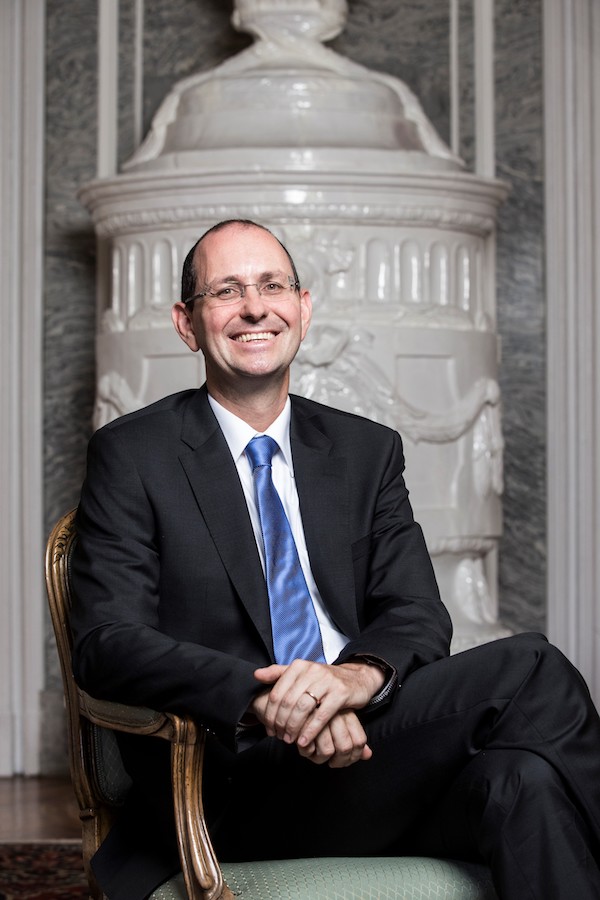
H.E. Dr. Christoph Israng, Ambassador of Germany to the Czech Republic. Photo: Archive
Dr. Christoph Israng, current German Ambassador to the Czech Republic, has served in Prague since August 2017. He came to the Czech Republic directly from his previous posting at The Hague, where he represented Germany at the Organization for the Prohibition of Chemical Weapons. Dr. Israng is quite familiar with the Central and Eastern Europe region, he served for eight years at the Office of German Chancellor as the Head of Department for Central, Eastern, Southeastern Europe, Caucasus and Central Asia. The fact that someone so close to Angela Merkel was appointed to serve in the Czech Republic underlines not only the reality that the Czech-German relations are the best in history, but underscores also the ambition that they should be further fostered.
Coming to the Lobkowicz palace and interviewing the German Ambassador was a special moment for me. I am a Czech-German Young Professionals Program alumni and thanks to the initiative “Sprechtime”, I learned basic German. The Lobkowicz palace, being one of the grandest and most impressive Baroque palaces in Prague, represents a place where history was lived and written throughout the centuries. Ludwig van Beethoven and Carl Maria von Weber, who were supported by the Lobkowicz family, are said to have given concerts in the central Domed Hall. The Palace displays splendid frescos, Gobelin tapestries and paintings.
The Domed Hall still houses concerts, conferences and receptions. I am proud to belong to the Velvet Revolution generation, so I always make sure to visit the so-called “Genscher-Balcony”, where Foreign Minister Hans-Dietrich Genscher addressed East Germans fleeing via the Embassy on 30th September 1989. At that time, the Embassy gave refuge to approximately 4000 Eastern German citizens. The statement by Genscher has become probably one of the most famous unfinished sentences in modern German history: “We have come here to inform you that today your departure…”. The rest of the sentence was impossible to be heard as the crowds started to cheer. This was one of the occasions that cleared the way for the fall of the Berlin Wall on 9th November 1989 and then only eight more days until the beginning of the Czechoslovak Velvet Revolution in 1989.
Mr. Ambassador, what is the current common theme of the Czech-German relations? I know that they are often described as the best in history, but let’s go beyond the headlines.
I will start by highlighting all the similarities between our two countries. They are both located in the center of Europe and we are surrounded by friends. Both countries are also in the center of the European Union, thus we have to care about the future of the EU. Our economies are also similar. We share not only the industrial specialization but also the industrial entrepreneurial spirit. We have also similar social developments. Both countries are doing economically well. At the same time, we should be aware of the challenges ahead, we have similar discussions going on in both societies. I can mention the Industry 4.0. as one example. Let us not concentrate only on the technological aspects and innovation, but also on the sociological ones as to the future of functioning of our society. As both countries are dependent on natural resources, it is the human being that makes the difference to our economies. The Czech Republic and Germany can start looking for answers together.
I have mentioned in the introduction that you are not new to the region. But coming here, living and working here, what was the biggest surprise?
The biggest surprise came when I met people that survived the most brutal violence committed by Germans. The way they interacted with me and my colleagues, the fact that they were open, friendly and in certain ways optimistic. These personal encounters were truly very moving. History is an important base for understanding the present and designing the future.
These moments must be rewarding for you not only personally, but also professionally, as a diplomat. You get to see that the Czech-German process of reconciliation has worked quite well.
We are not at the end yet. But there definitely have been many positive steps. Many individuals as well as many institutions on both sides of the border were involved. It has not only brought the two countries together, but we can start to concentrate on the future oriented projects.
Likewise, let us move from the past to the future. What are the particular topics of Czech-German co-operation?
There are many topics and they have a very wide range. The cultural topics start from learning languages, student exchanges, all the way to literature, visual arts and music. Bringing together people so that they can meet is a very important task and I am glad that the Czech German Future Fund, celebrating 20 years of existence this year, is providing such a forum. In Germany, we need to make sure that Germans know that the Czech Republic is not only close geographically, but that there are many more similarities. Knowledge of the Czech Republic can be improved in Germany. Likewise, we can improve knowledge of Germany here, and I am proud to extend my invitation to the German Embassy Open Day on June 21. I have already mentioned the economic cooperation, digitalization represents another important agenda. When we talk about the challenges, we should also mention the initiatives that originated thanks to mutual co-operation. As a result of the Strategic Dialogue, resulting from the meeting of our two countries, the European Forrest Strategy was originally designed by the Czech and German Ministries of Agriculture and then introduced and adopted on the European level. We definitely want to co-operate further within such a framework, not only on bilateral issues, but also on the issues that go beyond. Currently, we are, for example, closely discussing the future budget of the European Union.
It took six months to form the government in Germany, in the Czech Republic it has taken even longer. Does this affect the everyday nature of diplomatic relations?
The work of experts and the dialogue has never ceased to continue. There has never been silence between Berlin and Prague. Yes, there were fewer meetings on the highest ministerial level, due to on-going coalition negotiations. We hope that the close governmental co-operation will continue, including on the highest level, as soon as possible.
You are known as someone close to Angela Merkel. I am engaged in strategic leadership and Angela Merkel is mentioned as an example of one leader “archetype” according to the Talent Dynamics profiling system. However, despite all her accomplishments, whenever I mention her name during leadership workshops, the Czech audience challenges me and mentions “migration crisis”. What is the broader picture the Czechs are missing to appreciate with regards to the Chancellor who is described as the de facto leader of the European Union, the most powerful woman in the world and the leader of the Free World?
The fact that the migration issue is dominating the overall image does not do justice to Mrs. Merkel, who has been the Chancellor since 2005. Perhaps it would be interesting for the Czechs to know that Mrs. Merkel has truly special emotional and personal relations to the Czech Republic. In 1968, she experienced Prague Spring in Czechoslovakia and her interest in the country has continued ever since. Later, she returned to Prague as a researcher. As a leader, she successfully dealt with many issues, such as European financial crisis. Once we find a solution on the migration crisis, I am sure she will be appreciated in a much more positive way. By the way, we experienced the same tendency in Greece. At first, Greeks were very critical with regards to the measures taken in order to stabilize the economy, now Mrs. Merkel is perceived in a much more positive way. In the long term, I am optimistic that the image of Mrs. Merkel will be based on her achievements.
Mr. Ambassador, allow me to end on a personal note on the future of diplomacy as a challenging profession for a double career relationship. By the way, the Czech minister of foreign affairs is also facing the difficult task to reconcile his career with the one of his wife.
Diplomacy, no matter how of a traditional profession it is, will also have to look out for innovative solutions out of the box. In Montreal, we currently have job sharing of a couple on the position of Consul General. However, this also inquires flexibility from the receiving state. On the other hand, it will always represent a challenge. The modern way of communication makes it easier to some extent, but we still need to be present on the ground, as long as we cannot transfer via a laser beamer…(smiling)
By Linda Štucbartová
Special invitation:
The German ambassador strongly believes that Germans should get to know the Czechs more and vice versa. Therefore, he invites everyone interested to use the unique opportunity to visit the German Embassy. Mark your calendar for June 21, 2018 from 2 pm to experience the unique atmosphere of the Palace and become familiar with more than 30 German institutions working in the Czech Republic. No registration required.
Life Is Beautiful
Part X: The Black Panther In Our Family[1],[2]
“Great achievement is usually born of great sacrifice, and is never the result of selfishness.”
—Napoleon Hill
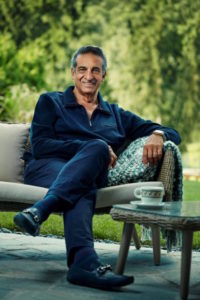
James A. Cusumano, PhD; Chairman Chateau Mcely s.r.o. Prague, Czech Republic
A Blockbuster Success
Marvel Studios’ global blockbuster movie, The Black Panther, is the largest revenue generating superhero film of all time, approaching $1.5 billion. Many feel it will be nominated for several 2018 Academy Awards. It addresses some critical issues which are timely for the world we live in, namely, there is great opportunity in diversity, and the human race is interconnected in ways that are much more critical than money and power.
Nearly the all the cast members are people of color, and women play an important role in helping the protagonist, the Black Panther, succeed in his mission. The movie dispels an age-old Hollywood prejudice, namely that movies with cast members who are primarily people of color have a limited market. The film goes a long way to showing how successful nations can help create a better world for all by sharing their technological advances with those countries that are less developed or oppressed.
Director, producer, screenwriter Joe Robert Cole (Figure 1) who wrote this blockbuster movie is my son-in-law. I’m certainly very proud of Joe, but that’s not why I’m sharing this message with you. As someone who has spent years studying and writing about how to create a happy, abundant and fulfilled life, I want to share an excellent example of how it can be done.
Joe’s life is a clear illustration of someone successfully traveling a journey of success, abundance and fulfillment as discussed in my books, BALANCE: The Business-Life Connection¹ and Life Is Beautiful: 12 Universal Rules².
Path To Success
Before looking at the specifics of Joe’s life, let’s take a look at the general path to success, fulfillment and happiness. There are two important steps in this process. The first thing has to do with the Meaning of Life, which is to dig deep inside and find out what special gifts you brought into this world with you. Everyone has their own. There are usually one, two, maybe three things you are really good at and love to do. They give your great pleasure and satisfaction.
The second point addresses the Purpose of Life. You must find a way to share these gifts with others in a way that brings value to the world and to you. That’s it, it’s that simple!
These gifts are part of your Essence,the true you. You might call it your Personal Consciousness.They fall in two categories, “hard” and “soft.” The hard gifts could be special capabilities in the arts, music, dance, sports, math, science, writing, storytelling, computers, mechanics, etc. The soft type could be personal strengths in empathy, compassion, courage, resiliency, patience, self-awareness, social-awareness, relations-management, etc.
The biggest challenge besides identifying your gifts is our general perception of the definition of success. The prevalent definition has evolved over the past several hundred years and began forming at the onset of the Industrial revolution in the 18thcentury. Consider a metaphor for this definition where Successis pictured as the seat of a three-legged stool (Figure 2). It is supported by three legs represented by Money, Powerand Purpose, respectively. In the free world, a kind of social and cultural hypnosis has been subtly communicated by parents, teachers, the media, reward systems, etc. It primarily values and focuses on Moneyand Power(Recognition).
However, only Purposeconnects to the deepest roots of the human spirit and its unmitigated innate need to serve. We all have it, although it can be heavily camouflaged, depending on external influences that start at the moment of birth, maybe even before then. This connection is so much stronger than Moneyand Powerthat it is the only one of the three legs that can support the stool on its own. Truth be told, it is also the one element of success that provides deep long-lasting fulfillment and satisfaction, and, of course, happiness.
Thus, we find numerous examples of successful people who found and pursued their Purposeand ended up receiving lots of Moneyand Recognition, and those who didn’t do as well financially, still experienced immense personal fulfillment. Likewise, there are ample examples of those who focused on MoneyandPower and never found the bliss from Purpose-created success.
Once you find that talent you came into this world with, the one you do very well, and with pleasure, then you must connect it with a need that makes the world a better place. That becomes your PURPOSEand it cannot help but unleash incredible PASSION, which generates high levels of physical and emotional ENERGIES, enabling you to tap into a CREATIVITY that fosters INNOVATIVE solutions to difficult challenges. This inevitably provides a REWARD. It may be financial, emotional, spiritual, or some combination and that produces intense GRATITUDE. And GRATITUDE is always the source of long-term, abundance, happiness and fulfillment.
Joe’s Journey
When Joe was writing the script for this film he told me he wanted to create the movie he wished he could have seen on the screen when he was a kid. His journey to this success was not straightforward and easy. Here’s a summary of how happened.
An African American, Joe was born in Cleveland, Ohio, famous primarily as home to the Rock & Roll Hall of Fame. Born to Terry Cole, a single mother, Joe never knew his father. Because she was a single mother and a woman of color during a time when even greater prejudice that exists today permeated our social fabric, Terry had great difficulty getting employment. So she and Joe move around a lot. This made it difficult for Joe to make lasting friendships. To compensate for this, at an early age, he began to write stories about make-believe friends. They were good stories and interesting to all who read them, including his teachers. And Joe loved the process of creative writing. He didn’t know it at the time, but he had discovered his special gift—storytelling.
As Joe and his mom moved around the country, she in search of employment, Joe finally decided he wanted to be a professional writer. At this point a negative turn could have occurred as is often the case with children drawn to careers in writing. Terry could have advised him of the challenges of becoming a writer professionally—How will you do financially? Writing is a risky business. But she didn’t. Quite the contrary. She encouraged Joe to follow his dream.
Joe and Terry moved to California and he eventually enrolled at The University of California at Berkeley where he studied creative writing. Before graduation he decided he would focus all of his writing talents on screenplays for movies that eventually he would like to direct. He wanted to write, produce and direct films that would make a positive difference in the world. He was advised by many so-called experts that this would not be an easy journey. That didn’t deter Joe. He wanted to spend his time doing what he loved, what he was good at, and where he was convinced he could make a special contribution.
Although a graduate from one of the top universities in the U.S., Joe took menial jobs that gave him the flexibility to spend quality time writing movie scripts. It was a long haul, nearly 10 years before his star began to rise. Hi first big break came when he was asked to write a few of the episodes for a successful TV series called The American Crime Scene—The Story of O. J. Simpson. Simpson was a successful all-star American football athlete and subsequent movie actor, who was accused and tried for killing his wife. The series won wide acclaim and received several Emmy Awards in 2017.
As a consequence of that success, Joe was asked to write the screenplay for The Black Panther. He finally got the chance to do what he dreamed—create a major film that makes a positive difference in the world. All indications by reviews of the film are that he succeeded in doing just that.
I asked Joe how he felt about those 10 challenging years of very simple living before his success. He said that even though his jobs at the time provided only the basic essentials of life, as long as he could provide for his family, the simple life didn’t bother him. He was grateful for the time he had to write, which is his passion. That passion more than compensated for any hardship.
Joe discovered his talents early on—making movies with a positive message. His Passionwent from a spark to a wildfire when he found a way to connect his innate gift with a need that made the world a better place. If you’ve seen The Black Panther, I hope you’ll agree the film does that (Figure 3).
Yes, the entertainment business is quite challenging, and Joe works hard at his craft. But passion feeds persistence. That’s why he always views any setbacks as “learnings” and not mistakes. So, his odyssey has been one of discovery, rather than drudgery.
Although Joe works diligently at his craft, he’s a caring husband and a dedicated father of two lovely children. While creating his successes, in addition to his immediate family he has always been there for his mom and other members of the Cole family—a perfect example of Life is Love and Love is Life.
So if you haven’t discovered your natural talent—that special gift you came into this world with—you absolutely cando it! Don’t give up! It’s never too late. Ray Croc, founder of McDonalds didn’t find his until he was in his 50s.
Simply summarized, The Meaning of Life is to find your Special Gift, and the Purpose of Life is to Share it with others and make this a Better World.
Sat, Chit, Ananda!
Enjoy your journey, make a difference!

[1] EDITOR’S COMMENT— This is the tenth article in a series based on the author’s book, “Life Is Beautiful: 12 Universal Rules,”Waterfront Press, Cardiff California, 2015.
[2] The author may be reached at Jim@ChateauMcely.Com.

Screenwriter, producer, director, Joe Robert Cole: His life demonstrates a path to long-term fulfillment, happiness and success.

We can envision success as supported by three pillars. By far, the one that has most significant, positive and lasting impact is Purpose.

Joe Robert Cole, screenplay writer of The Black Panther found the Meaning of Life which is to find your special talent, and then use it to create your Life Purpose, namely sharing that gift with the world to make it a better place.
#ChooseLoveEveryDay
Celebrate the cosmic energy of love, harmony, and summer relaxation!
- Afternoon lounging in the park with uplifting music
- Daily cocktail hour – “Thanks for Another Beautiful Day”
- DJ Lumiere
- Outdoor cinema
- Breathtaking sunsets
- Lunch & Lounge with Bellavista
Yoga - Meditation
- Tibetan bowls meditation concert
Outdoor fitness - Open-air massages
- Natural swimming lake and homemade lemonade
- Bikes
- Champagne Time
- New summer à la carte menu by Executive Chef Honza Štěrba
More information about the events here.
Guest of Honor: PhDr. Zuzana Lizcová, Ph.D., Journalist and Analyst, AMO
Topic: Berlin and Vienna: known or unknown neighbours?
Top Hotel Prague has an exceptional background for congresses and a very pleasant atmosphere. An interesting opportunity for corporate and private events is the Japanese Garden, which is attractive for tourists and evokes a sense of peace, unique experience and direct contact with nature. In addition, the Top Hotel is a rare match with the ancient Asian principle of Feng Shui, which is a simplified old Chinese art of life in harmony with the surroundings.
Top Hotel features all 5 basic elements of Feng Shui that interact with each other: water, wood, fire, metal and earth. These elements also affect all things and phenomena in nature. In the interior and exterior of the hotel there are 22 water fountains, which create a relaxed and comfortable atmosphere.
The garden was built on an area of 7000 m2 and includes two terraces. The first terrace consists of a waterfall with a pond, which was composed on a vista from the hotel’s winter garden. On the other upper terrace there is a larger water area with a singing fountain and a charming wooden bridge in Japanese style. The biggest attraction of the whole green complex is the singing fountain, which is complemented by light effects in the summertime and offers an unusual experience.
In the spring, sakura and Japanese azaleas flourish. The waterfall and the surrounding stone compositions are planted with evergreen trees – buxus, yew and stone. The red-backed Japanese maple then creates a colorful accent to this scenery from spring to autumn.
The unique setting of the Japanese Garden can be used for a garden party, a wedding ceremony, an outdoor party with barbecues or unusual corporate meetings.
On 19 April at Prague Castle, the Czech Management Association awarded the title Manager of the Quarter-Century for consistent management performance to the following people.
President of the Senate, Milan Štěch, visited Sweden in April. He commemorated the events of 1968 in Czechoslovakia in Stockholm, launched an exhibition mapping 100 years of Czechoslovak statehood, met the Speaker of Sweden’s Parliament and representatives of three ministries, and also met King Carl XVI Gustaf.
“My goal has always been to make the EU more accessible, pragmatic and bring it closer to citizens”

Martina Dlabajová, Member of the European Parliament
After the EU studies at Padova University where she obtained title Dott., she dedicated her professional life to business and international consulting. She is also a former Chairwoman of the Zlin regional Chamber of Commerce. She has been a member of the European Parliament since 2014. She is a Vice-Chair of the Committee on Budgetary Control where she has been dealing mainly with the auditing of EU funds and controlling and improving the system of their absorption. As an active member of the Committee on Employment and Social Affairs she focuses on youth employment, labour mobility, support of SMEs and creative industries. In the Czech Republic she has launched a motivational project called PročByNe? that offers to young people under 25 years the opportunity to fulfil their professional dreams through exclusive traineeships.
You have experienced a business life. What a normal businesswoman/men expect from the European Parliament?
You cannot never expect more without being willing to give more to it. Coming from business, I have always been very creative and practical person. And when you are full of ideas, you definitely want to make things moving fast. This was my attitude since the beginning. My goal has always been to make EU more accessible, pragmatic and bring it closer to the citizens, to inform people, both in Europe and in the Czech Republic what are the benefits and opportunities and how citizens can make the best out of them. This has not always be an easy task, but when I asked to the audience when delivering my very first speech as a politician, what businesses would actually like to hear from me, one businessman answered: ‘Nothing. Just listen.’ And he was completely right. People nowadays in general stopped to listen to each other. Half of everyone complains that the other half isn’t listening. And those accused of not listening are complaining that they are not being heard. Let’s change it! Whether you’re engaged with a colleague, a family member, a citizen, make it important to start listening. For politicians, there may be no better advice!
What are your achievements in the European Parliament? Is there anything you would like to change as a Member of the European Parliament?
My greatest achievement is to see that my work helps making other people’s lives better. It is the case of successful stories of my trainees, who took part in my own project of motivational traineeships called “PročByNe?”, a project that I created in the Czech Republic three years ago. The project is not that much about tackling youth unemployment in the country, but mainly about motivation to fight for our dreams and positive examples. We already have over sixty successful “alumni” who completely changed their lives or got a job offer thanks to their dreamed traineeship. And this is what makes me really happy about my job. Tackling youth unemployment has actually been one of my biggest struggles since the first day of my parliamentary work. Therefore winning the 2015 ‘MEP of the Year’ award in Employment and Social Affairs category (as first Czech MEP ever at that time) and being nominated for the same prize this year too, is a true reward for all my work I put in.
Back in 2014 you said we cannot change anything through pure criticism and negative attitudes towards the EU. Has our attitude towards the EU changed insofar?
I believe we made a good progress but we need to change even more and to come up with creative ideas and constructive approach to EU politics. The past few years have been tough for the Union and they have created a deeply rooted negative feeling towards its institutions. Unfortunately, some national governments blame the EU for their problems and this is something I simply cannot accept. We will not achieve anything by pure criticizing and as it is said: ‘those who live in glass houses should not throw stones’. The EU should not be an excuse to any dubious behaviour or decisions. We are Europe and we are all responsible for the decisions we make, this is what we need to keep explaining to European citizens.
The populism and anti-EU approach is going around Europe. What is the reason behind?
We simply failed to communicate Europe and its achievements. For instance, the media coverage about the EU remains very low as well as their cooperation with politicians; yet these people have the most influence on how the public sees the EU. Unfortunately, the EU failures also get to the news more quickly than its achievements. And this is the root of the problem. However, we should realize that the EU, although facing several crises, is the richest and most successful political and economic complex, ensuring its citizens peace, freedom and prosperity for the past 70 years already. And we should keep this in mind every day. We must go back to the roots and focus on our common values and principles. If we want a future together, we have to work on it together.
Why is the posting of workers so important issue for you?
For me it is in fact a matter of values the EU is built on. Posted workers for me represent a symbol of free movement across Europe and freedom of cross-border provision of services within the single market – values which stood at the very beginning of the European integration and which were the main motivation for countries of Central and Eastern block to join the Union. Spending half of my life in Italy, I have personal experience with doing business abroad and I must say that it is very sad to see that politicians mostly from Western but also other countries nowadays tend to slip into ideological debates rather than dealing with the facts when it comes to posting of workers. They do not realize what the main cause of problem Europe is facing on labour market is. It is not the free movement of persons and services, but its abuse. And we will never solve this problem with protectionist measures or restricting the single market. Those who want to abuse the rules, always find the way and the new administrative burdens will only harm mostly those who abide by them.
You have also focused on better skills for the future. What can the EU offer in this regard, as the education is a national competence?
To find the way, how to help young people overcome the challenges they are facing today. Europe should switch towards more work-based learning, a system that will provide them with the right skills, because skills mismatches affecting individuals and businesses, has become a worrying and growing phenomenon Europe is struggling with. The statistics are quite alarming. Today, more than half of the 12 million long-term unemployed do not have sufficient qualification or skills needed to succeed on the labour market. More than 30 % of highly qualified young people are in jobs that do not match their skills and aspirations and 40% of European employers say they are unable to find people with the skills they require in order to grow and innovate. There are already several tools on both EU and national level, but nothing will change if we do not switch the mind-set first and the way we look at education. As I emphasized in my own report on matching skills and jobs and the New Skills Agenda for Europe, we need to ensure, that current education and skills are always linked to the labour market and its needs. Just as we cannot speak about employment without education, we cannot contemplate education without the employment perspective. I believe education is a collective responsibility; thus it is not a question of national or European level, but we all have to take a hard look at what should be doing differently and how to better anticipate future skills needs through close cooperation between businesses, education and policy makers.
We celebrate 25 years of the Single Market. What are the barriers we are still facing?
There are a lot of them. The EU must now concentrate on completing the Single Market in all areas and removing barriers, especially in the area of provision of services. Social policy should focus on job creation and economic growth rather than building new barriers as it is sadly the practice now in Europe. Although we struggle to improve the functioning of the Single Market on one hand, we hinder its development with protectionist measures dividing Europe on the other hand. We have to bear in mind that Europe’s prosperity depends on its greatest wealth – and it is us, the Europeans who live and work here. In a rapidly changing global world, it will be mainly human capital and skills, which will become the engine of our competitiveness. But we need to make them moving freely to boost competitiveness and support natural wage convergence. In general, we should do our outmost to make people’s life easier, not the opposite; support labour mobility, make favourable environment for boosting entrepreneurship and fight administrative burdens while making rules simple and easily enforceable. Europe, which is not competitive within its internal market, cannot succeed globally.
When should the Czech Republic introduce euro?
I would welcome if the debate on the possibilities of introducing the euro in the Czech Republic was seriously opened, because I do believe that the future of the Czech Republic is undoubtedly within the Eurozone. However, over years, we have been witnessing several failures, which created severe problems across the whole Europe and I think the system should go through a profound reform. It would be a fundamental mistake to start a single currency without having all the instruments that the euro needs. However the Czech Republic cannot stay aside, but actively participate in the reforms and come up with concrete proposals.
Besides the life in politics, do you have any notable hobbies?
First of all, I am a passionate traveller. I love meeting new people and cultures. In fact, my whole life is a journey. After all the years spent in Italy, I regularly travelled to Zlín and my business activity was spread over several sites in Europe. Without exaggeration, I spent a lifetime on the road! I am also an avid reader and the owner of one of the largest collections of copies of The Little Prince in the Central Europe. I managed to collect over 210 various editions in 65 different languages and dialects from 50 countries from France to Japan. However, my biggest hobby, which is definitely worth to fight for, is Europe that works for its citizens!
Thank you for the interview!
Alena Mastantuono, Director of CEBRE – Czech Business Representation to the EU
“An opportunity to deal with matters conceptually”
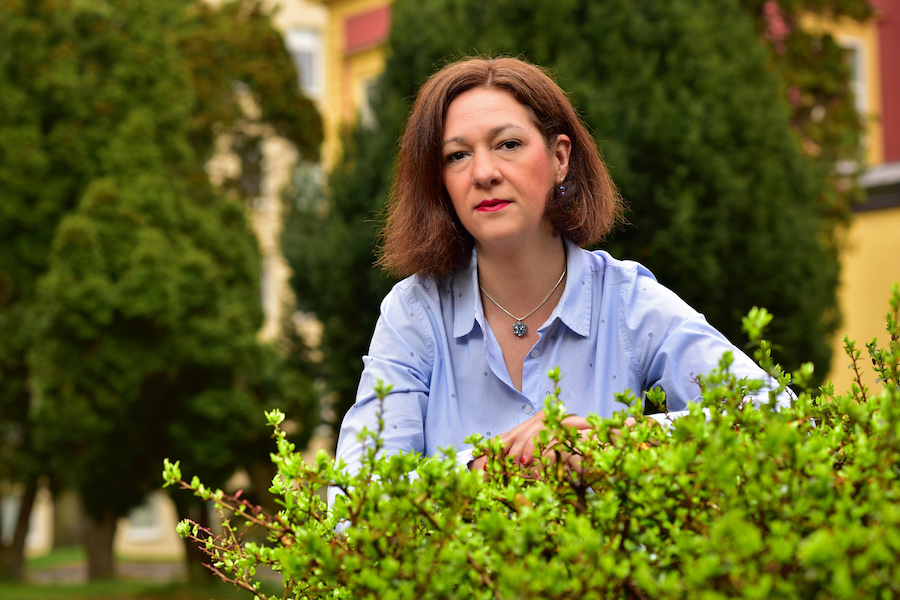
Šárka Kulkusová, Commercial Director, Rudolf and Stefanie hospital, Benešov; photo: Vratislav Noha
This issue, I have decided to take the interview with “doctors” section not from the perspective of a doctor, but rather of those who play a large part in hospital operations. Šárka Kulkusová’s story, however, has given me plot twists and surprises at a number of levels. Meet a lady whose mission is to connect and communicate knowledge, and through sharing and teamwork move things forward. She has held numerous management positions within pharmaceutical and medical device companies for over 15 years. She studied Healthcare Management at the Advance Institute. She ended her career in a regional role, but at that time she was already battling burnout syndrome. Once she discovered that a career within corporations did not fulfil her, she swapped corporations in the capital city for working where she lives and in a sector which is currently fulfilling her. For a year now, instead of selling medical devices she has been dealing with all strategic purchases for the hospital where she works. She has time and energy to spend on her family life and five-year old daughter. She is continuing her studies too, taking a course in Authentic Leadership. The history of Rudolf and Stefanie Hospital in Benešov goes back to 1898. At the beginning of the 20th century, the hospital operated a unique tuberculosis ward in Benešov, one of a small number in Austria-Hungary, and another important milestone in the hospital’s history is the boom in laparoscopy during the 1980s when the hospital was at the cutting edge of the field. While in the past patients insisted on seeing experts in Prague, today in contrast many Prague residents travel for treatment outside the city. The benefits include shorter appointment and waiting times, a personal approach and a more intimate, almost family environment with care at least comparable to university hospitals.
A year ago, you swapped a corporate environment for the public sector, while remaining within the healthcare sector. How did you perceive this change?
Healthcare is a constant presence throughout my whole career, and I am very pleased I took the opportunity to stay in the field. The leap from one of the largest healthcare corporations in the world to the public sector was a big one. At the very beginning, it felt like it was a completely different world, but with each new day I came to realise, and I am still discovering, that both worlds have a lot in common. The experience of working in an international, frequently culturally very diversified, team has undoubtedly helped me to quickly adapt to different environments. I was able to exploit this experience, for example, in the process of hernia centre certification by an American independent accreditation company, something our hospital acquired last year.
I see a certain difference as compared to the corporate sector in the flexibility of decision-making – we deal with problems here and now, using more direct processes, with less meetings, planning and reports. On the other hand, healthcare is subject to loads of regulation, the legislative framework isn’t always entirely simple and this naturally places demands on both medical and non-medical staff, and the job of management is to set up conditions within the organisation such that the administrative burden and processes are as efficient as possible while remaining in line with all regulations. Another large area is company culture, which, regardless of whether you are in the corporate or public sector, is very important in achieving good results whether in terms of care provided or in terms of economic parameters. My colleagues and I perceive this area as highly important. I see further space for development and investment in the computerisation of processes, opportunities for sharing and data harmonisation between hospitals within the one overall authority leading to greater efficiency both in purchase and, for example, in the spectrum of care provided. To be honest, this was probably the greatest surprise for me. Each hospital has its own different IT system, but unfortunately the systems can’t always communicate with each other, even within one hospital. Working with data thus takes a long time due to the absence of a single system of analytical tools and so on. One positive is that with EU grant programmes, hospitals have an opportunity to deal with these often costly investments, even at the overall authority level. After working in the hospital for a year, my greatest reward is the feeling of a job done well, and the purpose behind what I do. As in my previous jobs, I’ve been really lucky in my high quality team and colleagues, something which is an important factor for me since the positive and clearly grasped results of teamwork are my greatest motivation.
Many forty-somethings are looking at leaving corporations and seek out other ways of working which will fulfil them more. What was the crucial moment for you?
There were definitely a number of factors involved. I had been gradually losing enjoyment from my work. Corporations are usually highly focused on performance, and with increasing globalisation it isn’t always possible to deal with matters in the way which is best at a local level. After 10 years, I had the feeling that I had nothing more to offer the company. Paradoxically, I had begun to have these feelings at a time when I was doing well professionally, I had a team which was working well and we had great results. I was ever more looking at what next, how to continue… I knew that I had to change a number of things in my life, but I didn’t have a clear idea of how to do so, and probably for the first time in my life I couldn’t even clearly define it myself. After leaving the corporation and numerous medical issues, I prescribed myself a holiday of a number of weeks with my daughter, and I put the direction of further professional steps on ice. By chance, immediately upon returning from my travels, I found out about a newly opened position in a hospital near my home. Intuitively, I felt that this was an opportunity I wanted to take on, and I was successful and landed on my two feet in the public sector. I was very attracted to being able to be there at the genesis and having the power to influence how parameters and purchase management processes would be set up within the hospital. The opportunity opened for me to deal with matters conceptually within a local environment where the main parameters aren’t just numbers and performance, but with great stress placed on a personal approach both towards our clients and in the quality of care provided.
You’ve swapped Prague for Benešov. What are the specific features of your hospital?
Benešov’s Rudolf and Stefanie Hospital can boast a very long history – this year we’re celebrating 120 years since we were founded. We currently have around 830 employees, making us the second largest employer in the region. We have 20 specialised departments which provide both outpatient and inpatient care. The spectrum of care we provide is set in line with the hospital’s regional status, with Internal Medicine, Surgery, Orthopaedics, our newly renovated Gynaecology and Maternity ward, and our ENT department including sleep laboratory forming our principal departments. Our objective is to provide primary care. We have opened a new inpatient rehabilitation ward where care is provided to patients following joint replacements and others – conceptually it builds on our Orthopaedics division, which performs the full range of joint replacements. It is certainly not our ambition to build up highly specialised centres. For our clients whose conditions require specialised treatment, we secure specialised care at Na Homolce hospital, with whom we concluded a Memorandum of Cooperation last year. We provide patients with care in a pleasant family environment in which we place emphasis on a personal approach and close multidisciplinary co-operation. It is no exception for patients from more distant regions to seek us out, especially within ENT, orthopaedics and our Gynaecology and Maternity ward. Last year, our hospital became the only certified Center of Excellence in Hernia Surgery in the Czech Republic (COEHSTM), joining ten other Centers of Excellence in Hernia SurgeryTM around the world. In November 2017, we successfully renewed our Spojené akreditační komise, o.p.s. (Joint Accreditation Commission – SAK) accreditation, and we were very pleased to once again be awarded the title of Best Central Bohemian Region Hospital 2017 in the safety and satisfaction of outpatients and inpatients. Personally, I see as very positive the fact that despite dealing with a lack of staff like every healthcare facility, we have not as yet been forced to limit care as a result.
What is your vision and mission for your new position?
Along with my colleagues, I have many plans in my new position, and I trust that we will be able to gradually implement them. Personally, I am really looking forward to one new project: creating our hospital charitable foundation. Another goal is to build a new complete rehabilitative care wing, and the complete renovation of our Internal Medicine wing. My personal goal is the computerisation of the purchase system across the hospital, which will allow us to work more efficiently. Another objective is to gradually boost co-operation between individual hospitals falling within the one authority, and not just in terms of purchasing. I will definitely be satisfied if we manage to maintain current quality, especially in the field of medical devices and medicines, without having a negative impact on the hospital’s budget. Working in healthcare is very fulfilling and it brings me joy that I can work, and perhaps even help a little, in moving forward the hospital in the region where I live and where I was born. I am glad I can apply what I have learnt in business, and thanks to sharing experience with my colleagues move things forward for the better. Work in my new team enriches me enormously, and allows me to continuously learn.
Let’s move on to your Masters of Healthcare Administration studies.
I would highly recommend studying Masters of Healthcare Administration to anyone in a management role in the healthcare sector, and also to doctors in management roles. The programme gives students a comprehensive overview of contemporary healthcare. I was very pleasantly surprised by the high quality of teachers, structure of lectures and I also see added value in the high quality and diverse selection of students. Programme participants come from various segments – hospitals, insurance companies and suppliers, allowing for fascinating discussions, and the acquisition of real, practically applicable knowledge.
Work–life balance is major topic not just for healthcare personnel, but also managers. How are you managing in this regard?
If I were to give it a school-type grade, then I’d give my past year a B. I believe that everything that happens to people in their life has some significance or meaning, and in my path I have finally learnt to spend time on myself. I have a strong and stable family life, for which I thank my great parents. Contentment in my private life is very important for me, because when one’s working and personal life are imbalanced for a long time it creates negative consequences which sooner or later will make themselves apparent. I am a person who can’t do nothing, and as such I spend my leisure time actively with my daughter, partner, friends and family. I love good food, I really enjoy cooking which is a kind of relaxation for me, and if I can combine good food with travel, then that’s just ideal.
Your final message…
I probably can’t change the direction of the wind, but I can certainly set up the sails on my boat so I can always sail to where I want to go.
By Linda Štucbartová
The first human trials favor dark chocolate consumption for more than just stress.
This isn’t the first time we’re hearing that eating dark chocolate has some healthy perks, but this is the first time the effects of dark chocolate have been tested on people—and we like what researchers discovered.
Recent studies show that dark chocolate with a high concentration of cacao—at least 70%—can have positive effects on stress, inflammation, memory, mood, and even the immune system. Flavanoids, which are found in cacao, are anti-inflammatory. Other benefits include enhanced neuroplasticity, the brain’s ability to adjust and create new connections which happen as we experience, learn, and adapt to new and everyday things.
We definitely don’t need more excuses to eat chocolate, but these results seem promising. To reap the benefits, make sure you’re reaching for dark chocolate labeled at least 70% cacao. Try melting some chocolate to make these Naked Dark Chocolate Peanut Butter Cups or sneak some chips or chopped dark chocolate into these muffins.
For chocolate with even more benefits, we love Good Day Chocolate (and other snacks with benefits, too!).
This Story Originally Appeared On Real Simple
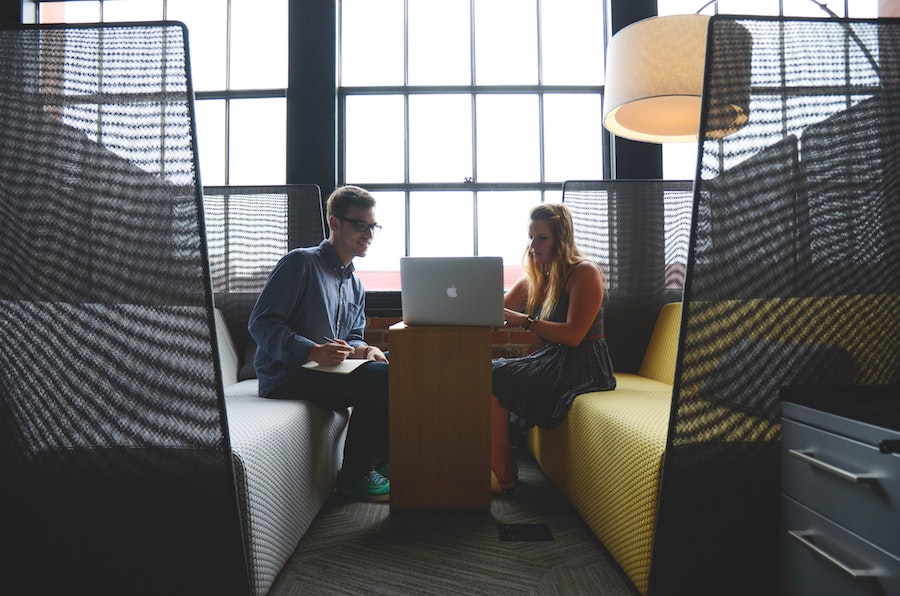
Browse the internets, and you’ll find a ton of advice on how to start your own consulting firm. Site after site will tell you how easy it is to go it alone, leave your job, and fulfill your dreams.
This isn’t one of those posts.
Why not? Well, what many of these “advice” sites don’t say is this: getting the first few clients is the easy part. The hard part is figuring out what to do when you’re a little further down the road. When you already have a few clients, and are trying to actually grow your business. When you already have employees, and want to make sure you can continue to pay them. When you’ve already hit up all of your personal connections, and are looking to become an actual consulting brand.
If that’s where your consulting firm is (or if you imagine yourself there one day), this post is for you. It’s about how to run a consulting firm successfully, not just how to start one.
One post, of course, can’t pretend to give you all the advice you need to run a business. But we can focus on a few things that will help you grow your business.
Increase Your Level of Expertise
You got into consulting because you identified the niche: the expertise you have that businesses need (and will pay for).
How do you keep your consulting business viable? Simple: become more of an expert.
Businesses hire consultants to solve problems they can’t solve on their own. What does this mean for you? The more problems you can solve for the people hiring your firm, the more valuable you become.
You’ve already got some knowledge. Now it’s your turn to drill deep. Learn every single thing there is to know about your field. Figure out all the scenarios in which your firm’s knowledge could apply, and generate ideas about what you’d do in them. Keep up with trends, software, tools, and new regulations.
Successful consulting firms are those who can tell businesses, “don’t worry – we’ve got this for you. All of it.”
Get External Validation for Your Consulting Work — and Showcase It
We all know you do good work; it’s what’s gotten you to this point. Now it’s time to angle for bigger fish. And to land them, you’ll need shinier bait.
What kind of bait? Third-party validation.
It’s the sad truth that no matter how path-breaking a company might be, most businesses are, by nature, conservative. Meaning: businesses like people to be vetted by other businesses. It’s a little like high school: sometimes the appearance of popularity is all it takes to actually be popular.
Your job is to appear popular.
There are lots of ways to do this. You can write up case studies and display them on your website. (Or, even better, get the businesses who hire you to display them on their site!). You can and should pursue awards in your industry. You can get backing from regulatory bodies, or earn certification that other consulting firms don’t have.
The thing to remember is that while these awards and case studies all reflect work you’ve already done, the point of displaying them is to attract future work. Think of them as rungs on a ladder: you need them in place to climb higher.
So get that validation, and make sure everybody sees it!
Read the rest of this interesting article courtesy of ClickTime here.
 Have you heard of the rule of three? If you are a professional communicator or a presenter you may have, but have forgotten it and instead you keep writing messages and presentations which include a multitude of themes and bullet points wondering why they have minimum impact?
Have you heard of the rule of three? If you are a professional communicator or a presenter you may have, but have forgotten it and instead you keep writing messages and presentations which include a multitude of themes and bullet points wondering why they have minimum impact?
My participation in the Strategic Internal Communications training course, organised by the Chartered Institute of Public Relations in London, UK, reminded me of how ‘the rule of three’ can result in a very engaging content as well as make communications much more effective and memorable. This rule can also stretch beyond work: it may potentially simplify and help you regain control of your life, boost your productivity and reduce your anxiety.
I recall my university days where I heard the Latin phrase Omne trium perfectum (Everything that comes in threes is perfect) for the first time. This saying conveys the same idea as the rule of three since having three entities combines both brevity and certain rhythm with the critical amount of information to create a pattern that people can easily relate to and remember. If speeches and pitches are sprinkled with lists of threes, they look both simple and catchy without authors/presenters losing the impact as subject matter experts. Even a speech itself can be structured along the tri-pattern; you may have come across the old advice by Aristotle* for the most effective speech delivery: “Tell them what you’re going to tell them, tell them, then tell them what you just told them”. Simple, direct and memorable, this ‘triptych’ is a useful method to deploy whenever you need to make a presentation, long or short, which you want audiences to remember.
So, what’s the magic behind number three? It is well established that we can hold only a small amount of information in short term. In 1956 Bell Labs reached out to Harvard professor George Miller who published a paper titled, The Magical Number Seven, Plus or Minus Two. Miller argued that we have difficulties retaining more than seven to nine digits in short-term memory. Contemporary scientists, however, have put the number of items we can easily recall in short-term memory closer to three or four chunks of information. Think about it. When someone leaves a phone number on a voicemail, you’re more likely to recall the first three digits before having to listen to the message again to get the remainder of the number.
Many companies use the rule of three to craft their taglines and marketing communications. Take ‘Just do it’ (Nike), ‘Every little helps’ (Tesco) and ‘Vorsprung durch Technik’ (VW). Steve Jobs apparently applied the rule of three in nearly every presentation and product launch. For example, in 2007 Jobs introduced the first iPhone as the ‘third’ of Apple’s revolutionary product categories (the first two were the Macintosh and the iPod).
On the politics front, the Churchill’s ‘blood, toil, tears and sweat’ was promptly transformed into the popular and more memorable ‘blood, sweat and tears’. In a more distant past, the rule of three clearly impacted slogans such as the well-known French Liberté, égalité, fraternité used during the French Revolution in 1789 and Veni, vidi, vici attributed to Julius Caesar who wrote the phrase in a letter to the Roman Senate around 47BC. Tapping into literature, it is also no accident that the number three is pervasive in well-known stories, such as Three Musketeers and Three Little Pigs, to mention but a few. And there are many more examples from other disciplines.
As the seminar also focused on building a company culture, our discussion revolved around values that companies want their employees to identify with and embed in their daily activities. We were put through a challenging test to name our company values, which created embarrassing moments for a few participants but also revealed that some companies have up to 12 values and nobody remembers any. Company values should be authentic, relevant, should have the purpose behind them, embody what the company stands for, and should be linked to the key areas that matter to a particular business. And, they can be just three, three core values which represent deeply ingrained principles, guiding all company’s and employees’ actions, serving as cultural cornerstones.
The same applies to personal goals; if you have an endless list of goals and simplify them to the three principal ones, you are more likely to achieve them. It will help you stay on track, focus fully on less with absolute clarity about your progress. In the today’s fast-paced world, your huge workload, family and busy social life can sometimes get the better of you; the rule of three can help you regain control of your life. How many times have you felt you have more than you can chew on your plate? How many times has your day gone confusing or out of control? If that happens, one of the methods to get out of the rut is to try to prioritise, invoke the rule of three to settle your brain and bring some focus to your activities. And don’t forget to count to three when you encounter some disagreeable idea!
However, the power of this rule does not solely lie in the number three; such list is not created randomly and it always matters most what sits behind, so the substance, the meaning, the purpose. I believe this applies to any set of threes mentioned in this article including values.
Although it may seem beneficial to follow the rule of three, there might be occasions when this rule may not work. However, before you decide to dismiss it, it’s advisable to understand it better and see how and where it could work to your advantage, in a company and/or for you as an individual.
*This quote has been also attributed to Dale Carnegie, an American writer and lecturer, as well as to others.
By Tereza Urbánková – PR, communications and marketing professional with over 19 years’ experience and proven success in delivering award-winning communications programmes for multinational companies operating in industries such as hospitality, retail, IT, defence, broadcast, logistics and engineering. After having lived and worked in the UK for 11 years, she has recently moved to Germany where she works as Head of Global External Communication, Animal Health, for Boehringer Ingelheim, a global pharmaceutical company. Tereza is a member of the Executive Committee of the Czech British Chamber of Commerce in London. She speaks Czech, English, Spanish and Russian and can be reached through her LinkedIn profile.
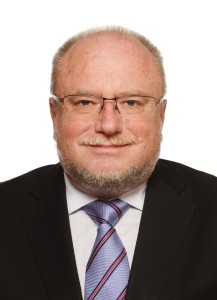 The Czech economy enjoyed a splendid year during 2017. The economy was dynamically growing with both strong exports and households’ demand. It reached the highest growth rate since 2015 (4.4%) but unlike that year in a natural way, without the factor of accelerated spending of EU funds that was then dominant. The exports of goods and services grew on the y-o-y basis by 5.8%. Positive economic indicators were accompanied with significantly low registered unemployment that reached a 3.8% ratio at the end of 2017, and by renewed inflation in consumer prices of 2.5 per cent driven by tense labour market and strong pressure for wage growth. Beside the constantly growing automotive industry certain marks of improvement could be seen also in the so far problematic construction sector.
The Czech economy enjoyed a splendid year during 2017. The economy was dynamically growing with both strong exports and households’ demand. It reached the highest growth rate since 2015 (4.4%) but unlike that year in a natural way, without the factor of accelerated spending of EU funds that was then dominant. The exports of goods and services grew on the y-o-y basis by 5.8%. Positive economic indicators were accompanied with significantly low registered unemployment that reached a 3.8% ratio at the end of 2017, and by renewed inflation in consumer prices of 2.5 per cent driven by tense labour market and strong pressure for wage growth. Beside the constantly growing automotive industry certain marks of improvement could be seen also in the so far problematic construction sector.
The economy will continue in a positive development also in 2018 but it is very probable that the brilliant growth rate 2017 will not come again. Recent estimates of GDP growth for the Czech Republic hover around 3.5% not only due to external markets where demand gets near to its peak (especially the demand for cars that form a significant part of Czech exports) and problems of protectionism arise in the global trade scene, but also due to internal limits of the Czech economy where low unemployment blocks investment and, inter alia, signalizes a lack of system space for investment in 4.0 technologies.
The koruna (CZK) will continue its appreciation, potentially under 25 CZK/EUR and 20 CZK/USD which will prompt the inflation to slightly decelerate to a rate around or moderately under 2%, the central bank’s long-term target. This will manifest itself in spite of growing wages and salaries due to the missing workforce in the market (the Ministry of Finance estimates the growth about 8 per cent in 2018). It also signifies that the hitherto prevailing growth model by cheap labour comes definitely to the end. The basic interest rate will be probably raised again and continue to get near to a “normal” level, and also will be pursued by the Czech National Bank with the aim to prevent the economy from overheating.
The planned deficit of the state budget of 50 billion CZK (i.e. about 1.97 billion EUR) is not too extensive but, nevertheless, was subject to criticism by the parliamentary opposition to be too high for the period of extensive economic growth while it was necessary to provide for funds for harder times that are inevitably to return one day. Even if the expected development of tax revenue may act for keeping, or even reduction of the planned deficit, it will still remain in some tension as to the final result due to the need to make preliminary investment into some delayed projects that can only subsequently be co-financed by EU funds.
Once again it is to be accented that the former government did not progress in necessary economic reforms, such as in the social security, health service or education system, and made only simple and partial compensations to some groups of socially exposed persons and to the extending state administration instead. Simultaneously, no trend is available to prove that richer and more numerous state officials will be more efficient in their service to the public. On the opposite, the system of university education, crucial for the accomplishment of necessary structural changes in the sphere of industry decisive for the future of the Czech economy, has remained underfinanced. All in all, the burden of necessary reforms is thus transferred to the difficult new government to be established.
The non-systemic expense steps of the former government have amplified the problem of mandatory expense, originating from legislation or contractual obligations of the state, such as the salaries in the public sector or pensions. Only the newly extended items in the state budget of 2018 are to increase the extent of mandatory expense by more than 35 billion CZK, not speaking of recent decisions like the approved subsidized reduction of public transport fares for pensioners and students from June 2018. Such items of expense may look easy to be introduced in the times of general bonanza but will deepen the deficit in the time of crisis, and may also significantly restrict necessary space for public investment in the long run.
Emanuel Šíp
Partner
Allied Progress Consultants Association
“We live in a fast-changing world.”
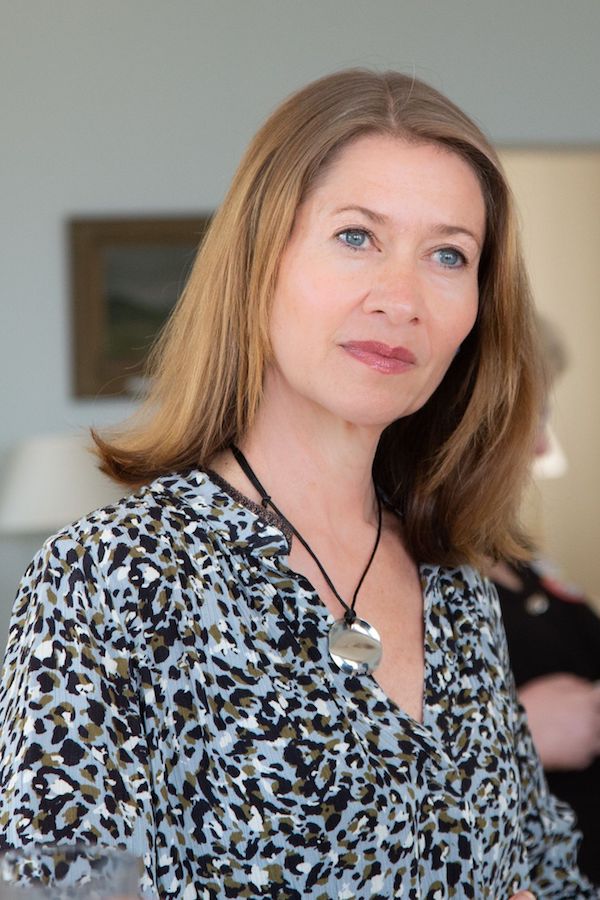
Mrs. Viktoria Li, Swedish Ambassador to the Czech Republic (Photo: Něso Matič)
Interviews with ambassadors are music to my ears. It is a unique opportunity not only to get special insights but also a moment to hear positive words of praise about my country. Already my walk to the Swedish Embassy, all the way up to the Prague Castle at spring time Prague, made me fall in love with my city again. I carefully listened to Mrs. Li describing Sweden, having comparable population to the Czech Republic, being a middle-size country. Originally, I chose three topics associated with nowadays Sweden. The first topic was innovation. Did you know that Spotify is Swedish? And that Stockholm produces the second highest number of billion-dollar tech companies per capita after Silicon Valley? The feminist foreign policy was the second issue. What does it mean? In this context, it is worth mentioning that Sweden has over 40% women ambassadors. In the Czech Republic, the long-time score has been around 10%.
Last but not least, I was interested in Mrs. Ambassador’s view on the Czechs and the Czech culture. Having so interesting topics, I did not feel the need to ask any personal questions. I do not usually ask such questions to male ambassadors either. But one thing Mrs. Li revealed herself, her name comes from her Chinese spouse.
Mrs. Ambassador, you came to Prague from Beijing. It was a direct transfer for you, meaning that you did not serve back at Stockholm headquarters. How did you find such change of posting, from a big country to a small country, from a superpower to a country where it seems that the time stood still, at least climbing the medieval cobble stone streets on the way to your Embassy?
I spent six years in China and as you mentioned, it was a big change to come back to Europe. China is a dynamic country, the sheer size is amazing and it impacts the work. Living in cities like Beijing and Shanghai is fascinating, they say, that these cities where 24 to 30 million people live, never sleep. But I appreciated coming back to Europe, where many things are on a more human scale. Travelling across the city does not take the whole day, we get in and out of the country really easily, Internet is freely accessible and you have a better possibility of recreation in the nature with cleaner air.
What was the change as far as the nature of diplomatic work is concerned?
It was great opportunity to work in China and to promote Swedish business, Swedish culture and as far as it was possible, Swedish values and policies. Coming back to the Czech Republic is working in a different context. We are working with a friend and partner in the European Union and the cooperation takes place at much deeper level. We address more specific issues and their span is also much wider. I enjoy working on European issues again, since they are close to us as Europeans and affect our everyday lives. We all want the European Union to function well. I still remember when Europe was divided.
I was travelling across Central and Eastern Europe when I was only 15, we were travelling by train and I remember the strange feeling while travelling through the other side of the Iron Curtain. It is nice to be engaged in the process that has reunified Europe and it is inspiring that we are working together to improve the functioning of the EU. The Czech Republic and Sweden have so many things in common. We cherish open trade, open society, we want to develop our economies in a more digital and innovative way, we both care about climate and environment and both of our countries are engaged in global sustainable development. Now, the Czech Republic is chairing the United Nations Economic and Social Council and Sweden holds a seat as a non-permanent member of the Security Council and such important positions only underline engagement of both countries on the international scenes.
Mrs. Ambassador that sounds like music to my ears. What are the issues on which we do not agree?
Migration issues might be one example. But let us not exaggerate the differences, as there are many points we agree on. We both agree that the Schengen-area is important and it should function. We all appreciate Schengen being convenient and efficient in order to travel, to study or to work. We want the EU to have well-protected boarders and that we maintain control on who is coming and moving around. Both countries share such views. This being said, we cannot ignore the huge migration that is currently going on, including the refugee crises. There are hundreds of million people migrating. Some of them are trying to find a better life, some of them are moving because of wars, internal conflicts, draught and hunger. We cannot put all these people in the same category. We understand that all migrants cannot come to Europe. At the same time, we do need people in Europe to become part of an active workforce. The Czech Republic already accepts many working migrants, coming from Ukraine or Vietnam. In Sweden, we also need highly-skilled people for qualified work. On the other hand, people who leave their countries involuntarily need protection and have the right to ask for asylum. We have to follow international rules and we should work together in order to set up the best mechanisms for handling these different questions with full respect for human rights. The European Union needs to have an efficient mechanism to handle a refugee crisis, where we show solidarity with each other. The situation in 2015 became unsustainable. We had 160 000 people arriving to Sweden within a couple of months. It was difficult to shelter them, even registering them was a challenge. On one hand, it was enormous strain, on the other hand, it showed the solidarity and resilience of our society and that is a representation of our strength.
Despite the recurrent articles in the Czech news, portraying negative consequences of immigration, Sweden has had several successful immigration waves.
Over the last fifty years, we have successfully included a lot of people in our country. There were waves of Greeks, Turks, Italians, Iranians, Bosnians fleeing the Balkan war, Chileans fleeing the Pinochet coup and lately people coming from Syria and Afghanistan. Integration is difficult. It is not always easy to for those who arrive to adapt and for the labor market and education systems to absorb those who are arriving. But in the long run, it has been beneficial for the economy and our society. It has also been beneficial for the inventiveness. This is not to hide the problems. Some groups have not integrated well, our society has failed on some accounts and created pockets of social exclusion. We are aware of the problems and we are trying to solve them. However, acknowledging the problems does not mean that our migration and asylum policies have been a failure. On the contrary, regulated migration and a generous refugee reception has made our society richer and more open.
Speaking of vulnerable groups brings us to the next issue, that of Swedish feminist foreign policy.
Feminist foreign policy is based on a fact that women everywhere are lacking in rights, representation and resources, the three “Rs” as we call them. When it comes to rights, we stress that human rights are women rights. Representation, and in particular representation in political assemblies, is another area where equality is lacking. Women are also excluded in other important contexts where they should be playing a role. Take for instance peace negotiations and conflict resolution schemes. Current conflicts and wars are severely affecting women, but very few women are present at the peace negotiation tables. This is not only wrong, but also unsustainable, as women are instrumental in rebuilding any peaceful society. The last issue is about resources. Again, a whole range of issues needs to be addressed, ranging from ownership structures to economic empowerment, equal pay and unpaid labor by women. We want to work in realistic way and in partnership with all stakeholders.
I would like to underline that a feminist foreign policy is not an “ad hoc” or “add on” to a previous policy. It is a new way of addressing everything and the new policy must be integrated in every aspect of our work. It therefore also affects the way in which we work at the Foreign Service and at this Embassy. How we recruit and how we organize our work so that we are sure to enable both women and men. Sheer numbers are not sufficient, although you need to have a critical mass of both women and men in order to reach equality. But then you need to enable diversity. For instance, try to schedule meetings before 4 o’clock in the afternoon to enable both women and men to pick up their children and enjoy family time.
I remember when the Czech minister of foreign affairs asked for a late afternoon with his Swedish counterpart and the response was to reschedule for the morning.
Yes, such policies and their adoption really depend on leading by example. Thanks to our foreign minister Anna Lindh, who was a working mother, late meetings stopped in our Ministry. Also the practices of informal guys’ networks where the decisions were made after work in settings women did not have access to all but ended. The same goes for private the sector. We have just hosted the Global Leadership and Equality Advisor for IKEA here at the Embassy. IKEA has worked hard to become a leader in diversity and can now pride itself in having 48% of women managers. The issue of diversity will not come by itself. It has to be grounded in your values and strategies and actively evaluated and promoted until it is a natural part of every-day life. Diversity is a win-win game. In the end, we all want efficient organizations, the best Foreign Service, the best board in a company and so on. But how can you attract the best if you are not enabling everyone to participate?
Such approach brings me to the last issue, which is innovation and technology. You mentioned that it is also one of the subjects you came to promote.
We live in a fast-changing world. We are experiencing globalization together with a change in communication and the way we work due to robotization and artificial intelligence. We have huge challenges when it comes to the environment. We are hoping that innovations and technology will help us to solve these issues. However, technological innovation is not enough, we also need to have social innovation. The gender issue we have discussed is one example. Education is a key to success and how we educate our children and how we structure our education system, enabling life-long learning, will be very important. Sustainability, innovation and equality are very much interconnected and it all starts with good leadership, inclusion and empowerment.
By Linda Štucbartová
“Industry 4.0”
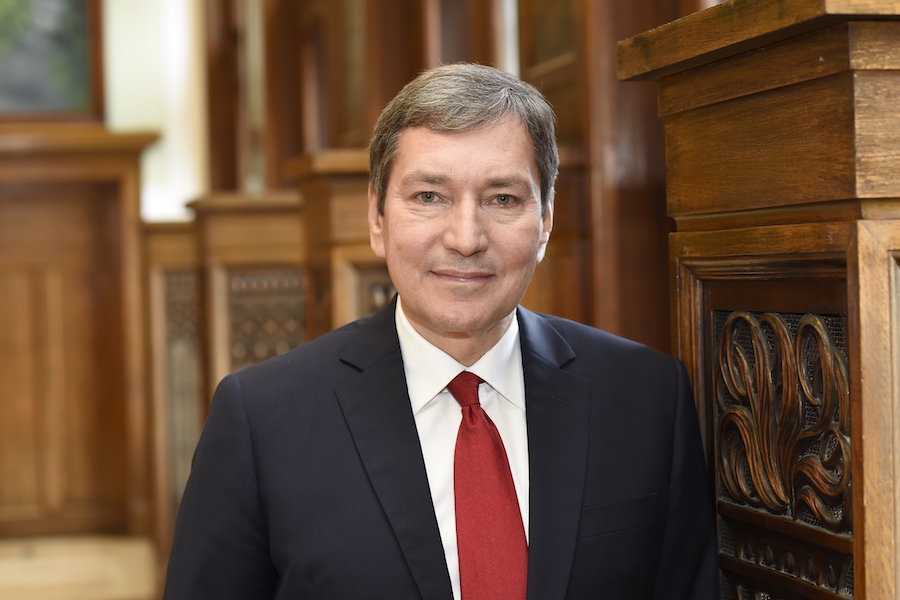
Tomáš Hüner, Minister of Industry and Trade
Tomáš Hüner has held the role of Minister of Industry and Trade since December 2017. It is said that his agenda makes him one of the busiest ministers. We are pleased he was able to find the time for an interview for Czech and Slovak Leaders readers. He has spent most of his career in the energy sector. He has worked both for the government (he was Deputy Minister of Industry and Trade between 2006 and 2011) and in the private sector (for ČEZ and Siemens).
You have recently returned to the debate on the need to complete new nuclear units, whether in Dukovany or Temelín nuclear power plants. The SingularityU Conference took place in Prague at the start of March where there was discussion of disruptive trends in the energy sector amongst other topics. Should the Czech Republic not choose a different way of thinking about energy production, particularly with regard to the falling price of electricity?
You always have to take account of the natural potential in a particular country. In the Czech Republic, wind and solar energy have limits; to put it simply, we don’t have as many sunny days and it is less windy than Germany, for example. And the potential energy from water is almost entirely used up here, in contrast to Austria for example where over 75 % of electricity for their own consumption is produced in this manner. We are also running out of fossil fuel reserves. So if we don’t want to import electricity, we’re going to have to construct additional nuclear units at Temelín and Dukovany. Nuclear energy is stable in the long term, safe and emission-free, both for electricity and partially for heat too.
The Czech economy is very open and so dependent on exports. Are you worried about a potential new trade war between the USA, Europe and China?
Any kind of trade war is dangerous for the local economy, for which export is fundamental. Although in terms of direct trade, our most important partners are our geographical neighbours and the other European Union member states, everything is interdependent in the globalised world. We export parts for industrial machinery, cars and electronics, for example, which after being fitted to the final products may end up outside the European market. And many of our other exports are not designed for immediate consumption or use, and it is a fact that markets have to move for the economy to work. The only solution to overcapacity of the currently often mentioned steel, but also other materials and also intellectual property rights protection, is clearly co-operation. Any unilateral measures are unfortunate and will not bring anybody any benefits in the long term.
There are many parties challenging the Czech Republic’s membership of the EU. Are you planning any “public awareness campaign” explaining the benefits of membership?
We deal with specific areas of the EU at the Ministry of Industry and Trade every day. We do so in co-operation with businesses, trades unions and associations. The results, European projects, whether they are services, events or buildings, can be seen and these are undoubtedly the best campaign on the benefits of membership of the European Union. Of the events, I could mention, for example, the conference “Internal Services Market: Yesterday, Today and Tomorrow”, which we are planning for 8 June this year for the occasion of the 25th anniversary of the EU’s internal market. This conference will evaluate the provision of services before joining the European Union and demonstrate the advantages of the internal market. Elżbieta Bieńkowska, the Commissioner for the Internal Market, Industry, Entrepreneurship and SMEs, will be coming to the event. Furthermore, there is a single contact point where you can get information on doing business in services in the European Union free of charge. Europeans can also take advantage of SOLVIT, which gives free-of-charge help to citizens and entrepreneurs in dealing with disputes with authorities in a different European Union member state if there has been an erroneous application of European law. There is also the ProCoP service, whom you can contact with questions on marketing products. We are also preparing to launch the Single Digital Gateway. The MIT is one of the instigators of this service which will provide all information and assistance services to EU citizens at one electronic address, thus contributing to facilitating movement in the European internal market.
Labour shortage is an acute problem of the Czech economy. What solution are you offering, and to what timescale?
Amongst other measures, the Ministry of Industry and Trade is behind the economic migration projects entitled “Specialist Treatment Regime for Qualified Workers” and “Special Procedures for Highly Qualified Employees from Ukraine”. These aim to allow the entry of qualified workers from abroad. The most well-known and also the most exploited are the measures focused on workers from Ukraine. This project aims to fill job vacancies with people from abroad if they cannot be filled within the Czech labour market. This January, the government decided that it would increase the annual quota for Ukraine by 10 000. In practice, this means that 19 600 workers from Ukraine will be able to apply for an employment card each year, a doubling of the current status, and almost twenty times higher compared to 2015. The Other States Regime, designed for employers, also applies to citizens of Mongolia and the Philippines. In this case, it applies to 1000 people a year from each country. The MIT will be making decisions on the applications from May on the basis of recommendations from Czech Business Representation and the CzechInvest Investment and Business Development Agency.
This year we’re celebrating the 100th anniversary of Czechoslovakia. How can we return Czech industry and trade to the fore? What is your vision?
The Czech Republic is one of the most industrial countries. Industry comprises about 32 % of our GDP, the highest of any country in the European Union. Roughly a third of revenues are generated by motor vehicle production, while the production of computers, electronic and optical devices, the production of machinery and electrical equipment and chemical industry production including pharmaceutical products also play an important role. As such, we don’t need to return Czech industry to the fore. What we do need to do is respond to the fourth industrial revolution, which is going to transform the world. That’s why I have set up the Industry 4.0 department at the MIT. With the effective use of modern technologies in production, our local economy – if we play our part in the principal changes – has a great opportunity to step beyond the role of subcontractor. Businesses must seize innovations early, invest in modernising production and all processes so they can exploit digitalisation and artificial intelligence as much and as effectively as possible. At the MIT, we are looking at three principal objectives: the ability of Czech companies to take part in the supply chain process, higher production efficiency – so production is faster, cheaper and saves resources, and the export of our own innovative solutions. We have so many clever people here, and in collaboration with universities, the Czech Academy of Science and other research facilities, we are able to come up with solutions such that we can sell not just patents and know-how, but also software and production lines. We also have to look at new business models, and also prepare for the impacts of digitalisation on the labour market and education. The state plays the largest role here. Digital transformation will change the nature of work tasks entirely. There will be more creativity, and less routine activities, which will be automated. The intensity of robot use in relation to the added value created in industry has increased sixfold in the Czech Republic, Slovenia, Slovakia and Hungary between 2005 and 2015. And this speed continues to accelerate. We need to go at the right speed and on the right wave. But we should bear in mind that it is not machines, but people, who write computer programmes.
You are one of the busiest ministers. What is your recipe for work-life balance?
With permission, I would refer you here to my wonderful wife. She would undoubtedly tell you in her curt Ostrava dialect that since I have become minister my life is far from in balance – in terms of those imaginary scales of work, family and hobbies. But I’m trying. Besides my family, my friends and even work colleagues also remind me of the need to live a life outside of work. I thank them all for their advice, and apologise that I don’t have the time right now. That’s what happens when you want to fully focus on work which is meaningful.
By Linda Štucbartová
The 5th annual QuBit Conference took place in the International Hotel Prague on 17 – 19 of April.
Annually attended by top security professionals from the CEE region, the fifth year welcomed more than 225 speakers and delegates from countries as Czech Republic, Slovakia or United States, who discussed the latest cybersecurity trends and ideas.
The 5th anniversary of the event was also marked by introducing a new format of delegates engagement – the Solution Center, which provided a unique approach to cybersecurity market. Partners of the Solution Center presented practical demonstrations of their original know-how on daily cybersecurity challenges where the delegates could see the solution at work.
The fifth anniversary also witnessed the announcement of QuBit’s cooperation with EC Council in brining the prestigious C|CISO (Certified Chief Information Security Officer) training and certification to the region. The first C|CISO training shall take place in Prague on 18 – 21 of September.
QuBit Cybersecurity Conferences strive to bring closer the latest information to the cyber community of Central Europe from the western world and to help spread the word that security matters as Internet and IT tools are now accessible to more than 2 billion people worldwide. They provide a unique way to meet the best and the brightest minds in the information security fields across multiple industries, and all carrier levels.
However, the Central Europe is not the sole focus of QuBit. In November 2018 it will host its second annual conference in Belgrade, Serbia (30 November) and a new event in Sofia, Bulgaria (16 November).
For more information about upcoming events and trainings please visit www.qubitconference.com or send your inquiries to info@qubitconference.com.
On the occasion of the jubilee 25th year of the prestigious Manager of the Year contest, announced and organised by the Czech Management Association (Česká manažerská asociace – ČMA), the ČMA National Commission has selected ten Managers of the Quarter-Century. Over the 24 previous years of the contest, 1 487 finalists have made it to the finish line, with 59 Managers of the Year being announced. ČMA selected the ten best from amongst their midst on the basis of a vote.
The Managers of the Quarter-Century received their awards from the ČMA on 19 April in Prague Castle’s Spanish Hall. Present at the ceremony were figures from management – Manager of the Year winners and finalists, government members headed by Prime Minister Andrej Babiš and a number of guests. President of CEC European Managers, Ludger Ramme was an international guest.
“Our contest has consistently sought out the best examples of management practice within business and outside business for 25 years. It has contributed to motivating managers’ successors and has helped to transfer the knowledge and experience of the best of them,” says ČMA President Pavel Kafka of the Management of the Quarter-Century contest and award.
On 19 April in Prague Castle, the Czech Management Association (Česká manažerská asociace – ČMA) awarded the following figures with the title Manager of the Quarter-Century for their consistent management performance: BENEŠ Daniel; CIENCALA Jiří; FEIX Vladimír; FROLÍK Zbyněk; KAČENA Bořivoj; PELC Zdeněk; POPOVIČ Štěpán; RÝDL Jan; STOKLÁSEK Lubomír; VALOVÁ Jaroslava
PragArtworks joined this year’s edition of the renowned international contemporary art fair Art Prague that was opened festively on April 9 and subsequently took place until April 15 at the Clam Gallas Palace in Prague. The PragArtworks booth showcased representative pieces by such artists as Pavel Roučka, Jakub Flejšar, Matěj Lipavský, Igor Korpaczewski, Natálie Roučková and David Strauzz, as well as a digital presentation of the whole PragArtworks artists’ portfolio. The event was a huge success with the visitors, and PragArtworks was delighted to receive so many outstanding visits in the course of the fair.
PragueArtworks is an international art project created by a passionate art lover and collector of high expertise Louise Beer in 2017 in order to promote a number of artists whose works stand out in the realm of contemporary art and have a strong potential to reach to a wider
audience. PragArtworks features artists from a large range of genres such as glass, sculpture, photography, collage and mixed media, no matter if figurative or abstract, and represents artists from various countries, mostly from or connected to the Central European region and the Czech Republic. While many people are interested in acquiring art, they are often not sure where to look. PragArtworks’ central mission therefore is to help anyone interested in buying first-rate quality contemporary art navigate the present-day art scene.
For more details about the project, please visit www.pragartworks.com or follow the project’s Instagram or Facebook. If you like any presented piece in particular and would love to get to know more about the author behind the piece, PragArtworks will be delighted to introduce you to any of the artists they represent.

Minister of Foreign Affairs and International Cooperation Nasser Bourita announced, Sunday, that the 29th Arab Summit, held in the Saudi city of Dhahran, Unanimously affirmed its support for Morocco’s bid to host the 2026 FIFA World Cup.
Bourita told the press after the Summit that the latter “Unanimously affirmed its support for Morocco’s bid to host the 2016 FIFA World Cup and called on all States to provide full and unwavering support to this bid.”
The 29th Arab summit was held Sunday with the participation of HRH Prince Moulay Rachid, who represented HM King Mohammed VI. This major event brought together several kings, princes, head of States and governments as well as representatives of Arab States, in addition to numerous officials of various international and regional organizations.
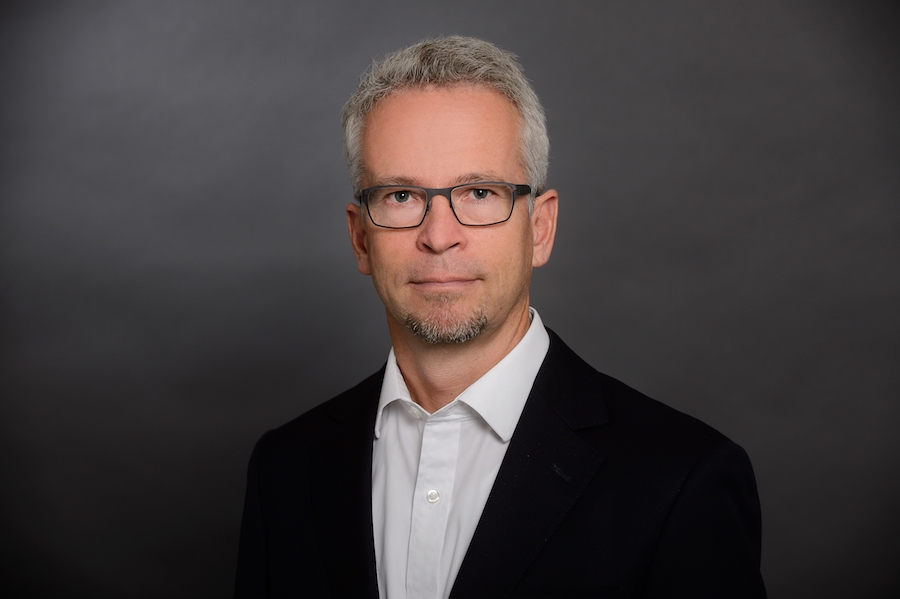
Ludger Ramme, President of CEC European Managers
The European Union is currently experiencing a critical phase, marked by new populism and growing divergences between Member States. The geopolitical situation, a slow economic recovery in some parts of Europe and a stalled process of converging social standards and salaries call for decisive actions by policy makers, managers and other stakeholders alike.
In this context, CEC European Managers is determined to pursue its function as a bridge builder between employers and employees and as a voice in the European Social Dialogue representing around one million professionals, managers and executives in Europe. The triannual CEC Congress on 24 and 25 of May in Mainz, where the Czech Management Association is to be accepted as a new member, will therefore run under the slogan “better together.” Only by understanding Europe as a political and economic unit can we as managers work towards a more sustainable and inclusive future with sustained growth. Isolation will bring political turmoil, economic stagnation and social conflicts.
The success of the European social market economy, as highlighted in CEC’s foundational document “Managers in Europe: vision, roles & values”, consists in bringing economic and social considerations together: only with both can political stability, growth and cohesion be assured. However, we need to invest and take the right decisions to make the model fit for future challenges. Besides lifelong learning, easier labour mobility in Europe and a better work-life balance, CEC is particularly involved in the topic of digitalisation, the subject of its seminar during the Congress on 25 May in Mainz.
CEC currently participates in two European projects on the digital economy: one on the role of European Works Councils in accompanying the digital transformation and one on how industrial relations evolve in the age of the collaborative economy, together with the think tank CEPS. Managers will shape the way digital technologies are conceptualised and put in practice. It is therefore of paramount importance to equip them with the necessary skills to use the technologies for the benefit of our economy, society and environment. Our upcoming survey on “Management in the Age of Artificial Intelligence”, in the framework of our European Managers Panel, will investigate the key challenges for managers in that regard.
Leadership today is undergoing major changes and needs to account to a growing number of issues, both in the companies managers work for and society at large. The particular profile of CEC as a Social Partner and as a provider of expertise in leadership and management is therefore particularly fit for purpose. We bring company-level considerations together with European policy-making, directly impacting the working life of the people we represent.
In an effort to update the definition of what a manager is and to raise awareness on what constitutes European management and leadership, CEC is in talks with MEPs to bring forward a European Parliament resolution replacing the outdated Gil Robles resolution of 1993. A European management culture exists and is more than the lowest denominator of national definitions. We are convinced that overcoming divides, taking a stakeholder approach and using evidence-based practices are part of this culture. It is our common duty to strengthen this culture and look beyond what separates us. More than ever before.
In this spirit, we are more than glad to welcome the Czech Management Association among our ranks. Their membership will help to strengthen the voices of Eastern European managers and bring to attention the particular needs of their economies. With united forces across the continent will managers be increasingly heard at European level.
Ludger Ramme
President of CEC European Managers
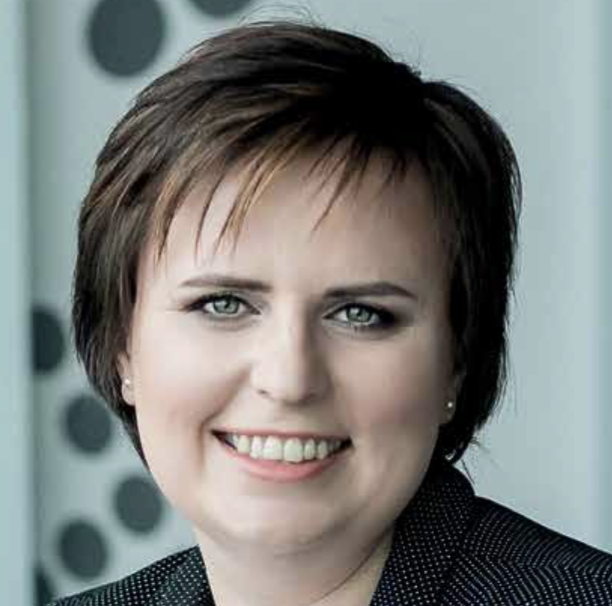
Dr. Eva Gáboríková, M.A., PhD., CEO & Founder
Flexi learn, s.r.o.
In many cultures “small talk” is perceived as the first step to establish a successful and long-lasting cooperation. “small talk”, “lo small talk”, “le small talk” or “светская беседа” creates space for breaking ice and building an initial relationship.
In some cultures “small talk” skills belong to a basic equipment of a manager. However, there are also cultures which view “small talk” as a waste of time. In their understanding a brief question “How are you?” is enough.
As an intercultural consultant I meet experts who are well-known in the whole world. They have no difficulties to deliver presentations at international conferences, face challenges of crucial IT or economic projects in several countries. However, when they are invited for a business lunch or a coffee to have “small talk” with their business partners or colleagues they are afraid to participate.
What is the purpose of “small talk”?
The main purpose is to establish a pleasant working atmosphere and initiate a fruitful communication between communication partners. “Small talk” should remove barriers resulting from different understanding of some situations while waiting or setting a schedule. “Small talk” provides an occasion to clarify different intentions resulting from cultural differences.
The purpose of “small talk” is also to move closer to a communication partner. In other words to respect and deal with topics which are for their culture and life important. While in some cultures (e.g. British) family is a closed topic, in other cultures (e.g. Italian) it is a recommended area to show a genuine interest in your business partner. The right choice of a topic contributes to a mutual understanding and building trust necessary for business negotiations. To know and respect cultural values of a business partner provides advantage to build “a positive image” which will be always appreciated and remembered, even after many years. It makes you different from all other business partners who are not aware how cultural values are strong.
To know how much “small talk” is expected from you depends on culture your business partner comes from. “Coconut Cultures” prefer short small talk. It means they expect to exchange a few polite phrases and go down to business. Only after several meetings, you can come with more personalized topics to strengthen your relationships.
“Peach Cultures” expect you to devote more time to small talk and include more private topics such as family, kids, free time activities from the very beginning. Business comes only after establishing trust and knowing you as a person. If you miss the invitation to build a closer relationship with your business partner, there is hardly a second chance.
How to prepare for “small talk”?
To be good at “small talk” requires doing regular exercises. Especially for those cultures which have a direct communication style and usually go directly to business matters. You can start having a stop at a coffee machine or initiating communication with conference participants. However, one of the key ideas is to learn at least basic information about cultural values and recommended topics in the culture your colleagues and business partners come from.
What are recommended topics for small talk?
There is no universal topic which you can use in all cultures. In fact “small talk” topics depend on values and behaviors of particular cultures. However, the most favorite topics are history, sightseeing, sport, music, traditions and family. In general, people are usually proud of their country, history and natural beauties. Therefore, “small talk” could be open with the questions focused on geography and environmental surroundings. Weather, as a recommended topic, does not always work. There are cultures which hate questions and discussion on raining or sunshine.
“Little things” can make a big result. And it is also the case of “small talk”. To have a pleasant small talk with your business partner can help you to overcome barriers
By Dr. Eva Gáboríková, M.A., PhD.
Intercultural Coach and Consultant
www.evagaborikova.eu
Based on cultural values, cultures have the topics and questions which are recommended to include into small talk. Let’s mention some examples:
The proposed topics and questions for small talk with Americans:
- What do you do?
- What is your job?
- Where do you come from?
Americans enjoy the questions which give them the answers to know professional background of people they are in touch with. To learn something about their job and origin is acceptable for a small talk. However, cultures which take care of their privacy, would not be pleased to be asked such questions just meeting somebody for the first time.
The proposed topics and questions for small talk with British:
- How do you like the Czech Republic?
- What about your flight?
- Weather
- Sport
British belong among cultures discussing more general things. They are well known for their comments on weather. Working with cultures from Central Europe, I often hear that managers are lost when their British colleagues analyze how it is raining. As they say: “It is raining. And what more?”
The proposed topics and questions for small talk with Italians:
What about your family?
How are you kids doing?
On the contrary to cultures keeping door closed to their private life, there are cultures which enjoy talking about their family and kids. They usually devote a lot of attention to building relationships and have “family” as one of their key values.
We could make the whole list of recommended and not recommended topics for small talk in different cultures. However, one of the recommendations, which would probably work in many cases, is to listen to your business partner or colleague. Meeting new people for the first time, everybody tries to come with topics which usually work for him in his home culture.
April 11th, 2018, CIIRT CTU conference hall
CIRC CTU, CACIO with the help of CFO Club prepared a great conference ECONOMY and TECHNOLOGY 4.0. This conference was held under the auspices of Mr. Tomáš Hüner, Minister of Trade and Industry of the Czech Republic. William Ribaudo and Seema Bajaj, keynote speakers, introduced the results of their research which showed how “networked” based business models can be worth multiples of traditional physical based (ie manufacturing) business models.
Among the speakers were Dean Brabec (ADL), prof. Vladimír Mařík (CIIRC CTU), Peter Chrenko (PwC) and Dr. Ivan Slimák from ŠKODA AUTO. The discussion covered many aspects of Technology 4.0 such as research, use of robots, society 4.0, and energy 4.0.
Discussion with Ms. Adriana Krnáčová, Mayor of Prague
April 11th 2018, Congress Centre Prague
On Wednesday April 11th, yet another traditional Round Table of Comenius discussion took place in the Prague Congress Centre. This time with the mayor of Prague as the main guest speaker. Ms. Krnáčová is historically the first woman who has obtained this significant position. She started the discussion by recapitulating some of the successes Prague has enjoyed since her election. She then continued by listing several reasons due to which she won’t be running again for this position in the upcoming October elections.
The fact that the mayor won’t be defending her position lead to a passionate open discussion. Towards the end Adriana Krnáčová expressed her gratitude to fellow colleagues who have supported her throughout her term. She then concluded by reassuring the audience that she won’t become idle for the last six months of her term, in fact she will do her best to achieve the very opposite.
This discussion event was unique due to its audience. There were 65 VIP guests attending in total, as well as several business leaders of the general public.
Photocoverage of event organised by the Greek Embassy in Prague.
Catering was provided by OPUS Mediterranean Fusion Restaurant.
“The Czech countryside has charmed me”
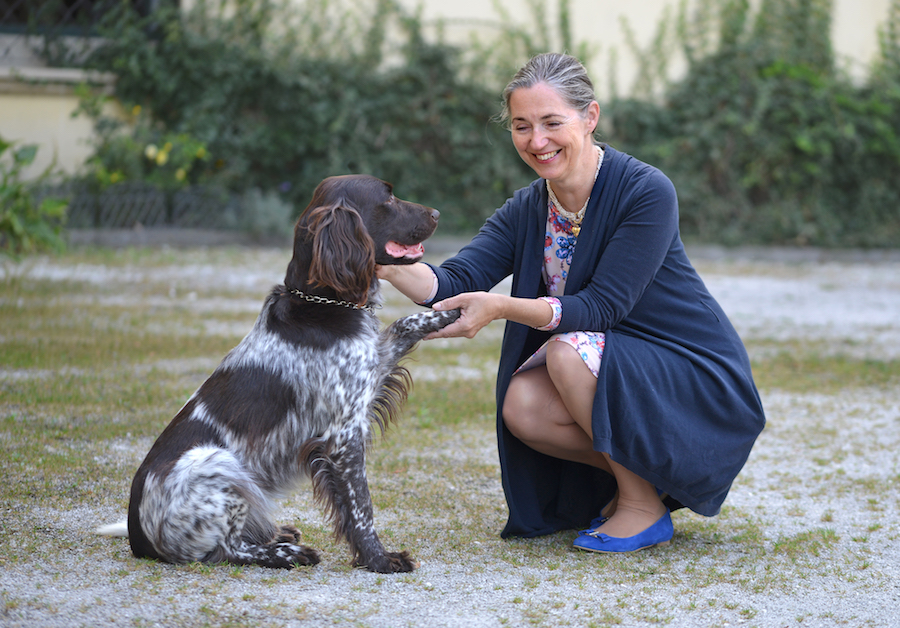
Mrs. Ursula Czernin, photo by Vladimír Kviz
Imagine you receive a call from an unknown number and you hear: “Hello, Czerninová speaking. Aunt Lobkowicz told me you’d like to do an interview with me. When would suit you?”
Our series on noble families has rightly aroused a great response from readers. However, it isn’t always easy to make contact with protagonists. As such, after my interview with Elisabeth Lobkowicz I asked her for help in making contact with other suitable candidates. I was surprised how quickly specific acts followed on from words. Although the story of her husband Tomáš Czernin, forester, farmer, owner of the Dymokury Castle and last but not least politician is a well-known one in the media, I am much more interested in Mrs Czerninová’s story, a woman who came from Vienna not to Prague, but to Dymokury. Mrs Czerninová gave me the option of meeting either in Dymokury where she lives, or in Prague where she travels to work as Hospitaller for the Order of Malta’s Grand Priory of Bohemia. Ursula Czerninová, born Piringer, was born in Vienna and her studies included a time in Rome learning History with a focus on Early Modern History. Instead of researching ancient history in archives, however, fate led her to meet Tomáš Czernin shortly before the Velvet Revolution in 1989, and she had the opportunity to experience the real history of the end of the 20th century, and regime change in one of the countries of the former Eastern Bloc. She visited Czechoslovakia during the November events, and today she looks back nostalgically at her participation in the demonstrations, at the revolutionary spirit of the period and the wonderful feeling of hope and anticipated change at that time. As a practising Catholic, she has been involved in charity since her youth.
When we looked back at the events of autumn 1989, we both noted our disappointment at the results of the parliamentary elections last October, and the subsequent presidential elections in January.
The Czernins lived in Vienna for almost two years following their wedding, but in 1992 they returned to the Czech Republic and began looking after Dymokury Castle. I held the interview with Mrs Czerninová in Czech, as she has been living in this village in the Czech Republic for twenty-six years. The couple have four children, all of whom grew up in the Czech Republic, and their youngest son was born here. I spoke with Ursula Czerninová about life in the village, bringing up children and her charity activities within the Sovereign Military Order of Malta’s Grand Priory of Bohemia, where she holds the position of Hospitaller.
In 1992 you moved to Czechoslovakia. You didn’t swap Vienna for Prague, but for the Czech countryside, where the 1990s was not an easy time. Furthermore, the Austrian countryside is often held up as a model for the Czech countryside to follow.
It depends on your perspective; for me the Austrian countryside is sometimes too sterile. The Czech countryside is more authentic. Life in the countryside is wonderful. I’m glad to have nature and peace and quiet around us. Thanks to their childhood in Dymokury, my children were also able to experience the freedom, perceive the changing seasons, and be in contact with animals.
When you came to the Czech Republic you didn’t speak Czech, yet you managed to set up a Ladies Club in Dymokury.
We called it the Ladies Club in jest. It started when two neighbours wanted to practise their German with me, and in exchange taught me Czech. We soon became friends.Books were a problem. At the time we only had the “socialist” language textbooks of the time available to us, in which the texts were full of expressions such as “comrade”, “tractor”, “farming co-operative” and so on.
You hold the position of Hospitaller in the Sovereign Military Order of Malta’s Grand Priory of Bohemia. What does this position actually involve?
I’m in charge of charity and social projects. Within the Order of Malta, the Minister of Social Affairs and Health form one whole. Maltézská pomoc, o.p.s. (Maltese Aid) looks after senior citizens, the disabled, children from disadvantaged families and the homeless. The Order runs three schools (the Higher Nursing School on Ječná street, Prague, a nine-year elementary school in Kladno, and an eight-year gymnasium (grammar) and vocational school in Skuteč). We also organise an annual pilgrimage to Lourdes, involving one plane with a total capacity of 189 full of the sick, pilgrims and those accompanying them. The Czech Maltese Youth club organises a summer camp every year for disabled young people, as well as trips and friendly get-togethers during the year. Before Christmas the now renowned advent punch sale is organised.
As Hospitaller, you’re in charge of aid for countries in Eastern Europe, so you’ve got a wider perspective. We’ve already spoken about our disappointment in politics in Czech society. What do you think Czechs are lacking?
I think we’re doing better than ever before from a material perspective. But I think people are often missing what’s important: good relations within the family, a healthy relationship to work, social sensitivity. We’ve sacrificed this to economic success. The fact that we often lack fulfilment in these basic matters leads to dissatisfaction, and Czechs moan about everyone and everything. But we’re doing well, we’re not missing anything. In the war-ravaged regions of Ukraine, for example, people really are doing badly there; there’s real misery there. Perhaps, however, in desperate need they can see more clearly what is important in life.
You’ve brought up four children in the Czech Republic. They used to say of children in the aristocracy that they were born with a silver spoon in their mouths. You have taught your children independence and that everything has a price.
We used to get up at five in the morning; the kids’ train left at six. The kids went to Hradec Králové and there was no direct connection from Dymokury in the morning. The journey back was quicker. The kids went to elementary school in Dymokury, then the church school and gymnasium in Hradec Králové. Both our sons study forestry management, and according to the established tradition of noble families, we expect our oldest son to take on the land. Our eldest daughter is already married; she studied Law and works at the Ministry of Foreign Affairs. Our other daughter studies Music Science and Singing in Vienna. In terms of our property, we have endeavoured to instil in our kids that we are only the trustees of our property for the generations to come.
Many Czechs love Vienna. I myself remember my first visit behind the Iron Curtain, which was to Vienna. I still enjoy going to Vienna with my kids, to exhibitions, to the Opera and its famed balls. When you look back on the quarter century you’ve spent in the Czech Republic, have you missed life in Vienna?
I don’t miss Vienna; I can go there any time I like. There aren’t any borders any more.
I hope Mrs Czerninová is proven right and we remain borderless for a long time to come. On my last visit to Austria, we did encounter border control, if only briefly.
If you’re interested in finding out more about the Sovereign Order of Malta, you can find an interview with its former ambassador, H.E. Mario Quagliotti in our archives.
By Linda Štucbartová
“We seek truthful information”

Filip Horký, Journalist, Seznam Zprávy, Twitter Influencer
He’s young, charming and gallant. You can feel his energy and enthusiasm. He won the Novinářská křepelka (Journalist Quail) award in 2016, and a Forbes Magazine’s “30 Under 30” award in 2017. Over 75 000 people follow him on Twitter. Despite this, or perhaps rather because of this, he remains very modest, humble and down-to-earth. At the age of 26, he has almost 10 years of working in journalism behind him. He began as a sports editor, then he moved to Czech Television, subsequently working for DVTV for two years and he has worked for over a year for the Seznam Zprávy news website where he focuses on complex topics such as bankruptcy seizures, homelessness, poverty and President Zeman’s election and trips. He has made fascinating and innovative reports from Ukraine, Russia, Jordan and neighbouring Hungary.
I personally know Filip from his time at DVTV. At that time, I gave him our magazine on the street and we considered possible co-operation in regards to interviews with interesting figures. Two years later, he has become a figure suitable for inclusion in Czech and Slovak Leaders himself. He agreed to the interview, but it wasn’t easy to find the time. Due to another in a series of planned demonstrations against Andrej Babiš’s government, which was held in over 20 Czech towns and cities on the second Monday of April, we met on Sunday afternoon. Filip first gallantly took care of my coat, and then from personal experience he took the Dictaphone into his own hands and spoke into it, due to the noisy location. And so followed a pleasant and relaxed interview with a fellow journalist.
Filip; what with recent events, both the murder of Slovak journalist Ján Kuciak and demonstrations supporting the independence of media and Czech Television, what’s it like being a journalist today?
My feelings and relations to the profession are changing a lot in regard to current events. I don’t allow myself to feel threatened or afraid. But on the other hand I am feeling ever more frustrated. This doesn’t arise, however, because I want to interpret the truth, although I think a certain group of journalists have long made this mistake. I have always tried to show reality from various perspectives, not presenting the one correct opinion. I film a report, and I invite people to watch it and form their own opinions. Nevertheless, I feel that society is currently so divided that two people with different opinions are now unable to sit down at one table over a beer and discuss their different ideas without having a major argument about it.
Is this related to the fact that according to the latest research fake reports spread six times faster than true ones?
That figure doesn’t surprise me. I’m slowly starting to doubt whether black is black even when I have a chemical analysis available to me confirming the case. I was shocked when one public media corporation held a discussion over whether the earth is round or flat. There are facts, evidence and matters which are given. I don’t mean we shouldn’t talk to people who believe in a “flat earth”, or even scoff at them, but on the other hand the current fashion of questioning everything means that we are ignoring facts, data and evidence which simply reflect reality.
This is your tenth year in journalism. You’ve defined your mission as follows: do the best journalism. Since moving to Seznam.cz have you moved on to so-called agenda-setting, and topics which would otherwise have been ignored?
I’m humble enough to remind myself that I’m really not here to tell people what they’re supposed to think, or to teach them. I haven’t got all the answers. I choose important topics from my perspective. I have realised that for myself and my generation, some things are taken for granted, like getting news from different sources independently of whether they’re in Czech or English. There are, however, loads of people here who don’t do this. At Seznam Zprávy, my objective is to produce standard foreign reports from various perspectives: such as working with video, editing, emotions, issues, and convey these foreign issues to people in a manner which they are going to enjoy and want to follow. In the Czech context, journalism is divided into two fields: either a boring presenter with a detailed specialist table of data, or instead an overly simplified rendition of generally well-known topics. Nothing in the middle. Abroad, in contrast, they know how to convey even complex topics in an understandable and enjoyable way. That’s what my job’s about, and I appreciate the freedom that Seznam Zprávy has given us. So it depends on the whole Obzor team whether we can convey the topic in a convincing way such that people watch the topic and then share it with as many people as possible.
You’ve said that your report on poverty was the most watched report, even in terms of numbers of responses. This included dozens of people offering specific help.
I‘m delighted about it, but at the same time we have to deal with the response. We don’t want to offend anyone; we endeavour to steer responses somehow. If 40 people offer clothing for a child, well a specific person won’t need that much clothes. So the next episode won’t be so much about ad hoc help, but the need to change the system; or systematic help. But I don’t feel that I’m important or that I want to set up discussion on the welfare system itself. I don’t know how to set up the welfare system so that a million people aren’t in poverty. That’s not my ambition; I just want to make the best possible programme. A feeling of self-importance can be very dangerous.
I can see your ability to stay grounded, despite your audience and the awards you have won. Humility is usually an attribute which your peers do not have from the perspective of older generations.
How many people read Forbes? How many people know what the Journalist Quail is? It’s just a bubble; maybe it’s expanding, but it’s still a bubble. Paradoxically, I can say that I’m doing as high quality work as possible ever more for myself mainly. I want to draw attention to certain topics, and it’d be great if a debate was triggered about them.
Besides journalism, you’ve begun doing some teaching too. You give talks to young people, you look at the topic of media literacy, you encourage people to check information.
I feel great responsibility. Despite my youth, I’ve had loads of opportunities, many people have helped me and so I need to at least give this back to society somehow. That’s why I go to discussions with primary and secondary school pupils and students, to whom I am naturally close. When I hold discussions with them, again I don’t give them the one truth, but I tell them to look at how emotions are utilised, the choice
of words used, how the overall editing of a report influences its overall impression. I leave them to work out their final opinion. I see some hope for the future here. If the young learn this way of evaluating information, then they’ll keep that skill. It’s easier than convincing the older generation to change.
In 2016, you reported on the Presidential Election directly from the USA. How do you compare media literacy in the Czech Republic to the rest of the world? And how do you perceive the current demonstrations supporting the press, or against the government?
I don’t think media literacy is much different here compared to Western countries. After the elections in the USA, a lot of people were surprised by Donald Trump’s victory. Trump travelled around small towns and spoke to people. Local problems and fear of the future naturally proved to be more important than global events. I see a great parallel here with Miloš Zeman’s re-election, someone who also travelled around towns and villages for many years speaking to people. I met one person who has voted for Zeman for 20 years because 20 years ago he shook his hand. Although just a few hundred people attended his meetings, over twenty years this easily creates a mass of votes. Take the current demonstrations as an example. 10 to 15 thousand people meeting up once or twice a year; this is the same as the number of people the President meets every year. If our current political representation is as it is now, there are considerations being made of governing with the communists and extremists, and in response just the odd demonstration takes place, then we must still be doing alright. On the other hand, I don’t underestimate the Czechs’ ability to defend their opinions; I’m just putting the figures into a certain perspective so we don’t succumb to the opinion of any particular bubble. And I’d also point out that the ability to defend your opinion on the streets can be double-edged. In 2015, for example, Czechs didn’t join in the mass demonstrations and violent protests against immigration, and luckily it was also thanks to that Czech laziness that the episode passed without mass violence.
What question do you most commonly ask?
I’m ever more frequently posing the question: “Then describe it to me”. I call on others first to share and I then work from that. I’ve noticed how my questions change with the formats of my work. At DVTV, I used the format of critical interviews where I instead encouraged argument.
And what question would you ask yourself?
That’s hard. If I could ask myself a question which I would answer in 10 to 15 years, then it would go: “What more could you have done, but didn’t do?” I hope I get some feedback.
By Linda Štucbartová
Numerous companies created around January 1993, when the Czech Republic became an independent state, celebrated 25 years of existence in 2017 or will celebrate it this year. Many such companies were founded by – then – young and enthusiastic entrepreneurs who wanted to take full advantage of democracy, freedom and the seemingly infinite rainbow of possibilities that a fledgling market economy was set to offer. A quarter of a century later, the same founders are now a blessing or a curse for their companies – depending on how emotionally mature they’ve become during the last 25 years.
Two stories, one common denominator
I was recently talking with one such founder. Let’s call him Roman. Tremendously smart, he launched his IT company immediately after the Velvet Revolution. Like any good, reliable entrepreneur who wants to guarantee to the world that he means what he says, he gave the company his name. The company grew; even during the economic crisis of 2009 – 2012 it fared so well that it gained a hunger to expand. Roman managed to attract a large investor; then he went shopping. From an initially small company, the business grew to become a collection of companies spread in five geographies. All these companies had also their founders and a wide variety of personalized names. This is when Roman hit a crossroad. He had to make a decision: should he insist on keeping the original name of the company he founded – his own name – and thus potentially hinder business growth? Or would he give up his name, make peace with the company destiny – including a new general branded name – and move on with a different mindset? He took the second road. Five years later, we were sitting at a table in a sunny Prague restaurant. “It was one of the toughest – and one of the best – decisions I’ve ever made. I sold myself in the good sense of the term. This made me humbler, more insightful, more reasonable. It was tough but, looking back, it was the right thing to do.”
The second story has a similar beginning. The founder, a people developer, came in touch with a unique system of personal development very early in the ’90s that he decided to promote in the Czech Republic. Even though the system was universal, the founder decided to name the company after himself. Business grew, particularly in the golden years of 2002-2008 when multinational corporations were placing massive amounts of money in people development. As time went by, the work became more repetitive and the founder got bored. His own life path seemed to have a different direction than business management. Over time the company wasn’t able to create a functioning team of trainers or a solid network of alumni. Frustrated by what might have been perceived as indecisiveness and a lack of perspective for their own growth, numerous trainers decided to leave the company. The alumni, future trainers themselves, initially looked up to the company. Soon however they would plunge into confusion and frustration themselves. It seemed as if everyone was looking up to the founder and expecting him to make a decision that would put the company out of its misery. None came. The founder decided to transfer the company internally within his family; at the same time the business would continue under his name. Most probably it will take the offspring years, if ever, to step out of the shadow of the founding father. At the same time. the army of trainers the company put on the market for 25 years, keep looking on in awe how a company training leadership cannot seem to handle its own journey – into the future or into dissolution.
“I am more than my Channel”
From a similar realm I was recently coaching a visual entrepreneur who was about to set up her YouTube channel and was concerned about the feedback she might receive. “I care about it so much. That’s why I’m afraid that I might take things a bit personally. I’m scared that the feedback will hurt me and I won’t have the strength to move beyond my feelings and actually integrate the good criticism the channel will receive,” she said. Now you must admit – working with a client with this level of emotional self-awareness is already pure delight. Moving through her inner landscape we reached a milestone when I suggested that she look at two objects that were totally overlapping: her YouTube Channel and her Life. As I slowly split the two objects, her eyes followed Life. The more I was separating the two, the more emotional she became about the deep connection she felt with Life. “I am more than my Channel,” she exclaimed. “If I keep remembering this, I will never take business personally!”
This is probably the best piece of advice I heard from an entrepreneur for himself in a long time. It is also most probably the realization that hit Roman, the hero of our first story, and what held him psychologically during the difficult transition from being the name carrier of a successful company to managing a generally branded business group. It is also a decision that lurks ahead on the journey of many a Czech entrepreneur. With more and more company founders hitting retirement age, a systemic perspective on how to run family businesses in order to leave behind a legacy to be proud of will be vital both for the companies and for their founders. Part of such a peaceful exit might be the change in the name of the company. When such a decision makes business sense, Reason must win over Ego. While companies always remain connected to their founders through the energy of the beginnings and the vision placed initially in the company, we all need to make peace with the fact that companies are living systems that should be entitled to leave the family nest and meet their destiny on the free market.
Making the right decision about the name of a company, particularly when it overlaps with the name of the founder, is tough. On the one hand, having a personal brand in the company name speaks of responsibility and tradition; it has been proven that such companies bring in more revenues and customer stability over time. On the other hand, sometimes a company needs a different path in order to make it into the future. What we need to remember is that a company is bigger than its founder; we might be those who brought the company to life, but if we want our “child” to outlive us we need to be able to make the right decisions at the right moment. For that all Ego must be put aside. In business and personal branding this is a precondition for leaving behind a sustainable legacy – and for enjoying a fulfilled retirement where we can look back with pride.
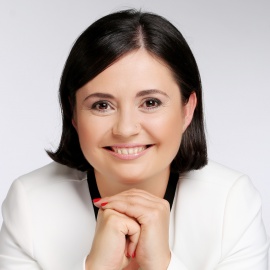 Cristina Muntean is a consultant, trainer, mentor and coach who specializes in personal branding, strategic communications and emotional intelligence for leadership. A former journalist with more than 12 years of experience in the Czech, Romanian and international media, she founded Media Education CEE, a PR advisory and training agency in Prague in May 2010. Her clients are executive level entrepreneurs and managers with Top100 companies in the Czech Republic and Central and Eastern Europe. Cristina is also an internationally certified trainer and coach with the Enneagram, a complex system of personal development, and a facilitator of systemic dynamics in business organizations. She provides her services in English, Czech, French and Romanian, her mother tongue. Cristina can be reached at +420 776 574 925 or at cm@cristinamuntean.com.
Cristina Muntean is a consultant, trainer, mentor and coach who specializes in personal branding, strategic communications and emotional intelligence for leadership. A former journalist with more than 12 years of experience in the Czech, Romanian and international media, she founded Media Education CEE, a PR advisory and training agency in Prague in May 2010. Her clients are executive level entrepreneurs and managers with Top100 companies in the Czech Republic and Central and Eastern Europe. Cristina is also an internationally certified trainer and coach with the Enneagram, a complex system of personal development, and a facilitator of systemic dynamics in business organizations. She provides her services in English, Czech, French and Romanian, her mother tongue. Cristina can be reached at +420 776 574 925 or at cm@cristinamuntean.com.
Remember the quote by Maya Angelou?
“I’ve learned that people will forget what you said, people will forget what you did, but people will never forget how you made them feel.”
So, what are you waiting for? Make your audience FEEL! Learn how to in my third and last video of this mini-video series on making your presentations more memorable
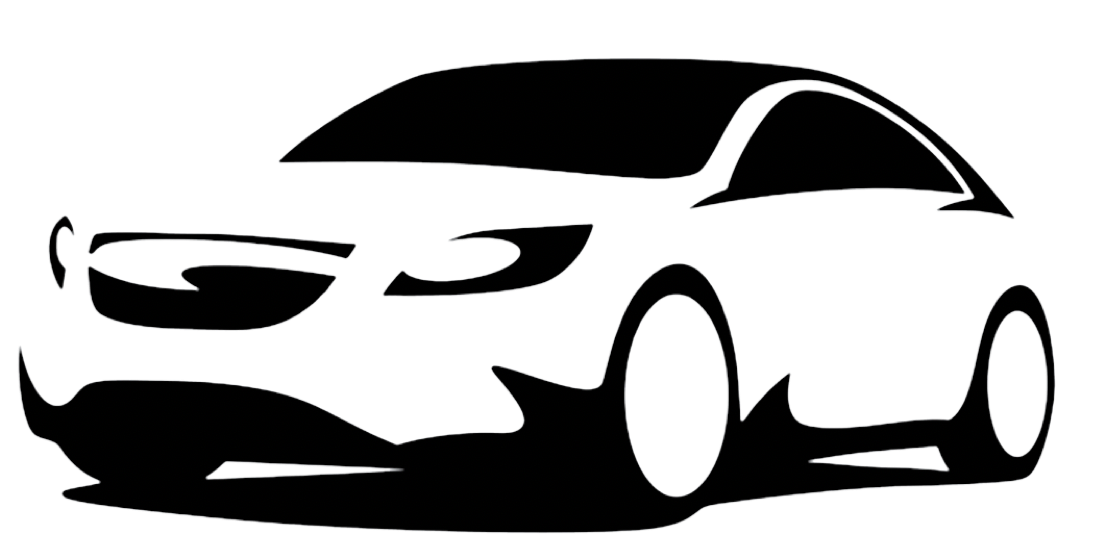
“The highly intriguing theory – supported by the extensive geological evidences including the bacteriological analysis of deep-laying hydrocarbons – about the abiotic nature of oil and its practically infinite recreation in the lower geological formations of earth was presented some 25 years ago. These findings were quickly dismissed, and the theory itself largely ignored and forgotten. The same happened with the highly elaborate plans of Nikola Tesla to exploit a natural geo-electrical phenomenon for the wireless transfers of high energy for free. Why? Infinity eliminates the premium of deeper psychologisation, as it does not necessitate any emotional attachment – something abundantly residing in nature cannot efficiently mobilize our present societies…”
Following the lines from the seminar work of prof. Anis H. Bajrektarevic on Energy, Technology and Geopolitics, let us present an interesting take on the E-cars, similar driverless technologies and its legal implications that will mark our near future.
Self-driving cars react in a split second: quicker than even the most attentive driver. Self-driving cars don’t get tired, they don’t lose concentration or become aggressive; they’re not bothered by everyday problems and thoughts; they don’t get hungry or develop headaches. Self-driving cars don’t drink alcohol or drive under the influence of drugs. In short, human error, the number one cause of road traffic accidents, could be made a thing of the past in one fell swoop if manual driving were to be banned immediately. Is that right? It would be, if there hadn’t recently been reports about two deaths, one during the test drive for a self-driving car (UBER) and one while a semi-autonomous vehicle was driving on a motorway and using its lane assist system (Tesla), both of which regrettably occurred in the USA in March 2018. In Tesla’s case it seems that the semi-autonomous driving assistant was switched off at the moment of the accident.
Around the globe, people die every day due to careless driving, with around 90% of all accidents caused by human error and just a small percentage due to a technical fault related to the vehicle. Despite human error, we have not banned driving on these grounds. Two accidents with fatal consequences involving autonomous vehicles being test-driven have attracted the full glare of the media spotlight, and call into question the technical development of a rapidly progressing industry. Are self-driving cars now just hype, or a trend that cannot be contained, despite every additional human life that is lost as a result of mistakes made by self-driving technology?
The legal side
For many, the thought that fully autonomous vehicles (a self-driving car without a driver) might exist in the future is rather unsettling. The two recent deaths in the USA resulting from (semi-) autonomous cars have, rather, may cause fear for others. From a legal perspective, it makes no difference whatsoever for the injured party whether the accident was caused by a careless human or technology that was functioning inadequately. The reason for the line drawn between the two, despite this fact, is probably that every human error represents a separate accident, whereas the failure or malfunction of technology cannot be seen as a one-off: rather, understandably and probably correctly, it is viewed as a system error or series error caused by a certain technology available at a particular point in time.
From a legal angle, a technical defect generally also represents a design defect that affects the entire run of a particular vehicle range. Deaths caused by software malfunctions cause people to quickly lose trust in other vehicles equipped with the same faulty software. Conversely, if a drunk driver injures or kills another road user, it is not assumed that the majority of other drivers (or all of them) could potentially cause accidents due to the influence of alcohol.
The desirability side
The fundamental question for all technological developments is this: do people want self-driving cars?
When we talk of self-driving (or autonomous) vehicles, we mean machines guided by computers. On-board computers are common practice in aviation, without the pilot him- or herself flying the plane – and from a statistical point of view, airplanes are the safest mode of transport. Couldn’t cars become just as safe? However, a comparison between planes and cars cannot be justified, due to the different user groups, the number of cars driven every day, and the constantly imminent risk of a collision with other road users, including pedestrians.
While driver assistance systems, such as lane assist, park assist or adaptive cruise control, can be found in many widespread models and are principally permitted and allowed in Europe, current legislation in Europe and also Austria only permits (semi-) autonomous vehicles to be used for test purposes. Additionally, in Austria these test drives can, inter alia, only take place on motorways or with minibuses in an urban environment following specially marked routes (cf. the test drives with minibuses in the towns of Salzburg and Velden). Test drives have been carried out on Austria’s roads in line with particular legal requirements for a little more than a year, and it has been necessary to have a person in the vehicle at all times. This person must be able to intervene immediately if an accident is on the horizon, to correct wrong steering by the computer or to get the vehicle back under (human) control.
Indeed, under the legislation in the US states that do permit test drives, people still (currently) need to be inside the car (even before the two accidents mentioned above, California had announced a law that would have made it no longer necessary to have a person in the vehicle). As a result, three questions arise regarding the UBER accident which occurred during a test drive in the US state of Arizona, resulting in a fatal collision with a cyclist:
- Could the person who was inside the vehicle to control it for safety reasons have activated the emergency brake and averted the collision with the cyclist who suddenly crossed the road?
- Why did the sensors built into the car not recognize the cyclist in time?
- Why did the vehicle not stick to the legal speed limit?
Currently, driving systems are being tested in Europe and the USA. In the USA, this can take place on national roads and, contrary to European legislation, also on urban streets. As long as we are still in the test phase we cannot talk of technically proven, let alone officially approved, driving systems. The technical development of self-driving cars, however, has already made it clear that legal responsibility is shifting away from the driver and towards vehicle manufacturers and software developers.
Our Prospects
Whether, and when, self-driving cars could become an everyday phenomenon is greatly dependent on certain (future) questions:
- Are we right to expect absolute safety from self-driving cars?
- What decisions should self-driving cars make in the event that one life can only be saved at the cost of another?
- How should this dilemma be resolved?
If artificial intelligence (AI) and self-learning systems could also be included within the technology for self-driving cars, vehicles of this type might possibly become one day “humanoid robots on four wheels”, but they could not be compared to a human being with particular notions of value and morality. If every individual personally bears responsibility for their intuitive behavior in a specific accident situation, the limits of our legal system are laid bare if algorithms using huge quantities of data make decisions in advance for a subsequent accident situation: these decisions can no longer be wholly ascribed to a particular person or software developer if a self-driving car is involved. It will be our task as lawyers to offer legal support to legislators as they attempt to meet these challenges.

Dr. Andreas Eustacchio LL.M. (London LSE),
the Vienna-based attorney-at-law; born in Zambia
Different standards in quality of products on the internal market got a new impetus in October 2017 by a statement delivered by Jean-Claude Juncker, the President of the European Commission. Juncker stated that different quality of two equally-looking products within the EU is unacceptable. The Commission subsequently issued guidelines for Member States to implement EU food legislation and started to develop a uniform methodology for testing composition. Dual quality of food in the EU single market was also discussed by the representatives of EU and Czech institutions, food producers and sellers and the general public on 8th December 2017 in the European House in Prague.
© CEBRE – Czech Business Representation to the EU
On the occasion of the 100th anniversary of the founding of the Czechoslovak Republic, the top representatives of the Senate met with the US Ambassador Stephen King and US Speaker Paul Ryan at Wallenstein Palace. What is more, the Senate held a conference on the role of the United States in today´s European security, that was attended by the third highest constitutional official of the United States, Paul Ryan, Speaker of the House of Representatives.
“How to Robot-Proof (Not Only Kids but also Ourselves)”

Dr. Vivienne Ming, theoretical neuroscientist, technologist and entrepreneur
Dr. Ming was named one of 10 Women to Watch in Tech in 2013 by Inc. Magazine. She is a theoretical neuroscientist, technologist and entrepreneur. She co-founded Socos company, where machine learning and cognitive neuroscience combine to maximize students’ life outcomes. She sits on the boards of StartOut, The Palm Center, Emozia, Engender, and Genderis Inc., and is a Chief Science Advisor to Cornerstone Capital, Platypus Institute, Shiftgig, and Bayes Impact. She is an author of the upcoming “How to Robot-Proof Your Kids” and “The Tax on Being Different”.
“The Best Way to Predict the Future Is to Create It” was the opening quote of Singularity University, made by its co-founder Peter Diamandis and being such, summarizes the unique approach of this two-day conference that took place at the Prague Žofín Palace from March 5-6, 2018. Singularity University has been called an Ivy League university from the future and described as a conference like no other. Imagine an event that in two days covers highly scientific expert subjects from artificial intelligence, self-driving cars, the latest development in medicine and biotechnology, the future of finance and blockchain, alongside the wider societal concerns like future of work, future of education or exponential growth and abundance.
Perhaps there is no coincidence, only synchronicity, as to the venue. The Knights Hall at Žofín Palace in Prague used to be a very special place for the Czech elite in the middle of the 19th century and played a significant role during the Czech nationalist revival. Based on historic accounts, it was believed that had the heavy chandelier fallen from the ceiling, no one speaking Czech would be left, as most of the Czech educated largely male group taking part in the national revival movement, used to always be together.
At first, it seemed almost impossible to choose one conference speaker for our interview. On the other hand, it does not come as a surprise, that I chose Dr. Vivienne Ming who was giving a keynote speech on How to Robot-Proof Your Kids. Not only is the subject of education, learning and development based on talents and passion important for me professionally, but also personally. I am a mother of a ten-year old boy, who is extroverted, communicative and soft-skills advanced. By the way, we usually tend to associate these skills with girls in our society. I was glad to hear that my son is good at five general cognitive abilities such as social skills, self-regulated learning, emotional intelligence and creativity, since these skills were singled out by Dr. Ming as necessary for the future. Unfortunately, I was brought back to the present by my son’s private tutor, who called me right after Dr. Ming’s presentation to let me know that my son is unlikely to pass the exam for the eight-year high school. His five-year primary language school program partly co-financed by the EU is coming to an end. Given the competitiveness of the eight-year high school system in the Czech Republic, like many Czech parents, we have gone through the ordeal in investing large amounts of time, energy and money during the last eight months trying to improve his weak spots in mathematics, analytical thinking and information-based learning. The contrast between what is needed for the future and what is the status quo could not be any starker.
Dr. Ming is also a great example of a leader. Her life journey was not easy. She failed out of university and almost took her own life. She then discovered her life purpose: to make the lives of other people better. This discovery gave her the drive to complete a BA in neuroscience in only one year! She had undergone gender transition. Since then, she has had amazing success in her field, is a mother of two kids and specializes in the future of human potential. She has worked on applications to help patients with diabetes, bipolar disorders and learning.
Dr. Ming started her conference speech with a short statement,“The problem with the education system is that everyone has an opinion about it. Everyone is different, yet we develop systems meant for one type person”. I wondered whether she was aware of the fact that in the Czech Republic, the educational system has become prey for politicians and a panacea to many societal problems. The economy is currently suffering from the lack of manual workers? Let us introduce both manual skills classes and even agriculture lessons to primary school curriculum. The population is afraid of terrorism? Let us also include civic defense classes. Many students are choosing humanities instead of STEM studies? Let us introduce obligatory high-school graduation from mathematics. All of these implemented, without any deeper debate, without following latest expert debates and successful trends in education.
Dr. Ming then continued “Role modelling is absolutely essential for parenthood. Be the person you want your kids to be”. Wow, another challenging notion in a country, where the majority of parents still believe that it is up to school to provide both education and also upbringing and they are not ready to take part.
Dr. Ming, your talk was fascinating. Let us start with your conclusion. Find your talent and grow it. But how? On one hand, there are numerous possibilities, on the other hand, many young people do not know how to navigate themselves in today’s complex world.
Recently, I had the privilege to give a convocation at the school where I once failed and subsequently, after my amazing success, I gave my talk on three lessons I would do differently.
The first lesson states whatever you do right now, go all in. You are right about many young people receiving various contradictory advice from their surroundings but if they do not invest time and energy, if they do not try hard, how can they find out if they are going to love and succeed in an area? You are unlikely to be an expert at anything from the day one. I love what I do, but I had to struggle so many times to find the answer.
The second lesson says construct your purpose. There is not one thing you are meant to do in this world. You get to build your purpose yourself. You have to search for it, look for the clues.
The last lesson is about having the courage to “die” and start all over again. It takes about seven years to truly master something, therefore starting at the age of 11 and living up to 88 years, you have seven opportunities to become truly great at something. This notion is wonderful because it frees you from the pressure that one decision will influence the rest of your life. Your purpose will guide you, but on each journey, you will go deeper. Look at my life-story. As a man, my life was a massive failure. On my journey I became a scientist, an entrepreneur, and then a mum. There is no wrong choice if you are honest about it. Listen to what others say, but at the end it is your choice and again, go all in. Every time I have had an invention, it was thanks to these transition moments. From a neuroscientist into an educational company, to inventing treatments for diabetes and bipolar disease.
Your latest research is about maximizing human potential and you have become a strong advocate of soft-skills that you do not like to be called soft-skills, as they are measurable. The Czech educational system has witnessed the latest attempts to introduce farming lessons, manual workshops and civic defense classes to respond to pressure from the industry rather than to prepare kids for the future. What do you think about the future of education?
I am not criticizing specific policy choice but rather the broad policy choice about training people to do specific things. If you told me that the government is introducing programming, STEM only education and intellectual skills, I would be also worried. I can build an AI system that can do all of the above better. Therefore, the most disrupted careers will be in advising – whether financial, legal or medical. Economically speaking, earthly skills, such as agriculture will be more economically resilient than professional skills. Perhaps the labor cost is still cheap in the Czech Republic, but we should not forget that the labor cost runs downhill and ends in Rwanda. But governmental policy also affects the discussion in the US. As we will not allow Mexican immigrants to do low wage manual jobs, we might be constructing robots to do them, since no US worker is willing to pick food anymore.
What are the main points that governments are missing?
It is very simple policy trap in the form of solving the last problem. It is not about forward thinking – what the problem is going to look like in ten to twenty years. I am not a futurist but I know that a small number of people will be writing codes in twenty years. You need to look at the broader picture. You need to watch where the economy is moving. What is the US shifting towards, what is China shifting towards, what is happening in India and elsewhere?
Our 15 minutes is up. You have been quite disruptive also in regards to the future of universities. You research proved that university diplomas are not predictive as to the successful future. Charles University in Prague is celebrating 650 years of existence. What future do you see for classical universities?
University is a great place once you have all the meta learning skills. However, universities themselves have succumbed to the idea of building people for work-life rather than building better people to explore ideas. If I hire graduate students, I do not care whether they know neuroscience. I care about them being creative and adaptive. Universities will need to change themselves. But the bottom two-thirds will need to disappear as our AI has identified these as negative predictors. The top one-third will need to restructure. Let us discuss how to create interdisciplinary curricula instead of trapping people into degrees. How do we retrain people, how do we build resilience and growth mindset, and creative thinking? Let us invent something that will make the world better together. And I will not lead the project, being a scientific expert, but rather the students themselves will lead the experiments. How does that sound?
Immediately after the interview I downloaded the application Muse Dr. Ming developed. It is designed for parents to develop their children by spending quality time with them while enhancing children’s learning with fun daily activities. Based on your answers describing your child’s character and behavior, you start receiving tips for activities, so eventually your kid can become “a creative, adaptive problem solver”,as this is the only robot-proof category for the future. It proves that when the government is failing, businesses and start-ups can lead the way. And that was my positive take away from the two-day conference as a whole.
By Linda Štucbartová
“From Dhaka to Palmovka in Prague”
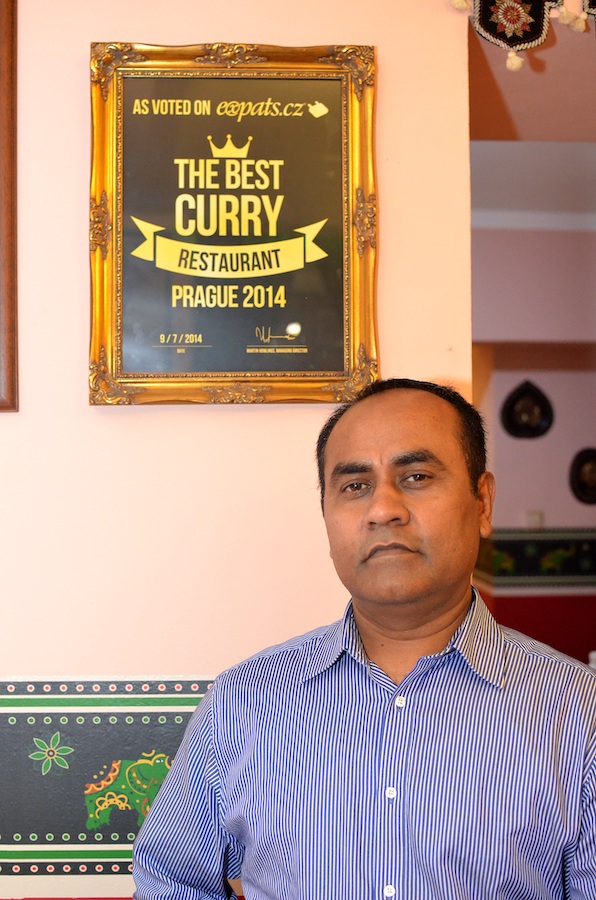
Mamun Hassan, Owner, Curry House
Mamun Hassan, the owner of the family restaurant Curry House, had already fallen in love with Czechoslovakia as a tourist in 1990. A few years later, he came back and started his career in the restaurant business. To many Czechs, he can serve as an example of someone who loves the country, appreciates the quality of living and particularly safety. I consider him one of the most modest and happiest people I have ever met. He can also inspire expats by the way he has embraced both Czech culture and nature, including learning the Czech language. His Curry House located at Prague Palmovka has several times been voted the best place to eat curry. Besides curry, the Curry House serves the hottest and spiciest meal Phall, ranked with seven chilli peppers and described as extremely hot with three exclamation marks. When words are missing, deeds come.
For neighbours, friends and also restaurant patrons, Mamun is known as a person who is always cheerful, has a big heart, and who is willing to help. As a member of Rotary Club Prague International, his restaurant enables the club to take part in three fundraising events throughout the year: Burger Fest, Indian Food Delivery Weeks and the British Curry sales during the Experience Great Britain event. Though keeping shy and modest, Mamun’s number of supporters proved to be enormous, as the reaction to our announced interview has proven. The number of positive remarks by far exceeded my previous interviews with Czech leading personalities.
Naturally, our interview took place in his restaurant. I asked Mamun to recommend meadish. Given the Czech nature and cuisine, I stressed that I do not like food too spicy. Mamun suggested Bengali Rezela, a dish that can be made with chicken, lamb, beef, shrimp or cheese. The sauce includes fried onion, yogurt, garlic-ginger paste and Bengali spices. Even though it says mildly spicy on the menu, the chef respected my wish and prepared it the non-spicy way. By the way, after the Curry House was voted as the best place to eat curry, some competitors tried to copy this particular dish. However, as they have never managed to copy it completely, they stopped. Over the delicious dinner, we managed to cover many topics. In addition to the obvious one of being a tourist in early post-communist Czechoslovakia, we talked about his advice for expats, discussed his dreams and, although this interview was definitely apolitical, we surprisingly ended up with the politics. Perhaps this was due to the fact where Mamun’s simple and cosy restaurant is in a house that used to belong to Václav Novák, a Czech political prisoner persecuted and later executed by the Nazis. Sadly, against Mamun’s will, one of Mamun’s plans, was also affected by politics. Relaxing, sipping a Mango lassi, the first question was obvious.
Mamun, how did you end up in post-communist Czechoslovakia?
I came to visit my friend in 1990. I immediately fell in love with the country. I felt safe and relaxed. Bangladesh is crowded and noisy. I tried to stay in Prague at least for one month to get to know the country better. At that time, it was not easy. Every day, I had to go to foreign police office and to change 20 dollars to prove I have enough of money to live here. But what to spend the money on? I was missing my food, so I started to cook. At that time, there was only one Indian restaurant at Štěpánská street. Not only was it very expensive, but you had to make a reservation at least four days in advance to get a table for dinner. From Czechoslovakia, I continued to visit my relatives in Great Britain and I returned to Bangladesh. A few years later, my friend asked me to come to the Czech Republic and start the restaurant business. I did not hesitate. To the disappointment of my father, who runs a successful family business and hoped that I would take over, I left for Prague and I stayed. In the beginning, I was going back and forth. Later, I brought my wife here. My first son, Dhrubo, was born in Bangladesh, since at that time we did not have enough friends and I felt it would be difficult with a newborn baby to be in the strange environment, not knowing the language or having friends and family. After my wife was going to and from Dhaka for a couple of years, I made the decision to make Prague my home. It was in 1997. I learned Czech and I made many friends here. I know most of my neighbours. My second daughter, Moon, was born in Prague. She goes to a Czech kindergarten, she is fluent in Czech, in Bengali and in English. As I have said, I feel at home here.
I belong among the Czechs who adore Asia. After such a long and grey winter, what particularly do you miss about Bangladesh?
It is not the sun. I got used to the weather. I miss my relatives and my friends. I go there every year and I try to spend at least one month with my family. I enjoy going to weddings, as medium Bangladesh weddings mean a gathering of about 1500 people and it lasts for seven days. Other than that, as I have mentioned, I am at home here and I am very happy. It feels safe. I have travelled across Europe, I have relatives in the US, but I have never felt as secure as here.
Let me go back to the mid-nineties, when you decided to establish Indian restaurant. Was it difficult given the conservative Czech nature and rather dull Czech cuisine?
As to the Czech cuisine, I must say that I like goulash, sirloin and cream sauce, grilled meat and duck. I do not like pork. My customers are loyal, I can say 95% are regular ones. I respect their taste and I try to cater to their needs and also actual mood. I try to make them happy. When they come for the first time, I prepare something not spicy. Next time when they come, I ask them: How are you today? What is your mood? Do you want to try something spicier? Slowly, you can progress from one star to two to three and so they discover new tastes and they have new experience. We are proud to use fresh and high quality ingredients. Our lamb comes from New Zealand, beef from Australia to assure consistent quality. I am glad I was able to find a local, small supplier of farm chickens. This being said, I am pleased to see the trend that the interest in Indian restaurants is growing. It is interesting trend when you compare it to Chinese restaurants that are statistically on decline.
You have lived in the Czech Republic for more than twenty years. You speak Czech, you have many Czech friends. Do you have any advice for incoming expats?
My philosophy is very simple. When in Rome, do as Romans do. Get used to the society, respect it, do not judge it. I know all my neighbours and they know me. And of course, learning some Czech helps but it is a very challenging language.
Racism and xenophobia is said to be on the rise in the Czech Republic. What is your experience?
As I said before, I love this country and I feel secure. I remember only two incidents when I had problems. During mid-nineties, skinhead movement was on rise. Twice I encountered the movement supporters on a street. I talked to them. I said look we are both human beings. If you wish, you can hit me but what for? I managed to negotiate myself out of that situation. My restaurant is located at Palmovka. Many friends have discouraged me from opening a business in that area. Again, knowing neighbours helps. And I am glad to hear that people come here all the way from Prague 4 or even Prague 6.



We both are members of Rotary Club Prague International. Your Curry House helps during three fundraising events throughout the year. At Burger Festival in September, during Indian lunch delivery in October and in March you were selling curry during the Great Britain day.
Giving back to society is really important for me. I try to help when I can. Besides the events you have mentioned, I also try to help either by providing food or by direct hands on contribution. Rotary Club Prague International project in India has been continuously running since 2007 and supporting one particular village in Rajsamand. We have been supporting several schools at this area. Schools were helped with uniforms, shoes, school books, books, writing materials and personal hygiene equipment. The schools were provided with some computer equipment, classroom furniture and kitchen equipment, as well as sports equipment and musical instruments. So far, we have helped 15 schools in different villages in Rajsamand, total amount 500 000 CZK. If interested in supporting, contact RCPI.
Unfortunately, you were not granted the visa to India to come and supervise the project. I wonder if the genius loci of the building that used to belong to a Czech resistant member also affected you?
I was honest when filling in my application for visa. There is one question asking about family members with Pakistani passport. Remember, the Bangladesh Liberation War broke out in 1971 between East Pakistan and West Pakistan, so Pakistani passport was the only one at the territory. Several times, I was denied entry based on that ground. But I consider the most important thing is that children in Rajsamand are happy.
Mamun, everyone who knows you describes you as cheerful and willing to help. Besides visiting India, do you have any unfulfilled dreams?
My dream is very simple. I want my family to be in good health, my restaurant to have a good position and I continue to be surrounded by good people. I wish to open one more extraordinary restaurant, but this dream may come true if my son Dhrubo comes back from his studies in London. But based on my own experience, it remains to be seen what his own journey will be. On the other hand, it looks like my daughter Moon will continue to run Curry House. Already at the age of five, she enjoys greeting the guests and she is curious about all the things happening. I am a truly happy man.
By Linda Štucbartová
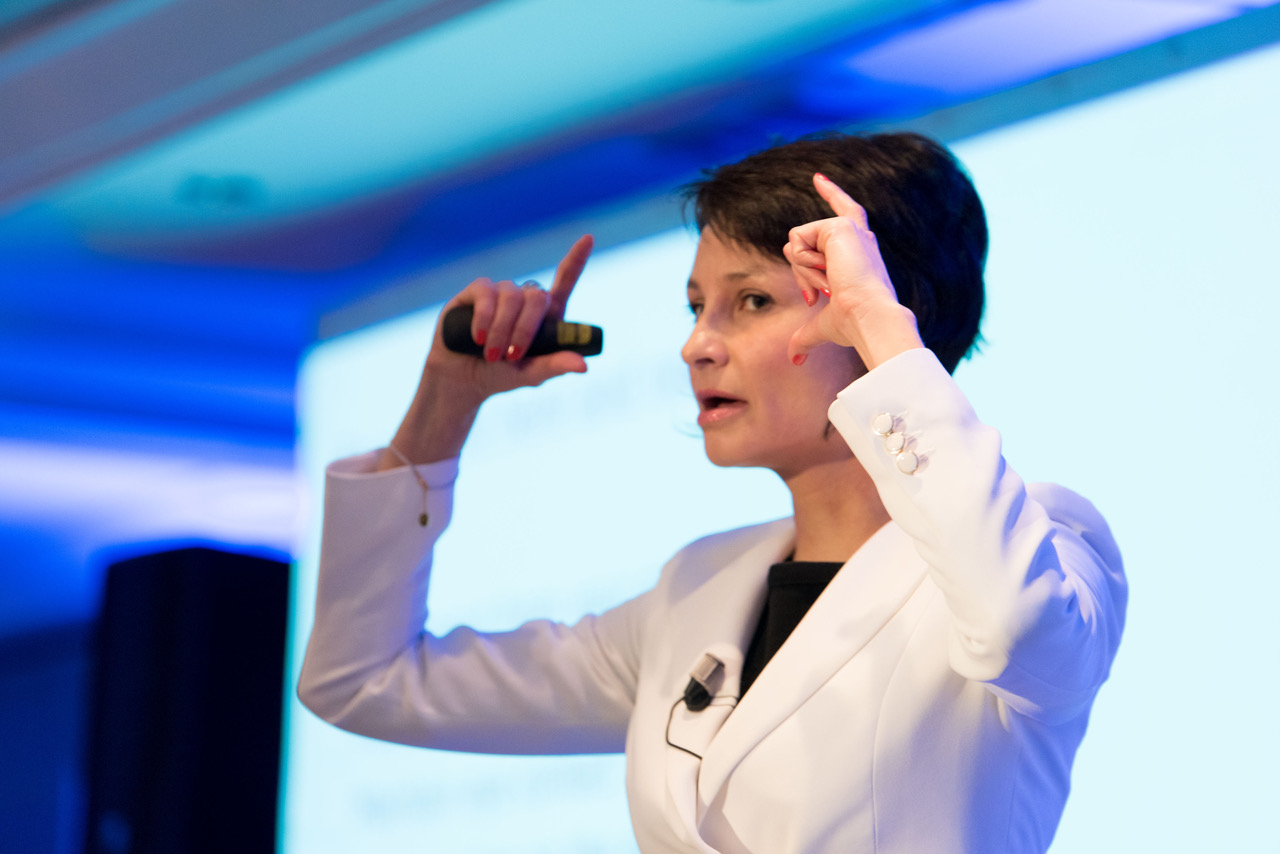
Alena Huberova, Communications strategist, speaker and trainer
When was the last time you decided to start something new or change something in the way you do things? Maybe you changed your job, or perhaps you joined a gym or started to learn a new language… No matter what it was, you felt compelled to do something and you did it. What fueled that decision? Could it be that you felt inspired by someone’s example, by someone’s story?
When I first heard a story of Mary Kay Ash, the founder of Mary Kay Cosmetics, one of the leading global skin care brands, something quite extraordinary happened to me. I felt such a powerful surge of emotions that I had goose bumps raising on my arms. I could relate to her struggles and frustrations when she tried to get her business off the ground. My heart ached when I heard her late husband George died of a heart attack just one month before she launched her company. In spite of all the odds, she managed to build a multi-million dollar enterprise virtually out of nothing.
Her values and her passion for what she was doing resonated with me. As a struggling entrepreneur, her story inspired me and gave me a renewed sense of purpose and hope that I could, just like her, pursue my own dreams and succeed. Her story inspired me to start and run my own independent Mary Kay. Although years ago, I am eternally grateful for the experience. It’s been 17 years since her death yet her story and her vision continue to live on and inspire millions of women all around the world. That’s the power of a story!
We love stories because they give us hope
Although stories have been told for centuries we are only now discovering just how powerful they really are and why. People crave stories because they make them understand that with the right set of “tools” and attitudes one can overcome any situation, no matter how difficult it is! Through stories we learn to accept that problems and obstacles are inevitable parts of life and that without them we cannot hope to grow personally, let alone transform our lives. Stories make us see that our own life is one big story and we can become the heroes or the victims of that story…
Strong, interesting, compelling and relevant stories resonate with people and they can literally become co-creators of the story with the storyteller, i.e., the speaker. Since our brain is designed to look for patterns, on hearing a story we immediately relate the story to our own experience. We become so engaged and involved in the story it is as though we ourselves were participating in those events and neuronally speaking, we are…
Stories change people’s brains
When we tell or hear a story, different parts of our brain light up, something that does not happen when we simply hear words, facts or data. This has been proven and can be clearly shown on fMRI brain scans. Our emotional brain is activated and a powerful mix of chemicals is released into our system, namely dopamine, oxytocin and cortisol. These chemicals not only make us pay more attention and remember the story, but it’s through the emotional charge that we feel inspired to act. Stories have power, they persuade…
Leverage the power of a story in your own business
I am sure this is not the first time you hear about storytelling. The question is, how well do you leverage the power of storytelling in your business? How effectively are you using stories to inspire others? It’s definitely something to think about. What’s more, stories enable you, the speaker or the storyteller, to better convey your message, make it stick and create an emotional bond with your audience. It’s not what you say, it’s how you say it that makes all the difference. And it’s stories that can help you convey your point in a different, more compelling and touching way that people will resonate with. The next question you might ask is…
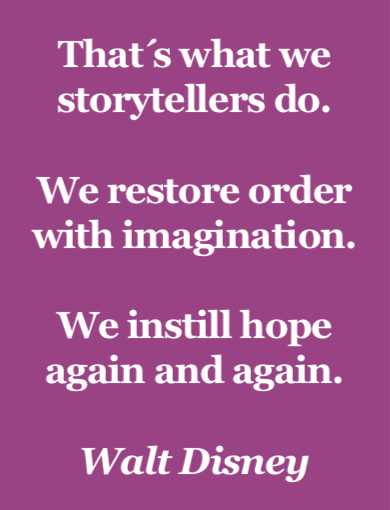
What stories to tell?
This is something I often hear from my customers: “Alena, we’re an IT company with highly complex technological solutions, what stories could we possibly tell our customers? And is it at all appropriate?”
Yes! It’s not only appropriate, it is essential. The more complex your message or the solution you’re trying to promote, the more important it is for you to find an easy way to explain it. And what better way to do so than telling a story?
When I work with Startups on developing their elevator pitches, the first thing I do is to extract some stories that we can work with. These can be “product” or “customer” stories that clearly illustrate the uniqueness of their solution and its added value for their customers. They can also be “founder” or “vision” stories to explain the purpose behind their business, the reason for their existence.
Some companies, such as Mary Kay Cosmetics, have at their core truly inspirational stories based on the challenges or frustrations of their founders. They talk of how the founder came across a specific pain point or a challenge in the industry that was not being addressed and decided to develop a solution. Or they talk of their frustration with something they saw in the society or experienced at the workplace. Such as Mary Kay Ash who was frustrated when passed over for a promotion just because she was a woman. That was back in the 1960s in a world ruled by men. She decided to leave her job and start her own company with the mission of assisting women in business and helping them achieve personal and financial success.
Such stories are very inspirational. But worry not! You don’t need to be Mary Kay Ash, Sir Richard Branson, Steve Jobs or Martin Luther King to have a great story to tell!
Think of your customers, especially your happy customers. What was their business like before they found you or your product/service? What challenges they struggled with? What did they use to do in order to achieve their objectives? And what is it they can do today with the help of your solution?
Think about you. What brought you to this business? Why did you pursue this business and not something else? Surely you will find there are noteworthy and persuasive stories to share.
You will be surprised at the number of ideas that will come to your mind. And you should get ready because you don’t want to forget any! What you can do right now is set up a document or a simple note on your Phone and start collecting stories. This document will eventually become your “story bank” from which you’ll be able to select the most appropriate story to tell for your next speaking opportunity.
Great stories are everywhere around you. You just need to stay open to them.
I wish you success in your story-hunting and story-telling and many truly inspired customers!
By Alena Huberova
Communications strategist, speaker and trainer
www.alenahuberova.com
alena@alenahuberova.com
ABOUT ALENA HUBEROVA
Alena has a professional background in sales, marketing and communication in a variety of sectors including IT, travel and tourism, wellness and beauty. With over 15 years of experience working in corporate business and living in 5 countries across Europe and Asia, she embarked on a quest to discover her mission. Diving into entrepreneurship, she developed an online portal to promote healthy living. Later she built a team of 50 sales consultants in the beauty sector and became a role model to her peers. Learning by working with hundreds of professionals and overcoming her own struggles as an entrepreneur and introvert, she was inspired to start her communication business, which has since turned into a lifelong passion.
Today, she assists business leaders in developing a powerful personal presence on and off-stage, delivering presentations that capture the hearts and minds of their audiences and inspire action. She also acts as a mentor for startups, helping them design and deliver winning business pitches. In collaboration with Presenation.com, she coached the X.GLU Czech Team to win the world title at the Microsoft Imagine Cup in 2017. She also presented at the TEDx UNYP 2017 conference which is part of a global initiative by TED, a non-profit organization devoted to spreading ideas.
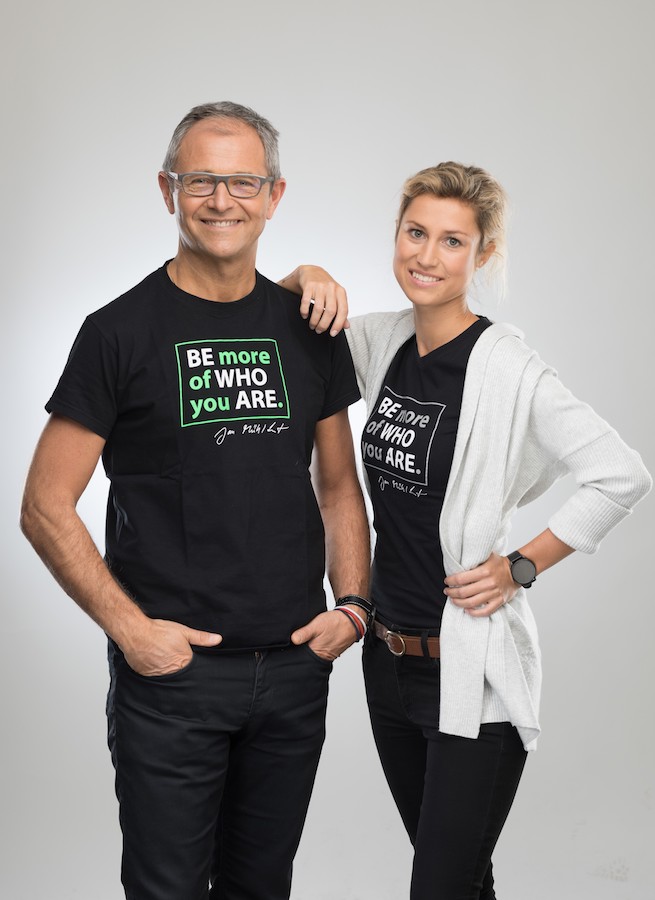
Jan Mühlfeit, Kateřina Novotná
Are you wondering what is the best way to work with your children’s talents and to prepare your children for the future as best as you can? During the “Parent as a positive couch” workshop, parents and teachers find out how to effectively couch and mentor their children according to the latest findings in the field of positive psychology, in order to make their children not only successful, but also happy in their lives. The topics are also based on Jan Mühlfeit’s book − The Positive Leader, one of the bestsellers in the Czech Republic. Moreover, we organize workshops for children and their parents: “Unlock Children’s Potential” and “Unlock Your Potential for Secondary School Students”. Our workshops focus on discovering children’s individual talents and finding out how to work with them. This is one of the topics of the book for parents that is planned to be released in September 2018. Come to our website janmuhlfeit.com to find out more about our seminars and projects. You can also watch our “Unlock your Childrens’ Potential” seminar and the “Your Talent is Unique” series on www.flowee.cz.
Sport shapes us and influences our lives. It has influenced me and Katka since childhood. Until I was 12 years old, I was fat. I did some sports, but not professionally. At 12 years old, when I entered a tennis club, according to my trainer I was more fit for sumo. I had two options. I could apply for a sumo course or stop overeating and start training and exercising. I chose the second option. In our laundry room I regularly played against the wall, I ran 10 kilometres a day (which I still do) and at weekends, even when it was cold, I got up at 4 o’clock in the morning to go exercise in the hall. One year after I joined the club, the best youth player was the chairman’s son. Two years later, it was me. This experience created a stable line in my mind, a synapse which, since then, tells me that every no is the beginning of yes. If you persist long enough, you eventually win.
Thanks to sport I know that if I want to be good at something, I have to train regularly. Sport taught me endurance, I became fit and lost weight. As soon as I looked better, I also felt better. If you do sports, you perform better, you are usually more creative, more active and healthier. I am convinced that exercise, even if only in the form of regular walks, should be one of the basic life pillars of every healthy person.
Katka has done sports since early childhood. She has tried rock ‘n’ roll, ice skating, inline skating, skiing, snowboarding, football and several other activities. She was a very active child. Her parents realised that she enjoyed sports, so they let her express herself freely. At 9 years old, she started to play basketball and became a team captain. She played this sport for 10 years. Thanks to that she learned to be a team player. When others cried, she tried to encourage them. Apart from mental toughness, discipline and the art of a team play she gained friendships that have lasted until now.
Be Able to Focus
After school finished, children used to go out and play. It had great significance. They socialized and competed with each other, not worrying about mistakes and being aware that if you fail one day, it does not necessarily mean that you fail the next day as well. They played football, hockey or dodgeball in front of houses, girls used to walk in parks or in the nearby hills. Physical activity was omnipresent.
The current situation is that half of the children who are defined by tests as competitive dislike competing. Why? They are afraid of failure. They have not learned to accept failure and it has not become a normal part of their lives. If children do not do sport, they do not have a chance to find out that failure does not necessarily mean a lifelong lack of success. And, what is more, they do not find out that they can learn from failure and win the next time. They are not strong enough, so they often give up after their first failure. Children may also learn this in PE, but classes do not take place often enough and not all children enjoy them.
Today children lack outdoor physical activities. Also, they suffer from obesity more often, they are less active, quickly lose attention and they fall ill more often. One of the reasons is that they are constantly surrounded by devices distracting their attention. This generation is over-informed, but under-focused – over-informed, but without the ability to concentrate, which is why they do not even do sport. If one wants to succeed in sport, one has to be able to concentrate; to be here and now.
Clean Your Mind
Naturally created teams are nowadays replaced by social media, which can bring you to the flow state, but only to a rather shallow one. Social media partly satisfies your need for new incentives and information, but it does not, for example, induce the production of oxytocin – a hormone formerly associated especially with childbirth and breast-feeding, whose production is stimulated by eye contact and touch. Oxytocin helps us create connections, trust, feeling of togetherness, satisfaction and empathy. This is actually one of the reasons why children from children’s homes have troubles integrating well into a team or a group. They lack these experiences and hormones. Even though social media have undisputable positive aspects, they can never replace social contact, whether at home, in a sports team, a theatre club, a choir or in an orchestra.
Children are now used to walking on the so called red carpet, as parents try to remove all obstacles from their paths. However, your mental toughness manifests itself by being able to go on and fulfil your tasks, even if the situation is not really easy. Mental toughness can be learned, but not by using social media or surfing on the Internet.
Telephones, tablets, computers and other devices are addictive. It is very common that in order to gain time for technologies, parents let their children play with them, so an infant capable of browsing the Internet is not that rare. Parents are usually proud of that. There is nothing wrong with using new technologies, but regular digital hygiene should not be missing. It does not simply mean turning the device off or logging off. It is essential to learn how to switch off mentally as well; how to clean your mind. And this is exactly what sport can do.
More Physical Exercise, Better Competitiveness
Physical exercise enhances children’s health, mental toughness, creativity and intelligence. It would be interesting to analyse the competitiveness index of European countries. I am convinced that the competitiveness is higher in those countries where sports classes are supported. Investments and the overall support of sport were also reflected in the last Olympic games results. Of course, Northern countries have a certain advantage in winter sports thanks to their climatic conditions, but it must be noted that although the cost of living is very expensive there, you can do sports almost for free. And it brings results.
Although the Czech Republic has made a substantial step forward in the last few years, we are still not there. In Germany, Slovakia, Austria, as well as in Hungary, investments in sport are higher. I am convinced that in countries where sport is supported on a mass scale and PE classes are more frequent, it is reflected not only in people’s health and social life, but also in economy.
The importance of physical activity for children and adults is well-known in the Czech Republic, too. That is why there is the project called Extra class of physical exercise (see box). It is supported by the Czech Olympic Committee who I work with closely, so following an agreement with the authors of the project, Katka and me decided to promote this helpful activity. According to PE teachers who met Martin Kafka from the Czech Rugby Union and a member of the project team, rugby teaches children the following: In order to achieve your goals, you have to fight, observe the rules, respect your opponents and referees, stay disciplined, show solidarity, as well as control your emotions. According to Martin Kafka, it is the best preparation for life: “Apart from other things, sport hurts. If you do not experience pain in your childhood and you do not learn to cope with it, how can you succeed in life?”
Stay in the Game
At job interviews, most employers currently take into account whether potential employees are physically active. Those who do some sport usually have more drive. I know it from my own experience. When I asked people practising sports, either in the past or present, whether regular exercise had played any role in their career success, all of them confirmed it had helped them a lot. People who do not do sports usually have less drive. Often they lack the required toughness, endurance and good physical health. I am sure that if I had not had such a good physical condition and mental toughness, I would not have survived my mental issues. When I suffered from depression and my future was, as Cyril Höschl says, “fifty to fifty”, at a certain point my subconsciousness “exploded” and pushed me back to the game.
The body and the mind are connected. And employers are aware of it. That is why most of them provide their employees with a free entry to fitness centres, swimming pools and dance or other classes. Naturally, not everyone makes use of their free tickets. Many people simply say that they do not have time for physical activity. With such an attitude, however, they only harm themselves.
In reality, essential digital hygiene is not only a matter of self-organization. If your boss sends tons of e-mails during the weekend, most colleagues also read them during the weekend. Even if your boss claims that it is not necessary to read them at the weekend, the work goes on. However, there is a possibility to postpone the e-mails and send them automatically at a set time. Some people think that if they work 16 hours a day, they will be more successful and more productive. It is nonsense. The brain is tired and needs to rest. Even if you like your job and it brings you to the flow state.
Loaded Like a Top Sportsman
Secondary school educated and university educated people who engage in business, science, IT and other mentally demanding activities face a load in their work like top sportsmen. Sportsmen, however, have support teams consisting of masseurs, physiotherapists, psychologists and couches. By contrast, ordinary people have personal assistants at the most, so they have to cope with all demands on their own. Sport is thus a very important complement to business.
If you are not talented at sports, do not force yourself into it. The absence of sports talent does not really result in failure in life. If a child is not good at sport or it is not their cup of tea, it does not make any sense to force them into it. It would discourage them and they could even be afraid of it. Nevertheless, if possible, try to encourage them to do some physical activity. Little sporting habits are always useful. The previously mentioned skills such as mental toughness may be also obtained by other activities, for example by playing a musical instrument, singing in a choir, attending modelling or writing classes. Any utilitarian activity is helpful. However, it is easier to achieve them by physical activity. Sport is funny and, while doing it, children are not even aware that they are learning. As soon as they learn to attend trainings regularly, the habit remains imprinted in their bodies forever.
By Jan Mühlfeit,
Global Strategist, Coach and Mentor,
former Microsoft Chairman for Europe
Extra Class of Physical Exercise
Extra class of physical exercise is an initiative that aims to implement quality PE classes in schools and increase the compulsory number of classes by one. “Our goal is to show children that sport can be interesting and entertaining, thus making them want to do it. While doing sport, no one punishes them, bosses them around or organizes them like a policeman,” explains one of the project founders and a member of the football association Antonín Plachý.
In reaction to the worsening health of children caused by the lack of physical activities, in spring 2015 the Ministry of Education, Youth and Sports proposed to experimentally explore the possibility to increase the amount of professionally led children’s physical activities in after school clubs in primary schools.
For the sake of children, top players in the fields of sport and education joined forces and prepared a programme that makes it possible to achieve the set goals. They methodically prepared materials teaching children skills necessary for a certain sport by the means of simple and funny games. They shot exemplary videos, produced manuals and created a system of lectures and workshops for teachers who experience the new methods of teaching from the children’s point of view. Usually they are excited, as it is a great inspiration. Mentors work with the assumption that children generally enjoy physical activities, so if they are bored at PE classes, it is often the teacher’s fault. Pupils spend a lot of time waiting and standing around, and classes are often cancelled in the first grades. However, teachers should not put an end to the fun, but in fact develop it and encourage children, whether talented or not, to gain a positive relationship to physical activities. Other important aims of the Extra class of physical exercise project are as follows: To make teachers worry less about children getting injured, to allocate more resources to sport and to change the ways of education in pedagogical faculties.
Thousands of teachers who wish to change things and are not afraid to do so have already joined this project. According to the available data, pupils who participate in the project want to repeat it, they skip PE classes less often and, what is more, they are more active in other classes as well. Some of them even start doing some physical activity outside of school, joining sports clubs.
All information about the project is available on the following website: http://hop.rvp.cz/.
Every entrepreneur should consider whether there is a risk of data leakage in his or her business. Companies that largely trade and sell data and collect data systematically about specific people need to take appropriate measures under the General Data Protection Regulation (GDPR) and ask for the consent of their clients. The regulation does not apply to specific sectors. What matters is the systematic collection of personal data. GDPR is not a revolution but an evolution of the rules that already exist based on the EU directive, respectively on national laws regarding personal data protection. Those are the main conclusions of a debate on Data protection in small businesses organised on 12th March in the European House in Prague.
© CEBRE – Czech Business Representation to the EU
Photos from events attended or hosted by Miloš Zeman, President of Czech Republic.
Photos by: Archive KPR, Hana Brožková
Discussion Dinner with the Minister of Health Care
TOP hotel Praha, March 7, 2018
On March 7th more than 70 high level business women and men gathered to participate in the Round Table of Comenius – discussion dinner with the Minister of Health Care of the Czech Republic. It is tradition that dynamic debate covered a range of topics from the minister’s agenda. The discussion was launched by Ministers´ short welcome address and traditionally concluded by the President of Comenius Karel Muzikář, who expressed his gratitude to all guests for a fulfilling debate and the Minister for his time and willingness to attend the discussion.
“A modern polymath solving problems, making a difference”
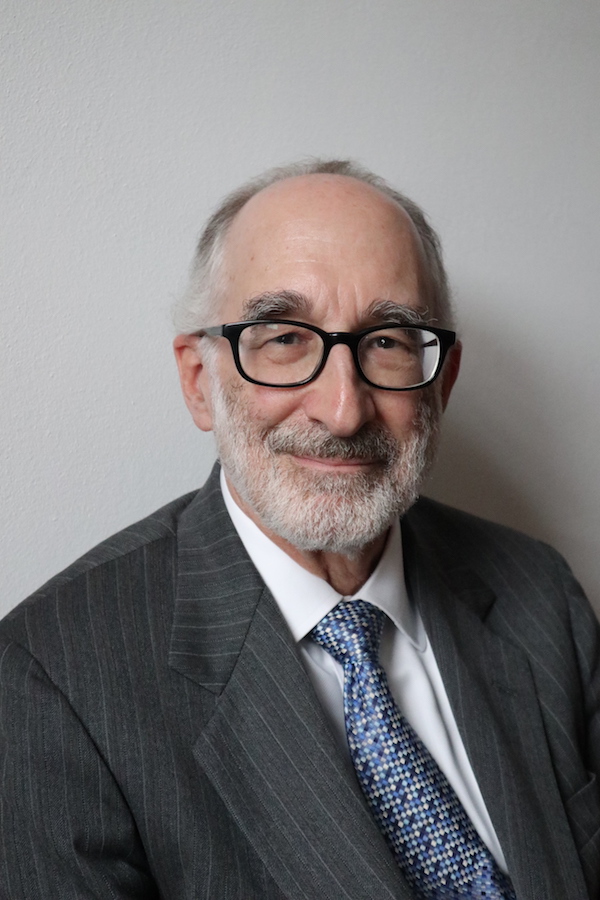
Ira Rubenstein
I met Mr. Rubenstein in Boston, at a business/social dinner – and about one minute into our conversation I knew I’d ask him for an interview. I have met, interacted and worked with many successful business people – the hubris that sometimes comes from successful leaders is not part of Mr. Rubenstein’s personality and comportment. On the contrary, he exudes that kind of confidence and influence which come from genuine interest in others and just simply ‘things’ happening; his keen sense of what is truly urgent and relevant; his alertness to anything that could possibly be a novel solution or approach to solving a problem and, to put it simply, he has refreshingly interesting and sharp answers when all we usually hear and are inundated with are cliches and equivocations. He listens to others with both sharpness of intellect and unassuming manner – open to other opinions, ready to weigh different views.
Mr. Rubenstein’s experience is very rich; he is a true modern polymath both in terms of his education and career. He has a degree in liberal arts, having concentrated on history and political science; started his career intending to go into the field of education but instead ended up in government, business, entrepreneurship and finance – much of which focused on alternative and green energy – and then finally did come to education. He can discuss in depth and with complexity any global political or social issues and then switch to the most pressing environmental issues, explaining various engineering methods and solutions from which he smoothly continues on to discuss financial matters globally or domestically. That, of course, he will connect to education and the pressing need to make research, innovation and entrepreneurship effectively linked with academia.
In Mr. Rubenstein’s case, all of the above is coupled with an honest and sincere interest in making a difference and finding ways to make our world better – which he has successfully done, and continues to do.
How would you describe your business activities and management services?
Anyone who gets to know me rapidly comes to understand that I have many interests; these have led me into multi-faceted and complementary careers in business, finance, academia and the non-profit sector. The common theme through all of these activities is that they are coupled with the ability to make change happen – improve a business, implement a project that delivers a more sustainable world, advance the opportunity for entrepreneurial talent to succeed in commercializing their innovation, advance a new idea that helps improve the way in which we live and work together on this planet.
Your business interests/projects have taken you all over the world. You are originally from the US – and you are an American – but you decided to settle down in the Czech Republic. You are also very active in Slovakia – why these two countries? What do you think about the business environment, culture and opportunities in the Czech Republic and Slovakia? How do they compare with the US – or the rest of western Europe?
Yes, I am originally (and still) a US citizen; I lived and worked in New York through several prior careers in government, business and finance. I decided to explore finance opportunities in Europe in 2005 and to do that from a base in Prague. The financial crisis in 2008-9 led my wife Lenka and I to move from Manhattan to Prague (we had been traveling back and forth regularly for about 3 years) to work here full time – a decision I have never regretted. And I am now also a Czech as well, having acquired Czech citizenship – and a garden that needs tending – at about the same time (some 3 years ago).
Business opportunities have been good in both Cz and Sk and, working with great colleagues in the field of finance, we have been able to deliver solid results for multiple clients in energy as well as other industry sectors. Both countries have business marketplaces that are often like the “small villages” people refer to (albeit very sophisticated ones!). And many finance industry colleagues in the US and Western Europe still need to wake up and see the opportunities which these markets present – especially as regards entrepreneurial and emerging technology companies.
A note of caution is perhaps in order, though – the advent of illiberal democracies in this region (as well as in others) COULD threaten this region’s hard-earned prosperity. Such governments often look to restrict cross-border activities (immigration, trade) which are vital to sustaining the growth of economies. And trade restrictions have historically been a harbinger of conflict. I believe that the EU’s focus on no/low barriers to intra-European commerce is critical to our region’s economic health going forward. And I worry about the effect of possible restrictions to international commerce that are so much in the news today.
A lot of your finance projects have involved sustainable and green energy. How would you describe the state of these industries – in terms of research, potential and the actual application/use? Are there still people/industries that are difficult to convince about using sustainable and green energy? How do you see the future – could you project when most of the energy we use will be renewable/green?
Much has been spoken about the movement of industry to its “4.0” next stage of development. And while much of this is in part due to the involvement of information technology and automation/robotics, I think we tend to overlook energy industry innovations. These include the continually improving efficiency of renewable energy generation, the reduced cost of related technologies and the heightened availability of lower cost and increased capacity energy storage options. These are, especially taken together, important enablers of our ability to ensure the sustainability of our civilization.
Renewable energy as a reliable and cost-effective source of energy has progressed to the point that not to use it could in and of itself be considered an imprudent business decision that would enhance the risks of the business in question – almost any business. So it is for this along with other reasons that I believe that we will see a preponderance of energy from clean sources become the norm within my lifetime (and I’m not THAT young anymore…).
You have a degree in liberal arts and concentrated your studies on History and Political Science. You intended to have a career working in the field of education – how did you transition from your initial focus on liberal arts and education to finance and alternative/green energy?
It’s a looooooong story – my interest in History and Political Science led me to take an internship with the legislature in New York state and I became intensely interested in the ability to make change at that level – so much so that I abandoned any advanced degree work and even let a law school admission lapse. I worked in government for 8 years, then worked as a consultant for another decade. That work in turn led me into finance, as I saw that many of my clients required access to new sources of capital. And my client base at the time was comprised of entrepreneurial and “clean tech” (a term that had yet to be invented) companies – areas which have been foci of mine ever since.
In your opinion – what are the most important traits of a successful entrepreneur and a successful leader?
They need to have multiple abilities: they need to think out of the box and encourage others to do so as well. They need to be open to accept – and to expect – that the best ideas are not necessarily one’s own.
They need to listen. They need to defend the concepts and ideas that they really believe in vigorously – with solid data and with passion.
They need to understand the value of actively cooperating with others (sometimes while competing with them elsewhere); entrepreneurial success relies in part on helping to develop critical mass and taking an active part in the start-up ecosystem.
How do you think “doing business” generally and entrepreneurship – and being successful – have changed due to globalization?
This is a tough question! Like all changes there are both positive and challenging aspects. Business has become much more competitive. With globalization has come reduced barriers to entry in a whole host of industries – and challenges in innovation, new business models and approaches to markets can, and do, come from anywhere – and quickly. I am convinced that both the Cz and Sk economies and companies can compete well in the globalized marketplace – both countries have a strong combination of intellectual capital and manufacturing capacity, enabling both development and delivery of innovation from the same economy.
What would your advice be for young people entering the workforce – trying to make a difference and lead?
Be flexible and be willing to take reasonable – and sometimes more than that! – risk. Don’t just go work for a company – and that’s a fine thing for many people to do – if you want to work on developing your own entrepreneurial opportunity. There have NEVER been more tools available to help resourceful people connect – with other likeminded people, with potential business partners, with technological expertise, with financial sources, etc. If you want to lead by innovating there are plenty of people out there looking to help you do so – and this interviewee is one of them!
Any special message for our readers?
Pursue your vision and do not be afraid of change. Change has been a welcome friend to me – in times both good and challenging – and I recommend you get acquainted! I’ve had (depending on how you count them) five different and at times parallel and complementary careers (not counting work in the garden) while living on two continents. And the pace of change continues to advance…and I often wonder what my next career will be…
By Miriam Margala
“Respect and debate are the foundations”
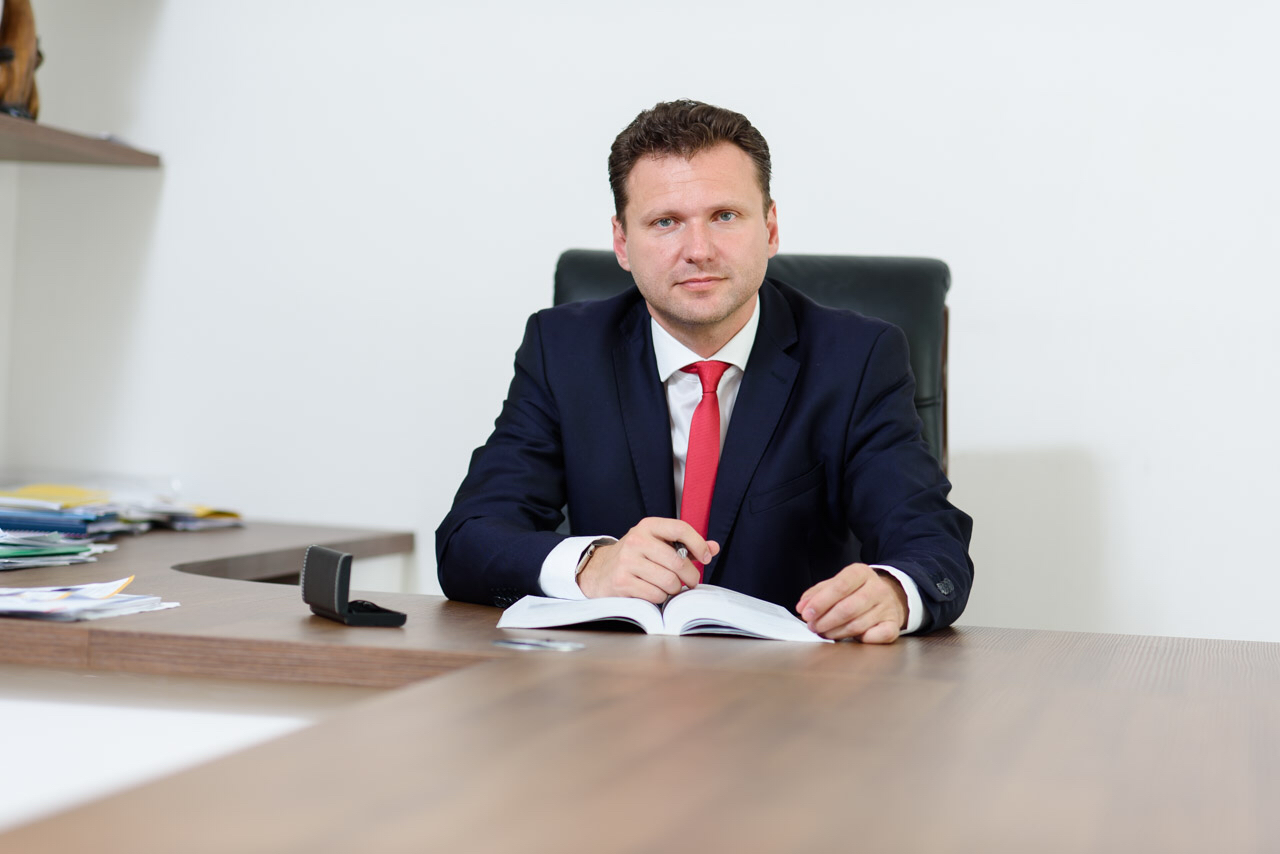
Radek Vondráček, President of the Chamber of Deputies of the Parliament of the Czech Republic
Arranging an interview with the man holding the state’s third highest ranking constitutional position attested to one of those coaching rules, which goes: “the greatest barriers are those we build in our own mind”. Getting an interview with Radek Vondráček wasn’t as difficult as one might think considering his top position. In fact, his secretariat responded promptly and eagerly. I don’t believe in chance, but rather in synchronicity. The interview took place the morning after President Zeman’s inauguration. Radek Vondráček had just had a long and difficult day managing a meeting of both parliamentary chambers in his role as President, or Speaker, of the Czech Parliament’s Chamber of Deputies. Remember that a number of deputies left this meeting to express their disapproval of the President’s speech. I was struck that the statement Mr Vondráček provided on this incident to the media began by thanking his colleagues for their careful preparations for the meeting, and only then giving his opinion. I saw it as a conciliatory gesture in the context of a divided society. The troubled atmosphere in Czech society is clearly apparent. People have taken to the streets for the first time in many years, first to express their solidarity with the murdered Slovak journalist, Ján Kuciak, and his girlfriend Martina, followed by protests against Communist deputy Ondráček being appointed head of the Chamber of Deputies’ Commission on Activities of the General Inspection of Security Forces (GIBS), and also by protests supporting independent media.
We were both a little tired and downhearted that morning. Nevertheless, we endeavoured to rise above ongoing events and under the bust of Tomáš Garrigue Masaryk, we discussed the Czech Republic’s past and future. How does he see today’s parliament, and the parliament of 100 years ago? What does his young son say about his work in politics? And how is he able to the help the Zlín Region as a proud native of Kroměříž? For me, it was extremely rewarding to look into the thinking of a politician who in just four years in politics now holds one of the highest positions in it. Yet in my opinion, he remains a humble and gracious man.
Is the Czech Republic a divided country?
I see conflict of opinion as having been continuously fed since the election. I see this division in my family, amongst my friends, in bars and in the parliament. I can’t compare how divided we are compared to other countries, but look at what’s going on in Slovakia. I’ve had the opportunity to visit Austria, where society is also polarised, and never mind the United States of America. So it’s up to politicians to be able to keep a certain perspective. And it begins with how you communicate in parliament. If politicians are going to continue to stand in front of the cameras and create conflict, then we won’t be able to move forward as a society. Everything can be dealt with substantively and practically. Problems occurred in regard to invitations to the inauguration. I hadn’t realised there was any problem; I found out about it from Twitter. ODS leader , Mr Fiala, came to me, told me about his problem and we tried to find an appropriate solution. In contrast, Mr Kalousek lost no time in making a statement, provoking further conflict, and totally unnecessarily. Politicians have got to be able to speak to each other, and people will follow. That’s what leadership is about, and that’s a topic your magazine also focuses on.
We may not have the same opinions, and in fact I wouldn’t want us to have the same opinions. The hardest test for any democratic politician is to learn to respect dissenting opinions. It’s the same in life. We each have our own circle of friends and acquaintances, and so we aren’t confronted with the challenge of learning to respect others with a different opinion. I myself remember when I began in politics in 2013 and I felt the need to convince everyone else that my opinion was the best, I was right and others didn’t understand. After five years in politics, I know that people have different opinions and I respect that. Naturally, I endeavour to promote my own opinion, but I also respect other opinions. Respect and debate are the foundations. But they are very fragile foundations. All it takes is one act of offence to trigger a set of responses which can spiral out of control.
Your political programme, with its slogan, “changing the political culture in the country” comes with the subheading “being polite isn’t a weakness”. Are you managing to fulfil this pledge?
As the President of the Chamber of Deputies, I’m doing my utmost to be non-partisan, to rise above current conflicts. Naturally, I am aware that within our constitutional system I cannot be 100 percent objective, but I really am trying to do my best. In the end, actions speak louder than words. I could give you many examples where I have given everyone equal footing. Furthermore, I have tried not to make a decision from a position of power, or by using some kind of trick. If an agreement isn’t forthcoming, I am happy to abort discussions and call on the leaders to come to an agreement. It’s up to others to evaluate my actions.
We’re holding this interview under Tomáš Garrigue Masaryk’s bust. Do you think it was harder to run parliament in 1918 than it is today?
I’d really love to know what our founding president would say about the situation today. But on the other hand, let’s not idealise the First Republic. I’ve read a number of speeches and discussions on the Parliament at that time. Human nature is always the same. MPs then certainly didn’t give anything away for free. And after all, one of the parliament’s roles is to deal with conflicts of opinion so they aren’t dealt with on the streets, as is happening now.
You’ve been in politics since 2013; since 2017 you’ve held the third highest constitutional position. How has your perception of politics changed over those five years?
Before I entered politics, my perception of the parliament was only as conveyed by the media. And the media doesn’t look for positive examples, but rather conflicts and extremes. You won’t find a report saying, “MPs behaved civilly today and came to agreement on all items.” Yet this happens. I could give you the example of the Act on Conflict of Interests, which aims to help mayors and officials at municipal council offices so that the declarations of assets they make do not overly intrude into their personal and family life, and I’m glad it was easy to come to an agreement about this act. I myself know of mayors who have chosen to resign their roles and leave politics rather than have their privacy, and in some cases the safety of their families, put at risk. On the other hand, the composition of the Chamber of Deputies today is rather unusual. We have nine parliamentary party groups and no coalition. The negative mood and missing structure is inevitably reflected in the everyday work of the Chamber. We form ad hoc alliances; this is a turbulent, fragmented era. I myself can see a great difference in my previous role as First Vicepresident, and now in my role as President. For the past three months, I’ve been almost constantly at work.
You are a proud patriot of the Zlín Region. How would you introduce the Zlín Region to a foreigner who until now has only known Prague?
The Zlín Region’s greatest treasure is its wonderful people. I come from Haná, but Moravian Wallachians and Moravian Slovaks also live in the Zlín Region. Anyone who comes from here knows the differences between us. But we’re all Moravian. I appreciate the hard-working and modest people who represent our greatest wealth. We don’t have oil fields or mines. Anyone who comes will see the beauty of our nature and the fact we are a border region. I’d also like to say that we are a Region with a lot of industry. We have many top manufacturing businesses which specialise in production, and they often also do their own research and supply large companies the world over.
You come from the beautiful town of Kroměříž, which is a UNESCO World Heritage Site. There is still debate, however, over to what extent this award has actually helped tourism and development.
We are very proud of this award, and we even have a UNESCO Club, something which is unique as having been set up at a local level, and not a national level. It is my conviction that this award helps us, and I enjoy boasting of the fact when I meet with ambassadors, for example. There are loads of fascinating tourist destinations in the Czech Republic, but tourists come here for a short time. This award undoubtedly helps to steer them here.
You say on your website that your previous work as a lawyer has helped you to appreciate the problems of people from a town with a population of 30 000 people. Are these problems any different from those of people living in Prague?
It’s always those thorny issues which get to lawyers. An example I could give is the regulation on building energy performance certificates, which complicated property transfer contracts. We subsequently dealt with this in parliament. On the other hand, people are the same everywhere, and they have the same worries. In terms of wage levels, the Zlín Region is the Region with the second lowest average wage. In fact, our nurses have the lowest wages in the Czech Republic. It is only due to the wonderful people that the health service works.
You’re the proud father of a son and a daughter; what future do you see for your children? Can you even reconcile politics and your family life?
I don’t want to predetermine any direction for them; I want them to make their own decisions. Parents should give them maximum support. I’ve led them to sport; they play tennis, ski. I also focus on their language education, and both play musical instruments. My wife does a lot to bring them up, and the grandparents also help. I’m the kind dad who spoils them at weekends. But still my nine-year old son always asks me each week whether I “really have to go to Prague to be Speaker of the Chamber?”
Finally, I’d like to return to the start of our interview. The Czech Republic is doing really well, and not just economically. All the ambassadors here praise it as a wonderful place to live. Why are we not satisfied?
I think it’s our national characteristic. They told me in Brussels that we’re the second most Eurosceptic country. But I told them: “The Eurobarometer just isn’t set up for Czechs.” We’re always going to be grumbling; it’s in our nature. It hasn’t been easy for a small nation to survive within Central Europe where loads of wars have begun and played out. We used to make fun of Moscow, and now it’s Brussels’ turn. Perhaps we can be proud of this in our own way. I personally look to the future with optimism.
By Linda Štucbartová
Photo coverage of event at Prague Castle.

Social media platforms are very important tools for any successful entrepreneurial effort. Given that there are 3 billion social media users around the world, it’s clear that these networks can help you promote your business, get in touch with your target audience and engage them, check on your competitors, and keep up with the latest trends from your industry. But don’t let that seemingly straightforward process of creating posts and publishing them deceive you – that’s just the final step preceded by a lot of research and planning. Here’s what every entrepreneur should know in order to take advantage of social media.
Know your audience
Understanding your audience is crucial for creating your messages and your overall social media approach. Detailed information about your potential customers will help you pick the right social media platforms and optimize your outreach. Also, it’s practically impossible to tailor the right content if you don’t know who you’re talking to and what their pain points and interests are. After you’ve established an overview of your target audience, you can set your goals and create social media and content marketing plan. Finally, using analytics is essential for identifying how your strategies are performing and whether they’re effective. That’s why it’s a good idea to hire a reliable social media monitoring agency and have all your KPIs tracked and analyzed.
Leverage storytelling

Many big companies use storytelling in order to attract their target audience and connect with them on a more profound level. Your social media followers want to know more about your company, which is why creating a comprehensive narrative can do wonders for the engagement. For example, the story about Nike’s first shoe, the Waffle Trainer, has become legendary and the company uses it to illustrate their culture of innovation, as well as their zest for growth and development. Make sure to include your audience in your story and to make it relatable if you want them to engage and interact with you.
Be responsive
This means that you should answer every single question and respond to every single comment and mention. Many companies tend to post their messages without any further follow-ups or interactions with their audience. Social media platforms are powerful tools for feeling the pulse of your audience and getting their opinion on your business. Don’t even think about deleting negative feedback because that’s completely unprofessional, not to mention that it will generate extremely bad PR. Instead of that, deal with those negative comments proactively, thank people for drawing your attention to the issue, and promise that you’ll look into it.
Provide value

This is a make-it-or-break-it factor that should be at the core of any effective social media strategy. It’s based on the psychological principle of reciprocity – when you give something of value to your audience, they will feel obligated to return you the favor. In other words, by producing helpful content which offers solutions to their problems, you provide your audience with something valuable, and what’s more important you don’t ask for anything in return. They’ll recognize your noble intentions and you’ll win their loyalty.
Be consistent
In order to keep your followers engaged, you need to post and share on a regular basis. But, being an entrepreneur means working crazy hours and it can be hard to keep everything under control. That’s why you need to use social media management tools which will allow you to schedule your posts in advance. The consistency also refers to creating your company’s image and defining a certain voice and tone. This means that you should have a set of guidelines about how you want to present your business on social media networks, and these guidelines should reflect your company’s values, mission, and culture. Being consistent will help you improve your visibility and recognition, as well as build customer loyalty.
These 5 tips can help you navigate the social media landscape and promote your business more easily.
Sources:
https://www.entrepreneur.com/article/290965
http://blog.marketwired.com/2014/03/06/top-social-media-skills-for-entrepreneurs/
https://www.entrepreneur.com/article/289363
https://socioboard.org/blog/what-every-entrepreneur-needs-to-know-about-social-media/
https://sieve.studio/contemporary-social-media-hacks/
http://www.businessinsider.com/nikes-first-running-shoes-were-made-in-a-waffle-iron-2015-7
https://www.thebalance.com/principle-of-reciprocity-marketing-3515502
https://mashable.com/2017/08/07/3-billion-global-social-media-users/#QsLfWDfFmaqN

There have been numerous studies over the years that have shown the value of good quality financial advice – not least, the fact that clients that receive it are, in general, significantly better off in retirement and much more financially protected during their life journey towards that point.
I was therefore very interested to see a recent survey that highlighted the serious issues that can arise when unadvised clients use guidelines or “rules of thumb” that are no longer valid. The survey, conducted by AEGON, made the point that income levels that used to be acceptable, and which many non-professionals still believe in, are now highly dangerous to their financial futures.
For instance, the survey stated that one in five people using a “rule of thumb” yearly retirement income of 4% will run out of money in 30 years – in other words, before they die in some cases. In addition, many of those individuals want and expect to pass assets on to future generations – many will not do so, or will pass on far less, with this sort of “planning” in place.
The report highlights the importance of personalised and professional financial advice, particularly regarding income rates and projections.
The “‘4% rule”, developed by US adviser William Bengen in 1994, has often been turned to as a guide for determining a sustainable level of retirement income. However, Aegon’s research has found that in today’s economic climate, a 65 year old with a low risk portfolio, taking 4% of the initial amount each year, has a one in five chance of running out of money within 30 years.
The report goes on to stress that professional advisers are well aware of the restrictions of using and relying on such guidelines and “rules”. They are generally extremely good at monitoring the situation for clients, on a regular basis, to ensure that warning signs are heeded early on. When one considers that some consumers are actually still using a higher guideline, of 5% per annum, this further highlights the dangers of “DIY” financial planning and the relative and significant value of professional advice.
Obviously not all advice has always been good, but with sensible and workable regulations ensuring that advisers operate within an appropriate framework, the vast majority of such advice will be highly positive for consumers in the future, as it has been in the past.
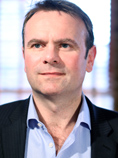 Article courtesy of FECIF
Article courtesy of FECIF
Written by
Paul Stanfield
Chief Executive at FEIFA / FECIF Secretary General
Discussion Dinner with Mrs. Alena Schillerová, Minister of Finance
ZOOM Unique Place, Prague Congress Center – February 22, 2018
On February 22nd more than 70 high level business women and men gathered to participate in the Round Table of Comenius – discussion dinner with the Minister of Finance of the Czech Republic. It is tradition that dynamic debate covered a range of topics from the minister’s agenda. The discussion was launched by Ministers´ short welcome address and traditionally concluded by the President of Comenius Karel Muzikář, who expressed his gratitude to all guests for a fulfilling debate and the Minister for her time and willingness to attend the discussion.
Ambassadors without diplomatic passport
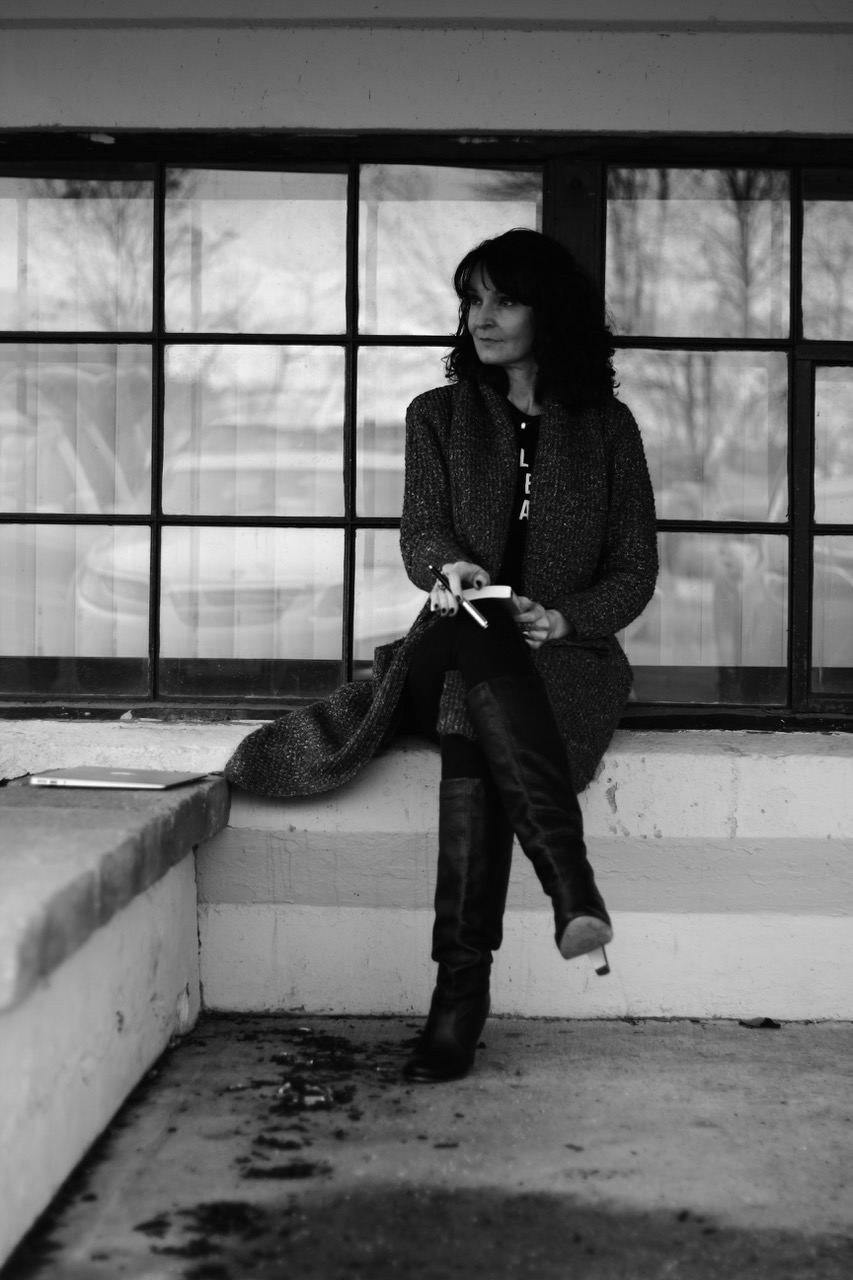
Dr. Miriam Margala enjoys a rewarding and eclectic professional career. She is a university lecturer, teaching academic writing, communication and philosophy of language.
A conversation with Miriam Margala on various things: global and local; economy, society, feminism and writing
How do you perceive today’s Czech and Slovak Republics?
Well – the situation is quite fluid, of course, due to current political upheavals in both countries but especially, right now, in Slovakia. Both markets are quite sophisticated – even if not big – the workforce is highly educated and skilled. Both markets are very nimble and agile, especially in terms of entrepreneurship, innovation and start up environment – as quite a long list of international companies setting up their operations in the Czech Republic or Slovakia proves.
I must be honest and say that the rise of intolerance and various extreme views in the two countries I see as very troublesome. Policies based on these views impede entrepreneurship tremendously, which stunts economy, growth and innovation. The region does not need more conflict – it should continue to grow its prosperity. The recent civic involvement and movements in both countries – but specifically in Slovakia – give me a reason to be optimistic. Of course, it is up to the citizens of each country to make sure that their prosperity continues. From my personal experience, which I can offer as an academic, I can say that it’s been great to establish, coordinate and collaborate on various international projects. Of course, the structure needed for a very efficient, smooth process is not always there – it can be at times a wild ride, but people we work with in both countries are very much interested in collaborating and try to do their best to make the process smooth. I would still claim that most people, both in the Czech Republic and Slovakia, are very much outward looking and progressive in their thinking. Of course, it remains to be seen where the current situation leads.
We both share passion in interviews and you also have become a contributor to the Czech and Slovak Leaders Magazine. How has the genre evolved and do you think that people still have time for meaningful conversations?
Goodness – to be meeting great, interesting people; to be able to talk to them, to discover what they believe, think, what makes them tick – is there anything more engaging? I am not sure whether the genre as such has changed. It allows you to be quite free. For example, I am not interested in dry, boring “question-answer” interviews. I enjoy a conversation – in fact, I am a contributor to different European journals/periodicals where my main contributions are interviews – but I prefer to call them conversations. I believe that to put together a good interview, it needs to show there’s a connection between the author/interviewer and the interviewee. It needs to draw in the reader – I want my readers to expect from the interview that they will really learn something new about the person being interviewed. Something should stay with them for a little while – to make them think, ponder, or maybe they discover something new, something that makes them question their own views, perhaps even helps them discover something new. My prep for every interview is detailed; I put many hours into research and then into questions. Then I put many more hours into editing – it’s not only the topics I want to cover; it’s also (as I have mentioned) very important that there’s a clear connection, a certain fluidity to the interview that makes the reader want to continue reading. If I can bring that to my readers, then I am satisfied.
You are publishing a book and preparing a book tour. Tell us more about it…
Yes – I am so happy about that. Actually, I have two books out now – one is part of a very popular and critically acclaimed series published by a US publisher. The book is a collection of noir stories from Prague that I translated into English. The entire series consists of noir stories from capital and large cities from all over the world. I believe the series has 40 or more books already. In Prague Noir, each story is from a different period and place in Prague. When, not that long ago, my family lived for a time both in Prague and Massachusetts, I actually translated some stories while staying in Prague, working in various beautiful Prague coffee shops – it was quite wonderful. The other book is on art and communication and I authored a chapter on art and entrepreneurship. It is a gorgeous book graphically – and I hope interesting topically! Thanks to the other co-authors (Drs. Jitka Cerna, Jana Bouckova, Olga Trckova) who became my good friends. The book is beautiful aesthetically thanks to Olga, a very well known gallerist in Prague, who chose all the art represented in the book. It was a whole lot of work, but it was great to work on both books. There will be a reading of Prague Noir in New York in May. The book on art, The Power of Communication and the Gallery, came out in the Czech Republic (in English).
What went wrong with feminism and diversity? According to the World Economic Forum statistics, it would take until 2186 to reach full equality. Moreover, the statistics in 2016 show a year to year decline. What can we do to make gender equality a relevant issue for the whole society again?
I would go further – relevant is not enough. It is urgent! This is such a dificult question – the complexity and detail it requires to answer it comprehensively and fully are impossible to fit into our interview. So I will give you thoughts as they roam through my mind.
Let me start with a few questions: who invented a mechanical dishwasher; an anti-derailment device for trains; windshield wipers; the first 100% solar-powered house, Kevlar; who discovered DNA double helix, developed stem cell isolation; or spread-spectrum technology that’s at the basis of all the portable devices we use today? All women – and this is a tiny portion of a very long list. Very few – if anybody – would be able to put names to these inventions!
This year at Davos, they put on a panel on equality and there was so much brouhaha about that. It’s a great idea, do not take me wrong – but do you know what the percentage of women taking part at the conference in Davos was? 21%. I’d say it’s shockingly low.
Do you know which country has the most women in parliament? Rwanda. Not that long ago, I asked a few of my good friends – senior men who either are, or recently have been in a position to affect somewhat public policy. They did NOT know – and were surprised. They, pondering the question, went through the “typical” examples – all the northern European countries. Then I asked a follow up question – do you know in which countries various policies aimed toward equality have not been as successful as expected? The northern European countries. And the situation there is, of course, much much better than in other developed countries. Our global awareness is not all that great and that is detrimental to any progress.
I wonder how many people know that February 11th is the International Day of Women and Girls in Science – has anybody noticed anything going on on that day this year? Maybe a token posting here and there, a token article on a not-so-busy website. But – everybody was bombarded with ads to celebrate and spend money on the de rigueur day of love (Valentine’s) – the cheesiest of them all. Instead of a whole lot of noise to support young girls and women in science – so very much needed because the stats are dismal – only the numbing and dumbing blanket Valentine’s ads. What we should do is to show a whole lot more love for and support to girls and women in STEM – and of course, generally and unceasingly but especially on a designated day.
Let me use more shocking stats – or, let me be more specific – shocking for women who live or were brought up in Europe. The percentage of women working in the US is 47%. Less than half! Compare that with the EU – almost 70% and my other home country, Canada, where it stands at 80%! I will admit that my shock was partly caused by the fact that we tend to enclose ourselves in our own silos – in my case, that’s academia which is not your usual working environment. It is a very international place and (mostly – although not exclusively) – open minded, where curiosity (again, mostly) is tantamount to breathing; oxygen needed to live. A few years ago, I became involved with a non-profit organization based in Cambridge, Women Accelerators, where we promote advancement of women and address inequalities such as the gender gap, underrepresentation of women in various fields and leading positions, etc. I put together a panel of young women – all engineering undergrads. I asked them about their background and family support – not ONE of them said their mother was their example! I diplomatically furthered this conversation to figure this out – and discovered that all of their mothers were housewives. The moment they married their fathers, they became homemakers. Some of their mothers were college educated – one had a PhD degree. I asked why their mothers decided to become stay-at-home moms/wives. These young women answered in unison something along the lines of “it was, I guess, easier – they took care of us and Dad was the one making money”. I was stunned – but I also realized how isolated I was in my silo with other highly educated women; working while having children. These young women have as their examples their father and other women, not their mothers. I prefer to be the example to my son and daughter, along with their father. We talked about this, Linda – the two of us are women who support their husbands and are supported by their husbands (as is the case in other marriages, of course). We work every single day – while making sure our families are taken care of, both of us make sure of it – us and our husbands, fathers of our children. I want my children to see this respect, mutuality, both their parents working – realizing their potential, having satisfying jobs, careers through which they can affect change.
But because this is the United States, it gets more complicated. There are women who choose to stay home because they can afford it – and then those who have no other choice especially when they have children. Child care is prohibitively expensive in the US – and many women simply don’t have the choice to work and develop their careers. There are also those whose child(ren) may have a condition or illness and in order to take care of the child, the mother has to stay home (again, health care is extremely expensive). This is very complex and complicated – do note how it is almost always the wife/mother who stays home because they’re the ones making less money. It all comes back to the issue of equality. We must be honest and make sure that we talk about women who stay home because they have NO OTHER choice, not because they can afford to stay home because their husbands make a lot of money. Of course, I am sure there is a percentage of women who decide to stay home because they find it fulfilling – some of them volunteer in their communities so much that it pretty much becomes their full time job. I do not believe that this discussion is as honest as it could be. The stats would be more helpful if we had separate numbers for these different groups of women so that we can better understand what possible cultural, traditional or societal reasons there are for such a low employment of women in the US. I also believe that there’s far too much complacency. I’ve termed it “institutionalized complacency”. It can be pretty bad – an institution comes up with a policy, looking great on paper, making waves – becoming mesmerized by watching these waves…but eventually, they spread further and further, disappear completely and all we have left is an unchanging surface. We cannot see any change – but there’s always talk about all the implemented policies. Oftentimes, it takes on the form of self-congratulations – I dislike that extremely. The work we do for women through Women Accelerators does not allow us to become complacent or to self-congratulate ourselves because we pretty much walk in the trenches (all the self-congratulating policy makers should try that!) all the time, interacting with women who face hard challenges every day. We cannot afford complacency. On the contrary, only sincere concern can lead to meaningful and lasting changes. The cost of complacency and passivity is enormous – as the current dismal stats show.
I strongly believe that unless all of us change our attitudes, unless we all realize the urgency of this systemic and systematic injustice, we cannot expect much change. I believe we need men on our side – I am so lucky to have a husband and a son who are the best examples of feminists (equality and justice have become my son’s main concerns in his choice of education and future global work/career, I am proud to say). It is fundamental that we teach our children, sons and daughters, that we are all equal. That is a complex issue in itself – research shows that the support in elementary and middle schools for girls in terms of STEM education is essential and critical – this is where we are losing most girls. Those who persevere do not find the educational or working environment always supportive at other different levels, which leads to more losses. There has been some research conducted – but unfortunately, we have not seen any earth shattering results yet. In fact, as you Linda mention in your question, the numbers have gone down.
Another problem is that many become cynical upon hearing the word feminism. Its definition is so very simple: the belief that women and men should have equal rights and opportunities. Women constitute, roughly speaking, half of the global population. Let’s ignore the most blatant fact – that it is a human right for every woman to be equal legally, socially and in every other way to men. But – since economy moves this world – it is a fantastic resource of great economic power, all of us, women! How ignorant and unintelligent are those who have not realized this simple fact. But that’s because – let’s be honest – even the most developed countries do not pay much attention to educating their young people about all that women have achieved throughout history, despite their terribly difficult position. If anybody knows anything about perseverance and incredibly hard work, it is us, women.
Last, but not least, we must be honest and realize that internally, we can become rather disjointed. I fully realize that because of innumerable issues – in every aspect of life – in terms of progress for women an addressing the gender gap – it is not easy to have one streamlined, tidy movement. There are different movements, different organizations based on different matters, professions, interests, health issues etc. But we must make sure we are inclusive – and while we all can choose what specific issues we want to be engaged with, we should always be ready to support each other. And we need to make sure we get all the men who are on our side to work with us!
I absolutely believe that without all of us realizing the urgency of the situation, without understanding the history – at least some understanding of social and political causes of our terrible current status quo – and without being globally aware of women’s issues we cannot expect much change. It takes plain doggedness, resilience, hard work. I also believe that there cannot be effective, lasting and meaningful change if it comes only from institutional and /or governmental policies and regulations. We must change attitudes. Fairness, justice, inclusiveness and respect should be invited and supported by ALL members of our society.
So – how to get back on track, to see progress in terms of women being equal and having equal access to opportunities? I think it’s naïve to hope for a sustained, smooth progress. We have our differences – cultural, social, political and individual. We can institute policies – and we should, of course. But if that becomes just an exercise in checking o boxes on forms and reports – that is not enough. Our attitudes must change. And our expectations – we must expect all to respect women and treat them equally to men. That takes a lot of work, education and staying power. And you, Linda, and I both know that women are exceptional at demonstrating staying power. And unceasing will to go on, to communicate, to network, to listen, to state our goals clearly, to explain, to fight, to argue, to ask questions, to educate, to learn, to admit mistakes, to identify injustices, to look for the most effective ways to affect change, to be aware of global issues, to connect with others, to look out for each other. Let us never become complacent or too satisfied with our own work.
As one of my favorite writers, Zadie Smith, says: “Progress is never permanent, will always be threatened, must be redoubled, restated and reimagined if it is to survive.”
By Linda Štucbartová
“Values and Meanings in Politics”
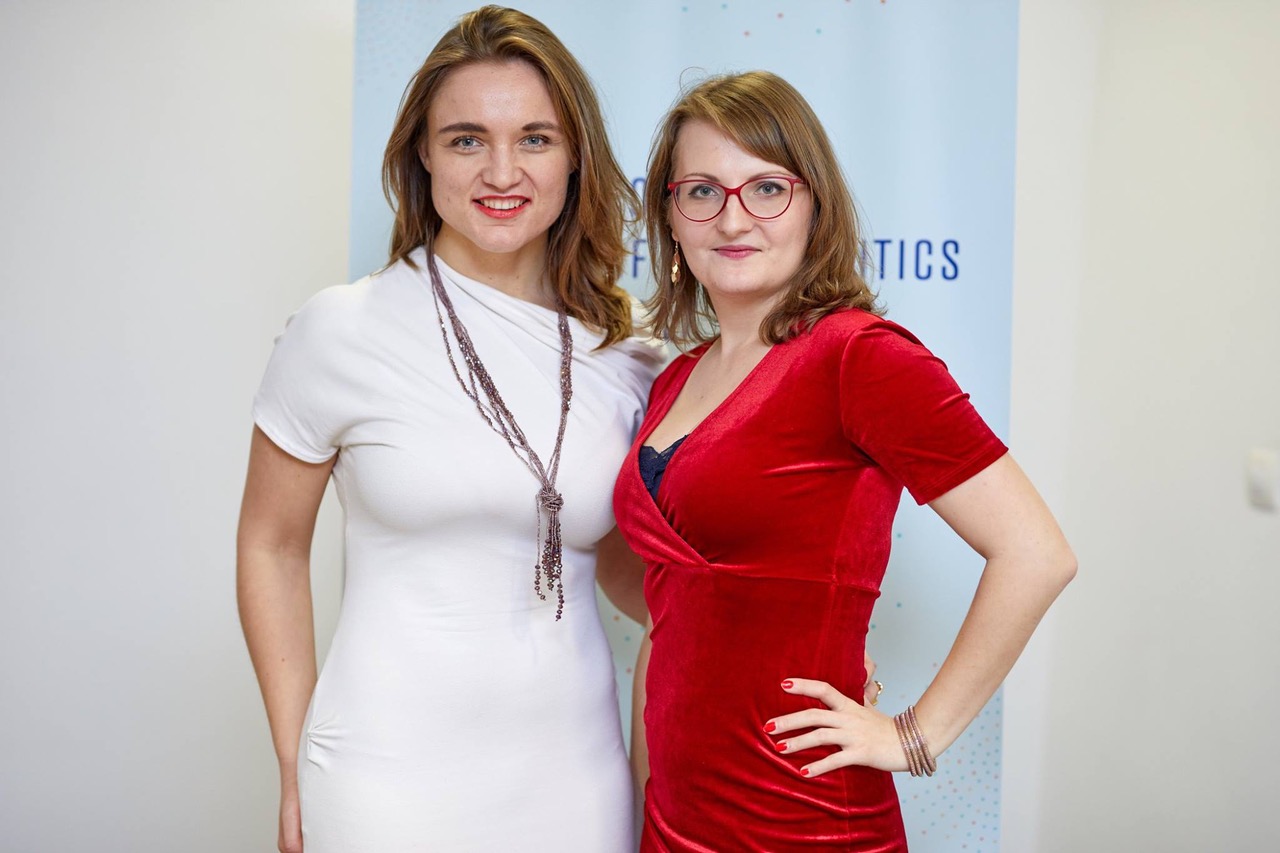
Andrea Tittelová, Founder and CEO of Youth Politics Education and Co-founder of Forum Dobrej Politiky with Lubica Ragulová, her business partner and co-founder of Youth Politics Education
Andrea, I have been nostalgically remembering Czechoslovakia as one state. You have not lived during these times. How do you perceive the Czechoslovakian past and how do you perceive Czechoslovakia nowadays?
I saw an image of Czechoslovakia through the lens of my grandfather who was a politician in the Dubcek era and afterwards I was taught about mementos of Czechoslovakia in the context of the Velvet Revolution… the memory of two countries which wanted to stand on their own and show their statehood. Nowadays, Czech Republic occurs to me as a country where entrepreneurship is greatly increasing and innovations are present. On the contrary, the political situation shows the huge polarity of the nation. Czech Republic strikes me as a dynamic country and Czechs, as the nation demonstrates, very creative. In May 2018, we are preparing a Day on Innovative Politics in Prague and while organising this event, I can really feel how open and flexible the Czechs I work with, are and do behave. Additionally, civic society protests against the mandate of Mr. Ondracek have shown the deeply rooted legacy of Vaclav Havel in Czech Republic even after so many years of progress and development.
Czechs and Slovaks tend to compare one to another. What could we learn from one another?
I see that Slovaks are mostly driven by competitiveness once being in the presence of any Czech national. We do take different reactions and approaches when we, Slovaks need to cooperate with Czech colleagues. I will point out one thing: the thing that Czechs could learn from Slovaks or get inspired by is to show more emotions in their decision processes and in the way they pursue collaboration. The Slovaks can get inspired from Czechs from their drive, innovativeness and creativity.
You are organizing a conference on Innovative Politics in Prague in May. This conference will discuss new technologies, enlarging engaged groups and finding new answers to current political challenges. What is the main aim of the conference?
Innovative politics 2018 is an event where people who have contributed to policy changes in their respective countries exchange their ideas and improvements they have made in the area of public politics or citizens’ initiatives enhancing the changes in the sector of politics and policy making. We see that the current state of politics and the way of policy making isn’t currently based on innovation, the needs of the citizens, or grass root initiatives. We see that the world of business and start-ups has increased in innovation and the sector of politics and policy making risks being left behind. The intention is to open the space for debate about innovative approaches in politics and policy making. We will bring people who are in action in different countries in Europe who have demonstrated successful grass root approach. We are looking for new approaches to policy making that can bring positive value and directly influence the quality of life in our region. We are bringing the people who have taken their stand for innovating the public sector and policy making and have demonstrated this new way in their respective countries. The criteria is to bring and work with the people who have driven large scale innovations for this sector.
You proudly describe yourself as the ambassador of women and young people in politics. What is the achievement you are most proud of?
I am honoured we were selected among semifinalists of Forbes 30 under 30 Europe in the category law and policy. I am proud of the legacy Youth Politics Education has left in Slovakia from the 4 years of its existence. We have managed to deploy many of our students of Youth Politics Education in Slovakia, in Switzerland and also some of our alumni ran their own campaigns for the municipal elections in 2017. I feel proud that YPE, through collaboration with Dialogue, (Centrum Dialog, a non-profit collaborative which was instrumental in creating the National Values Assessment), have managed to make differences in society by organising the Forum of Good Politics. And I feel proud to be the ambassador and the speaker of already 3rd Constellation Summit 2018 organised by Global Institute of Extraordinary Women.
Besides politics, you are the proud owner of a winery. What has wine-making taught you?
To understand the Discipline. I found real love for the soil in the vineyard. If you decide to postpone some small thing in business it might have a big impact, but also it could have no impact. But if you break the rhythm of the vineyard, the rhythm of nature, the rules when to cut the branches, when to seek out the parasites and when to protect the branches with pesticides, you can lose all of your fruits and you will not produce any wine in a specific year.
Your final words for Czech and Slovak Leaders Magazine readers…
I am an advocate of consciousness and femininity in politics and public administration. I believe that our future will depend on three key principles: dialogue, the ability to listen, and collaboration. I believe that the principle of feminine energy present in national governments and in society, and collaboration between men and women will lead us to wealth and peace in the world. I believe also that taking a stand for something will be the vehicle for societal changes. As one of my role models Lynne Twist says “When you take a stand, it actually does shift the whole universe and unexpected, unpredictable things happen.”
By Linda Štucbartová
Experience Great Britain 2018 – visitors had a chance to get some of the experience of visiting Great Britain without the trouble of taking a trip. Malostranské náměstí in Prague transformed into a British Market on Friday, March 23, 2018.
This video is produced in cooperation with www.praguemorning.cz
For British & Irish bars in Prague visit prague.tv/Restaurant-Guide-Prague
For shopping, events and more visit prague.tv
Joins us also on:
Facebook: www.facebook.com/prague.tv
Instagram: www.instagram.com/prague.tv
Google+: plus.google.com/+PragueTvnews
For more events in Prague, visit Prague TV’s English-language guide to the biggest and best happenings in Prague over the next few weeks. From theater, exhibitions, and gigs, festivals and comedy shows, if it’s new, it’s here – go on, dive in! For bars, clubs and more please visit our Nightlife in Prague section.

Over-regulation of financial services in the European Union is a well-recognised fact, even among the bureaucracy in Brussels. The key feature of all those MiFIDs, IDDs or GDPRs, however, is not its devastating effect on the (small and medium-sized) businesses themselves, but its detrimental cost to the customer. It is here that hope resides. Hope that the savage regulatory movement will be stopped and reversed; by the man and woman in the street, should the whole circus get too costly for them. So, how much does the regulation really cost and where is the breaking point?
First, there are explicit costs. The direct amount of money your asset manager, for example, has to pay for new compliance officers, lawyers´ invoices and paperwork. These costs will often be intentionally underestimated by the regulators. Such as it was with the Czech transposition of the IDD directive, which claimed that “additional costs are fully appropriate when compared to industry earnings”. Mind you, this assertion is related to law with about ninety new paragraphs (!!!). But you, dear customer, should not be fooled by such commentaries – because in the end, YOU will pay all those costs, which will translate into your fees and charges.
Then there are implicit costs. Less visible, intangible “payments” related to market distortion caused by (over)regulation. Maybe the most important example: as the industry barriers and fixed costs begin to raise, because of new exams, codes of conduct etc., small and medium enterprises will be slowly pushed out of the market. This is no sci-fi, as the post MiFID II apocalypse on the German market already shows. What will the remaining market players do, after their smaller counterparts are gone? Yes, they will increase prices and margins. Again, this means higher fees and money lost. Your money.
Both implicit and explicit costs are often not reflected by the regulators in their cost-benefit assessments. This is done intentionally, as correct evaluation would totally prevent many colossal regulatory changes from happening. Nevertheless you, as the customer in the centre of things, should always account for the price of the protection that you are forced to enjoy. You might hear the argument that the fees are not raising, instead they are pushed down by disruption and technology changes. But without the regulation costs, they would decrease even faster. How can we determine that? Just create a price differential between a fully regulated service, such as a regular taxi, and its non-regulated disruptive counterpart – let us say Uber. In my home city of Prague, where the border between regulated and not regulated at all is almost perfect, Uber prices stand at about 35 – 50 % of the regulated taxi services. Yes, those services offering full regulatory protection will be happily avoided by masses of people migrating to Uber.
Of course, we can argue that asset management or life insurance is not like taxi services. Sure thing, but this example gives us an idea of what the “higher good” enforced on everybody by our regulators is worth. Coming back to the hope, mentioned earlier. That, in my opinion, resides in education of the general public about the costs imposed on them not by business itself, but by the regulatory “solutions”. People are sensitive to price even with structured products like funds, which the boom of ETFs shows. If we are able to explain that their money is wasted on inefficient paperwork and red tape, the change of course might be achieved. Is this doable? My colleagues at FECIF and I believe so.
Hence, the prime task for our advisory community is at hand.

By Jiří Šindelář, Deputy Chairman of FECIF
Source: FECIF
28th February, Hilton Prague Old Town
Photo: František Gela

Have you been at your job for longer than you ever imagined? Most people with long careers have changed several jobs, moving up the ladder and sideways, chasing their dream position, office or team. You spend a third or more of your day at your job, so it’s quite important that you are satisfied with it and that you feel good while doing it. But if you’ve had a worm in your head for a while, telling you that you should look at a career change, these are the signs that will confirm your suspicions and help you let go:
Obligation as the main motivator
If you are constantly talking yourself into staying at your workplace because you can’t imagine how your team, work group or department will cope without you, or because you’ve been with the firm for a long time and feel like you owe them to stay, you should probably leave. As much as we like to think so, nobody is indispensable, and if your team was working well before, they will work well with a new member as well. And as for the company, you have given them all you have for all the years you’ve been there. No matter how well you know your boss and how many times you’ve been employee of the month, you should never feel like leaving the company is not an option. And if you like your company, but aren’t happy with your position, you can start negotiating about moving to a different job within the company.
You feel like your skills are underutilized

If you are giving your all to your job, meeting the quotas and requirements with ease, but still feel like you are not reaching your maximum potential, there’s something wrong. Perhaps your skills were a perfect fit for the job when you started, but as you’ve improved, you’ve outgrown your position. You can try modifying your work so it is more challenging (with the compensation to match, of course), or seek a job that will make you dust off the gears in your head. A job that doesn’t push you to learn more and become better is not a job you should be doing.
You’re scared of not finding a new job
People often stay at their jobs for much longer than they should out of fear that they won’t be able to find a new job quickly enough, and that their savings will run out. But that isn’t something you should be afraid of. You can start to work from home and earn money online while still at your job to increase your savings, and have something to fall back on through the period of finding a new job. There are plenty of jobs you can look at that have flexible times that you can fit into your schedule. Or, you can start searching in advance, and not quit your job until you’ve found a suitable replacement.
You don’t feel motivated or happy

Remember your first day on the job. You were probably quite nervous, but also excited. And as time passed, your nerves calmed down, but your motivation and hunger have remained, and maybe even grown. But if you don’t feel that motivation anymore, if you wake up in the morning and go to work just because you have to, then it might be time to admit that your job doesn’t bring you joy. And as they say, life is too short to do a job that doesn’t make you happy.
Your environment is toxic
Doing the job you love doesn’t mean much if you are in an environment that doesn’t make you feel good. If you greet your coworkers every morning thinking that you’d rather see anyone else in the world than have to sit with them for another day, you are not in the right place. Having people whom you can rely on, whom you respect and whom you enjoy working with is crucial for your happiness and productivity. No job is only done in a single company, and you can find a job in your niche in a company where you will have colleagues that suit you better. And if you simply don’t enjoy working with other people, you can try working from home or finding a place where you can work from your own office.
Quitting a job is never easy, but when you start putting your health, happiness and success first, you will see that you have a lot more to gain than you’d ever have to lose, so think long and hard, and then make the best choice for yourself.
By Peter Minkoff
Peter is a lifestyle and travel writer at Men-Ual magazine, living between Ústí nad Labem and Antwerp. Follow Peter on Twitter for more tips.
Last week we talked about adding an element of surprise to your presentation. A technique that is very effective because it helps your audience remember what you said and makes them more likely to act on your message or change their behaviour
In today’s video – the second of this three short video series on making your presentations more memorable, I’ll show you another technique: making your idea tangible. Here’s how:
Try it and see for yourself how effective this technique can be. Remember, if you want your ideas to persist, you need to make them memorable.
Have a lovely week and I hope to see you soon again!
Life Is Beautiful
Part IX: The Power of Gratitude [1],[2]
“In the universe there is an immeasurable, indescribable force which shamans call intent, and absolutely everything that exists
in the entire cosmos is attached to intent by a connecting link.”
—Carlos Castaneda

James A. Cusumano, PhD; Chairman Chateau Mcely s.r.o. Prague, Czech Republic
Gratitude is the one thing you need in your life for both personal and professional fulfillment. As the mathematicians would say, it’s both necessary and sufficient to achieve happiness and success.
Short-Term Happiness
Everyday I try my best to achieve a reasonable balance of body, mind and spirit, but some days just don’t easily slide into that comfort zone even though I rise early, exercise and do my daily meditation. Some days there’s a persistent edge that just doesn’t want to go away. But, I’ve discovered a game to play during the 20-minute drive from my home in Prague 6 to my office in the Old Town. I call it Be My Guest, and it does the trick every time.
Here’s how it works. As I’m sure you have observed, early each morning there are numerous people rushing in stressed-out mode to get to work, school or somewhere for which they have overestimated its importance. They often do this to possible peril to other drivers and pedestrians. Cars and trucks speed precariously in and out of traffic lanes, people jaywalk across busy streets to catch a tram or a bus, cars cut rapidly in front of you to make their turn before you make yours, even though you have the right-of-way. They seem to be afraid to stop. “Oh my God, I might lose 10 seconds”— and so the morning goes.
One day on my way to work, just for the fun of it, I decided not to compete with these folks. In fact, I decided to help them achieve their goal. So, every time I saw a stressed-out driver or pedestrian putting their future at risk, I helped them do their thing by blinking my headlights with the signal to Be My Guest. Almost always, I received a “Thank you,” and thus for both of us, a small sense of gratitude. It felt good, so I did it again and again and each time I felt better and better. Wow! I had discovered that gratitude is cumulative! My day was saved! I felt rejuvenated, creative and excited to get to my projects at the office.
What’s going on here? I had discovered a way to achieve short-term gratitude and happiness. I did something heartfelt for someone who was not expecting it. They felt grateful and expressed their gratitude with a smile, an earnest wave of their arm, or even a shout of “Thank you (Figure 1)!” That message touched my heart and guess what, I felt grateful, pleased and happy. This game became so exciting and satisfying that I began to search earnestly and sometimes desperately for someone to help!
Mind Games
That’s one of my ways to create short-term gratitude and happiness. But, how can we achieve long-term gratitude, fulfillment and happiness? Before I address this, let’s take a brief look at the human mind and how this short-term gratitude game works, or doesn’t work.
The mind can be divided into three parts, the conscious, the ego and the subconscious. The conscious is that part which you use to actively think in real time. It’s analytical, seeks solutions to all kinds of issues, but surprisingly, has the least impact on your life’s outcome.
The subconscious, on the other hand, has by far, the biggest effect. It has a huge capacity and is filled with all kinds of instructions, programmed mostly by others since your birth, and perhaps even before then.
Many of these instructions may not be in alignment with your basic values—namely, the rules of conduct by which you wish to lead your life. However, you follow them automatically because the subconscious is an effective source of social and cultural hypnosis. The good news is that as human beings, we are the only species on earth than can reprogram the subconscious, should we choose to do so in order to follow those values we truly believe in. This is most effectively done through the process of mediation.
Meditation is the best way to manifest your deepest desires. By changing your thoughts, beliefs, expectations, attention and intentions and connecting with stillness, you enable the unbounded, unlimited abundance of the universe to flow effortlessly into your life. In meditation you harness nature’s flow of energy, information, and intelligence to change your life.
The third part of the mind, the ego, is a valuable element for our personal progress and growth, but more often than not, it is highly competitive and worried about the “me”, the “my” and the “mine,” as opposed to the “you,” the “your” and the “yours,” or even the “we.” This is known as psychological Dualism.
Focusing on these three parts of the mind, there is only one thing that shuts down our access to both short-term and long-term gratitude and happiness and that is fear. Fear closes our access to the forces, knowledge and bene ts of the Cosmos. The following commentary from my book, Life Is Beautiful: 12 Universal Rules¹ is relevant here.
You always attract what you fear, and that which you fear the most, comes swiftly to your doorstep (Figure 2). The reason that you fail when you have fear is the very same reason you succeed when you assume that a desired outcome has already happened. Fear induces all of the physical, emotional, spiritual and psychological feelings you need for a negative manifestation. Fear is a powerful paralyzing force. It has the ability to rapidly move through all ve stages of the manifestation process.
In my opinion, there is only one counter force that can completely erase the presence of fear, or help you make any critical change for that matter. It’s the energy of unbridled passion. This creative force is so powerful that it evaporates fear from the deepest level of the human spirit and can literally change the world. It has done so many times before.²
I will discuss how to create this passion-induced fearlessness in a moment, but first let’s look briefly at what happens when fear shuts down your access to gratitude and a sense of happiness.
I will use the Be My Guest game and turn it around 180 degrees. Let’s say I’m driving down the hill from Prague 6 towards the Malá Strana right turn, but I’m going to turn left towards the embankment. I see cars coming towards me that signal their desire to turn into Malá Strana. But without a conscious acknowledgement of the fact, my subconscious has indoctrinated me over the years that this is a competitive, dog-eat-dog world. I listen to it carefully without consciously knowing I’m listening, “Don’t let those cars in; besides, you have the right-of-way.” Without thinking, I block them from turning and then comfortably make my left turn. How do I feel about that? If I’m truly honest—not very good.
Or, perhaps there’s a group of pedestrians rushing from the Malá Strana metro exit and want to walk in front of my car to catch their tram so they can get to school or work on time. However, my ego reasons,“No way, they’re not in the crosswalk and that would be illegal, so why should I help them.
I’ll teach them how to do things right!” So I speed up and don’t allow them to cross. They miss their tram. I rationalize, “Well, it’s their fault!” But, deep down, how do I really feel about what I’ve done?— not very good.
In both of these cases, fear has ruled my decision and robed me of moments of happiness. In the first case, I’m operating under a set of rules that were ingrained over the years into my subconscious by others, rules that I may not even believe in, yet my subconscious induces the fear of breaking these rules. However, if I no longer believe in them, I can reprogram my subconscious.
In the second instance, my ego justifies my decision because it feels, “I am better than those people; I’ll teach them a lesson for trying to break the rules!” The ego runs on Dualism.“This is mine; that’s yours. This is me; that’s you. We’re separate in this competitive world. You’re my opponent; no way I’m going to help you!” This too, can be reprogrammed should you choose to do so.
These are just a couple of perhaps exaggerated examples of what can happen in our chaotic world and how handling them one way creates more internal tension and in another way, happy moments and the beginnings of a great day!
For me, a sense of gratitude and happiness beats stroking my ego or following rules I don’t believe in. There’s really no contest!
Long-Term Happiness
In all my life, I have found one path to long-term happiness and fulfillment, and I have discussed this path in great detail from complementary points of view in my books, BALANCE: The Business-Life Connection³ and Life Is Beautiful: 12 Universal Rules.4
The journey goes something like this. Like any normal, healthy person, you came into this world with something special inside you, something you’re really good at; probably better at it than many of those around you. It might be in sports, the arts, the sciences, leadership, and any of a host of other categories. I call this your fundamental ESSENCE. This will never change and no one can ever take it away from you.
At some point in your development, if you identify this skill and use it to address an important challenge that could make the world a better place, even a little bit better, and you pursue this possibility, while maintaining your personal values, you will have found your PURPOSE for that segment of your life. And by the way, it’s never too late to do this. Ray Croc, who founded McDonalds didn’t find his PURPOSE until he was in his 50s.
When you find your PURPOSE, it will ignite a huge level of PASSION. You may not be able to think about anything else for a time. This PASSION will give you high levels of ENERGY, both physical and emotional. The ENERGY will connect both the left and right hemispheres of your brain, enabling you to navigate rapidly between your creative “right brain” and your analytical “left brain.” Unusual CREATIVITY will result and you will find you can solve challenges you never imagined possible.
Meeting some of these challenges will inevitably result in some form of INNOVATION—bringing something new, creative and valuable to a relationship, to a project, or to the marketplace. You will have accomplished something that others have never done before.
As Nobel laureate, Albert Szent-Györgyi once said, It will be because you were, “Looking at the same thing as everyone else, but thinking something different.”INNOVATION always brings REWARDS. They may be financial, psychological, emotional, spiritual, or some combination.
Now here’s the punch line; those REWARDS always provide a deep sense of GRATITUDE, and this kind of GRADITUDE always results in long-term FULFILLMENT and HAPPINESS (Figure 3).
As you move into that place of gratitude, you will feel a kind of warmth in your heart. Your ego will quiet down, enabling you to enjoy greater love, compassion and understanding. It’s one way to invite more goodness into your life. It’s like saying to Cosmos, “Please bring me more of this!”
So the next time you’re driving to work, or anywhere for that matter, try the Be My Guest game. You may be surprised on how it makes you feel!
Sat, Chit, Ananda! Enjoy your journey, make a difference!

[1] EDITOR’S COMMENT— This is the 9th article in a series based on the author’s book, “Life Is Beautiful: 12 Universal Rules,” Waterfront Press, Cardi California.
[2] The author may be reached at Jim@ChateauMcely.Com.
References:
1. James A. Cusumano, Life Is Beautiful: 12 Universal Rules, Waterfront Press, Cradi -by-the-Sea, California, 2015.
2. There is one possible exception to this. There are some spiritual tradi- tions that maintain that learning to stay calm without judgment during a state of fear is the eventual path to true awakening. See for example, When Things Fall Apart: Heart Advice for Di cult Times by Pema Chödrön, Shambala Press, Boulder, Colorado, 2016.
3. James A. Cusumano, BALANCE, The Business-Life Connection, SelectBooks, New York, 2013.
4. Op. cit., Reference 1

Random acts of kindness create instant gratitude in those receiving these kind acts. They can’t help but return their gratitude, which creates moments of happiness in you.

You always attract what your fear, and that which you fear the most, comes swiftly to your doorstep.

Like every normal, healthy person, you came into this world with a special gift. It’s your ticket to long-term fulfillment and happiness. So, dig deep; find it and use it!

Women in leadership is a rising topic. At the World Economic Forum (WEF) in Davos in January, the number of attending women was up to 21 percent and all seven Co-Chairs were female, as CNBC stated.
GIVE VOICE TO GLOBAL FEMALE LEADERS
However, the number of women in leadership positions is still increasing too slowly. Hence, most respondents to business/economic studies tend to be male. In cooperation, the Global Female Leaders with KPMG International and KPMG in Germany have decided to conduct the study Global Female Leaders Outlook (GFLO) in order to prioritise – for the first time on a global basis – the views of female leaders. The questionnaire is based on the KPMG International “Global CEO Outlook” to directly compare male and female perspectives on economic, business, technological and leadership issues.
JOIN THE STUDY!
We would like to invite you, as a female leader, to participate in this study. The questionnaire takes approximately 20 minutes to complete. All responses will be anonymised and treated as strictly confidential. Be part of an international and female based study – we want your voice!
Please send an email to Lisa Schachner at Globalsummits@managementcircle.com to receive a survey link.
The results will be released at the Global Female Leaders 2018. We are looking forward to this first-time study and are pleased with your support. See you in Berlin on June, 3rd at the Global Female Leaders 2018!
Guest of Honor: Ivan Pilný, former Minister of Finance of the Czech Republic
Topic: How to survive in digital economy
Opening ceremony in the MIRO Gallery Prague 18. 1. – 31. 3. 2018
Sounds familiar?
You’ve been waiting for this opportunity for ages and finally, it’s here! They invited you to address senior management and present the innovation project your team has been working on intensively for the past 8 months. How exciting! The idea is brilliant and it can revolutionise the industry.
On the day, there are several other presentations by other colleagues from your company. In essence, your project is in a competition with theirs as not all projects will get funded. When it’s all over you’re relieved and reasonably satisfied. You spoke with ease and confidence, and even managed to fit your presentation within the allocated 20 minutes. They said, they’ll come back to you within a week…
A week has passed and you’ve heard nothing. Second week… nothing. Third week…you bumped into one of the managers in the hall. You couldn’t help but ask:
“So, what did you think? Are we going to get some budget to kick this off?”
“Oh”, he said, “could you remind me what it was all about?”
“Yeah, that microchip which…”
“Uhm, not sure I remember exactly, let me look into this once again…”
How frustrating!
Has anything like that happened to you? That you spent weeks or even months developing an important concept, you presented it and didn’t get the reaction you expected? What’s more, people couldn’t even remember what it was all about…
I’m afraid this happens (a lot!). And we can blame the “others” all we want for not paying enough attention but the truth is this. In our information-overload age it’s increasingly difficult for people to stay focused on what you’re saying let alone remember it! And if we don’t put extra effort into helping people remember our ideas, the likelihood is, they won’t. And that’s a problem. Because we cannot expect people to act or to change their behaviour, if they cannot even remember what we said…
So, if you want your ideas to persist, you need to make them memorable. Here’s my own ideas to make your ideas more memorable in presentations and business pitches 😉
(Another wonderful resource that I can highly recommend on the topic is a book by the Heath brothers “Made to Stick”).
By Alena Huberová

The majority of people live really fast these days, having almost no time to stop and think if they’re really happy or not. If you’re one of those people, then you’re at the right place. Here are four useful tips on how to make yourself happier every day, so check them out and make that happen!
Just stop complaining
No matter how liberating it may feel at that particular moment, the fact is that complaining can be a double-sided sword simply because the more you complain, the more annoyed you actually become. Talking about things that make you nervous, angry, or scared is highly likely to make you feel even more nervous, angry, or scared, so be sure you stop paying that much attention to bad things and start noticing the good stuff. Boosting your long-term happiness can be a long process, so be sure you stop complaining and you’ll make a great first step. If you keep track of bad things only, the only input your emotions receive will be negative, which is why you can end up in an enchanted circle, not being able to feel and think positive.
Embrace healthy lifestyle habits

You’ve probably already heard that you are what you eat, so give your best to embrace healthy eating habits and you’ll see fantastic results in no time. First of all, you should stay away from processed foods that are rich in artificially added sugars, flavor enhancers, and empty calories, as these can bring more harm than good in the long run. Instead, turn to homemade meals and be sure you eat enough fresh fruits and veggies that are enriched with required vitamins, minerals, and antioxidants. Besides that, you should remember not to skip your breakfast, as this meal is the most important one throughout the day. If you skip it, you’re highly likely to indulge in delicious yet unhealthy fast foods later on, which can be really bad for both your health and your waistline.
Start working out regularly
Everyone knows that physical activity is highly recommended, but did you know that it can actually make you happier? Well, dopamine is known as a chemical that plays a huge role in our happiness, and it’s basically a neurotransmitter in the brain that’s responsible for pleasure and happiness. The fact is that we lose our stores of dopamine as we age, but there are still ways to increase it – and exercising is one of them. Working out on a daily basis can increase your dopamine production and, therefore, make you feel a lot happier, which is exactly what you should go for, no matter how tired you may be after a long day at work. However, if you aren’t a fan of crowded gyms and too many people in one place, you can always get quality gym equipment and start working out in the comfort of your own home. Trust us, it really works, so give it a try and you won’t regret it!
Establish your ‘me’ time

Having at least half an hour a day just for yourself isn’t a luxury – it’s actually a bare necessity which can make you feel inexplicably better, even if you found yourself in conflict with your coworkers or had a fight with your partner. However, a lot of people (especially mothers) find it really hard to make that happen, simply because they think others would see them as selfish people who take care just of their own needs and wishes. This is everything but true, as establishing your ‘me’ time can help you relax and unwind by doing what you love most – listening to your favorite music, reading a book, watching a movie, or taking a long walk. Just remember to always put yourself first, because the people around you will be happy only when you’re happy in the first place.
As you can see, there are a lot of great ways to make yourself happier on a day-to-day basis. You’ll see a magical improvement once you embrace healthy eating habits, start working out, establish your ‘me’ time, and stop complaining, so be sure to take one step at a time and you’ll see what we were talking about.
By Peter Minkoff
Peter is a lifestyle and travel writer at Men-Ual magazine, living between Ústí nad Labem and Antwerp. Follow Peter on Twitter for more tips.
By Adam Lewis

3D visual of a humanoid robot pointing/touching the screen
Commercial applications for artificial intelligence (AI) and robotics are on the rise, but is the sector offering very real investment potential or is it still the stuff of science fiction?
The recent release of the long-awaited sequel to Ridley Scott’s 1982 sci-fi classic Blade Runner has brought the far-reaching potential of AI back into the spotlight.
While we might not yet have reached the stage depicted in the film, where we need sophisticated machines to tell replicants and humans apart, robotics technology is expanding at a pace and fund management groups are getting in on the act.
In the past 12 months alone, three new funds have come to market, with Axa launching a Robotech fund in December 2016, Smith & Williamson unveiling a global thematic AI fund in July and, most recently, the October launch of the Polar Capital Automation and Artificial Intelligence Fund.
These funds follow on from the launch of the Pictet Robotics Fund in October 2016, and aim to capitalise on the growth of an industry expected to expand four times faster than the global economy in the next decade.
Are fund buyers and managers buying into the concept, or does the concept of making money from robotics and AI remain the stuff of science fiction?
Explaining the rationale for launching the Axa Framlington Robotech Fund last December, manager Tom Riley says the group was first approached to launch a fund for Japanese investors three years ago.
“Ourselves and a number of fund houses were approached about a robotics fund but they were thinking about traditional robots, namely those that go into car plants and operate heavy machinery,” he explains. “We had a discussion that lasted about 12 months, where we tried to explain the benefits of a broader robotics strategy, before we finally launched the fund.
“This meant thinking about industrial automation, changes in transportation, healthcare applications – such as robotics surgeries – and the enablers of this technology, such as semi-conductors, software and sensors.”
For Riley, when people first envisage robotics they think about traditional robots that would lead to a narrow investment universe for such a fund. Instead he says they deliberately designed something broader, not only to give a larger opportunity set but also to help provide more balance to an investor’s overall strategy.
The result is that since the two funds launched (the former launched in December 2015), the Robotech strategy has accumulated assets of $3bn (£2.28bn), of which $350m is held in the offshore AWF vehicle.
Riley says the fund is a combination of a traditional global growth and a tech fund. While 45% of the portfolio is invested in tech companies, the remainder is in industrials (30%), healthcare (12-15%) and consumerrelated stocks that feed into the theme.
Rise of the robots
Are enough fund buyers convinced by this development and, if so, what is the best way to get access to the asset?
Adrian Lowcock, investment director at Architas, admits technology is currently in a purple patch in terms of innovation and development, which he says creates some fantastic investment opportunities.
Article continues here…
By Oliver Aziator

If you are reading this article it means you are directly involved in the world of internet, this wonderful innovation has made it possible to connect everyone around the world directly. Through this innovation, the most promising new disrupt technologies have emerged for the future; Thus, the world of the blockchain. It is right to ask if the blockchain technology is a disruptive innovation? why is this novelle technology pacing slowly? This because the technology has only reached the required level of maturity wide mainstream use. What is a disrupting technology? It is the one that displays established technology and revolutionizes industry or ground shaking product that creates a completely new industry.
Today disruption, change and competition dictate the new paradigm for the banking industry, the financial institutions are no exception to the dynamics of industrial advancement which is driven by a fast-growing cost and great pressure. The implementation of the blockchain influences a lot of stakeholders in the financial services which include customers, employees, shareholders, investors, suppliers, industry associates, education institutions, government and non-governmental organizations. The banking world is involved in quick changes of digitalization, a potential cost and labor-saving instrument, the prospects for the global finance market are so appealing that many major financial institutions are investing millions of dollars to research on what will be the best way to implement it.
The high-priced and opaque involvement of a third party in a transaction is the main problem that has been solved by the creation of the Blockchain due to one centralized shared database. In the past, it was impossible because every transaction requires communications between two single databases and thence another authorized controlling layer was needed. A simplified example of remittance can be used in espousing the concept lucidly, your relative who wants to Transfer money from another country to you, but before you receive the money it might take hours perhaps days for you to be able to receive the said money.
This is because transferring money involved some other parties who must authorize and control the transactions. That kind of frustrating and arduous processes get vaporized under Blockchain. The blockchain is a conceptually stored and synchronized distributed ledger that enables safe and transparent transaction across its networks. Every party involved has an identical copy of the shared ledger that is used to record and store information of the asset such as monies and properties.
Every change to the ledger will be synchronized and copied almost directly and transparently to the network where it will be seen as a block. The blocks are linked by cryptographically. An example to illustrate how this works is a situation where A wants to send money to B. The transaction is represented online in a block without a middleman. After the block is sent to every party on the network, approval is given by nodes to validate every transaction. If the transaction is approved the block will be added to the chain which revises the permanent and transparent records of the transactions Finally, the money will move from A to B and this is done in few minutes.
The blockchain network relies on the decentralized systems making it attainable for one person or group of persons to get in control of it. This safe and transparent transaction is facilitated through a decentralized system of the payment system which is allowed by the blockchain technology. Hereby staring in the era that extends beyond financial capital market, global payment, Corporate Governance social institutions and democratic participation Before Digitalization every action in the traditional banking industry had to be done manually. The industry has homogeneously surfaced centralized data stored and many intermediaries linked, this result to poor customer service through complex clearing processes, large amount manual inspections, leaking personal information and high costs.
The practice of keeping ledgers dates back in centuries, the blockchain story started in 2008 when an anonymous person or group of persons with pseudonym Satoshi Nakamoto published a white paper which proposes an Electronic peer to peer cash system called Bitcoin The blockchain was originally developed to support bitcoin but now it is used for more than thousand cryptocurrencies which resulted in a long trail effect.
The said technology can be used in so many sectors such as cybersecurity, supply chain, forecasting, networking, insurance, private transport, online storage, charity, voting, government, energy, online music, retails, health care, real estate, crowdfunding and identification As explained earlier the blockchain technology eliminates the involvement of a third party in transactions, or as prof. Anis H. Bajrektarevic coined: “Hegemony or hegemoney, a debtor empire/s’ fiat-papers.”
This chain is disrupting the banking industry as secured, cut cost, reduce delay and it is hugely efficient. Because it is decentralized and permissionless, it can lead to more disruptions in the financial sector, especially in payment clearing. Recently international organizations as well as developed countries and other countries have been paying close attention to the blockchain technology and are exploring their application in various fields.
For the financial sector, a number of the international financial institution have begun to formally plan for the blockchain technology since 2015, Goldman Sachs and other banking Giants have established their own blockchain laboratories working in close collaboration with the blockchain platforms.
Major Financial Institutions have a relatively positive attitude towards studying and improving the beck and processing efficiency of the blockchain technology and place a significant emphasis on its potential to reduce operational cost. In fact, IBM predicted that in four years sixty-six percent of the banking industry will have commercialized the blockchain at a scale. What are our indigenous Africa banks or Ghanaian own banks doing about this? Will they be part of the sixty-six percent as stated in the prediction above, it is high time we start giving opportunities to the IT department in the banking Industry to study this new technology so that we rise to be counted. Other opportunities with this new technology are a point to point payment, sharing credit data, smart contract all this using the blockchain technology.
This technology can drastically reduce the manual intervention of supply chain in finance and employ smart contract or digitized procedures that rely heavily on paperwork, numerous intermediaries, high risk of illegal transactions, high cost and low efficiency. As transaction occurs simultaneously each transaction will need to be verified by all the nodes in the entire network which is harmful to speed this impact will become especially needy when the nodes in the blockchain increase.
Despite the permission-less and self-govern nature of the blockchain the regulation and the actual implementation of a decentralized system are problems that remain to be resolved, however, it is important to note that any beneficiary technology is accompanied by risks, therefore, the blockchain regulation is necessary and should be considered earnestly. The Financial industry is highly sensitive to technological changes.
To keep up with these changes, banks must invest more into research on the blockchain not forgetting the development and empowerment of its staff in knowing more about this new technology. Although the blockchain technology is still unregulated and it could have its limitations, banks would have to improve their position in the industry.
The banks will try to improve their payment systems and overcome information communication resulting in a better customer experience hence the blockchain will become the core underline technology of the financial sector in the future.
Oliver k. M. Aziator, Senior banking analyst and the Blockchain Advocate
aziatoro@gmail.com
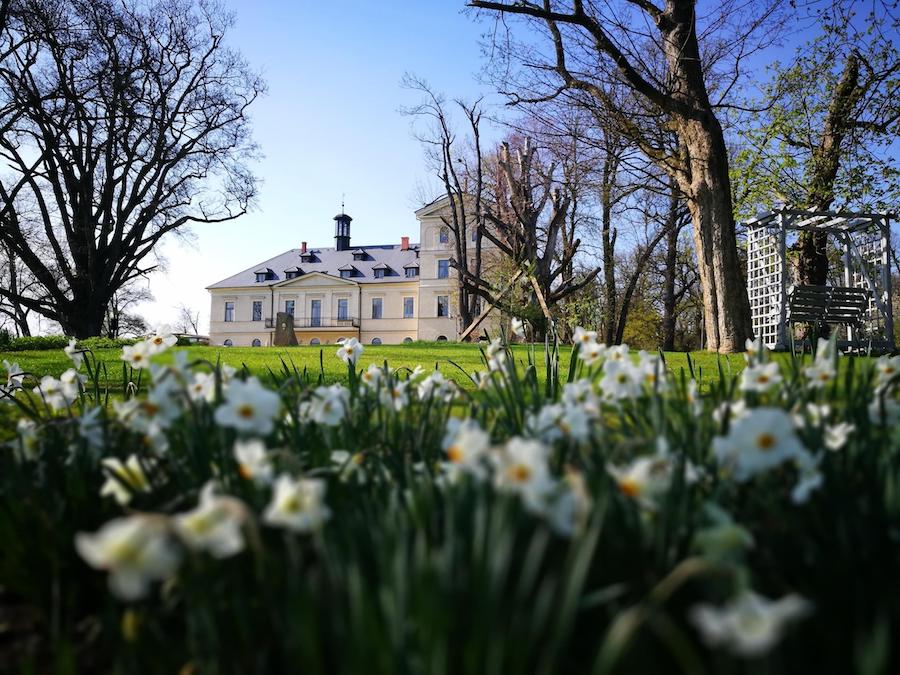
Thursday, March 29 – Monday, April 2
Come relax and enjoy a traditional Easter with your family at Chateau Mcely. You can look forward to Easter customs, animals that are an essential part of spring and Easter, and a great program for kids of all ages. You can try creating a corn husk doll or a beeswax candle, decorating Easter gingerbread, making a figure of Moran the winter witch, and much more.
What We’ve Got Planned for the Weekend:
- A special Easter menu, served from Friday through Sunday
- Special menu on Easter Monday
- Live piano music Saturday and Sunday evenings
EASTER PROGRAM
Friday, March 30
From 6:00 p.m. – Children’s cinema
Saturday, March 31
10:00 a.m. – 12:00 p.m. – Easter craft workshops for children
1:00 – 4:30 p.m. – Easter animals in the English park
1:00 – 2:00 p.m. – Hands-on zoo
2:00 – 4:30 p.m. – Donkey rides for kids
Sunday, April 1
10:00 a.m. – 12:00 p.m.
Making a Moran (winter witch) with the children and learning about her symbolism for winter’s end
2:00 – 4:00 p.m. – Easter Traditions and Crafts for Young and Old
Decorating eggs in various ways
Making beeswax candles
Making corn husk dolls
Whip braiding demonstration
Decorating Easter gingerbread
Creating small floral decorations with the chateau florist
Monday, April 2
10:00 a.m. – 12:00 p.m. – Easter Treasure Hunt
For more information, click here.
Within a TEDx talk, Alena Huberová talks about a topic that has been on her radar for at least 15 years.
“You’ve heard about non-verbal communication, of course, everyone has! The question is, how much are you aware of your own non-verbal signals and the impact your “presence” has on others? Maybe you’re not aware, just as I wasn’t… And that’s a problem…
You see, our body and our presence have a major influence on the quality of our day-to-day interactions with others, be it colleagues or family. And it very much determines the results we obtain from our business meetings, presentations, etc… “
Here’s what Alena thinks about the subject!
On the 12th of February, the European Centre for Career Education held their Annual Partners Networking event. In the cosy welcoming atmosphere of Vinny sklep Ujezd, the ECCE’s team honored the celebration of The Chinese New Year with friends and partners.
The guests enjoyed the French style buffet and a fine selection of wines. However, the main attraction was the tasting of the Chinese spirits Qufu, Confucius House Liquor and Red Star Erguotou.
2017 was a successful year for ECCE and we have decided to meet the new 2018 in a festive mood. We hope that this year we will have other great achievements to share with you. We wish you a very successful year of the dog and let’s meet on our Grand Reception in summer again.
Very little would be possible without your support. Thank you!
By Élie Bellevrat and Kira West

Industrial heat makes up two-thirds of industrial energy demand and almost one-fifth of global energy consumption. It also constitutes most of the direct industrial CO2 emitted each year, as the vast majority of industrial heat originates from fossil-fuel combustion. Yet despite these impressive figures, industrial heat is often missing from energy analyses. That is why this year’s World Energy Outlook takes a deep dive in this important segment of our energy system.
While industrial heat demand – at all temperature levels – grows in the central scenario of the World Energy Outlook 2017, the underlying drivers are different depending on temperature requirements. Low- and medium-temperature heat (below 400 degrees Celsius) accounts for three-quarters of the total growth in heat demand in industry by 2040, driven by less energy-intensive industries.
This is a reversal of historical trends: in the last 25 years, high-temperature heat represented two-thirds of overall heat demand growth, driven by China’s rapid development of heavy industries such as steel and cement. That said, developing Asia continues to drive industrial heat demand growth in our outlook: the growth in low- to medium-temperature needs in this region alone represents about half of the global industrial heat demand increase in use to 2040.
Low-temperature heat use grows in most regions through 2040, except in the European Union and Japan. The outlook for high-temperature heat varies even more across regions, including among developing countries. It decreases in China with the country’s shift to a less energy-intensive development pathway, while it increases in India as the country becomes, by large distance, the main global driver.
As industrial heat demand continues to grow so does its share in energy-related CO2 emissions, accounting for a quarter of global emissions by 2040. Any efforts taken to reduce this global trend face unique challenges. First, industrial heat is often generated on-site, making it more difficult to regulate than a more centralized sector such as large thermal power generation. There is also limited policy focus in this area compared with other sectors.
Second, while heating needs for residential and commercial buildings are fairly standard, industrial heat encompasses a wide variety of temperature levels for diverse processes and end-uses. For instance, cement kilns require high-temperature, while drying or washing applications in the food industry operate at lower temperatures.
Different technology and fuel options are available depending on the required temperature level, but these are often not interchangeable. For example, low-temperature heat from a heat pump cannot be substituted for high-temperature heat from a gas boiler.
Today’s industrial heat demand relies mainly on fossil fuels, biomass and electricity, and only very small shares of renewable resources in certain sectors. Therefore decarbonisation would require a dramatic shift in how industrial heat is generated. Yet this goal is instrumental to following a low-carbon development pathway as defined in the Sustainable Development Scenario, a new global scenario providing an integrated way to achieve three critical policy goals simultaneously: climate stabilisation, cleaner air and universal access to modern energy. The best option for reducing energy use of industrial heat will depend on the specific use and required temperature.
In his seminal classic, Geopolitics of Technology, prof. Anis H. Bajrektarevic states: “…, the main problem with Green/Renewable (de-carbonized) energy is not the complexity, expense, or the lengthy time-line for fundamental technological breakthrough; the central issue is that it calls for a major geopolitical breakthrough. .. Ergo, oil (and gas) represents far more than energy. Petroleum (be it a finite biogenic mineral or not) is a socio-economic, psychological, cultural, financial, security and politico-military construct, a phenomenon of civilization … In a broader historical, more vertical or philosophical sense, the hydrocarbons and its scarcity phychologization, its monetization (and related weaponization) is serving rather a coercive and restrictive status quo than a developmental incentive. That essentially calls not for an engagement but compliance…”
Fuel switching can provide some benefit, for instance substituting gas for coal, but for more ambitious climate targets more transformative solutions are needed. For example, under certain conditions, electrification can be a low-cost and sustainable option ¬- heat pumps can be economical solutions for low- and medium-temperature needs. Electrification may also be possible for specific high-temperature industrial processes, such as electricity-based steel production. However the sustainability of electrification depends on broad decarbonisation of the power sector to actually reduce emissions at the system level.
Direct renewable heat sources such as solar and geothermal can also be economical for applications below 400 degrees Celsius, but they are not easy to integrate in all industrial facilities. Bioenergy can be used for high-temperature heat demand, but is resource-constrained and only economical and sustainable under certain operating conditions and in certain regions.
Industrial heat can be decarbonised through the deployment of carbon capture, utilization and storage (CCUS). This can include, for instance, technologies to remove CO2 emissions from flue gas before recycling the CO2 in industrial processes, such as for methanol production, or storing it permanently.
Finally, end-use efficiency, through the use of modern equipment, improved insulation or heat recovery, can reduce final demand before the heat is even generated – often, limiting overall heat requirements is the first strategy adopted, before taking actions to decarbonise remaining heat use.
Ultimately, widespread deployment of energy efficiency and a least cost mix of these options can point to a more sustainable future for industrial heat. Putting the appropriate regulatory framework in place will be key to ensuring that investments are targeted in a way that makes this future possible.
Élie Bellevrat and Kira West are the WEO Energy Analysts

Élie Bellevrat
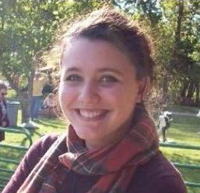
Kira West
Early version of the text Clean and efficient heat for industry was published by the IEA.


